Angus on on butch girlfriends, George Best and fouling Maradona Treatments your doctor won't tell you about Deepcut
The next chapter starts here

"He wasn't the sort of kid you needed to tell something to twice"
Could your child be a
WHAT YOUR WAITER'S REALLY THINKING p120
Atro
Readers
Coach and uncle Toni onRafael Nadal:
I I 1111 9 770034 040112 JU Y 2010 -,S3A9 REPUBLIC OF IRELAND 45.10
Tick the box to request this brochure

Tick the box to request this brochure
Tick the box to request this brochure
Tick the box to request this brochure
Tick the box to request this brochure
Simply tick the brochures you require, fill in your details and return (no stamp necessary)
Name Address
Europe & The Middle East
Holiday Collection 2010/11
Our superb collection of holidays across Europe and the Middle East has been specially designed to appeal to holidaymakers who expect a little more from their travels.
River Cruises 2011
Discover the great cultural centres of Europe from the comfort of your floating 4-star hotel. Includes Rhine, Moselle, Danube and Main.
Cruise & Discover 2011
A fantastic new collection of cruises with some
of the world's favourite cruise lines. Choose from cruises aboard small and friendly, mid-size or even spectacular resort ships as you sail around Europe, the Caribbean or further afield.
Classic Rail Journeys 2010/11
From historic trains to iconic routes, this is a collection of some of the world's greatest rail journeys. Take the time to enjoy your journey as you travel through stunning landscapes, experiencing the essence of a country.
Christmas & New Year 2010
Why not sit back, relax and let us take care of all your festive celebrations? Whether it's picture-postcard alpine scenery, a city break, winter sunshine or even a river cruise, our tempting selection is bound to appeal.
BOOK WITH COMPLETE CONFIDENCE FULLY BONDED — FULLY PROTECTED OABTA ABTA No.V6345 1ATA .593161319WRIGASSCOLCION
z
DATES o , 0 AVAILABLE
nwc 2011 DATES NOW
AVAILABLE
.1-
20 1 DATES NOW
AILUT
2011
),,,t,s,,,°,
Postcode
no
would like to receive details of future Page & Moy offers by
below.
Data Protection: Page & Moy Limited, which is part of the Page & Moy Travel Group Limited, would like to use the details provided to contact you with information about other Page & May Travel Group Limited products and services we believe will be of interest to you. If you would prefer not to receive this information, please tick here Do not mail me Do not Email me[ I Do not phone me Please note: We will always send you the most up-to-date brochures and therefore cover designs may differ from those shown. CALL OUR FREE BROCHURE HOTLINE for the brochure of your choice or complete the postage paid form opposite 0800 987 5091 or visit pageandmoy.com Your Financial Protection: Our air holiday packages are ATOL protected by the Civil Aviation Authority Our ATOL number is 133. ATOL protection does not apply to all holiday and travel services. We are also a member of of the Association of British Travel Agents (ABTA number V6345). If your holiday does not include flights ABTA will protect your holiday in the same way PRrCE pnomist Page& Moy Is part of the PAGEs*” &MOT, I 111.0.1 GROUP
Phone
If you
e-mail please enter your e-mail address
E-mail

Discover more ...for less
BEAUTIFULLY CRAFTED HOLIDAYS FOR TRAVELLERS WHO EXPECT MORE
At Page & Moy we believe every one of our escorted holidays should be a journey of discovery, experiencing all the things you would expect, plus uncovering a few littleknown secrets along the way. Enjoy classic rail journeys aboard iconic trains, discover the beauty of hidden Italy, set sail on elegant river cruises and so much more... To discover more, call for a brochure or visit us at pageandmoy.com

A small change to your hair en makes a big change to your head. easY 95% OF USERS SURVEYED WOULD RECOMMEND IT 100% GREY02vERAGE FOR BEAUTIFUL NATURAL LOOKING COLOUR. WilmerHair Colour Category: ....Sulytof 10,9V people by TNS • 'In an independent survey of 200 people who tried nice'n easy. June 2009.
STORIES FEATURED ON THE COVER ARE SHOWN IN RED
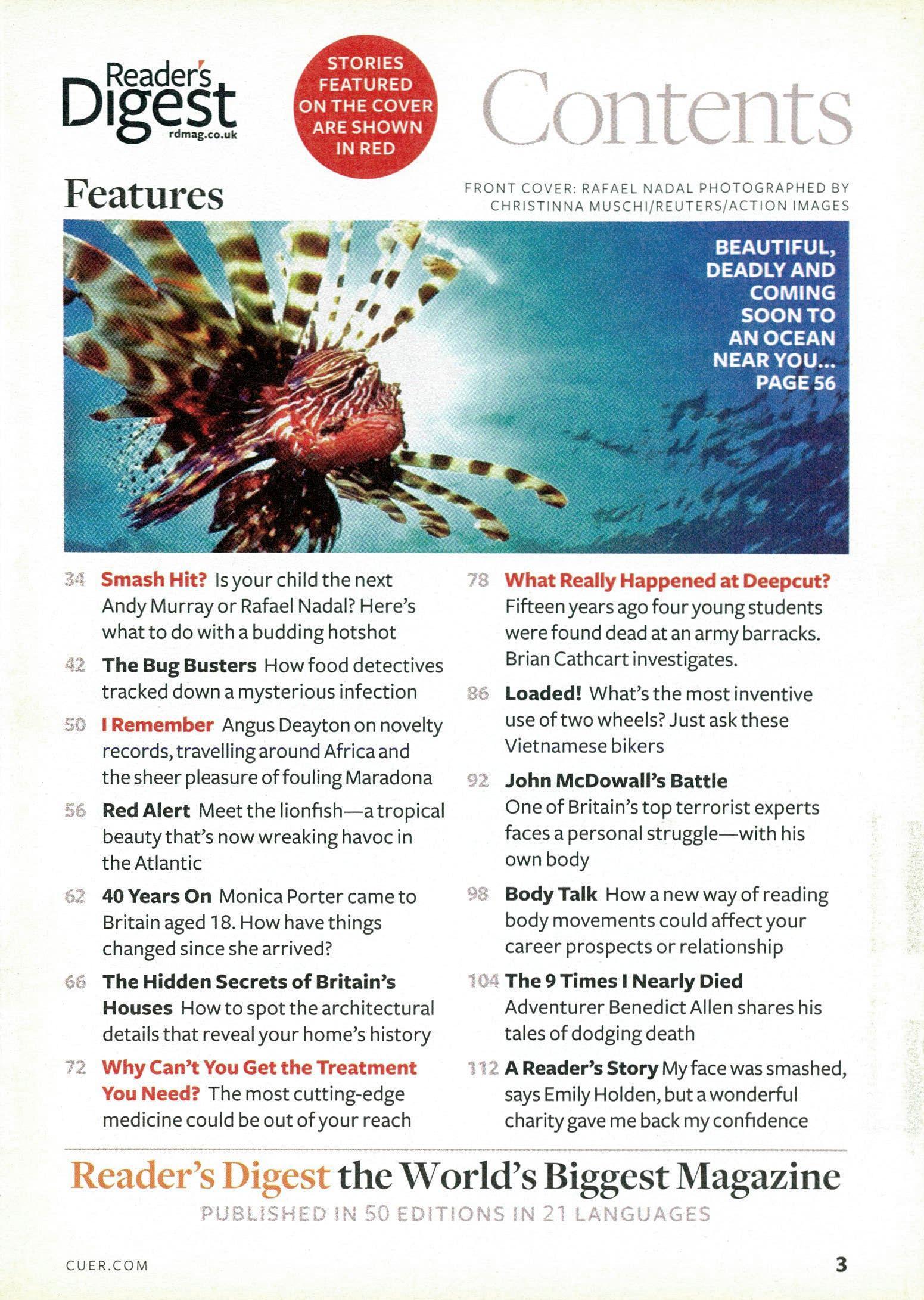
SmashHit? Isyour child the next Andy Murray or Rafael Nadal? Here's what to do with a budding hotshot
The Bug Busters How food detectives tracked down a mysterious infection
I Remember Angus Deayton on novelty records, travelling around Africa and the sheer pleasure of fouling Maradona
Red Alert Meet the lionfish—a tropical beauty that's now wreaking havoc in the Atlantic
40 Years On Monica Porter came to Britain aged 18. How have things changed since she arrived?
The Hidden Secrets of Britain's Houses How to spot the architectural details that reveal your home's history
Why Can't You Get the Treatment You Need? The most cutting-edge medicine could be out of your reach
BEAUTIFUL, DEADLY AND COMING SOON TO AN OCEAN NEAR YOU... PAGE 56
What Really Happened at Deepcut? Fifteen years ago fouryoung students were found dead at an army barracks. Brian Cathcart investigates.
Loaded! What's the most inventive use of two wheels? Just ask these Vietnamese bikers
John McDowall's Battle
One of Britain's top terrorist experts faces a personal struggle—with his own body
Body Talk How a new way of reading body movements could affect your career prospects or relationship
The 9 Times I Nearly Died Adventurer Benedict Allen shares his tales of dodging death
A Reader's StoryMy face was smashed, says Emily Holden, but a wonderful charitygave me back my confidence
Contents
71
Dlea est Features
FRONT COVER: RAFAEL NADAL PHOTOGRAPHED BY CHRISTINNA MUSCHI/REUTERS/ACTION IMAGES
Reader's Digest the World's Biggest Magazine PUBLISHED IN 50 EDITIONS IN 21 LANGUAGE CUER.COM 3
Skincare designed for a changing you.
Surprisingly, only 7.5% of women aged 50+ buy the right skincare for their age! Discover products designed with your changing needs in mind and make the most of your skin.

y
b our skincare is an important part of your routine, but it's easy to become pre-occupied with other life changes and forget your skin's needs have changed too. Hormonal changes in your 50s can leave skin feeling dry and looking dull. Declining levels of oestrogen can also weaken collagen in the skin's support structure resulting in a loss of firmness, which can be especially visible around the jaw line.
Age Perfect Your Skin
At this time of change, your skin is more likely to benefit from products designed specifically for mature skin. Age Perfect from L'Oreal Paris is a range enriched with soya bean extract and helps combat 3 signs of skin ageing — it's designed for skin which feels dry, and less firm and supple. For hydrated, firmer-feeling, supple skin, it's time to embrace change in your skincare routine.
* Source: Kantar Worldpanel, FY 2009
Beauty Tips for You
•Skin gets drier as you age. Opt for slightly richer skincare formulas than you did in your 30s and 40s.
•Heavy use of foundation can accentuate lines. Try lighter foundations or a tinted moisturiser such as Age Re-Perfect Radiance Restoring Day Cream.
•When choosing hair colour, avoid very dark shades of brown and black which can make you look drawn.
•For further beauty tips, monthly newsletters and the opportunity to apply for samples, register your details at:
1. Intensive Reinforcing Serum hydrates and helps fight dullness to give your skin a radiant look.
2. Reinforcing Rehydrating Day Cream helps fight the effects of sagging skin by leaving skin feeling firmer. It helps protect against the appearance of age spots.
3. Reinforcing Rich Night Cream with a vitamin-enriched formula, intensely hydrates overnight for softer-feeling, comfortable skin.
4. Reinforcing Eye Cream leaves a fresh sensation on application and hydrates for a comfortable-feeling eye contour. Because you're worth it
Advertisement
IZORAL PARIS
EDITORIAL Editor-in-Chief GillHudsonPA to Editor-in-Chief Hazel Gilbertson Managing EditorCatherine Haughney
Design DirectorMartin Colyer Commissioning EditorSimon Hemel rykDeputy Production EditorTom BrowneFeatures ResearcherRachael AdamsArt EditorHugh KylePicture Researcher Roberta MitchellContributing EditorCaroline Hutton
MANAGING DIRECTOR Chris Spratling
Welcome
At school, we played tennis exactly four times ayear, in the summer term. And that was that. I was a dismal player. No matter how hard I batted my old "superlite Junior" racquet, the ball barely even reached the net, let alone went over it.
Years later, I reluctantly agreed to play a game—only to find that my useless swipes had been transformed into winning aces, hit with such power that they practically landed in another postcode. The difference? I was playing with atop-quality racquet. If only I'd played with one sooner—that Wimbledon trophy could have been mine!
How many kids have got the potential to be a great player but are never given the chance to find out? On p34, we ask some of the biggest names in tennis how to spot —and, crucially, encourage—a rising star. Gill Hudson theeditor@readersdigest.co.uk twitter.com/rdigest
ECT LTD (TA READER'S DIGEST), NDON W2 2HR
FORESTS. PLEASE R EC YC E
ADVERTISING Sales Controller DominicEddon(dominic_ eddon@readersdigest.co.uk)Marketing Solutions Manager Paul EyersAdvertising Sales Manager Noel Nallen Trade Marketing Manager (Magazines and Books) Simon NicollProduction Controller Chris TribeMagazine Marketing Manager Helen Ward
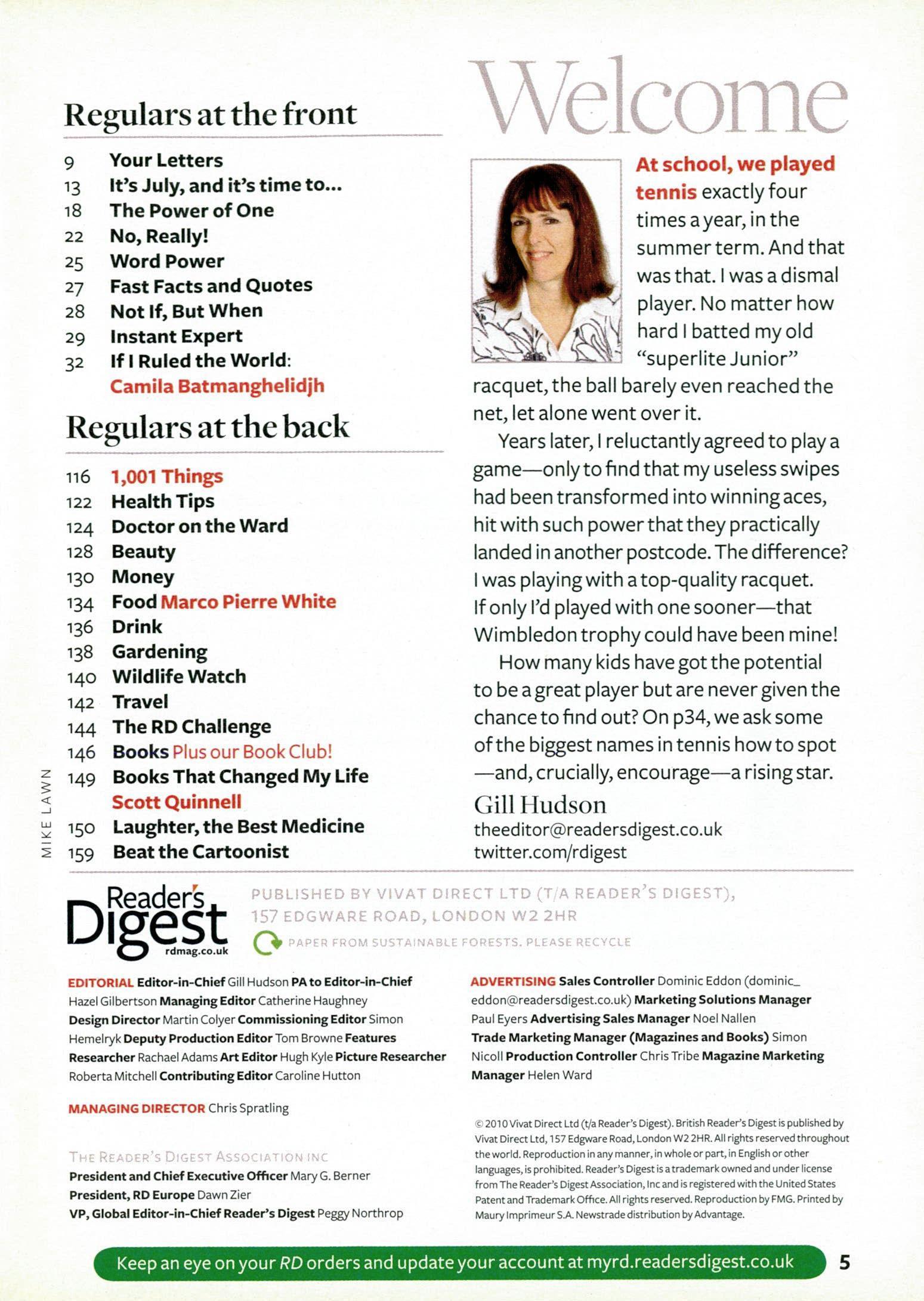
President and Chief Executive OfficerMary G. Berner
President, RD EuropeDawn Zier
VP, Global Editor-in-Chief Reader's DigestPeggy Northrop
2010 Vivat Direct Ltd OA Reader's Digest). British Reader's Digest is published by Vivat Direct Ltd,157 Edgware Road, London W2 2HR. All rights reserved throughout the world. Reproduction in any manner, in whole or part, in English or other languages, is prohibited. Reader's Digest is a trademark owned and under license from The Reader's Digest Association, Inc and is registered with the United States Patent and Trademark Office. All rights reserved. Reproduction by FMG. Printed by Maury lmprimeur S.A Newstrade distribution by Advantage.
9 Your Letters 13 It's July, and it's time to... 18 The Power of One 22 No, Really! 25 Word Power 27 Fast Facts and Quotes 28 Not lf, But When 29 Instant Expert 32 If I Ruled the World: Camila Batmanghelidjh Regulars at
back 116 1,001 Things 122 Health Tips 124 Doctor on the Ward 128 Beauty 130 Money 134 FoodMarco Pierre White 136 Drink 138 Gardening 140 Wildlife Watch 142 Travel 144 The RD Challenge 146 BooksPlus our Book Club' 149 Books That Changed My Life Scott Quinnell 150 Laughter, the Best Medicine 159 Beat the Cartoonist MIKE L AW N .--Reader's LAges PUBLISHED BY VIVAT DIR 157 EDGWARE ROAD, LO os.cFP FROM SUSTAINABLE
Regulars at the front
the
Keep an eye on your RD orders and update your account at myrd.readersdigest.co.uk
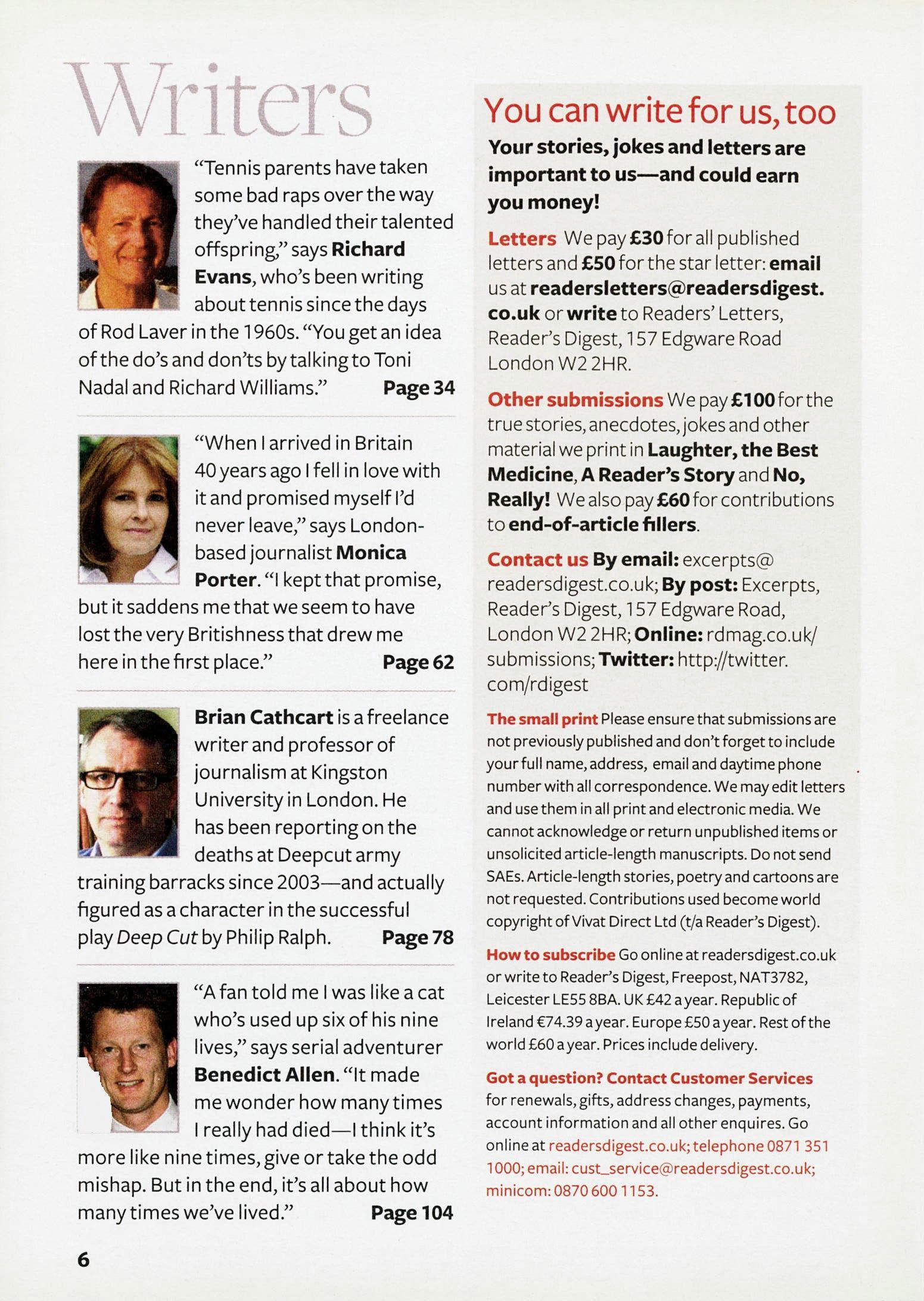
Writers
"Tennis parents have taken some bad raps over the way they've handled their talented offspring," saysRichard Evans,who's been writing about tennis since the days of Rod Laver in the1960s."You get an idea of the do's and don'ts by talkingto Toni Nadal and Richard Williams." Page 34
"WhenI arrived in Britain 40 years ago I fell in love with it and promised myself I'd never leave," says Londonbased journalist Monica Porter."I kept that promise, but it saddens me that we seem to have lost the very Britishness that drew me here in the first place." Page 62
Brian Cathcartis a freelance writer and professor of journalism at Kingston University in London. He has been reporting on the deaths at Deepcut army training barracks since 2003—and actually figured as a character in the successful playDeep Cut by Philip Ralph. Page 78
"A fan told me I was like a cat who's used up six of his nine lives," says serial adventurer Benedict Allen."It made me wonder how manytimes I really had died—I think it's more like nine times, give or take the odd mishap. But in the end, it's all about how many times we've lived." Page 104
You can write for us, too
Your stories, jokes and letters are important to us—and could earn you money!
Letters We pay£30for all published letters and£50for the star letter:email us atreadersletters@readersdigest. co.ukorwriteto Readers' Letters, Reader's Digest, 157 Edgware Road London W2 2HR.
Other submissionsWe pay£100for the true stories, anecdotes, jokes and other material we print inLaughter, the Best Medicine, A Reader's StoryandNo, Really! We also pay£60for contributions toend-of-article fillers.
Contact us By email:excerpts@ readersdigest.co.uk;By post:Excerpts, Reader's Digest, 157 Edgware Road, London W2 2HR;Online:rdmag.co.uk/ submissions;Twitter:http://twitter. com/rdigest
The small printPlease ensure that submissions are not previously published and don't forget to include your full name, address, email and daytime phone number with all correspondence. We may edit letters and use them in all print and electronic media. We cannot acknowledge or return unpublished items or unsolicited article-length manuscripts. Do not send SAEs. Article-length stories, poetry and cartoons are not requested. Contributions used become world copyright of Vivat Direct Ltd (t/a Reader's Digest).
How to subscribeGo online at readersdigest.co.uk or write to Reader's Digest, Freepost, NAT3782, Leicester LESS 8BA. UK £42 ayear. Republic of Ireland €74.39 ayear. Europe £50 ayear. Rest of the world £60 ayear. Prices include delivery.
Got a question? Contact Customer Services for renewals, gifts, address changes, payments, account information and all other enquires. Go online at readersdigest.co.uk; telephone 0871 351 1000; email: cust_service@readersdigest.co.uk; minicom: 0870 600 1153.
6
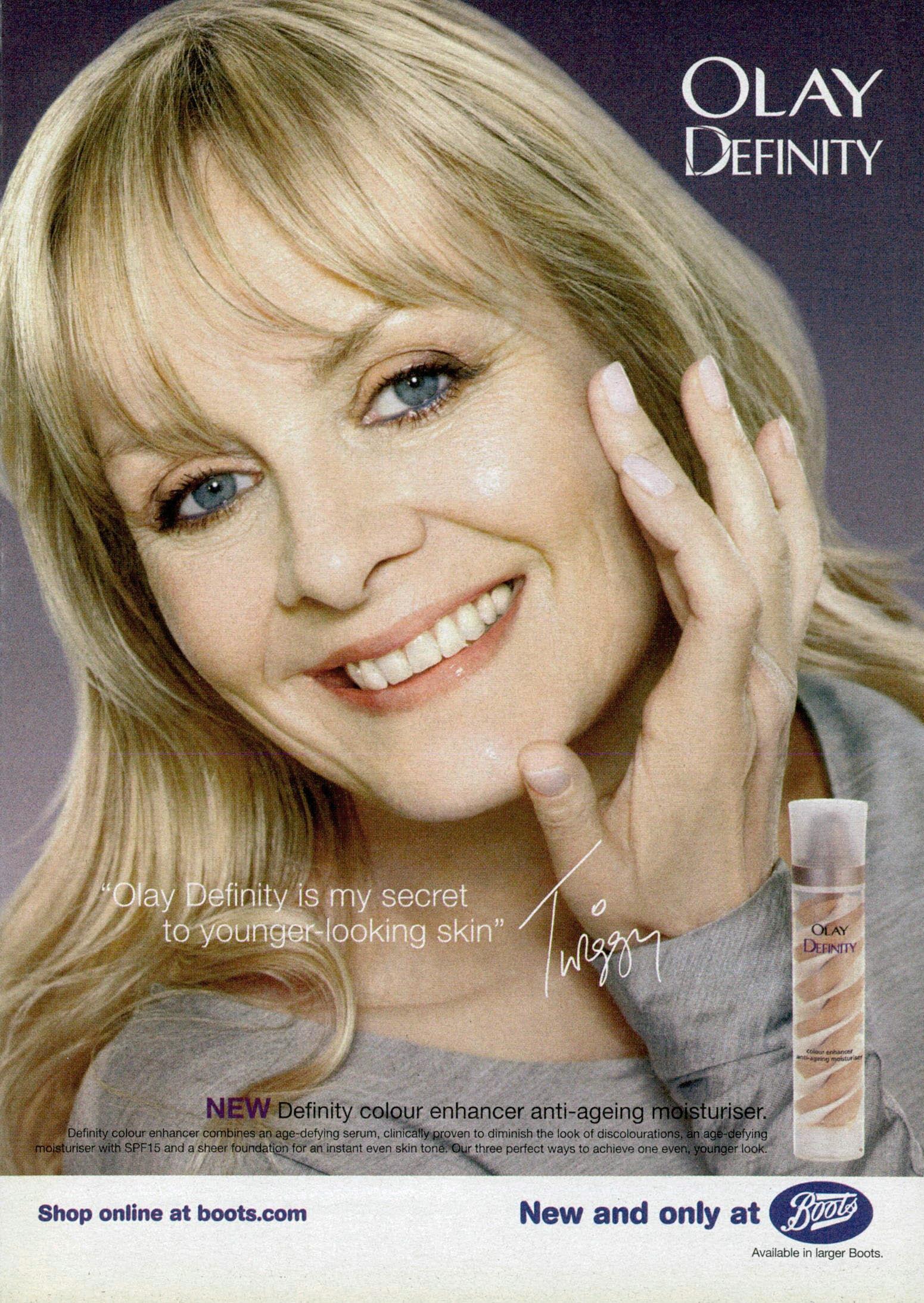
OCR,' NEW Definity colpur enhancer anti-agein -1'Definity colour enhancer combines an age-defying serum, clin oven to diminish the look of discolo0 'mblisturisen with SPF15 and a cheer foundation for an instant even skin ton three perfect ways to achieve Shop online at boots.com New and only at Available in larger Boots.

ENJOY WHITER TEETWAND FRESH BREATH
*When using Macleans Whitening compared to an ordinary toothpaste.
YOUR OPINIONS
LETTER OF THE MONTH
Artistic license
It was marvellous reading about the attempts to replicate the styles of great painters in "How to Paint Like Van Gogh in One Hour", as this is exactly what my grandfather Peter Garbett has done with John Constable's TheHay Wain (right). It was a tricky task— the sky was the most challenging part, taking nine days to perfect.
Mygrandfather, now 79 (pictured inset), has always been a master craftsman, particularly of carving of all kinds. He only started painting about 16 months ago, but in that time he's already produced 43 works and seems to be getting better and better. And although he hasn't exhibited yet, I'm sure he'd love to—he's rightly proud of his paintings, and so are we. R P Chadwick,
Goodbye to the old
It's obvious that our political system needs an overhaul ("Vote for Change?"), but how do we achieve it? Here are a few ideas.
There should be fixed-term parliaments so prime ministers can't mess around with dates. Politicians should live in their constituencies so they have experience of the area they represent. Most importantly, there should be a form of proportional
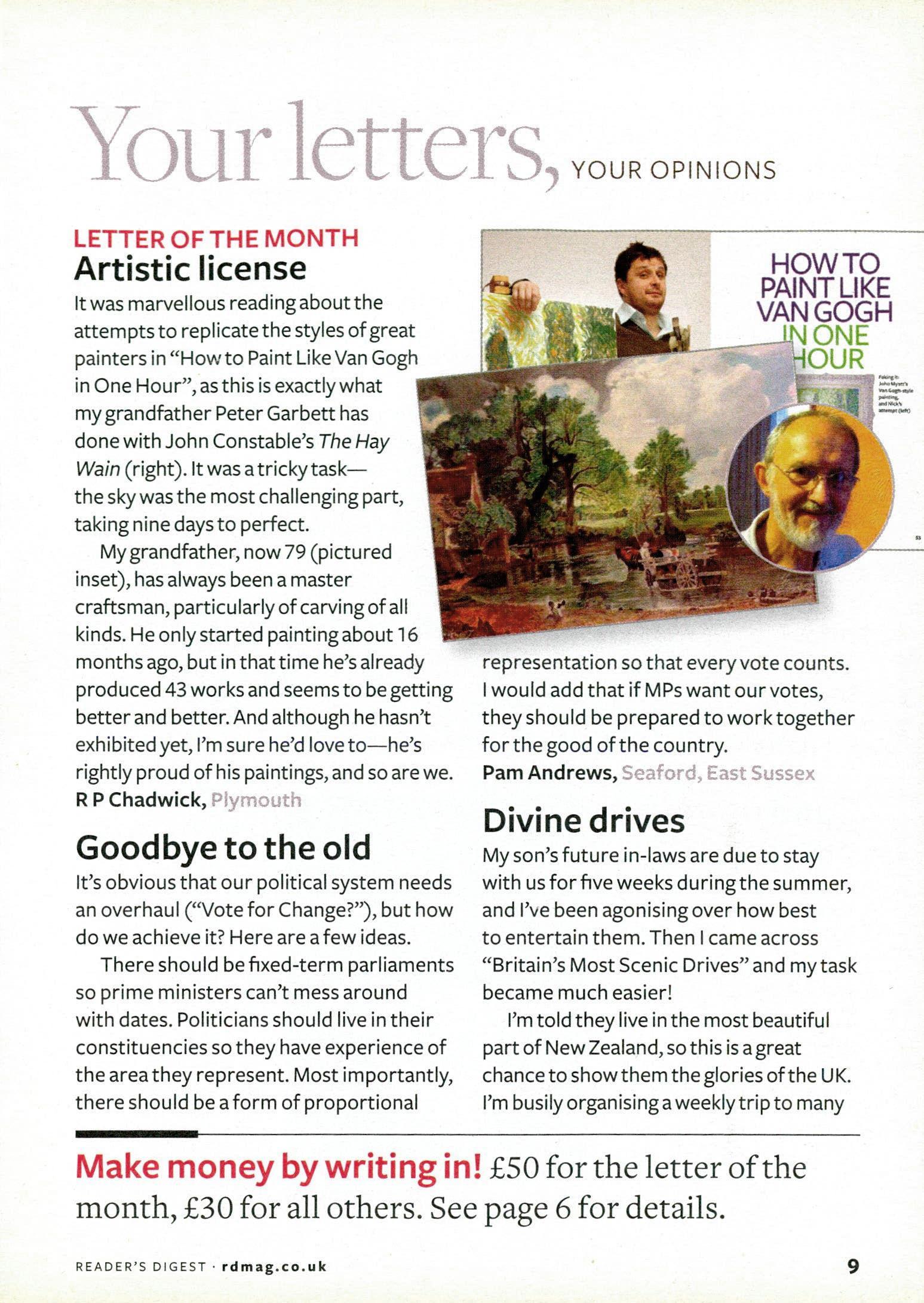
HOW TO PAINT LIKE VAN GOGH IN ONE OUR
representation so that every vote counts. I would add that if MPs want our votes, they should be prepared to work together for the good of the country.
Pam Andrews, Seaford, East Sussex
Divine drives
My son's future in-laws are due to stay with us for five weeks during the summer, and I've been agonising over how best to entertain them. Then I came across "Britain's Most Scenic Drives" and my task became much easier!
I'm told they live in the most beautiful part of New Zealand, so this is a great chance to show them the glories of the UK. I'm busily organising a weekly trip to many
Make money by writing in! £50 for the letter of the month, £30 for all others. See page 6 for details.
READER'S DIGEST rdmag.co.uk 9
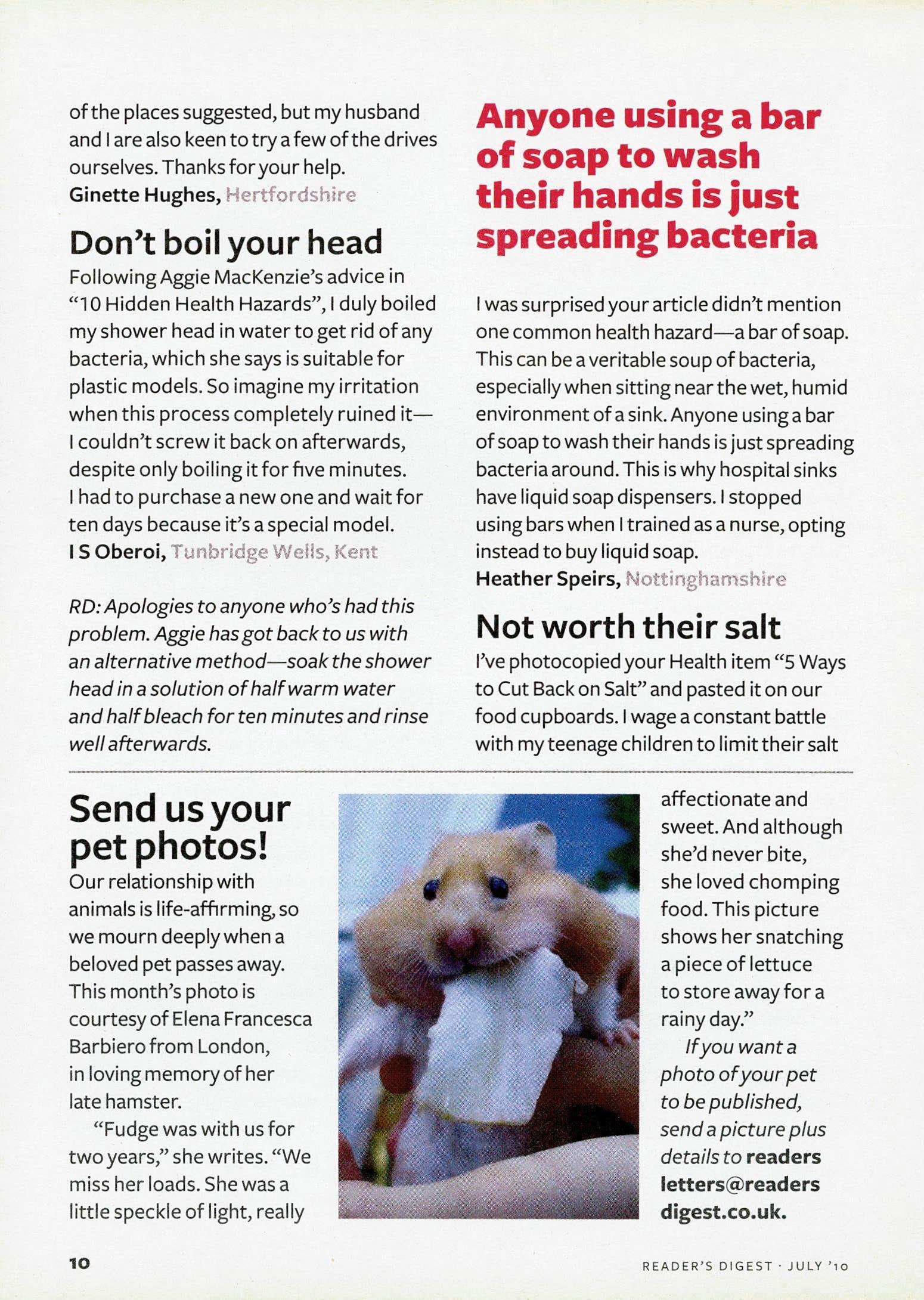
of the places suggested, but my husband and I are also keen to try a few of the drives ourselves. Thanks foryour help.
Ginette Hughes, Hertfordshire
Don't boil your head
Following Aggie MacKenzie's advice in "10 Hidden Health Hazards", I duly boiled my shower head in water to get rid of any bacteria, which she says is suitable for plastic models. So imagine my irritation when this process completely ruined it— I couldn't screw it back on afterwards, despite only boiling it for five minutes. I had to purchase a new one and wait for ten days because it's a special model.
I S Oberoi, Tunbridge Wells, Kent
RD: Apologies to anyone who's had this problem. Aggie has got back to us with an alternative method—soak the shower head in a solution of half warm water and half bleach for ten minutes and rinse well afterwards.
Send us your pet photos!
Our relationship with animals is life-affirming, so we mourn deeply when a beloved pet passes away. This month's photo is courtesy of Elena Francesca Barbiero from London, in loving memory of her late hamster.
"Fudge was with us for two years," she writes. "We miss her loads. She was a little speckle of light, really
Anyone using a bar of soap to wash their hands is just spreading bacteria
I was surprised your article didn't mention one common health hazard—a bar of soap. This can be a veritable soup of bacteria, especially when sitting near the wet, humid environment of a sink. Anyone using a bar of soap to wash their hands is just spreading bacteria around. This is why hospital sinks have liquid soap dispensers. I stopped using bars when I trained as a nurse, opting instead to buy liquid soap.
Heather Speirs,
Not worth their salt
I've photocopied your Health item "5 Ways to Cut Back on Salt" and pasted it on our food cupboards. I wage a constant battle with my teenage children to limit their salt
affectionate and sweet. And although she'd never bite, she loved chomping food. This picture shows her snatching a piece of lettuce to store away for a rainy day."
If you want a photo ofyour pet to be published, send a picture plus details to readers letters@readers digest.co.uk.
10 READER'S DIGEST • JULY '10
intake. I buy LoSalt myself and mostly cook without it, but my kids now buy a lot of their own food and rarely bother to check the label. This article is a handy reminder.
Jenna Burton,
Friends in need
I loved Kevin Harris's advice on neighbourly relations in "It's May, Time to...". For most of the population, including me, neighbours are people you see regularly but don't really know, apart from the occasional friendly comment. But that all changed when a family member died. Casseroles and apple tarts started appearing. Bags of scones were tied to my front door. My overgrown hedge was magically cut. I was bowled over by the kindness shown.
Trust me, take Kevin Harris's advice— neighbours are worth getting to know!
Claire Collins, runty Clare, Ireland
A book to cherish
I was pleased to see Anne of Green Gables included in Kirsty Young's "Books That Changed My Life". I read it at the age of nine and, over the years, my sister and I reread it so many times the pages started coming
TELL US YOUR TALES OF MEANNESS
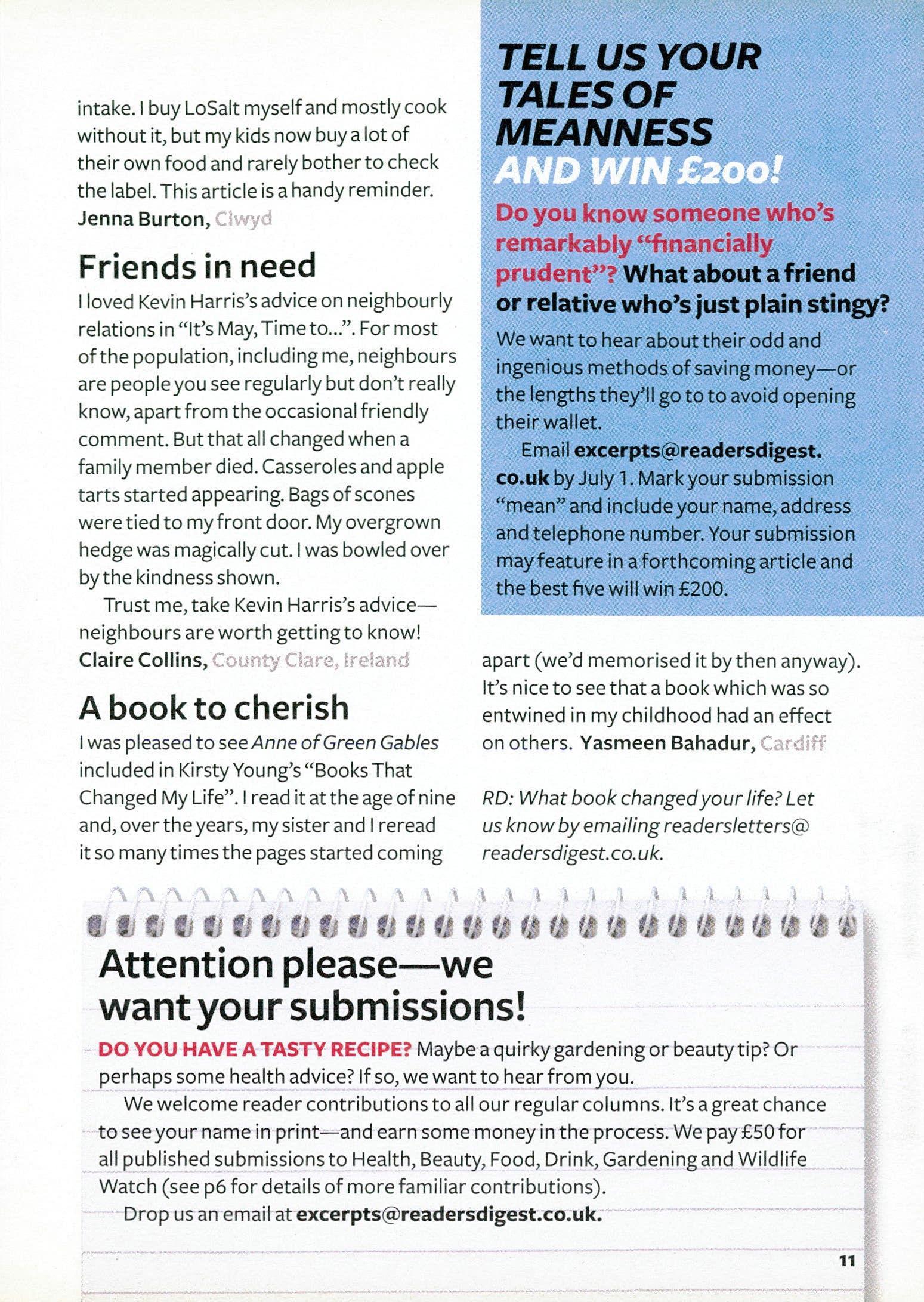
What about a friend or relative who's just plain stingy?
We want to hear about their odd and ingenious methods of saving money—or the lengths they'll go to to avoid opening their wallet.
Email excerpts@readersdigest. co.uk by July 1. Mark your submission "mean" and include your name, address and telephone number. Your submission may feature in a forthcoming article and the best five will win £200.
apart (we'd memorised it by then anyway). It's nice to see that a book which was so entwined in my childhood had an effect on others. Yasmeen Bahadur,
RD: What book changed your life? Let us know by emailing readersletters@ readersdigest.co.uk.
DO YOU HAVE A TASTY RECIPE? Maybe a quirky gardening or beauty tip? Or perhaps some health advice? If so, we want to hear from you.
We welcome reader contributions to all our regular columns. It's a great chance to see your name in print—and earn some money in the process. We pay £50 for all published submissions to Health, Beauty, Food, Drink, Gardening and Wildlife Watch (see p6 for details of more familiar contributions). Drop us an email at excerpts@readersdigest.co.uk.
t Cl t t f f' II ft ft ft, f, f, I, l f et ft t
Attention please—we want your submissions!
11
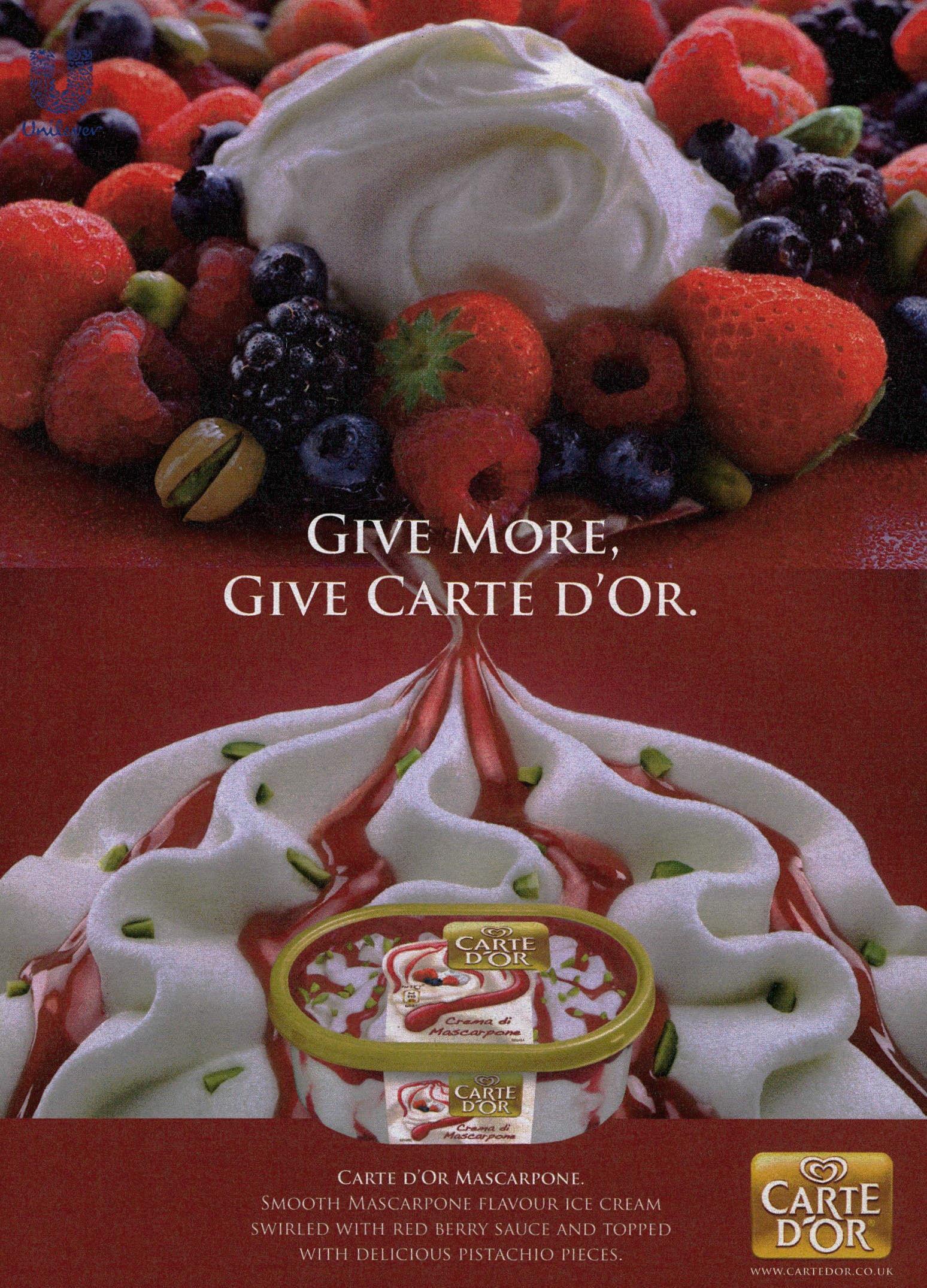
GIVE MORE, GIVE CARTE D'OR. CARTE D'OR MASCARPON E. SMOOTH MASCARPONE FLAVOUR ICE CREAM SWIRLED WITH RED BERRY SAUCE AND TOPPED WITH DELICIOUS PISTACHIO PIECES. N'11,4 CAIti
...SEE
Toy Story 3 (3D) The latest instalment of the animation series sees Buzz, Woody and the gang relocated to a nursery when their owner Andy goes to college. Aside from multidimensional clever bits and top gags, highlights include a Ken doll—played by Michael Keaton —who's never met a Barbie before and protests loudly when told he's "a girl's toy".
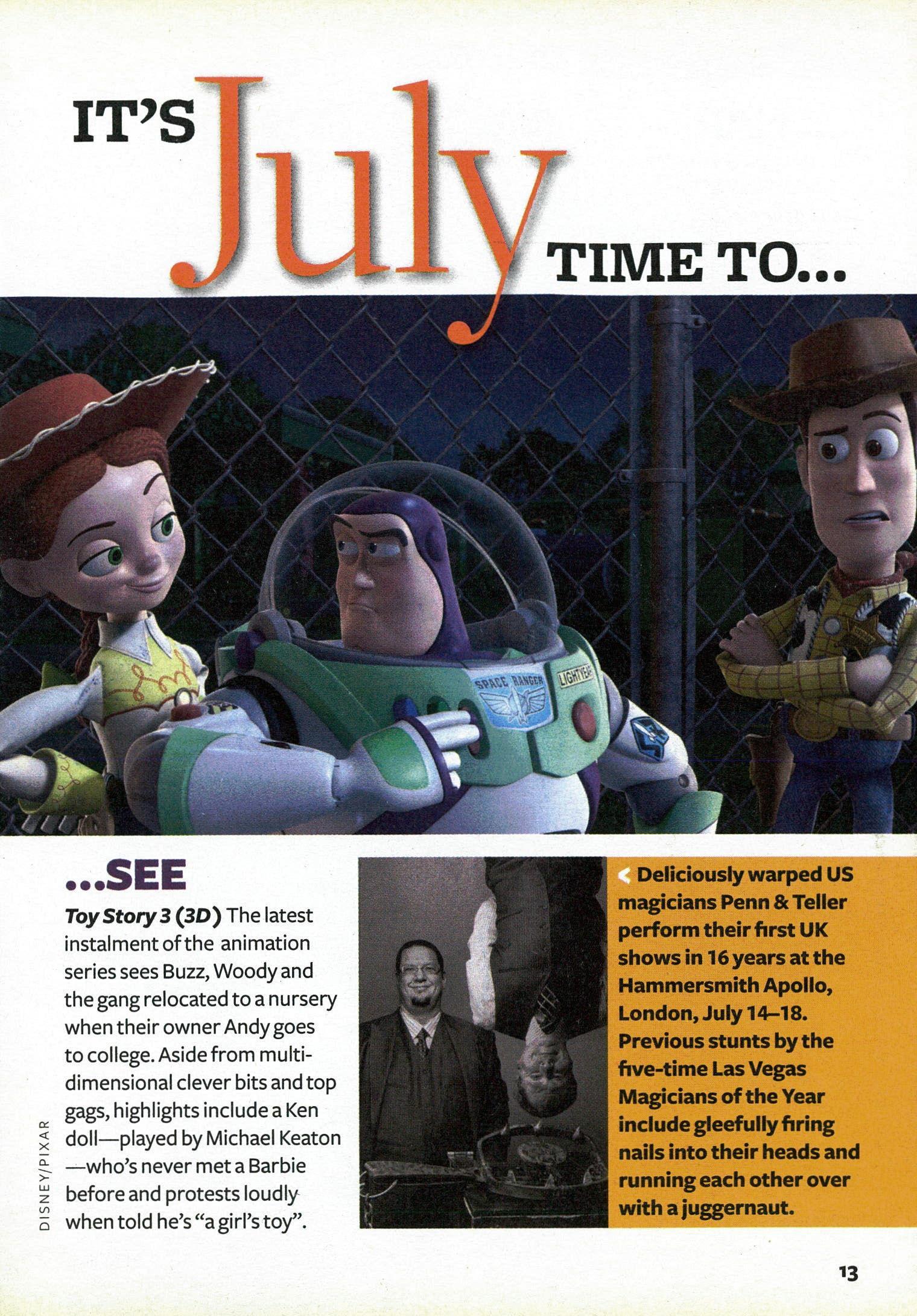
Deliciously warped US magicians Penn & Teller perform their first UK shows in 16 years at the Hammersmith Apollo, London, July 14-18. Previous stunts by the five-time Las Vegas Magicians of the Year include gleefully firing nails into their heads and running each other over with a juggernaut.
DI SN EY/ PIXAR
13
MIIM TIME TO...
...SNAP
the perfect action photo Guardian staffer Tom Jenkins won four Press Photographer's Year (PPY) awards for his 2009 sports portfolio. It features in a new PPY book and exhibition, along with 2010's winners, at London's Lyttleton theatre. Here are his tips for top action images: Ensure the background is reasonably uncluttered so the attention is on your subject.
Anticipate.Monitor a key player or stay in a key position (such as a tight bend on a race track). Is someone in a protest march, say, looking cross? Keepyour eye on them. Use inventive angles. A shot from below can make someone jumping look dramatic, for example. A shutter speed of SOOth of a second or less is essential for clear images.
...LISTEN
Radio 2's Stuart Maconie's pick of the recent music releases
Butterfly House by The CoralThink
The Swinging BlueJeans relocated to Laurel Canyon.The Coral may be the most underrated band in Britain. Perhaps it's the Hoylake Scally stoner image, but through the fug of aromatic cigarette smoke is a band who produce music that's often as mysterious and romantic as they are brusquely laddish. Here, they've hooked up with producer John Leckie (Radiohead, The Stone Roses) and added a gorgeous West Coast harmony dimension to their Liverpudlian psychedelic sound.
My Voice &45 Strings by The Lucinda Belle Orchestra Think jazz pop/classical harpcrossover.Yes, that old chestnut. There's such a glut of girls in British pop these days that it may seem you need a gimmick to get noticed. What could be better than the beautiful and cumbersome piece of rococo sculpture that is the classical harp? Ms Belle's easy-on-the-ear material is rooted in the sonic loveliness of those 45 strings.
The Rise and Fall by Madness Think if Flanagan and Allen had grown up withpunk. A reissue of the album that took Madness from Nutty Boys to national institution. "Driving in My Car" is a Billy Smart's Circus romp, "Tomorrow's Just Another Day" shows that melancholy was never far from their most upbeat moments, and "Our House" has a tune that will live for ever.
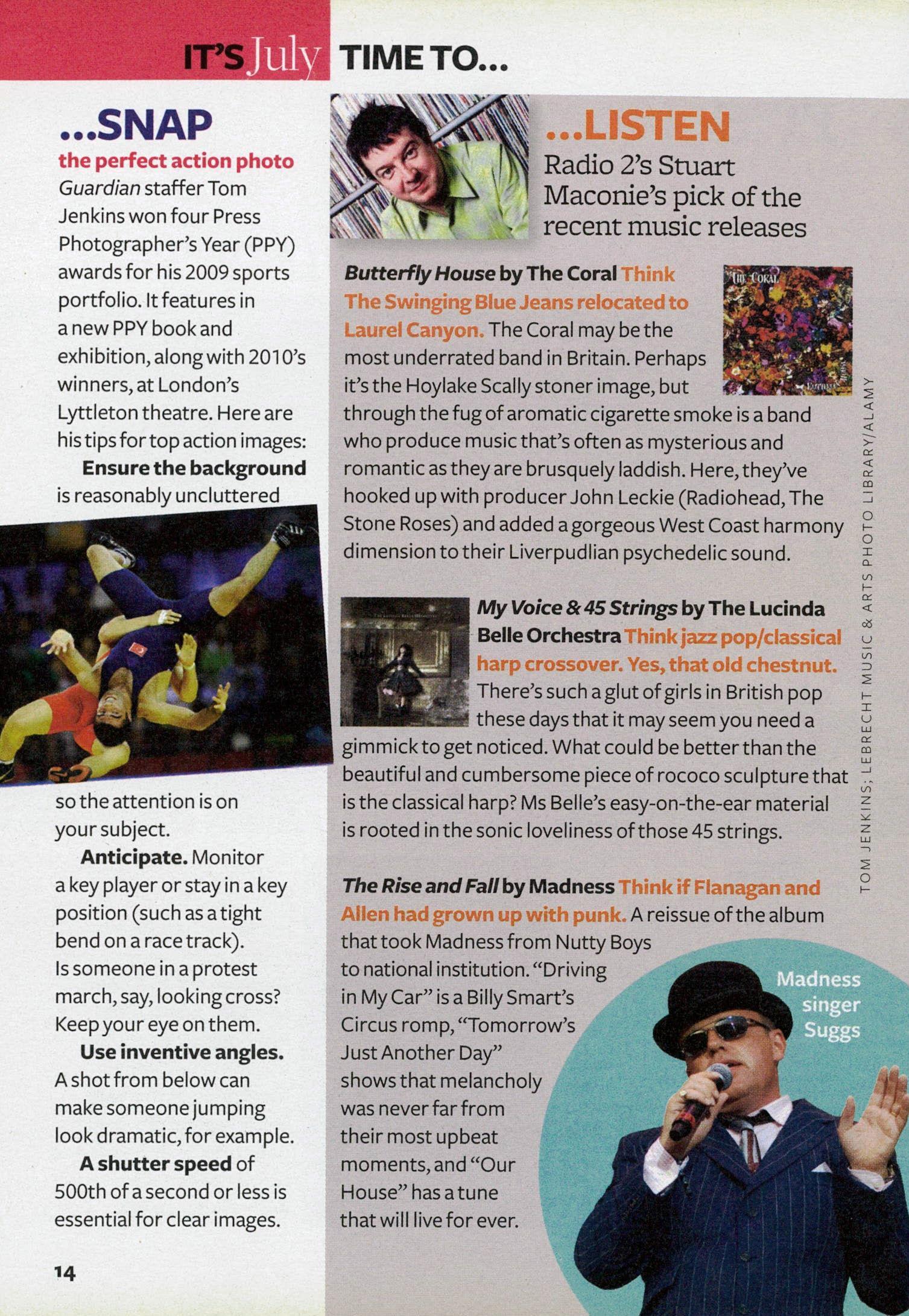
TOM JENKIN S; LEBRECHT MUSIC & ARTS PHO TO L IBRARY/ ALAMY 14
<
...CLIMB
our three most famous mountains in 24 hours
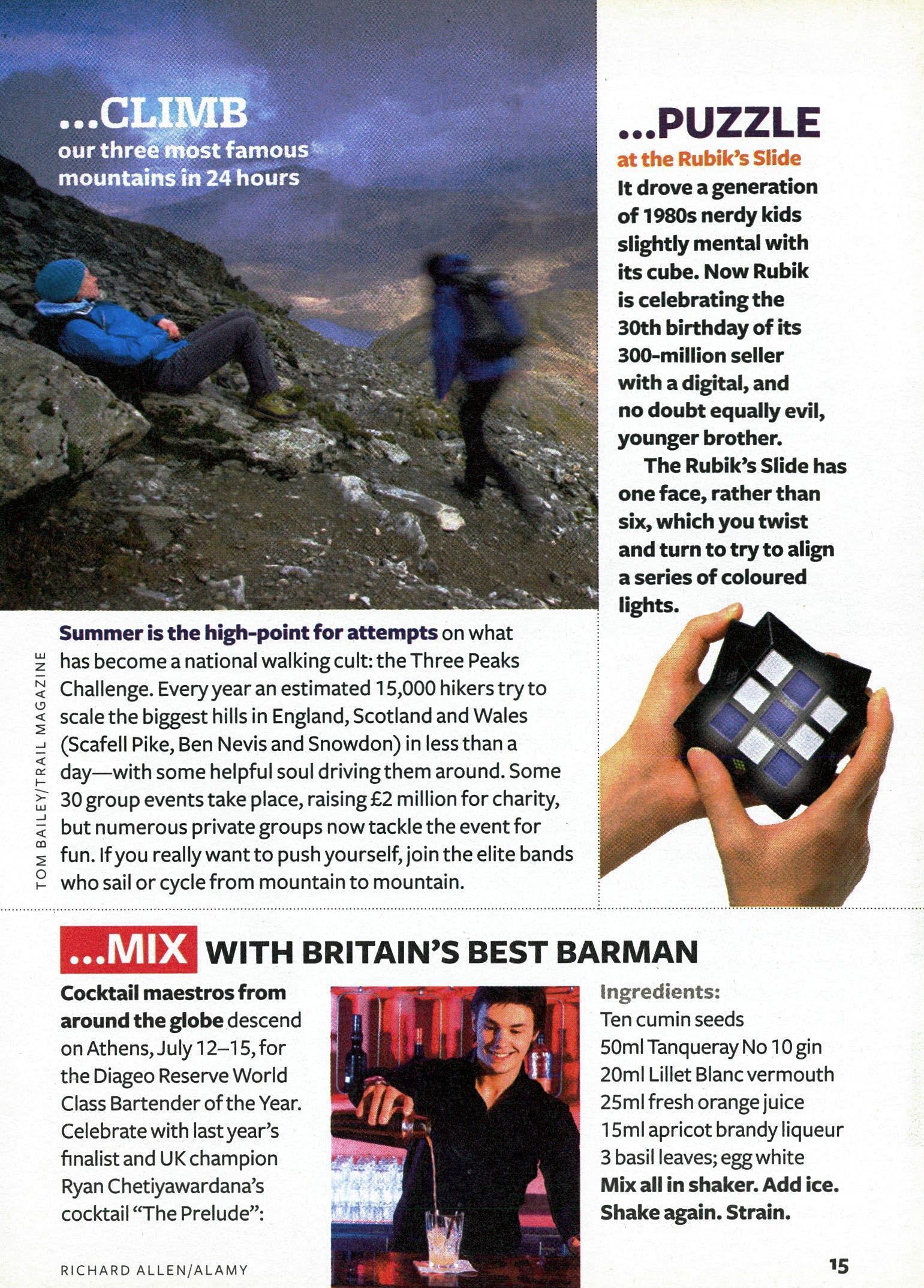
...PUZZLE
at the Rubik's Slide
It drove a generation of 1980s nerdy kids slightly mental with its cube. Now Rubik is celebrating the 30th birthday of its 300-million seller with a digital, and no doubt equally evil, younger brother.
The Rubik's Slide has one face, rather than six, which you twist and turn to try to align a series of coloured lights.
Summer is the high-point for attemptson what has become a national walking cult: the Three Peaks Challenge. Every year an estimated 15,000 hikers try to
scale the biggest hills in England, Scotland and Wales
2 (Scafell Pike, Ben Nevis and Snowdon) in less than a day—with some helpful soul driving them around. Some 30 group events take place, raising £2 million for charity,
.7' , but numerous private groups now tackle the event for
• fun. If you really want to push yourself, join the elite bands who sail or cycle from mountain to mountain.
...MIX WITH BRITAIN'S BEST BARMAN
Cocktail maestros from around the globedescend on Athens, July 12-15,for the Diageo Reserve World Class Bartender of the Year.
Celebrate with last year's finalist and UK champion Ryan Chetiyawardana's cocktail "The Prelude":
Ingredients:
Ten cumin seeds
50mITanqueray No 10 gin
20mILillet Blanc vermouth
25ml fresh orange juice
15m1 apricot brandy liqueur
3 basil leaves; egg white
Mix all in shaker. Add ice. Shake again. Strain.
•
RICHARD ALLEN/ALAMY
15
TIME TO...
...RACE ...READ
in peculiar ways
e The Blue Mile, Plymouth, Devon.Starting at the historic Mayflower Steps, entrants sail, swim or even surf one mile around the harbour (below). (July 3-4, thebluemile.org)
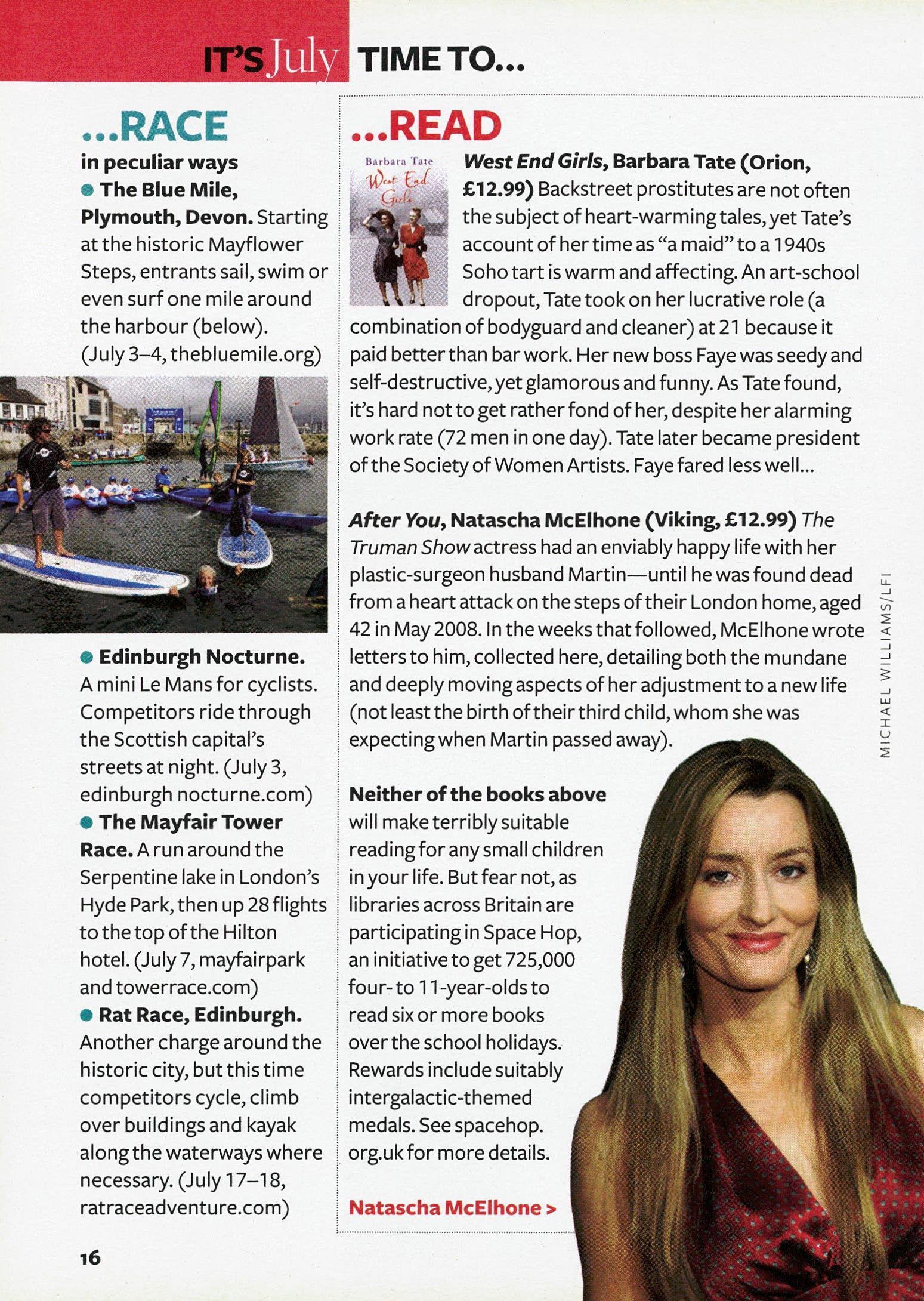
• Edinburgh Nocturne. A mini Le Mans for cyclists. Competitors ride through the Scottish capital's streets at night. (July 3, edinburgh nocturne.com)
• The Mayfair Tower Race.A run around the Serpentine lake in London's Hyde Park, then up 28 flights to the top of the Hilton hotel. (July 7, mayfairpark and towerrace.com)
• Rat Race, Edinburgh. Another charge around the historic city, but this time competitors cycle, climb over buildings and kayak along the waterways where necessary. (July 17-18, ratraceadventure.com)
C-1
WestEnd Girls, Barbara Tate (Orion, £12.99)Backstreet prostitutes are not often the subject of heart-warming tales,yet Tate's account of her time as "a maid" to a 1940s Soho tart is warm and affecting. An art-school dropout, Tate took on her lucrative role (a combination of bodyguard and cleaner) at 21 because it paid better than bar work. Her new boss Faye was seedy and self-destructive,yet glamorous and funny. As Tate found, it's hard not to get rather fond of her, despite her alarming work rate (72 men in one day). Tate later became president of the Society of Women Artists. Faye fared less well...
After You, Natascha
McElhone (Viking, £12.99) The Truman Show actress had an enviably happy life with her plastic-surgeon husband Martin—until he was found dead from a heart attack on the steps of their London home, aged 42 in May 2008. In the weeks that followed, McElhone wrote letters to him, collected here, detailing both the mundane and deeply moving aspects of her adjustment to a new life (not least the birth of their third child, whom she was expecting when Martin passed away).
Neither of the books above will make terribly suitable reading for any small children in your life. But fear not, as libraries across Britain are participating in Space Hop, an initiative to get 725,000 four-to 11-year-olds to read six or more books over the school holidays. Rewards include suitably intergalactic-themed medals. See spacehop. org.uk for more details.
Natascha McElhone >
1111.111M
MI CHAEL W ILL IAMS/ LFI 16
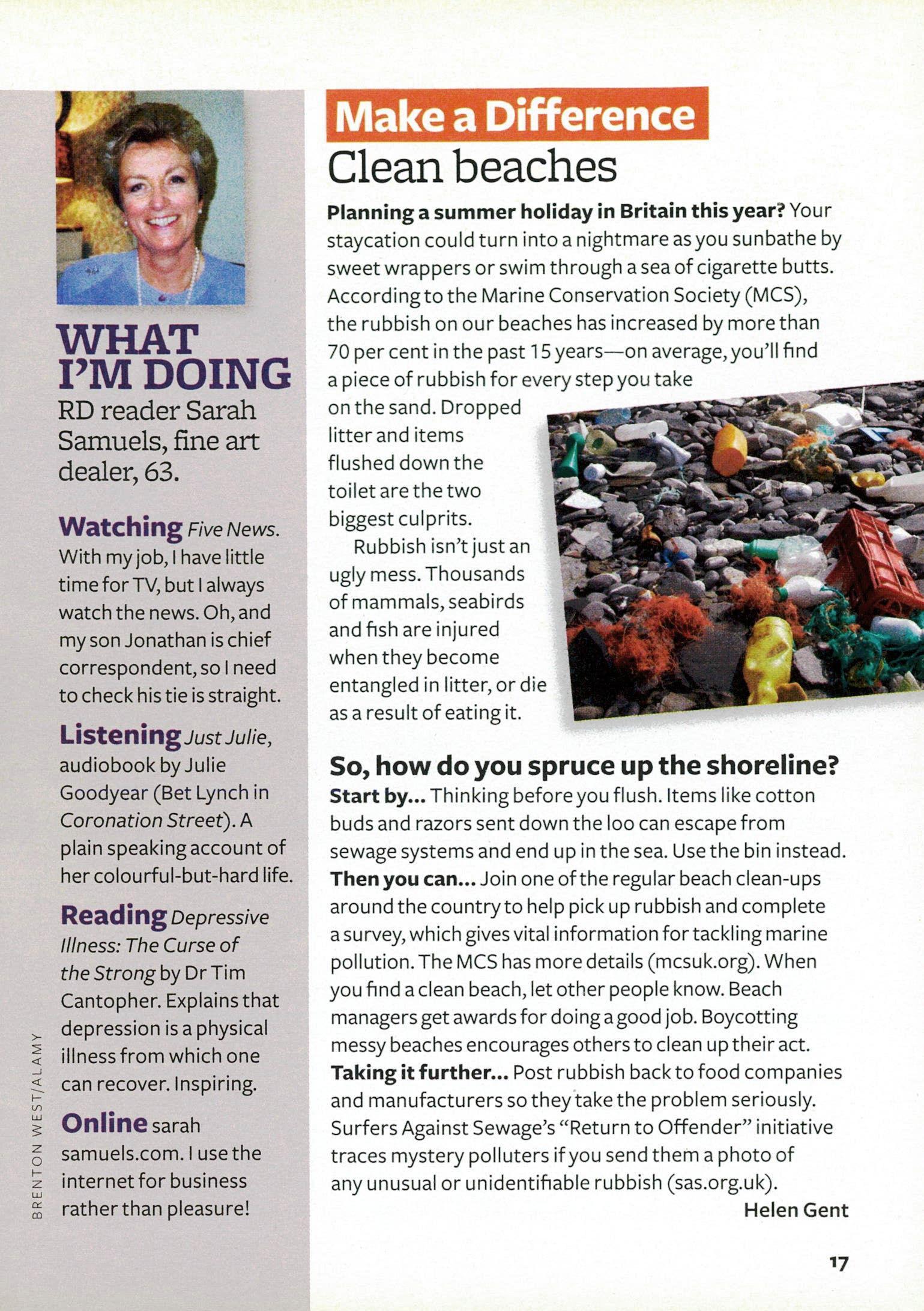
WHAT I'M DOING
RD reader Sarah Samuels, fine art dealer, 63.
WatchingFive News. With my job, I have little time for TV, but I always watch the news. Oh, and my son Jonathan is chief correspondent, so I need to check his tie is straight.
ListeningJust Julie, audiobook by Julie Goodyear (Bet Lynch in Coronation Street). A plain speaking account of her colourful-but-hard life.
ReadingDepressive Illness: The Curse of the Strong by Dr Tim Cantopher. Explains that depression is a physical illness from which one can recover. Inspiring.
Onlinesarah samuels.com. I use the internet for business rather than pleasure!
Make a Difference Clean beaches
Planning a summer holiday in Britain this year?Your staycation could turn into a nightmare as you sunbathe by sweet wrappers or swim through a sea of cigarette butts. According to the Marine Conservation Society (MCS), the rubbish on our beaches has increased by more than 70 per cent in the past 15 years—on average, you'll find a piece of rubbish for every step you take on the sand. Dropped litter and items flushed down the toilet are the two biggest culprits.
Rubbish isn't just an ugly mess. Thousands of mammals, seabirds and fish are injured when they become entangled in litter, or die as a result of eating it.
So, how do you spruce up the shoreline?
Start by...Thinking before you flush. Items like cotton buds and razors sent down the loo can escape from sewage systems and end up in the sea. Use the bin instead. Then you can...Join one of the regular beach clean-ups around the country to help pick up rubbish and complete a survey, which gives vital information for tackling marine pollution. The MCS has more details (mcsuk.org). When you find a clean beach, let other people know. Beach managers get awards for doing a good job. Boycotting messy beaches encourages others to clean up their act. Taking it further...Post rubbish back to food companies and manufacturers so theytake the problem seriously. Surfers Against Sewage's "Return to Offender" initiative traces mystery polluters if you send them a photo of any unusual or unidentifiable rubbish (sas.org.uk).
Helen Gent
B RENTON WES T/ ALAMY
17
r be over of one
Room service
boteh has .own open a town's doors to sick iCs
Life was good for Luke Tillen. The owner of the Hotel de la Mer in Torquay was married with a one-year-old son and another on the way. Work was hard, but fulfilling. Then, one evening last March, he watched Channel 4's
The SecretMillionaire, in which scrap-metal tycoon Gary Eastman sought out worthy causes to fund in Blackpool. One beneficiary was Donna's Dream House, a holiday home for sick children, set up by the parents of a girl who died of cancer.
"As a new father, I found it gutwrenching," says Luke, 33.1 was in tears."
He decided to give away the odd free holiday at his hotel during quiet periods to families with a seriously ill child or who had suffered bereavement. He contacted the National Alliance of Childhood Cancer Parent Organisations (NACCPO).
So delighted was NACCPO with his offer,
BY SUSANNAH HICKLING
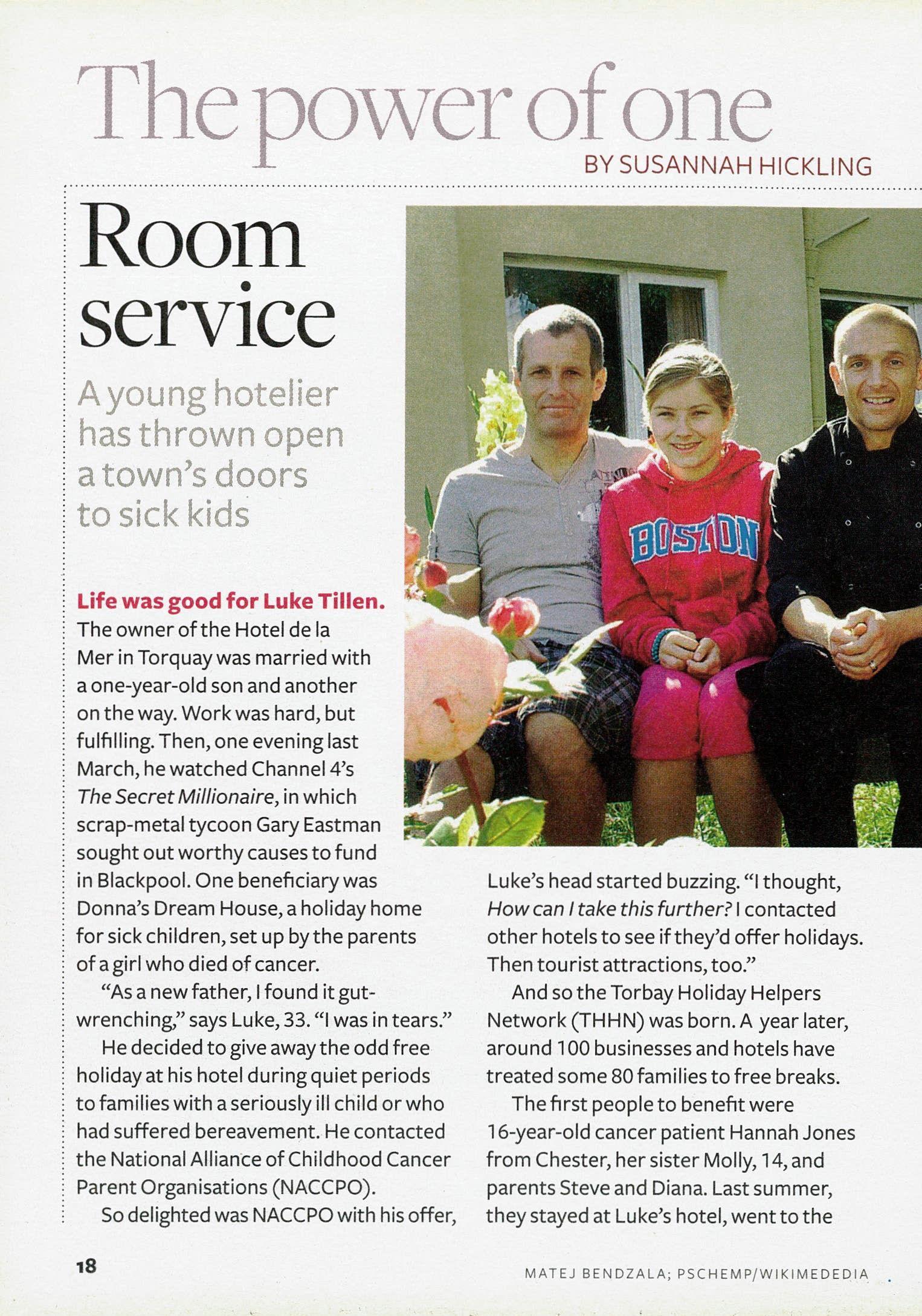
Luke's head started buzzing. "I thought, Howcan I take this further? I contacted other hotels to see if they'd offer holidays. Then tourist attractions, too."
And so the Torbay Holiday Helpers Network (THHN) was born. A year later, around 100 businesses and hotels have treated some 80 families to free breaks.
The first people to benefit were 16-year-old cancer patient Hannah Jones from Chester, her sister Molly, 14, and parents Steve and Diana. Last summer, they stayed at Luke's hotel, went to the
18 MATEJ BENDZALA; PSCHEMP/WIKIMEDEDIA
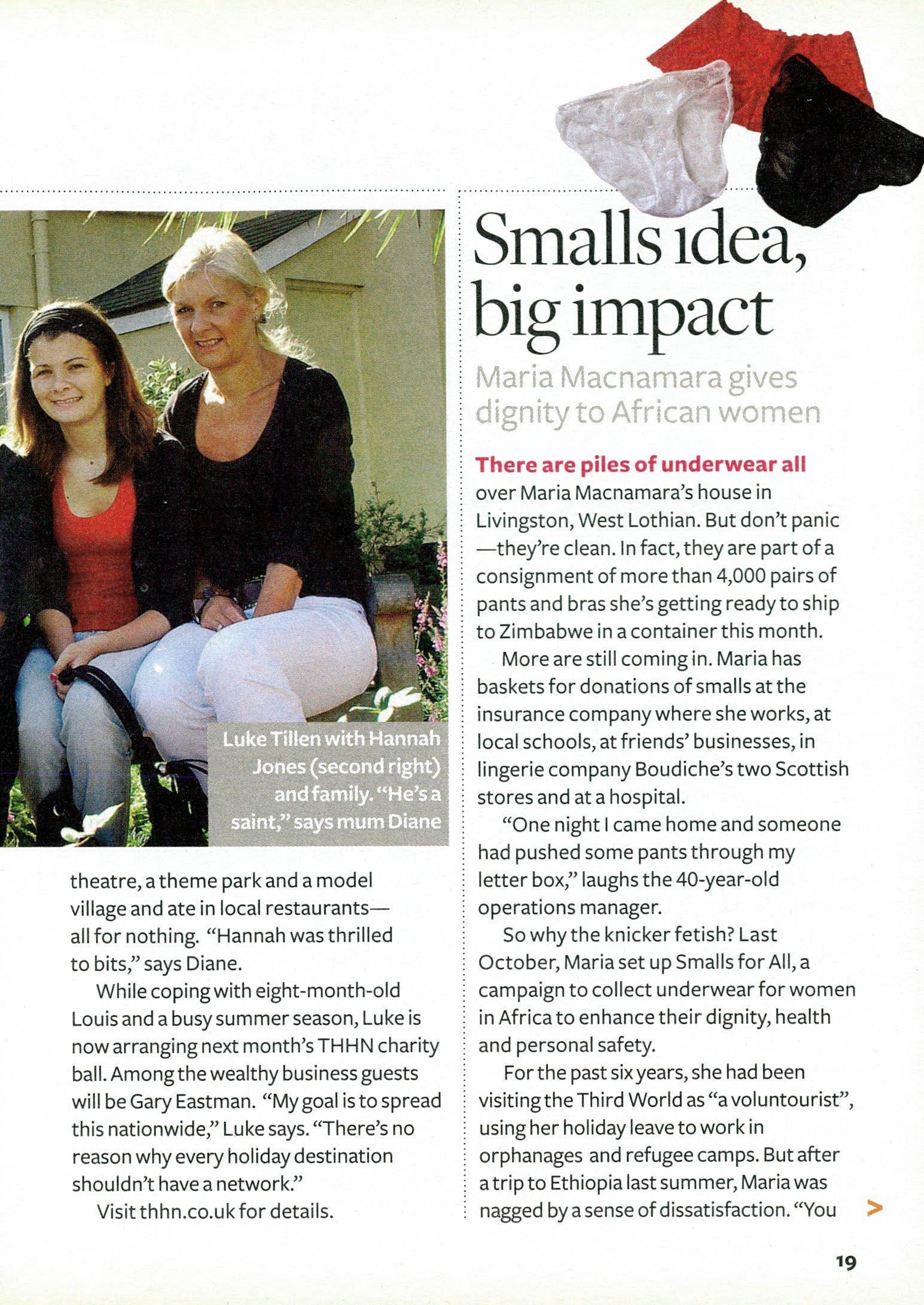
theatre, a theme park and a model village and ate in local restaurants— all for nothing. "Hannah was thrilled to bits," says Diane.
While coping with eight-month-old Louis and a busy summer season, Luke is now arranging next month's THHN charity ball. Among the wealthy business guests will be Gary Eastman. "My goal is to spread this nationwide," Luke says. "There's no reason why every holiday destination shouldn't have a network."
Visit thhn.co.uk for details.
mallslaea, big impact
Maria Macnamara gives dignity to African women
There are piles of underwear all over Maria Macnamara's house in Livingston, West Lothian. But don't panic —they're clean. In fact, they are part of a consignment of more than 4,000 pairs of pants and bras she's getting ready to ship to Zimbabwe in a container this month.
More are still coming in. Maria has baskets for donations of smalls at the insurance company where she works, at local schools, at friends' businesses, in lingerie company Boudiche's two Scottish stores and at a hospital.
"One night I came home and someone had pushed some pants through my letter box," laughs the 40-year-old operations manager.
So why the knicker fetish? Last October, Maria set up Smalls for All, a campaign to collect underwear for women in Africa to enhance their dignity, health and personal safety.
For the past sixyears, she had been visiting the Third World as "a voluntourist", using her holiday leave to work in orphanages and refugee camps. But after a trip to Ethiopia last summer, Maria was nagged by a sense of dissatisfaction. "You >
19
go in and do your bit,you flit in and flit out—I wanted to do something more sustainable," she explains.
She remembered an article she had read about Zimbabwe in which a priest revealed that poor women and girls who lacked underwear were more likely to be raped or sexually assaulted. Maria's online research and chats with charity workers bore this out. "In much of Africa, Ifyou have underwear it shows that someone—be it a husband or father—is looking afteryou, so you're less vulnerable," she says. Knickers also help prevent infections and bras boost women's self-confidence.
So Maria dashed off an email to friends, colleagues and family askingfor donations. She was amazed at the response. Some 1,500 garments came in and, this January, Mariatravelled to Kenya, distributingthe clothes at a camp for displaced persons. A blog (smallsforall. wordpress.com) and coverage in the Scottish press kept the
"It's mad, but it's all good." Maria has been sent more than 7,000 pairs of pants
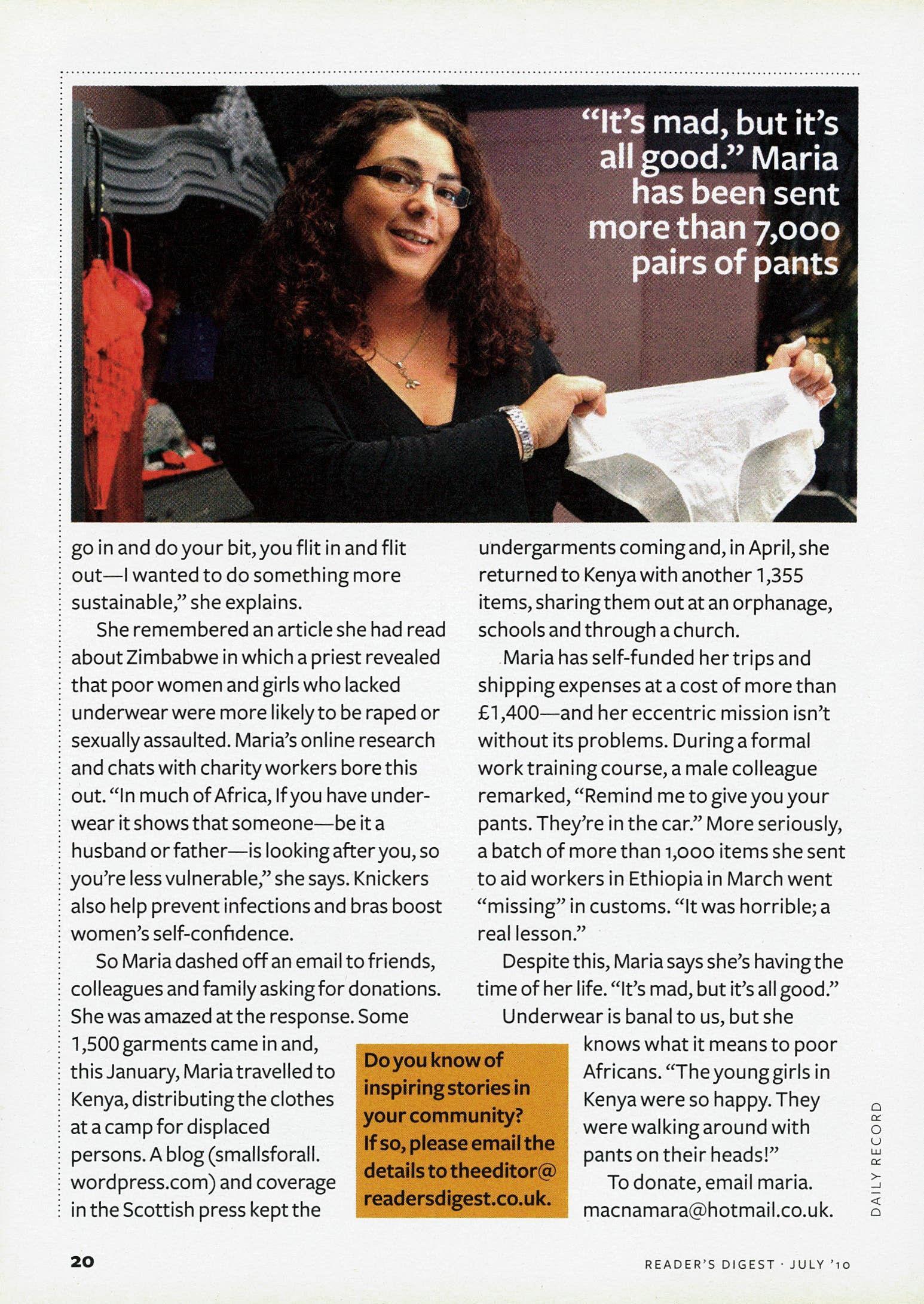
undergarments coming and, in April, she returned to Kenya with another 1,355 items, sharing them out at an orphanage, schools and through a church.
Maria has self-funded her trips and shipping expenses at a cost of more than £1,400—and her eccentric mission isn't without its problems. During a formal work training course, a male colleague remarked, "Remind me to give you your pants. They're in the car." More seriously, a batch of more than i,000 items she sent to aid workers in Ethiopia in March went "missing" in customs. "It was horrible; a real lesson."
Despite this, Maria says she's havingthe time of her life. "It's mad, but it's all good."
Doyou kno w of inspiring s tories in your comm unity?
If so, pleas e email the details tot heeditor@ readersdig est.co.uk.
Underwear is banal to us, but she knows what it means to poor Africans. "The young girls in Kenya were so happy. They were walking around with pants on their heads!"
To donate, email maria. macnamara@hotmail.co.uk.
DAILY RECORD 20 READER'S DIGEST • JULY '11:,
Reader's Digest Exclusive

NORTH CYPRUS
The best kept secret in the Mediterranean
Discover North Cyprus
North Cyprus is one of the few places in the world yet to be discovered by mass tourism. When you step onto its shores it seems as if you have gone back in time. Uncrowded sandy beaches, picturesque villages and quayside restaurants are but a few of the attractions of this enchanting island.
Historically the location of this island has always tempted conquerors, from the Persians to the Romans, each leaving their own indelible mark.
N 0 Fifififigy PRUS
Oscars Club 4*
7nts fr £599
Bellapais Monastery Villa
7nts fr £659
The North Cyprus Discover Tour by Mosaic Holidays provides a great opportunity to experience the island's beauty and history.
For those who want to relax and enjoy the island at their own pace we have two incredible offers. Either staying by the seafront resort at the Oscars Club or in the foothills of the Kyrenia mountains at the Bellapais Monastery Village.
- Escorted Tourfr £599
trice Includes:
Return flights from Stansted & transfers Manchester & Heathrow
£20 supp
7nts in 4' Bellapais Monastery Village
7 dinners & 2 lunches
tour Kyrenia & Bellapais Monastery, which inspired Lawrence Durrell to write 'Bitter Lemons'
Tour the wailed city of Famagusta, ancient Roman ruins of Salamis and St Barnabas Monastery
Tour the divided city of Nicosia
Optional excursion to Kantara castle.
MOSAIC
HOLIDAYS
'
Call Today 020 8574 4000 ATO
Our company was conducting free body-massindex check-ups. When a stout colleague climbed onto the machine, it printed out a slip of paper telling him what his weight-toheight ratio was and what it ought to be.
"What does it say?" I asked.
"It says I need to increase my height by six inches," he replied.
Sobby Kurian
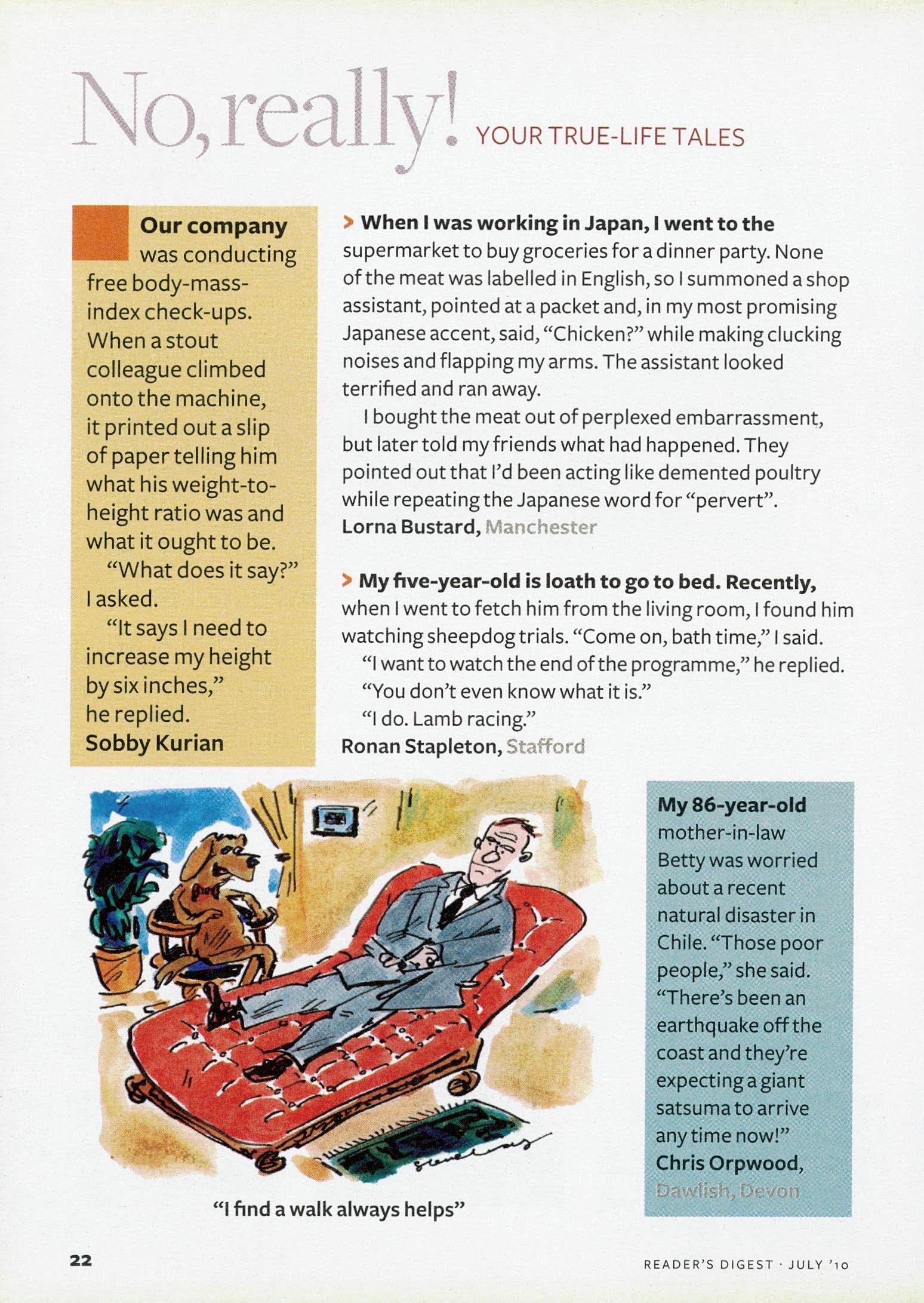
YOUR TRUE-LIFE TALES
> When I was working in Japan, I went to the supermarket to buy groceries for a dinner party. None of the meat was labelled in English, so I summoned a shop assistant, pointed at a packet and, in my most promising Japanese accent, said, "Chicken?" while making clucking noises and flapping my arms. The assistant looked terrified and ran away.
I bought the meat out of perplexed embarrassment, but later told my friends what had happened. They pointed out that I'd been acting like demented poultry while repeating the Japanese word for "pervert".
Lorna
Bustard, ,r
> My five-year-old is loath to go to bed. Recently, when I went to fetch him from the living room, I found him watching sheepdog trials. "Come on, bath time," I said.
"I want to watch the end of the programme," he replied.
"You don't even know what it is."
"I do. Lamb racing."
Ronan Stapleton, Yr.,
My 86-year-old mother-in-law
Betty was worried about a recent natural disaster in Chile. "Those poor people," she said. "There's been an earthquake off the coast and they're expecting a giant satsuma to arrive any time now!"
Chris Orpwood,
"I find a walk always helps"
22 READER'S DIGEST • JULY Ho
"Actually, I'm a bit surprised you got planning permission"
> At the end of a staff meeting, our headteacher asked us to come up with a date for the forthcoming parents' evening.
"What about February 31?"Iasked, somewhat facetiously.
The rest of the staff giggled, but the headmistress just looked confused.
Then the truth dawned on her, "Oh, I get it. It's a Saturday, isn't it?"
Miriam Hartill, Stourport onSevern, Worcestershire
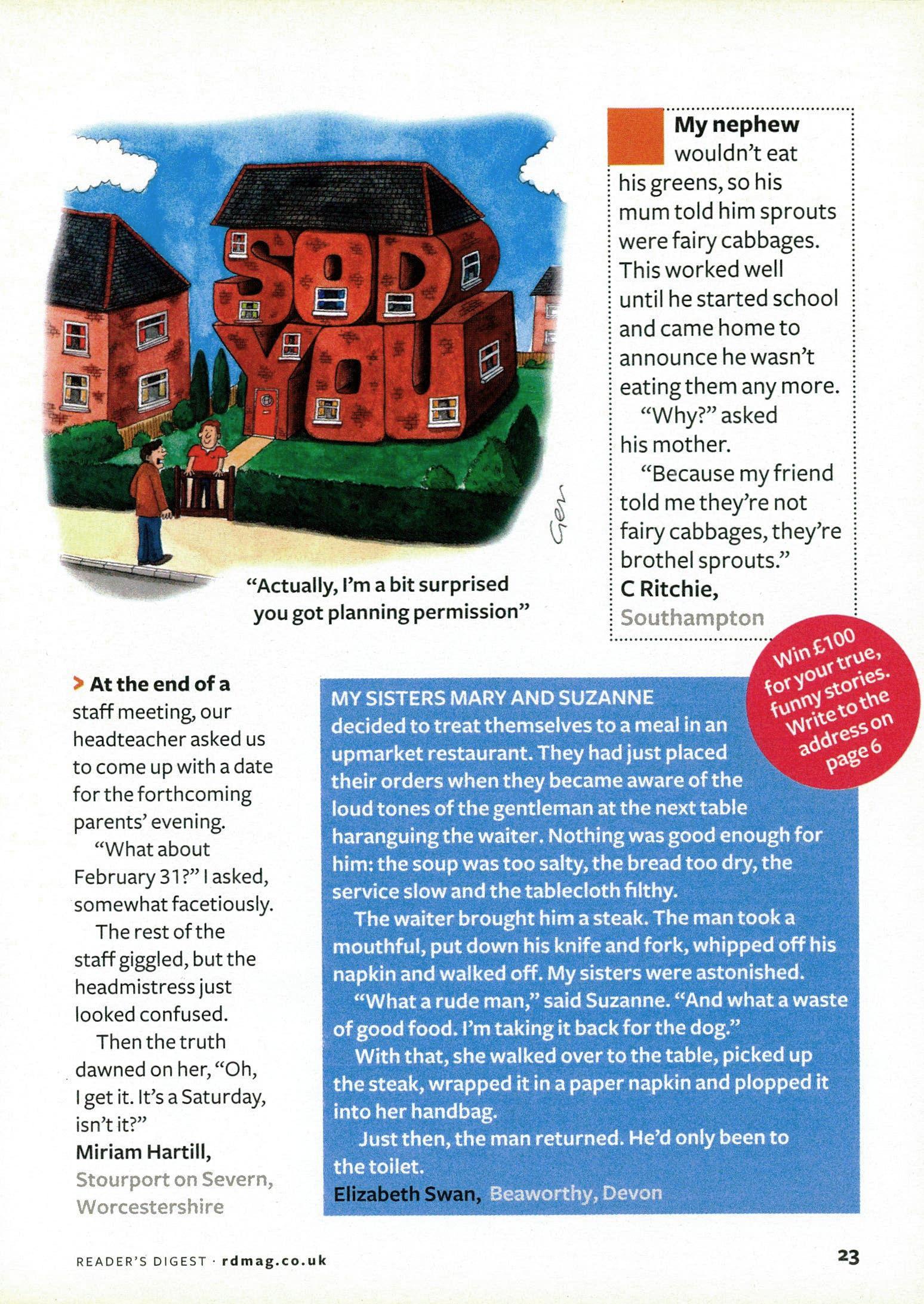
III My nephew wouldn't eat his greens, so his mum told him sprouts were fairy cabbages. This worked well until he started school and came home to announce he wasn't eating them any more. "Why?" asked his mother.
"Because my friend told me they're not fairy cabbages, they're brothel sprouts."
C Ritchie, Southampton
MY SISTERS MARY AND SUZANNE
decided to treat themselves to a meal in an upmarket restaurant. They had just placed their orders when they became aware of the loudtones of the gentleman at the next table haranguing the waiter. Nothing was good enough for him: the soup was too salty, the bread too dry, the service slow and the tableclothfilthy.
The waiter brought him a steak. The man took a mouthful, put down his knife and fork, whipped offhis napkinand walked off. My sisters were astonished.
"What a rude man," said Suzanne. "And what a waste of good food. I'm taking it back for the dog."
With that, she walked over to the table, picked up the steak, wrapped it in a paper napkin and plopped it into her handbag.
Just then, the man returned. He'd only been to the toilet.
Beaworthy, Devon
23
READER'S DIGEST rdmag.co.uk
CHOOSETHEFLORAPRO.ACTIV WAYTOHEARTCARE
Take extra steps to invest in your health - now and for the future
One of the major risk factors for heart disease - the UK's number 1 killer is high "bad" LDL cholesterol. But small changes to diet and lifestyle can make a big difference, helping to lower cholesterol levels and so protect the heart. Then there's Flora pro.activ...
Eat a healthy, balanced diet
"Include 5 portions of fruit and vegetables; meals based on starchy foods - bread, pasta, rice or potatoes; two portions of fish a week (at least one oily). Cut down on saturated fats, sugar, salt, alcohol. Eat less meat. Choose skinless chicken, and low-fat vegetarian alternatives." Nigel Denby, registered dietician. www.grub4life.org.uk
Exercise regularly 30 minutes each day if possible. Watch your weight
Eating healthy, moderate portions, along with routine physical exercise, will keep you in shape and help control cholesterol.
But you can do even more, thanks to Flora pro.activenriched with plant sterols clinically proven to have cholesterol-lowering effects. Trials confirm 2.0-2.5g of plant sterols every day can lead to a 10% reduction in LDL cholesterol and a further 5% when moving to a healthier diet and lifestyle. They work by partly blocking absorption of cholesterol in the gut; cholesterol not absorbed is then removed by the body.
Plant sterols occur naturally in vegetables, nuts and grains - but in very tiny amounts - making 2g unachievable.
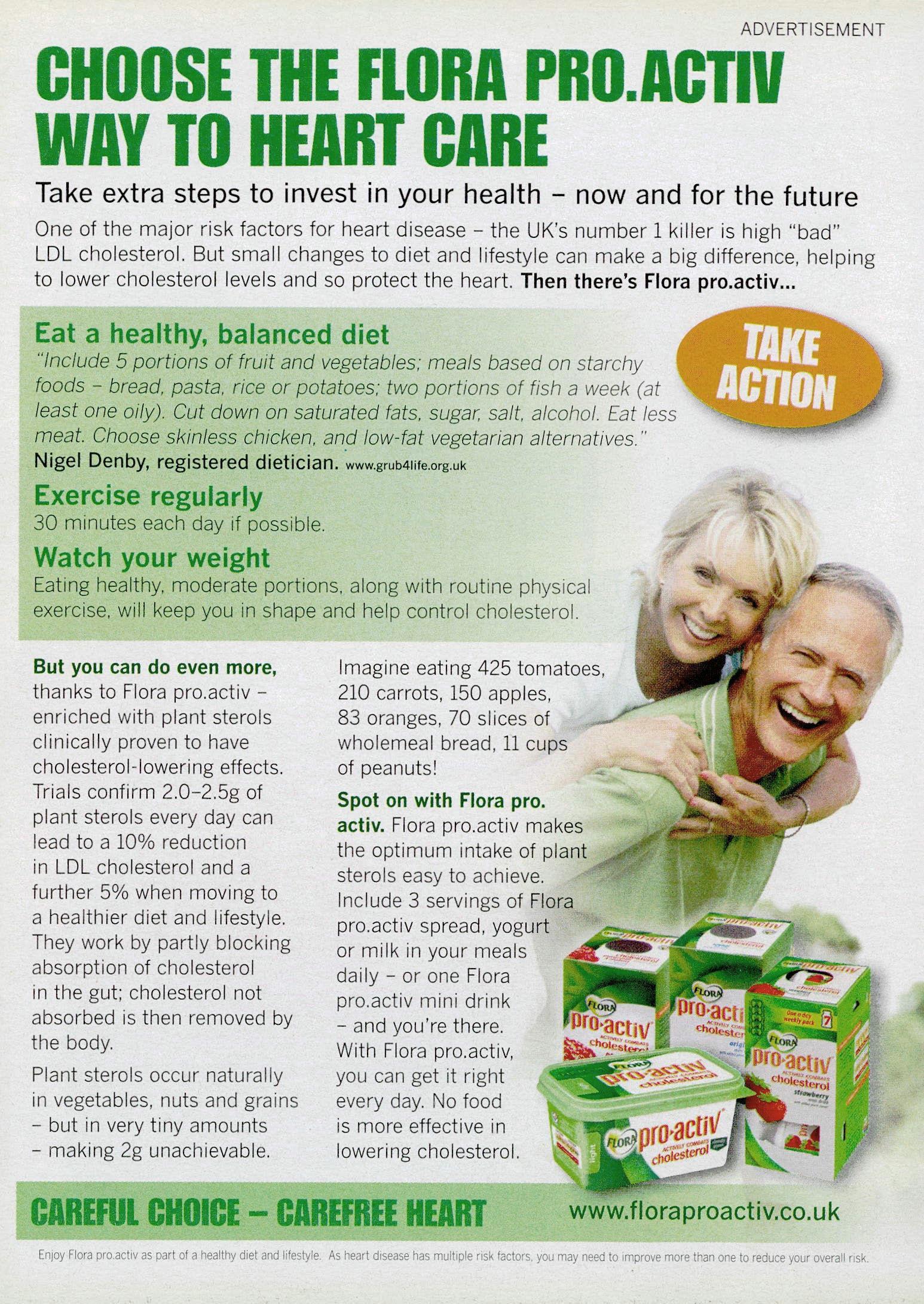
Imagine eating 425 tomatoes, 210 carrots, 150 apples, 83 oranges, 70 slices of wholemeal bread, 11 cups of peanuts!
Spot on with Flora pro. activ. Flora pro.activ makes the optimum intake of plant sterols easy to achieve. Include 3 servings of Flora pro.activ spread, yogurt or milk in your meals daily - or one Flora pro.activ mini drink - and you're there. With Flora pro.activ, you can get it right every day. No food is more effective in lowering cholesterol.
ADVERTISEMENT
CAREFUL CHOICE CAREFREE HEART www.floraproactiv,co.uk Enjoy El,• ac! Eqrt , , ! , ',1y e As heart d,e, asn rc-r,kr„ctc educeveer Gvera!I sk
Word power
This month, one of the most famous jazz festivals in the world plays out in Montreux, Switzerland. Think your vocabulary swings? Find out by picking the correct definition for the words below—A, B or C.
scat v A: to get a theme. C: group of notes note wrong. B: improvise sung to one syllable. with sounds imitating instruments. C: make a stuttering trumpet noise.
embouchure n
A:way of puttingyour mouth to a mouthpiece. B:audience criticism. C:lung power.
coloraturan
A:elaborate vocal melody. B:violin. C: rough edge of a saxophone note.
MeliSMan A:third curtain call. B: sad musical
A WORD IS BORN
cornetn A: speaker. B:military tune. C: trumpet. scherzon A:two contrasting styles in a single song. B: guitar strumming. C:light, fast composition.
bebop n A: 1940s jazz.
B: upbeat rhythm. C: singing that simulates conversation.
polytonalityn
A:massed-voice singing. B:use of two or more keys. C:stodgy sound.
Snollygoster
From time to time, the Oxford English Dictionary reintroduces a word that's been lost for years. The most recent example is snollygoster, meaning a shrewd, unprincipled person, particularly a politician. Popular in the 19th century, it fell into disuse, only to reappear in the latest dictionaries after this year's election campaign. It's thought to come from the American slang word snallygaster, a mythical monster found in Maryland. Who knows, there might be a few snollygosters still knocking around the Houses of Parliament.
RD RATING Useful? 3/10 Likeable? 7/10
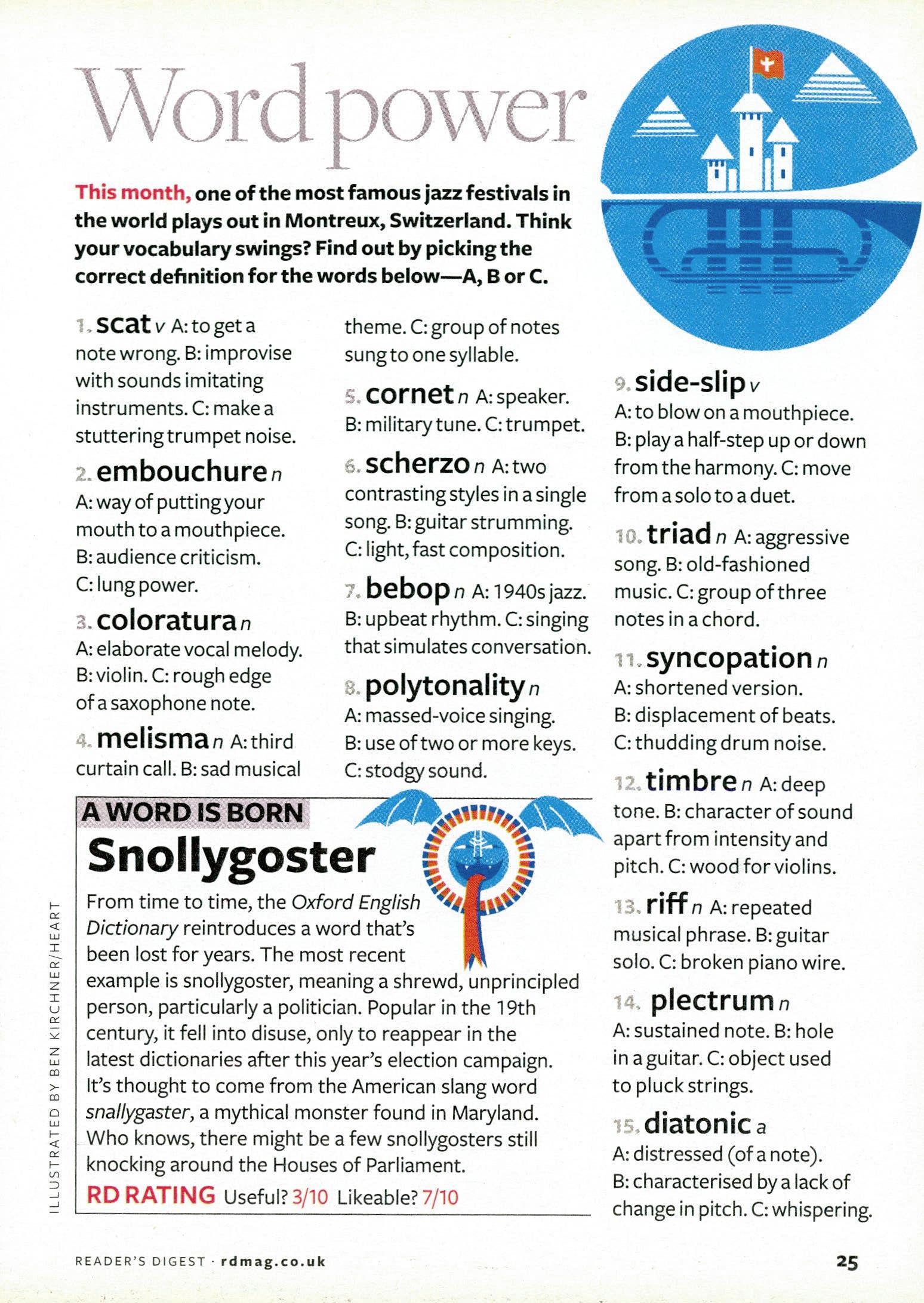
side-slip
v
A:to blow on a mouthpiece. B:playa half-step up or down from the harmony. C: move from a solo to a duet.
triad n A: aggressive song. B: old-fashioned music. C: group of three notes in a chord.
syncopation n
A:shortened version.
B:displacement of beats. C:thudding drum noise.
timbre n A: deep tone. B: character of sound apart from intensity and pitch. C: wood for violins.
riffn A: repeated musical phrase. B: guitar solo. C: broken piano wire.
plectrum s
A: sustained note. B: hole in a guitar. C: object used to pluck strings.
diatonic a
A:distressed (of a note).
B:characterised by a lack of change in pitch. C: whispering.
z 0
READER'S DIGEST rdmag.co.uk 25
Word Power Answers
scat—[B] improvised singing, using sounds that imitate instruments. "Ella Fitzgerald was a scatting genius." American English.
2.embouchure—[A] way of putting your mouth to a mouthpiece. French emboucher (put in or to the mouth).
3.coloratura—[A]elaborate vocal melody. Latin colorare (to colour).
4.melisma—[C]group of notes sung to one syllable. "I'm sure there was a melisma of 12 notes in that word." Greek. cornet—[C]trumpet. "He played the 'Last Post' on his cornet." Latin cornu (horn).
6.scherzo—[C]light, fast composition. "The scherzo made for lovely light relief." Italian (jest).
7. bebop—[A] 1940s jazz. "Charlie Parker helped to develop bebop!' American English.
8.polytonality—[B]use of two or more keys. Greek polus tonos (much tone).
9.side-slip—[B]play to a half-step up or down from the harmony. "The side-slipping put the drummer off."
WordJourney
No one knows exactly where the term jazz comes from. It was popularised in the US, but the word was probably invented on the Gold Coast of Africa and imported by slaves. Jazz was first regularly used in the early 20th century to mean a sort of ragtime dance, and then the sort of music to which it was danced. It was also used as a verb, meaning to liven up. So the word is as shifting and unpredictable as the music!
beats. "The syncopation added surprise to his performance." Greeksunkope (cut off).
timbre—[B] character of sound apart from intensity and pitch. "Bing Crosby had a timbre that many try to emulate."
How
Did p
94 good atte 1 you're starting impress us her you're a word-po wizard
13.riff—[A]repeated musical phrase. Short for riffling, a variant of ruffling (Middle English, unknown origin).
4 plectrum—[C] object used to pluck strings. "Les Paul's plectrum was worn to nothing." Greek plektron (striking object).
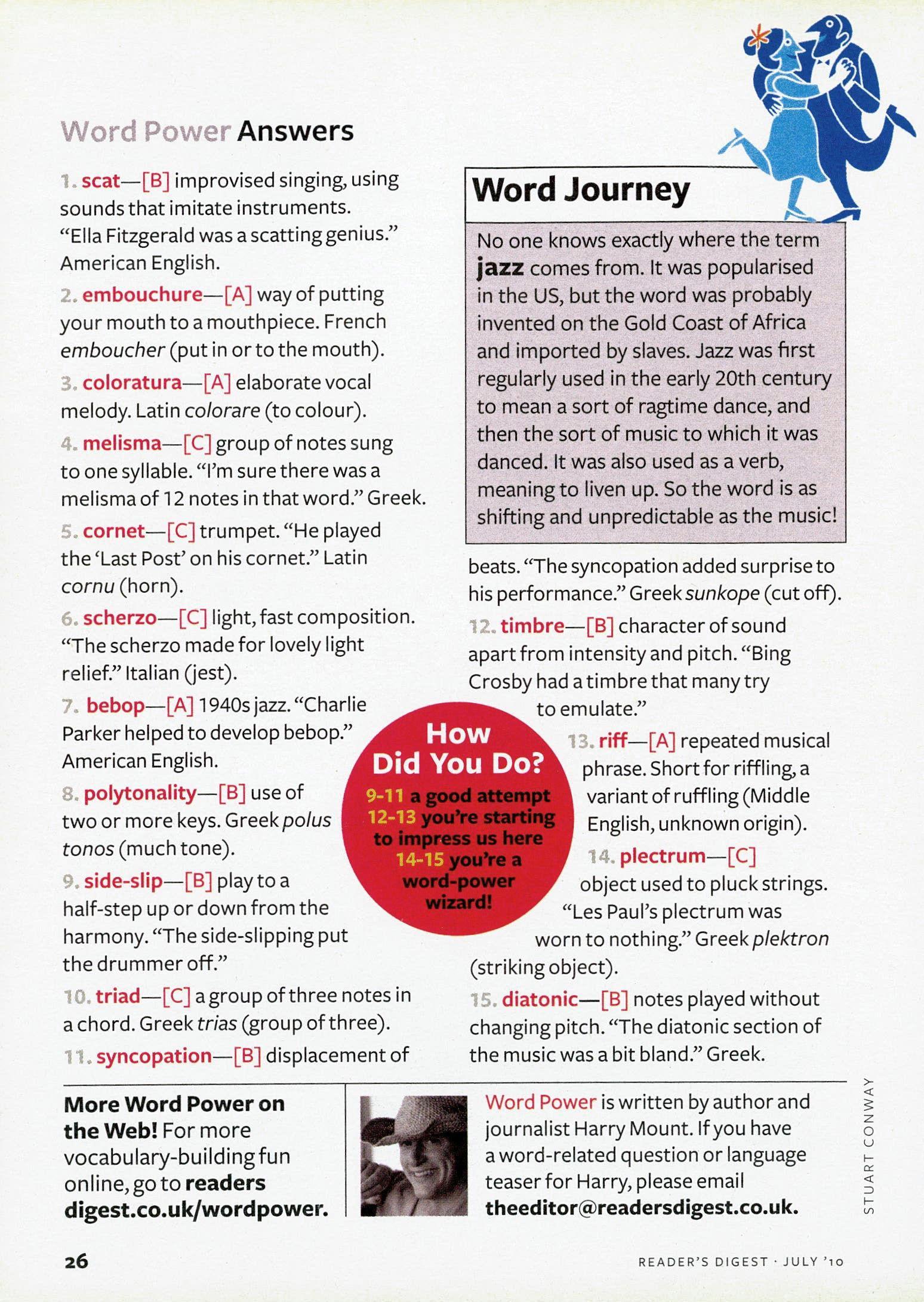
10.triad—[C]a group of three notes in a chord. Greektrias (group of three). syncopation—[B]displacement of
More Word Power on the Web!For more vocabulary-building fun online, go toreaders digest.co.uk/wordpower.
15.diatonic—[B]notes played without changing pitch. "The diatonic section of the music was a bit bland." Greek.
Word Power is written by author and journalist Harry Mount. If you have a word-related question or language teaser for Harry, please email theeditor@readersdigest.co.uk.
*PA tr0: i*11ikk t
STUART CONWAY
26 READER'S DIGEST • JULY '10
Fast facts
TO IMPRESS YOUR FRIENDS!
Forty per cent of British people believe in angels. In America, the figure is 71 per cent— as opposed to 47 per cent who believe in evolution.
Plus ca change corner: in 1857, a debate raged in medical journalThe Lancet about the health risks of tobacco. The other two big debates inThe Lancet that year were on the dangers of food additives and whether homeopathy is real medicine.
Ace face Fred Perry f'
The country that has won the most Wimbledon men's singles titles is—wait for it—Britain. with (Admittedly, 32 of those were before 1910, when fewer non-Brits took part, and the other three were Fred Perry.)

IN JANE AUSTEN'S NORTHANGER ABBEY, THE HEROINE CATHERINE MORELAND IS A KEEN BASEBALL PLAYER. At the current rate of progress, it's estimated that we should have discovered all the species of insects just over 15,000 years from now.
GREAT QUOTES ON EATING
A bachelor's recipe for omelette: add contents of fridge to two eggs and cook until everything stops wiggling.
P R :crke
Is Elizabeth Taylor fat? Her favourite food is seconds. Joan Rivers I bought all those Jane Fonda videos. I love to sit and eat cookies and watch them.
Paolon
The best indicator of a man's honesty isn't his income tax return. It's the zero adjustment on his bathroom scales. Arthur C Chrke
My doctor told me to stop having intimate dinners for four, unless three other people are present. Orson
BY JAMES WALTON. PHOTOS: JON SULLIVAN/PDPHOTO.ORG (ANGEL) 27
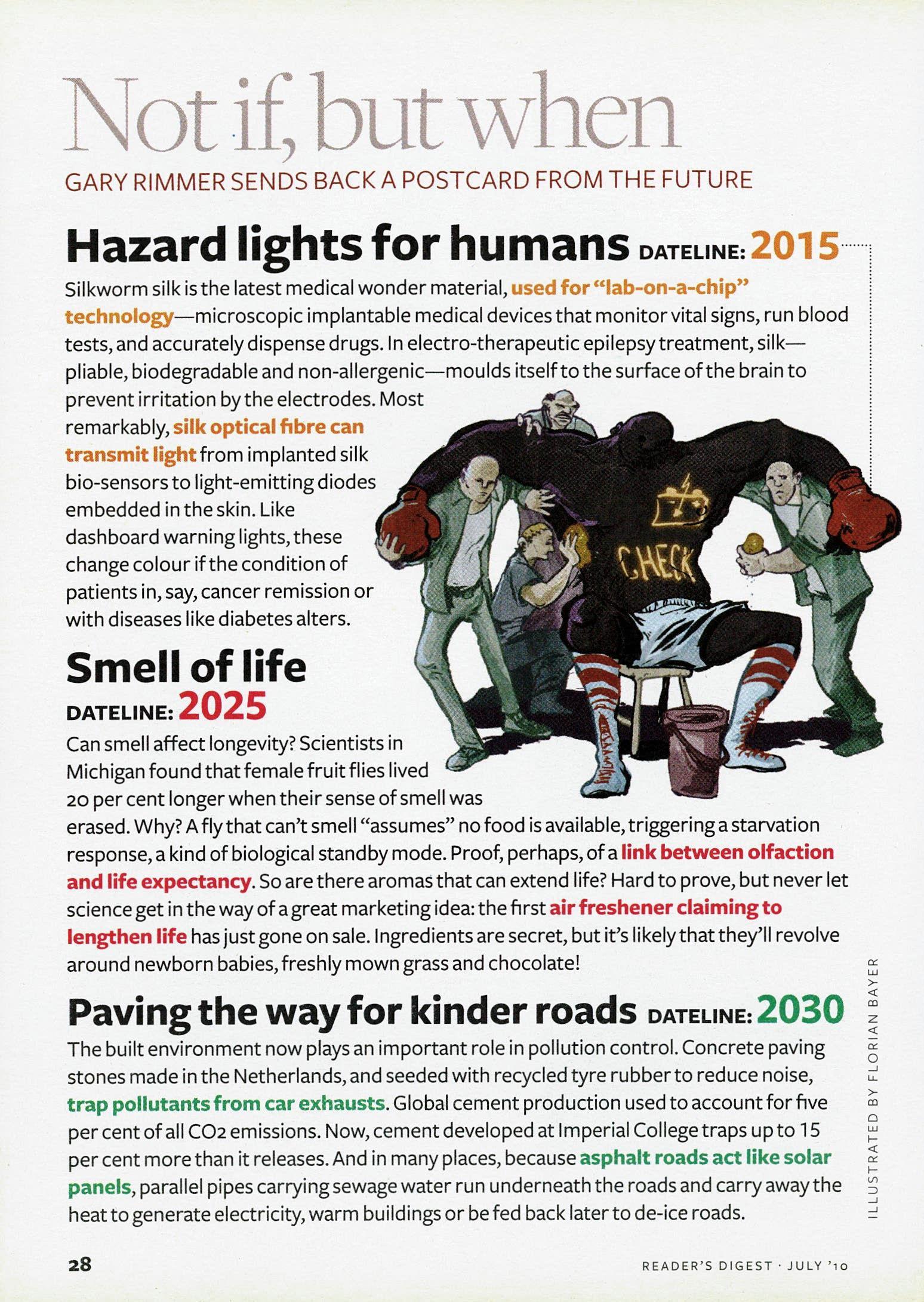
Not if, but when
GARY RIMMER SENDS BACK A POSTCARD FROM THE FUTURE
Hazard lights for humans DATELINE:2015
Silkworm silk is the latest medical wonder material,used for "lab-on-a-chip" technology—microscopicimplantable medical devices that monitor vital signs, run blood tests, and accurately dispense drugs. In electro-therapeutic epilepsy treatment, silk— pliable, biodegradable and non-allergenic—moulds itself to the surface of the brain to prevent irritation bythe electrodes. Most remarkably,silk optical fibre can transmit lightfrom implanted silk bio-sensors to light-emitting diodes embedded in the skin. Like dashboard warning lights, these change colour if the condition of patients in, say, cancer remission or with diseases like diabetes alters.
Smell of life
DATELINE: 2025
Can smell affect longevity? Scientists in Michigan found that female fruit flies lived 20 per cent longer when their sense of smell was erased. Why? A fly that can't smell "assumes" no food is available, triggering a starvation response, a kind of biological standby mode. Proof, perhaps, of alink between olfaction and life expectancy.So are there aromas that can extend life? Hard to prove, but never let science get in the way of a great marketing idea: the firstair freshener claiming to lengthen lifehas just gone on sale. Ingredients are secret, but it's likely that they'll revolve around newborn babies, freshly mown grass and chocolate!
Paving the way for kinder roads DATELINE: 2030
The built environment now plays an important role in pollution control. Concrete paving stones made in the Netherlands, and seeded with recycled tyre rubber to reduce noise, trap pollutants from car exhausts.Global cement production used to account for five per cent of all CO2 emissions. Now, cement developed at Imperial College traps up to 15 per cent more than it releases. And in many places, becauseasphalt roads act like solar panels,parallel pipes carrying sewage water run underneath the roads and carry away the heat to generate electricity, warm buildings or be fed back later to de-ice roads.
ILLU S TRATED BY FL O RIAN B AY ER 28 READER'S DIGEST • JULY
Instant expert
THE OPEN CHAMPIONSH
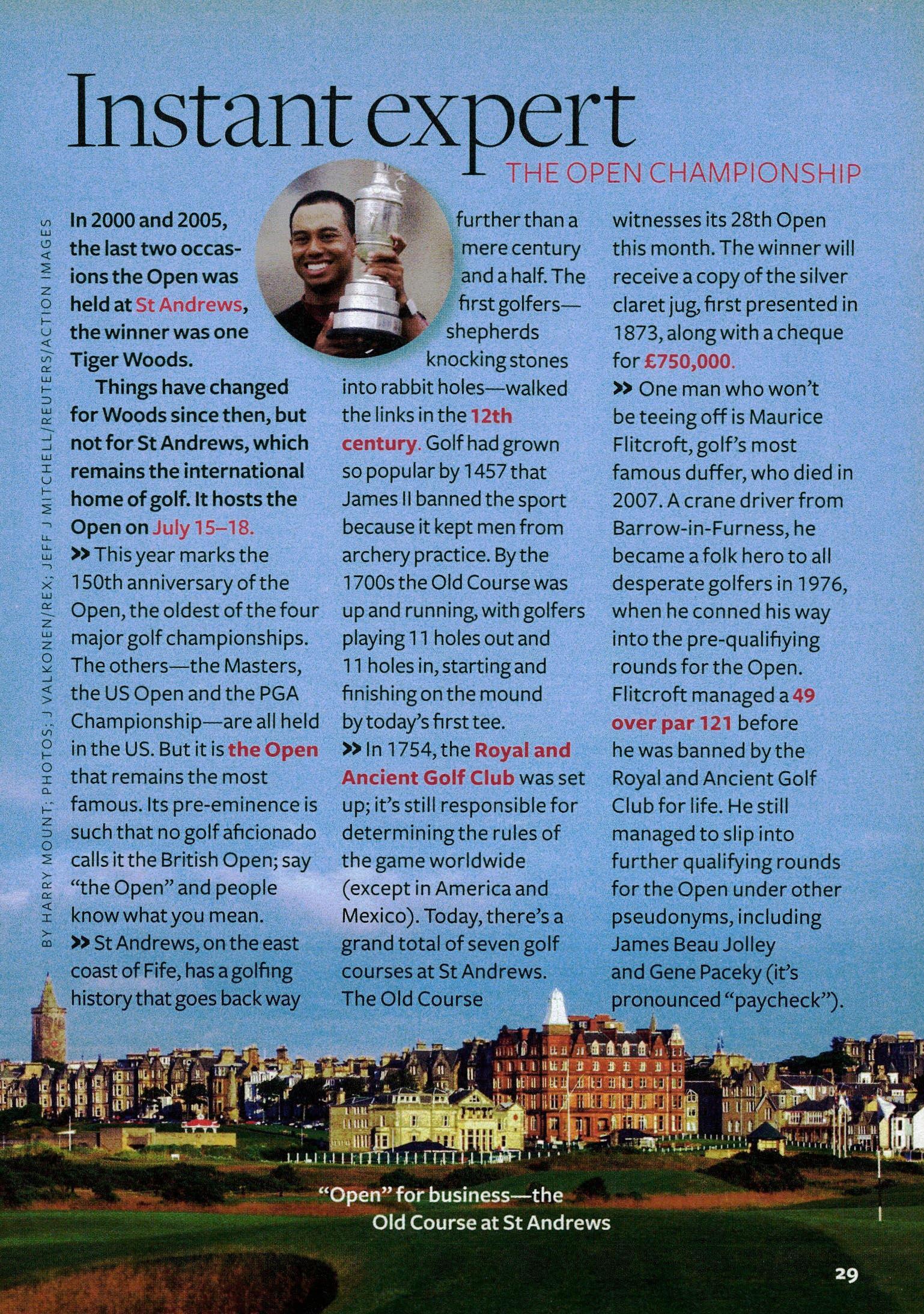
ES In 2000 and 2005, the last two occasions the Open was held at the winner was one Tiger Woods.
Things have changed for Woods since then, but not for St Andrews, which remains the international home of golf. It hosts the Open on July 15-18.
>> Thisyear marks the 150th anniversary of the Open, the oldest of the four major golf championships. The others—the Masters, the US Open and the PGA Championship—are all held in the US. But it is that remains the most famous. Its pre-eminence is such that no golf aficionado calls it the British Open; say "the Open" and people know what you mean.
>> St Andrews, on the east coast of Fife, has a golfing history that goes back way
further than a mere century and a half. The first golfers— shepherds knocking stones into rabbit holes—walked the links in the , Golf had grown so popular by 1457 that James II banned the sport because it kept men from archery practice. By the 1700s the Old Course was up and running, with golfers playing 11 holes out and 11 holes in, starting and finishing on the mound by today's first tee.
>> In 1754, the Royal and Ancient Golf Clubwas set up; it's still responsible for determining the rules of the game worldwide (except in America and Mexico). Today, there's a grand total of seven golf courses at St Andrews.
The Old Course
witnesses its 28th Open this month. The winner will receive a copy of the silver claret jug, first presented in 1873, along with a cheque for
>> One man who won't be teeing off is Maurice Flitcroft, golf's most famous duffer, who died in 2007. A crane driver from Barrow-in-Furness, he became a folk hero to all desperate golfers in 1976, when he conned his way into the pre-qualifiying rounds for the Open. Flitcroft managed a49 over par 121 before he was banned by the Royal and Ancient Golf Club for life. He still managed to slip into further qualifying rounds for the Open under other pseudonyms, including James Beau Jolley and Gene Paceky (it's pronounced "paycheck").
BY HA RRY MOUNT; PHO TOS; J VALKONE N/ REX; JE FF J MITCH ELL/ REUTER S/ AC TION MAG
11I Intl bill bkiil 11411. 1 ' ', ie., mew n: •fiiiii I. r ; 1 ..MI II •1 ...[ 1 1..1 41 I I I 1.111-1 I i.1 1-1471 9' 11336 311•Li ••• ---faY t 11.11 " ft "Open" for business—the Old Course at St Andrews
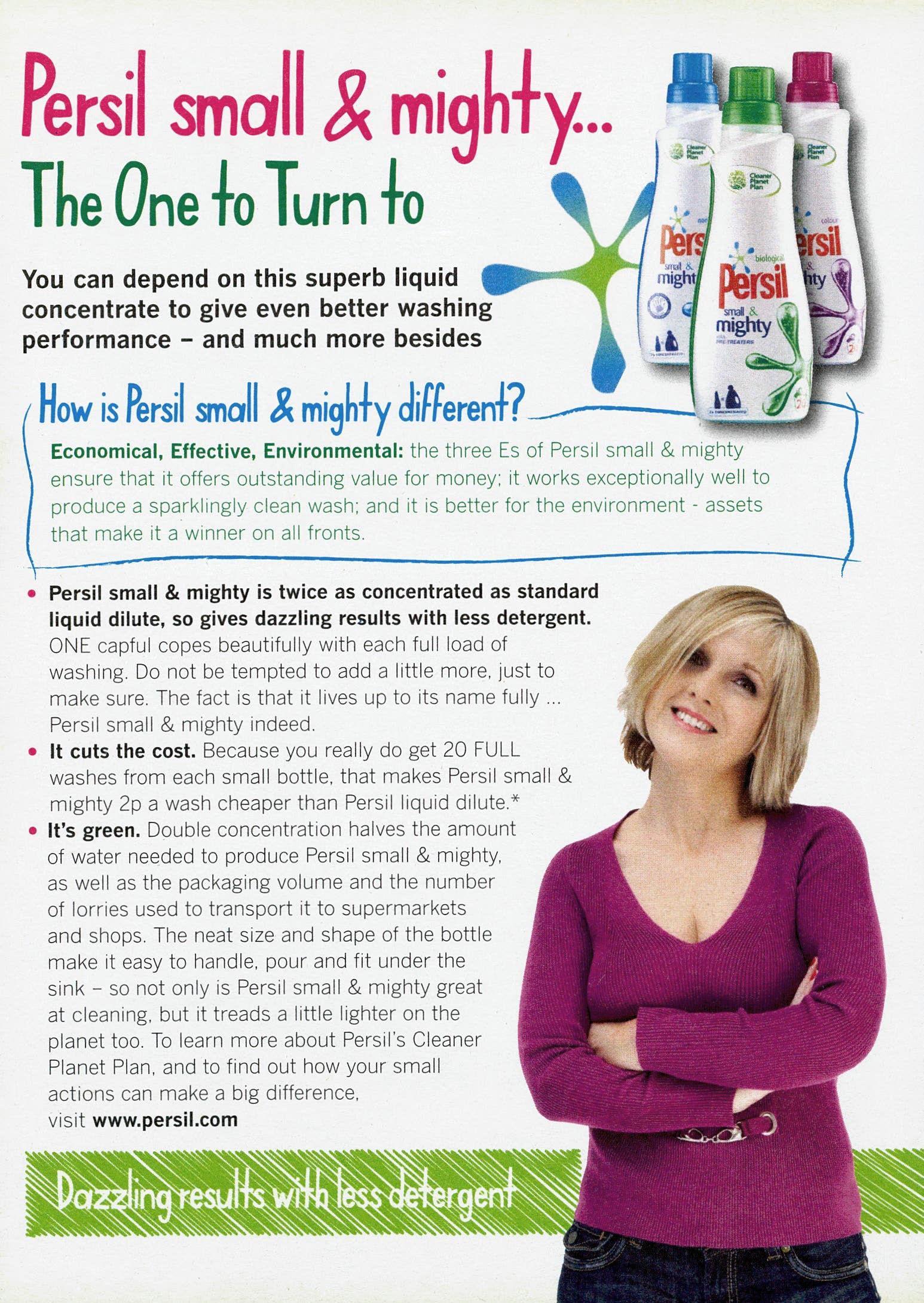
PersilsmallA
TheOne-toTurnID
You can depend on this superb liquid concentrate to give even better washing performance - and much more besides
HowisPersilsmall Amighty
Economical, Effective, Environmental: the three Es of Persil small & mighty ensure that it offers outstanding value for money; it works exceptionally well to produce a sparklingly clean wash; and it is better for the environment - assets that make it a winner on all fronts.
• Persil small & mighty is twice as concentrated as standard liquid dilute, so gives dazzling results with less detergent. ONE capful copes beautifully with each full load of washing. Do not be tempted to add a little more, just to make sure. The fact is that it lives up to its name fully ... Persil small & mighty indeed.
• It cuts the cost. Because you really do get 20 FULL washes from each small bottle, that makes Persil small & mighty 2p a wash cheaper than Persil liquid dilute.*
• It's green. Double concentration halves the amount of water needed to produce Persil small & mighty, as well as the packaging volume and the number of lorries used to transport it to supermarkets and shops. The neat size and shape of the bottle make it easy to handle, pour and fit under the sink - so not only is Persil small & mighty great at cleaning, but it treads a little lighter on the planet too. To learn more about Persil's Cleaner Planet Plan, and to find out how your small actions can make a big difference, visit www.persil.com
Wtt 2w / was aihioL / Pe-elei / Ong,COMea COldat
/00•6 36.1.10- (-or a roidee;le wait gu/ lak ward ie-oe C (-;' woeh zo wa1+t.44 a omyet. - 611 we.; /4r Now- / wort:" we/ 'rm.- a covz.v.e.e) /o- Pedid imaff
Sia Armitt, Berkshire
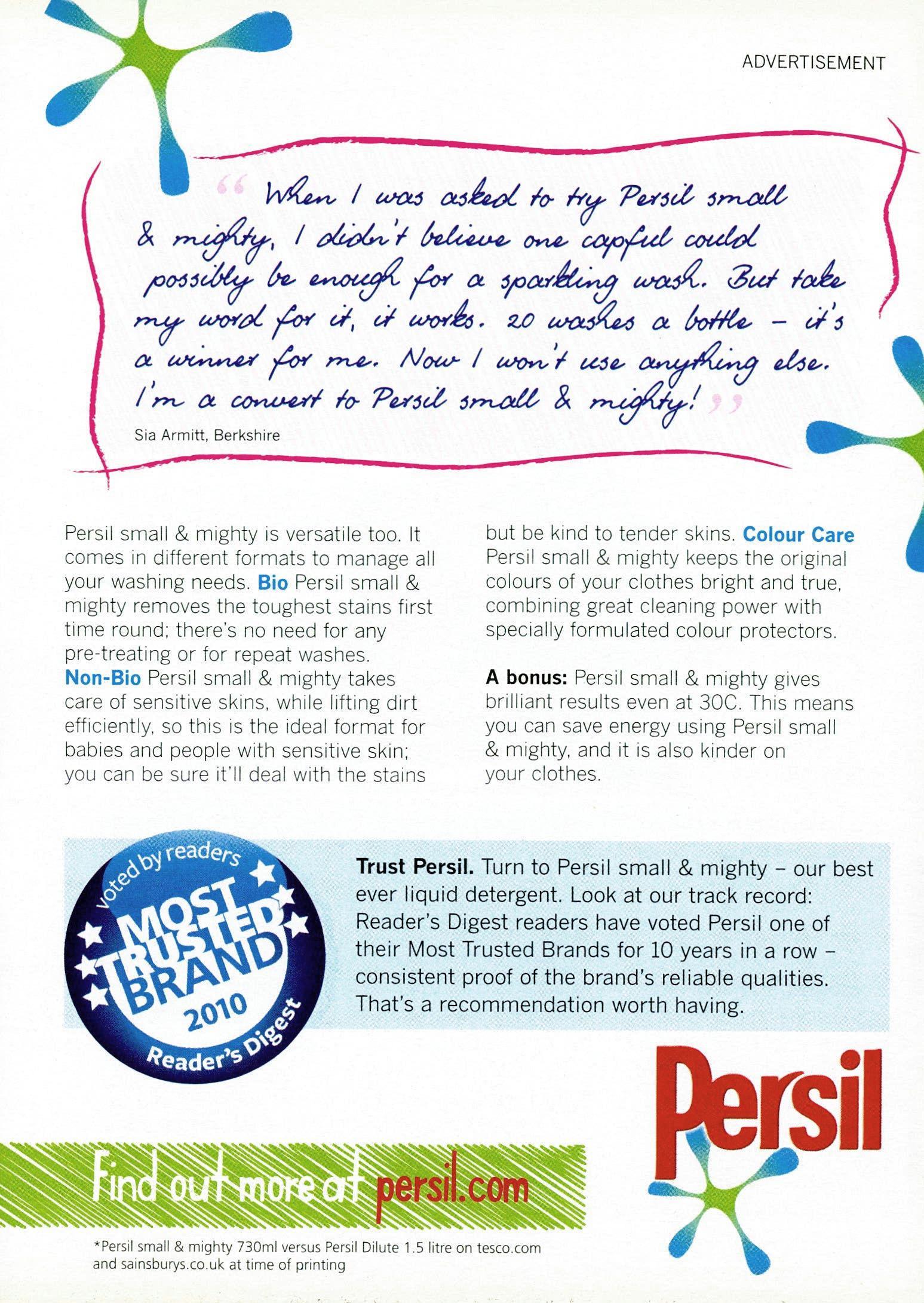
Persil small & mighty is versatile too. It comes in different formats to manage all your washing needs. Bio Persil small & mighty removes the toughest stains first time round; there's no need for any pre-treating or for repeat washes.
Non-Bio Persil small & mighty takes care of sensitive skins, while lifting dirt efficiently, so this is the ideal format for babies and people with sensitive skin; you can be sure it'll deal with the stains
but be kind to tender skins. Colour Care Persil small & mighty keeps the original colours of your clothes bright and true, combining great cleaning power with specially formulated colour protectors.
A bonus: Persil small & mighty gives brilliant results even at 30C. This means you can save energy using Persil small & mighty, and it is also kinder on your clothes.
Trust Persil. Turn to Persil small & mighty - our best ever liquid detergent. Look at our track record: Reader's Digest readers have voted Persil one of their Most Trusted Brands for 10 years in a rowconsistent proof of the brand's reliable qualities. That's a recommendation worth having.
ADVERTISEMENT
11‘,... N . -... -.4s,..,,,.... -.44..........z.. ,..., -..,-,:r.....:,,,,.: 4f 1 ' ''' ' term c zaw,„ ,Ist,4k.,v. _ _ _• on* "Persil small & mighty 730m1 versus Persil Dilute 1.5 litre on tesco.com and sainsburys.co.uk at time of printing
If I ruled theworld...
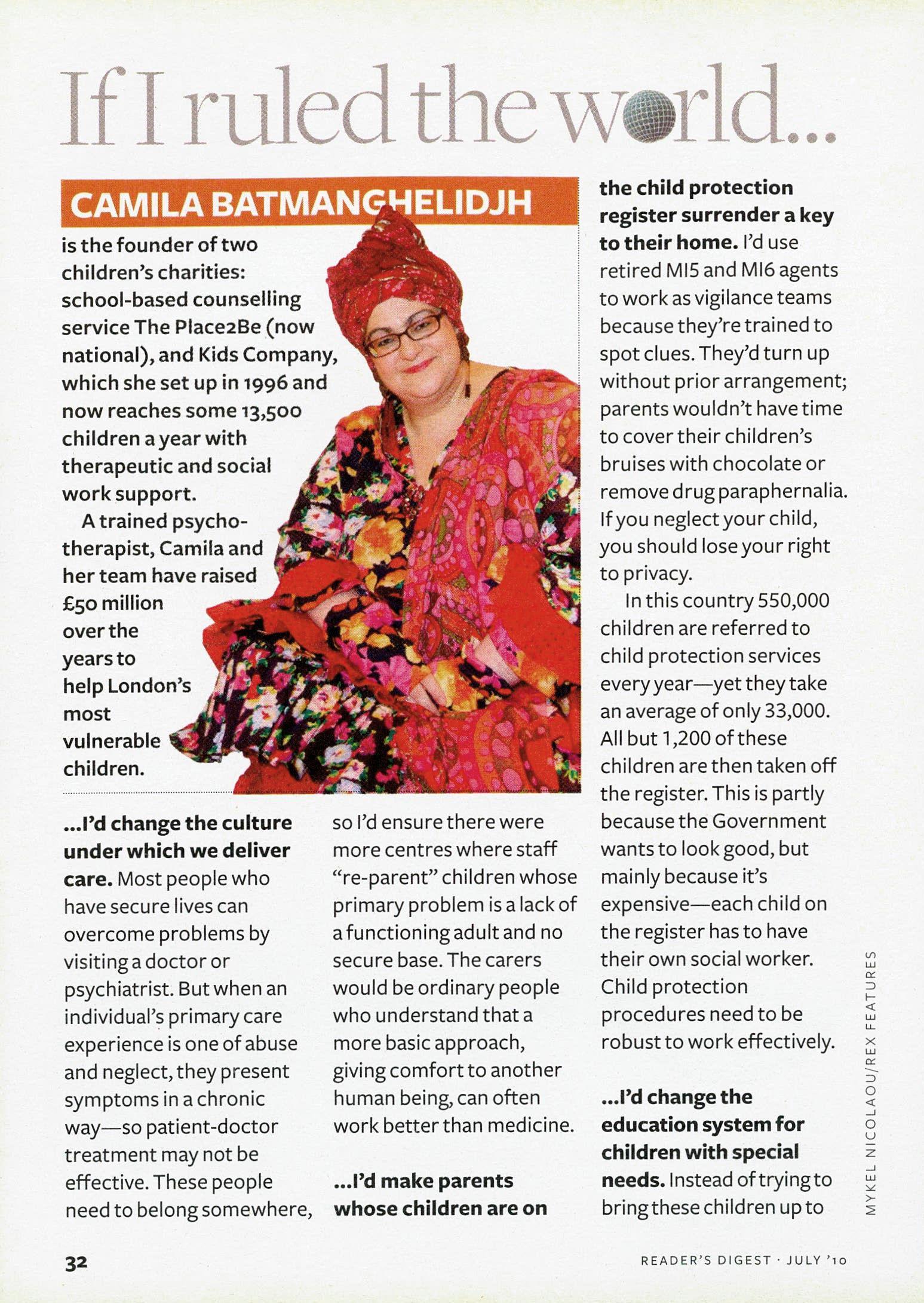
is the founder of two children's charities: school-based counselling service The Place2Be (now national), and Kids Company, which she set up in 1996 and now reaches some 13,50o children a year with therapeutic and social work support.
A trained psychotherapist, Camila and her team have raised L5c) million over the years to help London's most vulnerable children.
...I'd change the culture under which we deliver care.Most people who have secure lives can overcome problems by visiting a doctor or psychiatrist. But when an individual's primary care experience is one of abuse and neglect, they present symptoms in a chronic way—so patient-doctor treatment may not be effective. These people need to belong somewhere,
so I'd ensure there were more centres where staff "re-parent" children whose primary problem is a lack of a functioning adult and no secure base. The carers would be ordinary people who understand that a more basic approach, giving comfort to another human being, can often work better than medicine.
...I'd make parents whose children are on
the child protection register surrender a key to their home.I'd use retired MI5 and MI6 agents to work as vigilance teams because they're trained to spot clues. They'd turn up without prior arrangement; parents wouldn't have time to cover their children's bruises with chocolate or remove drug paraphernalia. If you neglectyour child, you should lose your right to privacy.
In this country 550,000 children are referred to child protection services every year—yet they take an average of only 33,000. All but 1,200 of these children are then taken off the register. This is partly because the Government wants to look good, but mainly because it's expensive—each child on the register has to have their own social worker. Child protection procedures need to be robust to work effectively.
...I'd change the education system for children with special needs.Instead of tryingto bringthese children up to
M YKEL N ICOLA OU/ REX FE A TU RES 32 READER'S DIGEST • JULY '1c,
average in all subjects, teachers would put the basics in place and then develop the child's talent. For example, if a child were interested in graphic design, a mentor in that area would be found for them. Believing that everyone has somethingto offer would change so much. Taking a neglected child and finding something at which they can excel would allow them to celebrate their existence. We've seen it work at Kids Company-85 per cent of our children who have fallen out of mainstream education are re-integrated successfully. The national average is 34 per cent. Striving for excellence would be my numberone goal.
...I'd encourage charitable giving. We should be praised for what we have achieved for other people, not for our status or wealth. Genuine philanthropy is the biggestgift you can give yourself; proof of your compassion for another person. It's the most creative expression of humanitythere is.
As told to Caroline Hutton
WORLD TRAVELLER
Who's doing what around the globe

# .
The days of bored pupils are coming to an end in ISRAELthanks to computer program Time to Know (T2K). Children develop computer skills early—so T2K enables each child to work at a computer on a personalised curriculum at their own pace, while teachers monitor them from a dashboard. The result? Classes are more streamlined and pupils more engaged.
"Schwinging" is sweepingGERMANY.No, not that sort —we're talking 30s-style dancing. From the lindy hop to the turkey trot, it's big news, with workshops springing up everywhere. But be prepared to get up close and personal: advice includes "sometimes mints will be a good choice".
What do you get when you cross chess and boxing? Chess-boxing! It's one of many hybrid sports taking off in the US.Skijoring? It mixes cross-country skiing and dog mushing (dog-powered transport)—apparently even poodles can do it. And Octopush? Underwater hockey played by snorkellers.
16COUNTRIES, ONE QUESTION
MONEY
FAMILY
HEALTH
Italy 3o%
Older people stress about their health most—but amazingly, in Singapore and Russia,no one over 45 worries about it!
"07
Malaysia 58% China 55% Singapore 55% US 48% Australia 40% Philippines 38% UK, Canada 37% India, Netherlands 36% STATE OF THE WORLD Germany 39% Brazil 36% Spain 32%
France 51% Russia 51%
READER'S DIGEST rdmag.co.uk 33
Your child has a killer backhand and looks great in whites, but does he or she have what it takes to be the next
Smash •
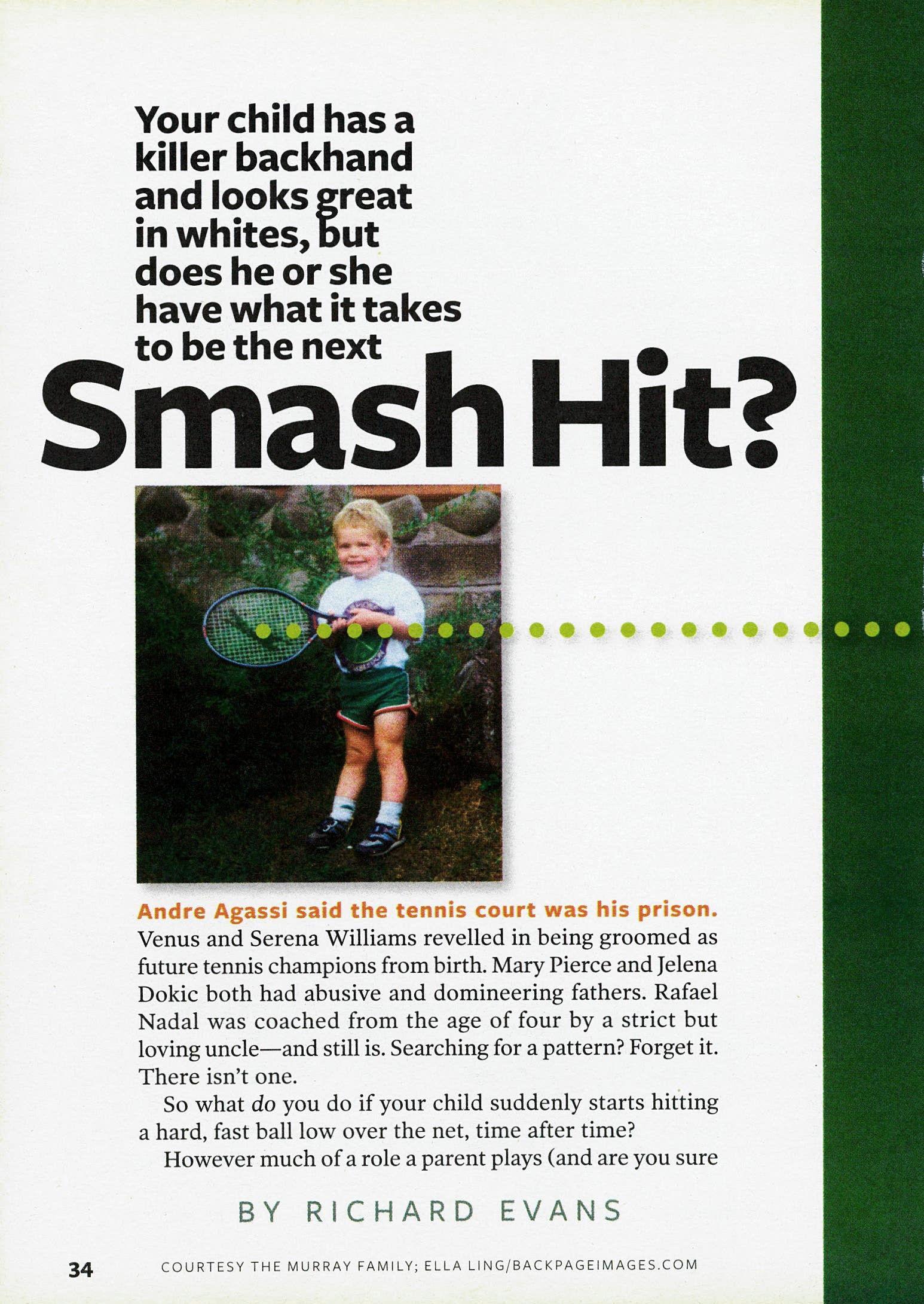
)urt was his prison. Venus and Serena Williams revelled in being groomed as future tennis champions from birth. Mary Pierce and Jelena Dokic both had abusive and domineering fathers. Rafael Nadal was coached from the age of four by a strict but loving uncle—and still is. Searching for a pattern? Forget it. There isn't one.
So what do you do if your child suddenly starts hitting a hard, fast ball low over the net, time after time? However much of a role a parent plays (and are you sure
BY RICHARD EVANS
• • • • • • • • • • •
34 COURTESY THE MURRAY FAMILY; ELLA LING/BACKPAGEIMAGES.COM

"Kids who have natural timing generate exceptional speed early on"—Alex Corretja, now part-time coach to Andy Murray (left, as a boy)
that the hopes you're heaping on your child's shoulders really do represent their dreams, not yours?), evaluation from a professional coach is a must. You can't automatically assume your child is going to be a world-beater.
Alex Corretja, a former French Open finalist and now part-time coach to Andy Murray, is not so worried about the physical aspects. "Not at nine or ten," says the Spaniard. "You never know how they will develop physically."
"The first thing I look for is attitude. I want to see a look in their eyes that tells me they are focused and determined to succeed. I want kids who are fast learners; who can understand what you're telling them and can adjust their game quickly. And I want to see how fast the ball comes off their rackets.
they backing off? I didn't know Lleyton was going to turn into the speedster he became, but I saw a kid who always got to the ball and was determined to get it back."
Youthful enthusiasm, however, does need to be handled with care.Parents must be aware of the tendency to encourage children to play too much. Agassi's horror stories of being made to play six or seven hours a day, six days a week are stomach-churning.
Happily, there are better examples of how to do it—Toni Nadal, Rafael Nadal's uncle, who has coached him since the age of four, is one of them. Tennis did not become young Rafa's entire life. "He played other sports," said Toni. "I think that is important
"I was lucky. He wasn't the sort of kidyou needed to tell something to twice" TONI NADAL
Kids who have natural timing generate exceptional speed early on."
Darren Cahill, who started working with Lleyton Hewitt when the future Wimbledon champion was 12, and who was with Agassi during the last years of his career, says speed, footwork, attitude and athleticism are all important factors. But, he adds: "I always look to see how well they track the ball. Do they have an instinctive feel of where it's going off their opponent's racket? Do they move towards the ball or are
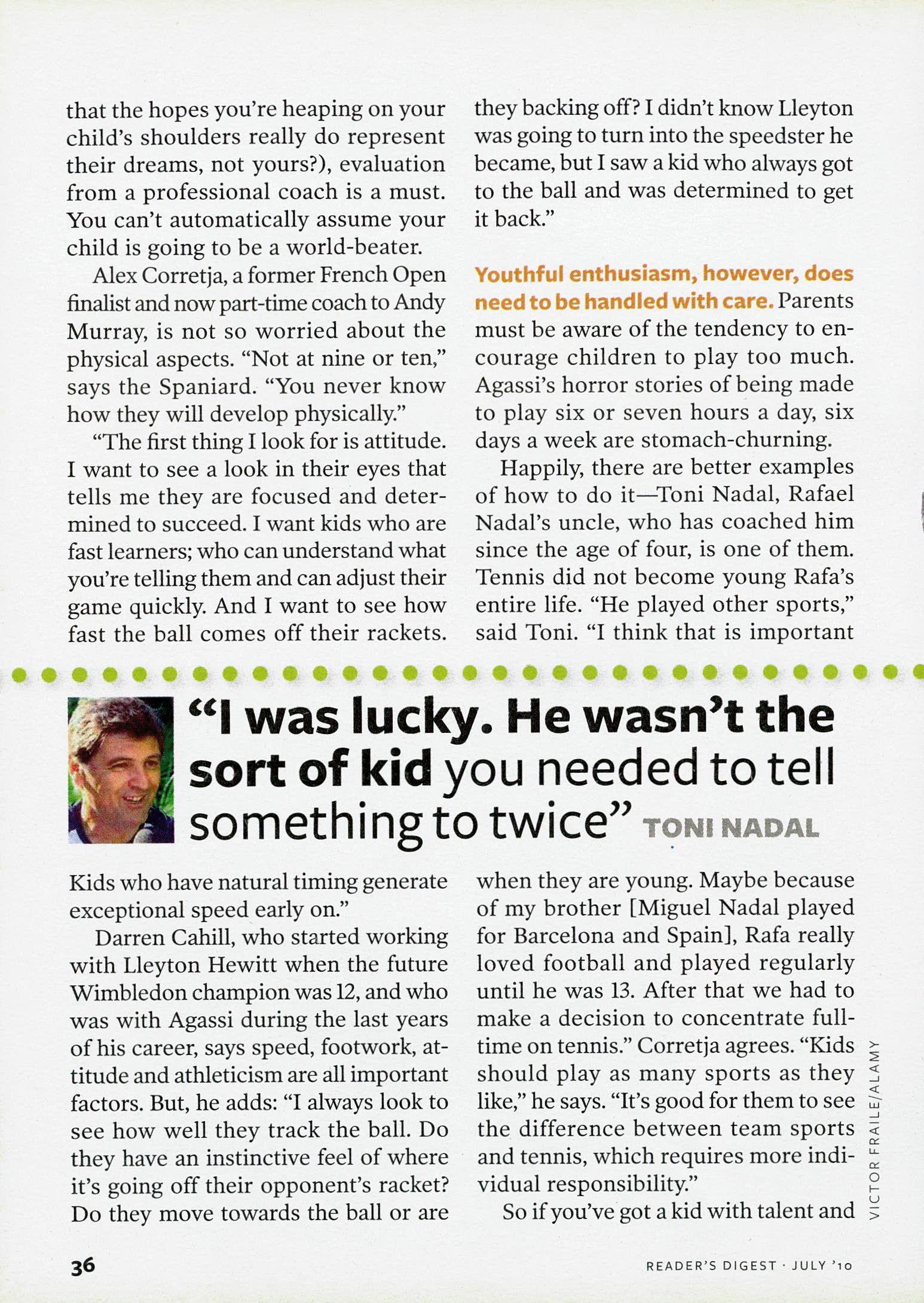
when they are young. Maybe because of my brother [Miguel Nadal played for Barcelona and Spain], Rafa really loved football and played regularly until he was 13. After that we had to make a decision to concentrate fulltime on tennis." Corretja agrees. "Kids should play as many sports as they like," he says. "It's good for them to see the difference between team sports and tennis, which requires more individual responsibility."
So if you've got a kid with talent and
• • • • • • • • • • • • • • • 0 • • • • • • • • • • • •
36
READER'S DIGEST • JULY '10 VIC TOR FR AILE/ AL AMY

Rafael Nadal's coach and uncle Toni Nadal says: "I was lucky to find Rafa in the family, and lucky, too, not to be his father. One stage removed is better, no? Then it was a question of teaching the little boy the right way to play the game. Not just technically but attitude, too. I told him very early that if he ever threw a racket and broke it I wouldn't be his coach any more. I told him there are millions of kids in the world who cannot afford a racket. And I was lucky. He wasn't the sort of kid you needed to tell something important to twice. He had this great desire to be as good as he could be. Without that, talent is not enough."
• • • •
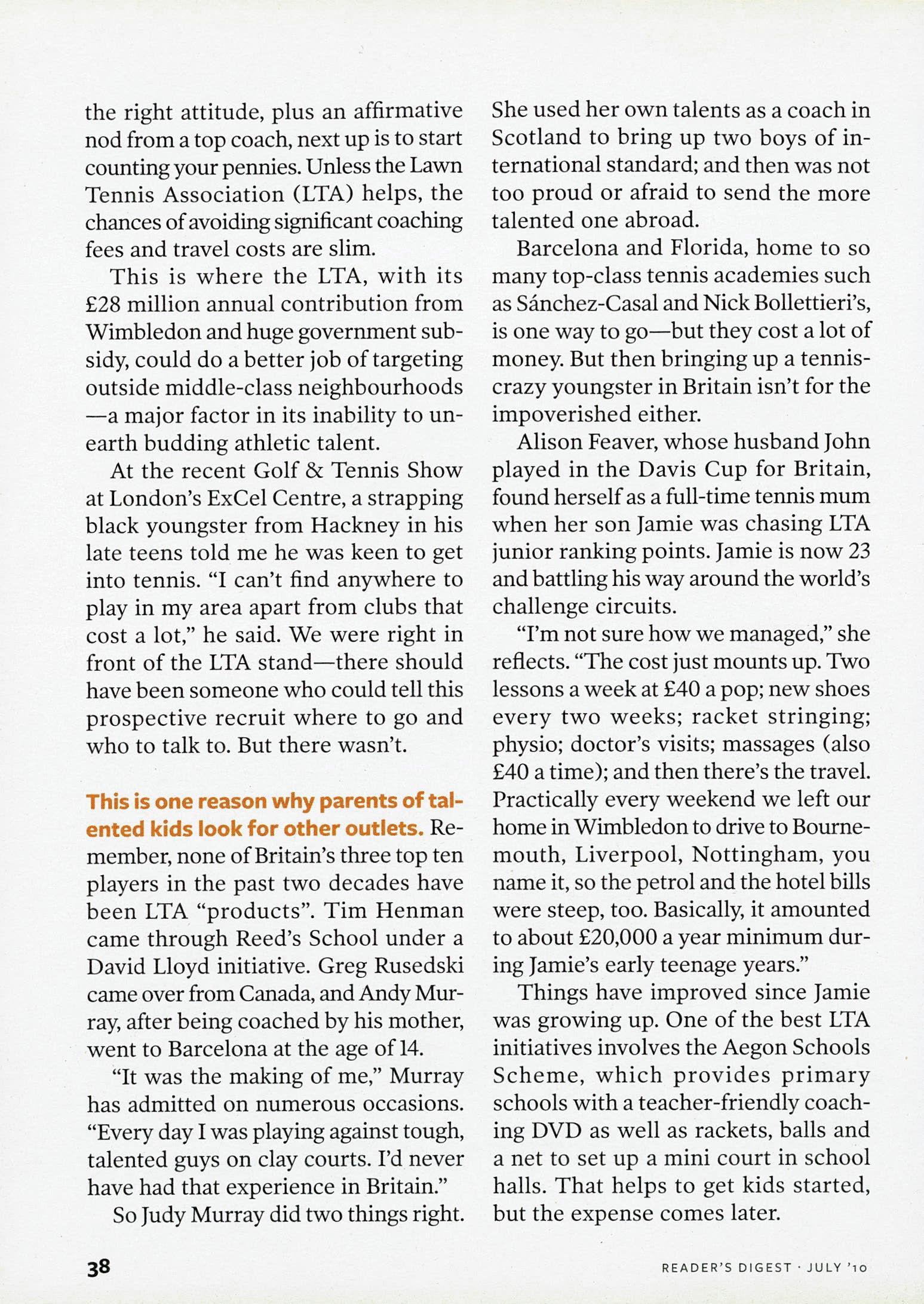
the right attitude, plus an affirmative nod from a top coach, next up is to start counting your pennies. Unless the Lawn Tennis Association (LTA) helps, the chances of avoiding significant coaching fees and travel costs are slim.
This is where the LTA, with its £28 million annual contribution from Wimbledon and huge government subsidy, could do a better job of targeting outside middle-class neighbourhoods —a major factor in its inability to unearth budding athletic talent.
At the recent Golf & Tennis Show at London's ExCel Centre, a strapping black youngster from Hackney in his late teens told me he was keen to get into tennis. "I can't find anywhere to play in my area apart from clubs that cost a lot," he said. We were right in front of the LTA stand—there should have been someone who could tell this prospective recruit where to go and who to talk to. But there wasn't.
This is one reason why parents of talented kids look for other outlets. Remember, none of Britain's three top ten players in the past two decades have been LTA "products". Tim Henman came through Reed's School under a David Lloyd initiative. Greg Rusedski came over from Canada, and Andy Murray, after being coached by his mother, went to Barcelona at the age of 14.
"It was the making of me," Murray has admitted on numerous occasions. "Every day I was playing against tough, talented guys on clay courts. I'd never have had that experience in Britain."
So Judy Murray did two things right.
She used her own talents as a coach in Scotland to bring up two boys of international standard; and then was not too proud or afraid to send the more talented one abroad.
Barcelona and Florida, home to so many top-class tennis academies such as Sanchez-Casal and Nick Bollettieri's, is one way to go—but they cost a lot of money. But then bringing up a tenniscrazy youngster in Britain isn't for the impoverished either.
Alison Feaver, whose husband John played in the Davis Cup for Britain, found herself as a full-time tennis mum when her son Jamie was chasing LTA junior ranking points. Jamie is now 23 and battling his way around the world's challenge circuits.
"I'm not sure how we managed," she reflects. "The cost just mounts up. Two lessons a week at £40 a pop; new shoes every two weeks; racket stringing; physio; doctor's visits; massages (also £40 a time); and then there's the travel. Practically every weekend we left our home in Wimbledon to drive to Bournemouth, Liverpool, Nottingham, you name it, so the petrol and the hotel bills were steep, too. Basically, it amounted to about £20,000 a year minimum during Jamie's early teenage years."
Things have improved since Jamie was growing up. One of the best LTA initiatives involves the Aegon Schools Scheme, which provides primary schools with a teacher-friendly coaching DVD as well as rackets, balls and a net to set up a mini court in school halls. That helps to get kids started, but the expense comes later.
38 READER'S DIGEST • JULY '10
However, other opportunities are emerging.One is by Chiswick Bridge in west London. Dukes Meadow is the brainchild of French Connection founder Stephen Marks, the number one junior in Middlesex in his youth. Marks poured money into Dukes Meadow, once a low-level golf facility, adding five indoor courts and four outdoor ones made of European clay.
Now you can find some seriously promising kids playing at Dukes Meadow every day under the tutelage of former British number one Jo Durie and the man who coached her to world number five, Alan Jones.
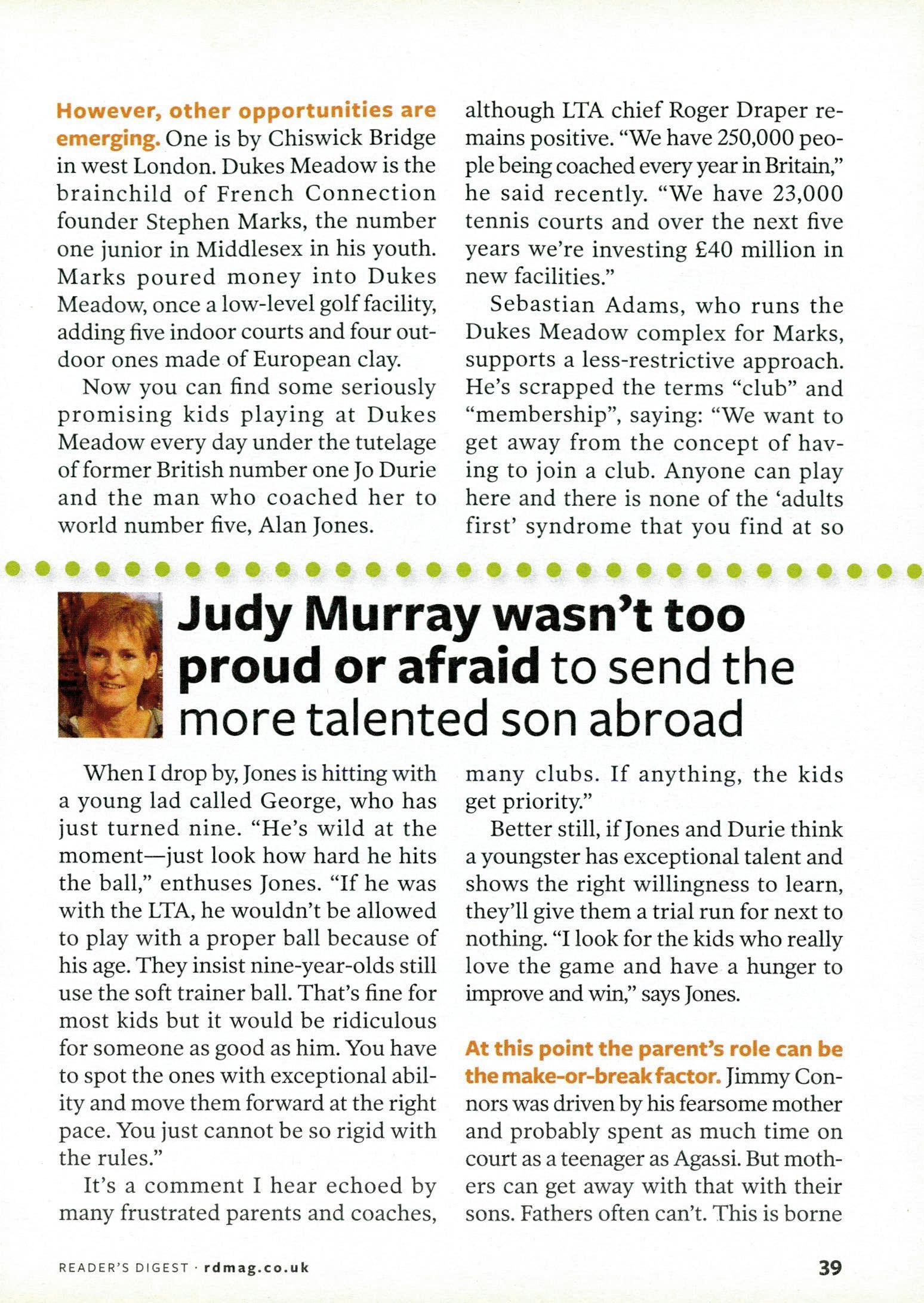
although LTA chief Roger Draper remains positive. "We have 250,000 people being coached every year in Britain," he said recently. "We have 23,000 tennis courts and over the next five years we're investing £40 million in new facilities."
Sebastian Adams, who runs the Dukes Meadow complex for Marks, supports a less-restrictive approach. He's scrapped the terms "club" and "membership", saying: "We want to get away from the concept of having to join a club. Anyone can play here and there is none of the 'adults first' syndrome that you find at so
IIJudy Murray wasn't too proud or afraidto send the more talented
When I drop by, Jones is hitting with a young lad called George, who has just turned nine. "He's wild at the moment—just look how hard he hits the ball," enthuses Jones. "If he was with the LTA, he wouldn't be allowed to play with a proper ball because of his age. They insist nine-year-olds still use the soft trainer ball. That's fine for most kids but it would be ridiculous for someone as good as him. You have to spot the ones with exceptional ability and move them forward at the right pace. You just cannot be so rigid with the rules."
It's a comment Ihear echoed by many frustrated parents and coaches,
son abroad
many clubs. If anything, the kids get priority."
Better still, if Jones and Durie think a youngster has exceptional talent and shows the right willingness to learn, they'll give them a trial run for next to nothing. "I look for the kids who really love the game and have a hunger to improve and win," says Jones.
At this point the parent's role can be the make-or-break factor.Jimmy Connors was driven by his fearsome mother and probably spent as much time on court as a teenager as Agassi. But mothers can get away with that with their sons. Fathers often can't. This is borne
• • e • erra • • • • •
READER'S DIGEST • rdmag.co.uk
39
out by some studies documented in If I'm the Better Player, Why Can't I Win?, a book on the psychology of competition I wrote with Dr Allen Fox, the only American Davis Cup player with a degree in psychology.
In tests to see how boys reacted in competitive environments with both parents in attendance, the boys with mothers to the fore, shouting instructions and encouragement while
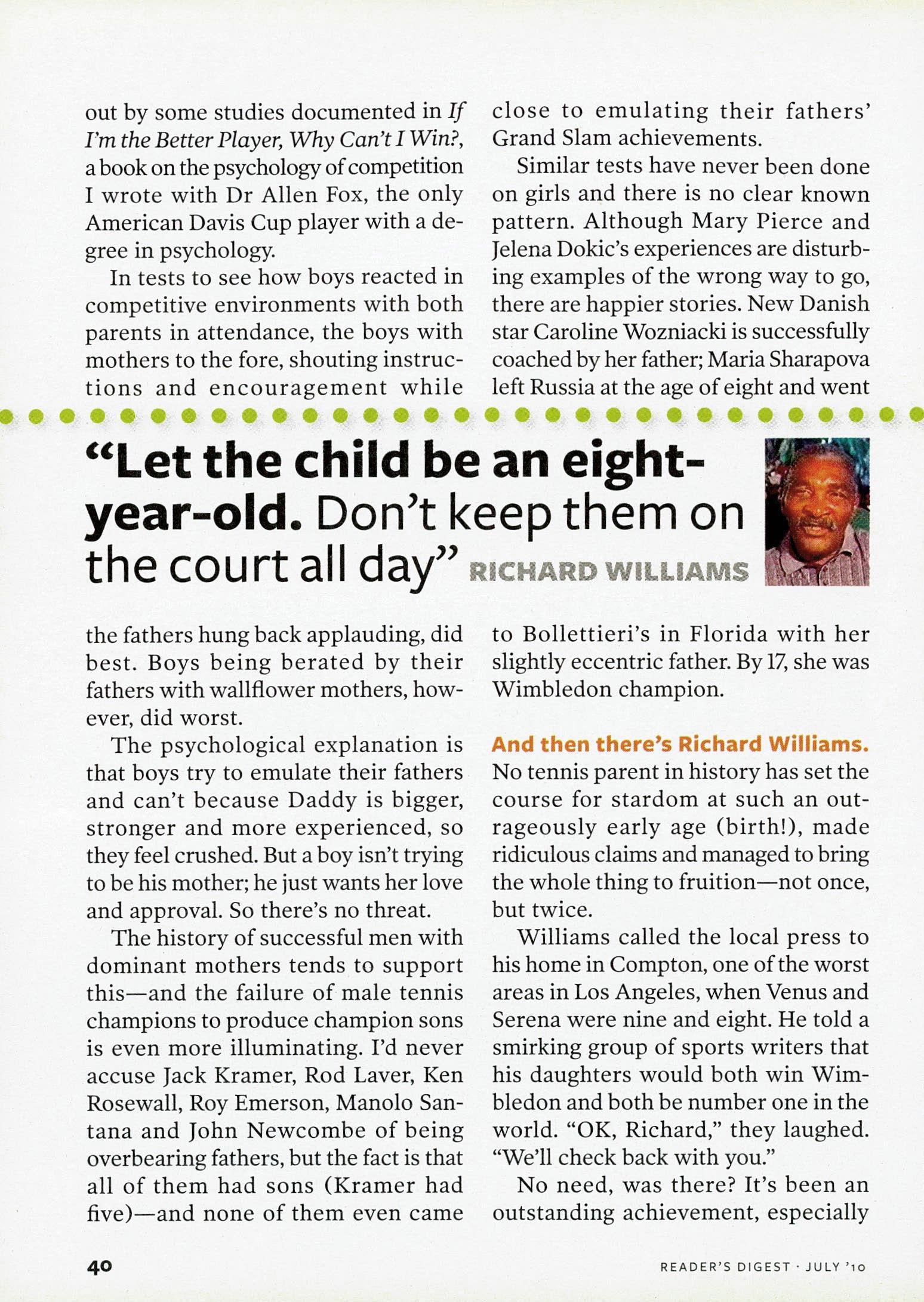
close to emulating their fathers' Grand Slam achievements.
Similar tests have never been done on girls and there is no clear known pattern. Although Mary Pierce and Jelena Dokic's experiences are disturbing examples of the wrong way to go, there are happier stories. New Danish star Caroline Wozniacki is successfully coached by her father; Maria Sharapova left Russia at the age of eight and went
"Let the child be an eightyear-old. Don't keep them on the court all day" RICHARD WILLIAMS
the fathers hung back applauding, did best. Boys being berated by their fathers with wallflower mothers, however, did worst.
The psychological explanation is that boys try to emulate their fathers and can't because Daddy is bigger, stronger and more experienced, so they feel crushed. But a boy isn't trying to be his mother; he just wants her love and approval. So there's no threat.
The history of successful men with dominant mothers tends to support this—and the failure of male tennis champions to produce champion sons is even more illuminating. I'd never accuse Jack Kramer, Rod Laver, Ken Rosewall, Roy Emerson, Manolo Santana and John Newcombe of being overbearing fathers, but the fact is that all of them had sons (Kramer had five)—and none of them even came
to Bollettieri's in Florida with her slightly eccentric father. By 17, she was Wimbledon champion.
And then there's Richard Williams. No tennis parent in history has set the course for stardom at such an outrageously early age (birth!), made ridiculous claims and managed to bring the whole thing to fruition—not once, but twice.
Williams called the local press to his home in Compton, one of the worst areas in Los Angeles, when Venus and Serena were nine and eight. He told a smirking group of sports writers that his daughters would both win Wimbledon and both be number one in the world. "OK, Richard," they laughed. "We'll check back with you."
No need, was there? It's been an outstanding achievement, especially
• . • • •
40
READER'S DIGEST • JULY '10
as Richard and his former wife Oracene never pushed their daughters into competition. In fact, when I saw Venus beat Shaun Stafford (then ranked 50 in the world) at the age of 14 in a tournament in California, neither she nor
number one at 16, Venus came to me and said she wanted to play more tournaments to challenge her," Williams recalled. "I told her school came first and number one would come later. Education was always a priority."
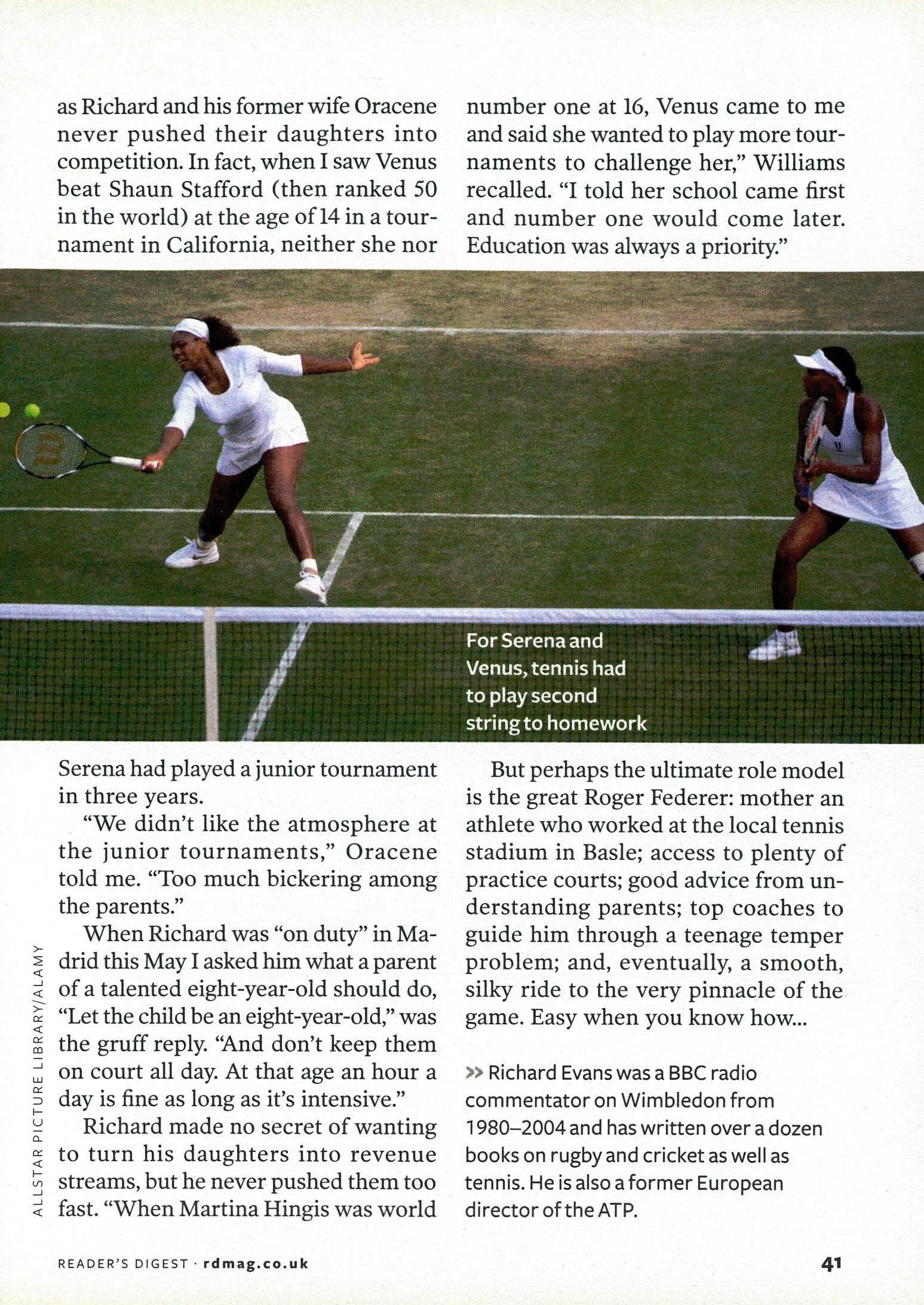
Serena had played a junior tournament in three years.
"We didn't like the atmosphere at the junior tournaments," Oracene told me. "Too much bickering among the parents."
When Richard was "on duty" in Madrid this May I asked him what a parent of a talented eight-year-old should do, "Let the child be an eight-year-old," was the gruff reply. "And don't keep them on court all day. At that age an hour a day is fine as long as it's intensive."
Richard made no secret of wanting to turn his daughters into revenue streams, but he never pushed them too fast. "When Martina Hingis was world
For Serena and Venus, tennis had to play second string to homework
But perhaps the ultimate role model is the great Roger Federer: mother an athlete who worked at the local tennis stadium in Basle; access to plenty of practice courts; good advice from understanding parents; top coaches to guide him through a teenage temper problem; and, eventually, a smooth, silky ride to the very pinnacle of the game. Easy when you know how...
>> Richard Evans was a BBC radio commentator on Wimbledon from 1980-2004 and has written over a dozen books on rugby and cricket as well as tennis. He is also a former European director of the ATP.
ALLSTAR PI CTUR E LIBRARY/ ALA MY
READER'S DIGEST rdmag.co.uk
41
RACE AGAINST TIME!
THE BUG BUSTERS
How food detectives tracked down the source of a mystery bug threatening the nation
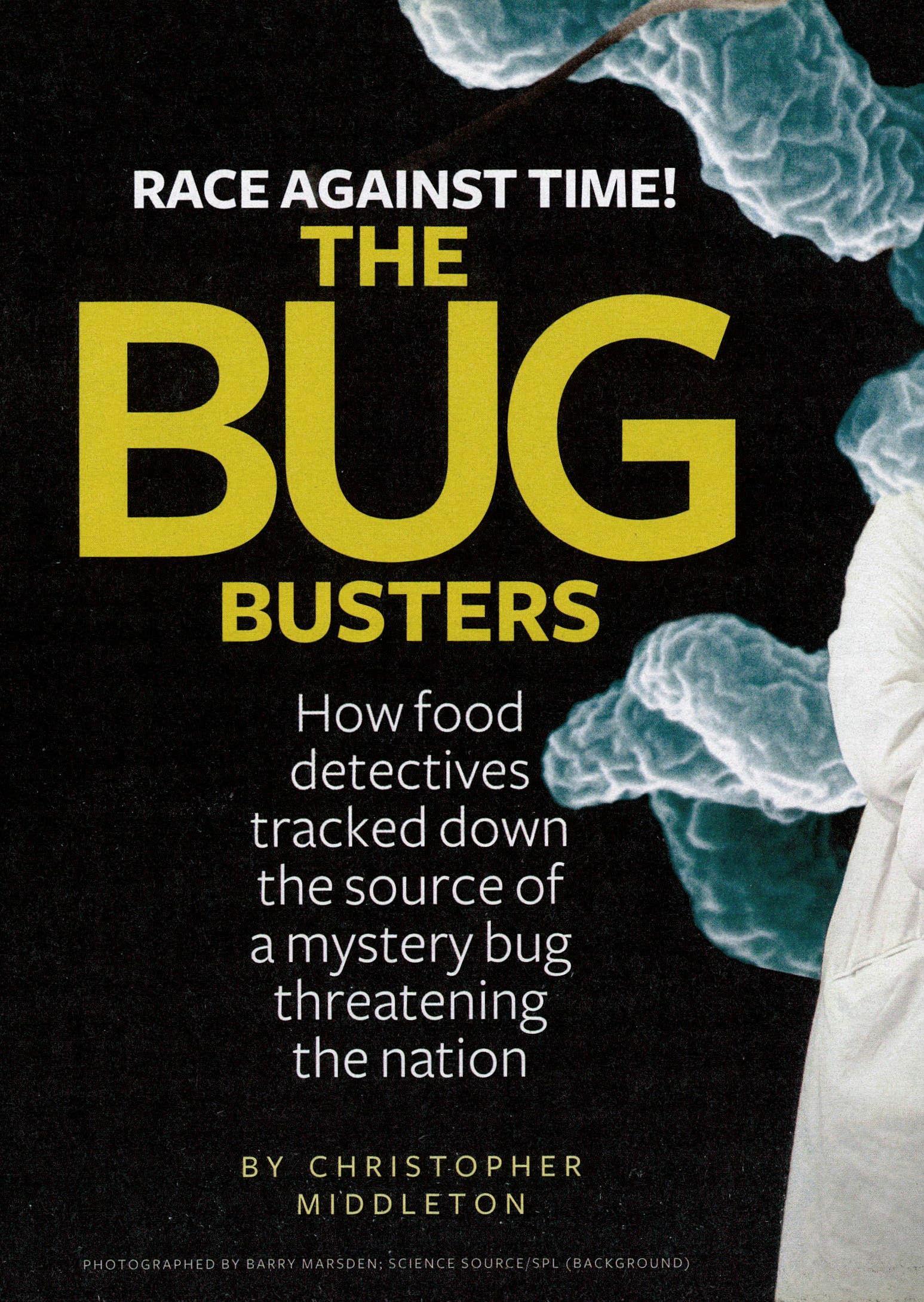 BY CHRISTOPHER MIDDLETON
BY CHRISTOPHER MIDDLETON
PHOTOGRAPHED BY BARRY MARSDEN; SCIENCE SOURCE/SPL (BACKGROUND)
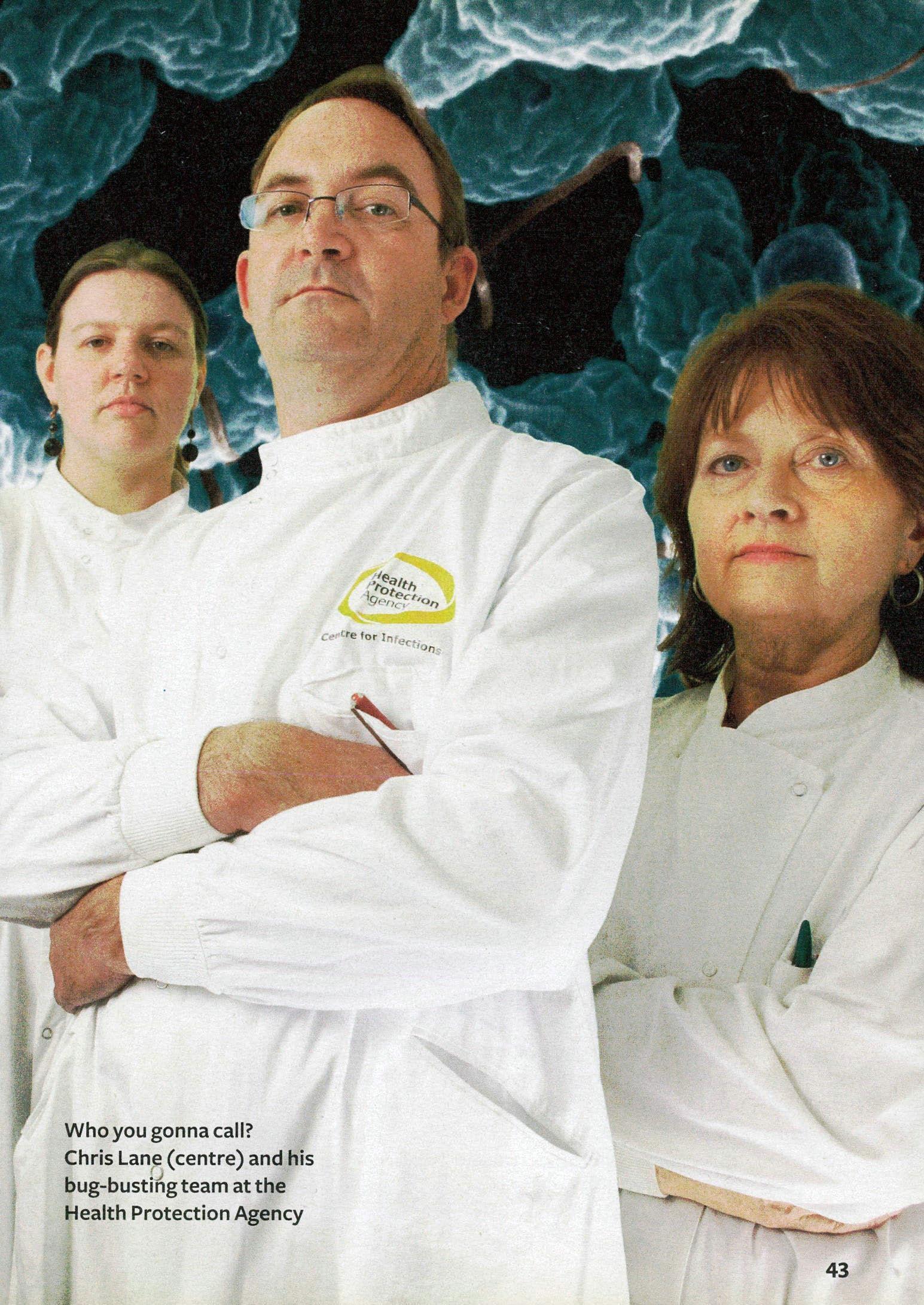
Who you gonna call?
Chris Lane (centre) and his bug-busting team at the Health Protection Agency
43
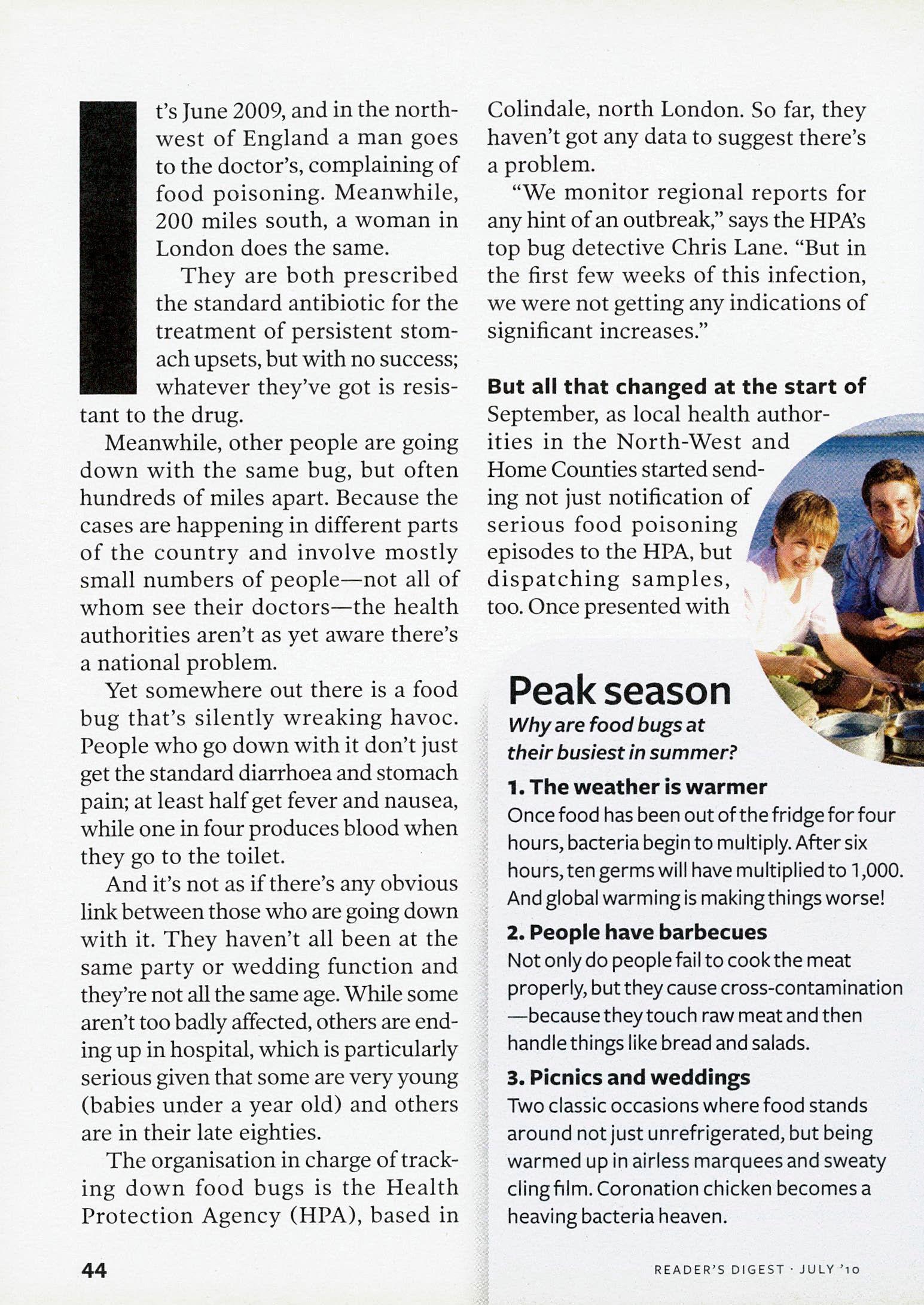
II
t's June 2009, and in the northwest of England a man goes to the doctor's, complaining of food poisoning. Meanwhile, 200 miles south, a woman in London does the same. They are both prescribed the standard antibiotic for the treatment of persistent stomach upsets, but with no success; whatever they've got is resistant to the drug.
Meanwhile, other people are going down with the same bug, but often hundreds of miles apart. Because the cases are happening in different parts of the country and involve mostly small numbers of people—not all of whom see their doctors—the health authorities aren't as yet aware there's a national problem.
Yet somewhere out there is a food bug that's silently wreaking havoc. People who go down with it don't just get the standard diarrhoea and stomach pain; at least half get fever and nausea, while one in four produces blood when they go to the toilet.
And it's not as if there's any obvious link between those who are going down with it. They haven't all been at the same party or wedding function and they're not all the same age. While some aren't too badly affected, others are ending up in hospital, which is particularly serious given that some are very young (babies under a year old) and others are in their late eighties.
The organisation in charge of tracking down food bugs is the Health Protection Agency (HPA), based in
Colindale, north London. So far, they haven't got any data to suggest there's a problem.
"We monitor regional reports for any hint of an outbreak," says the HP.Ns top bug detective Chris Lane. "But in the first few weeks of this infection, we were not getting any indications of significant increases."
But all that changed at the start of September, as local health authorities in the North-West and Home Counties started sending not just notification of serious food poisoning episodes to the HPA, but dispatching samples, too. Once presented with
Peak season
Why are food bugs at their busiest in summer?
1.The weather is warmer
Once food has been out of the fridge for four hours, bacteria begin to multiply. After six hours, ten germs will have multiplied to 1,000. And global warming is making things worse!
2. People have barbecues
Not only do people fail to cook the meat properly, but they cause cross-contamination —because they touch raw meat and then handle things like bread and salads.
3. Picnics and weddings
Two classic occasions where food stands around not just unrefrigerated, but being warmed upin airless marquees and sweaty clingfilm. Coronation chicken becomes a heaving bacteria heaven.
44 READER'S DIGEST • JULY '10
these "isolates" (as the samples are called), the HPA laboratories were able to identify the infection as Salmonella Enteritidis PT14b.
But merely fingering the guilty bacillus is a far cry from actually tracking down its source. And, with the number of reported cases now in the hundreds, it was clearly a race against time to prevent more people from falling foul of this potentially fatal infection—already, some victims were having to be hospitalised.
So where were the bug detectives to start looking? How do you track down an invisible enemy that seems to be operating in completely unrelated parts of the country?
"The one big thing we had going was that we'd seen this particular strain of salmonella —and there are 2,400 different types—in a previous outbreak, connected with contaminated eggs," says Lane. "We couldn't be 100 per cent sure, but when you've been in this business long enough you detect little inflections in an outbreak—and from the start, this one had the smell of eggs about it."
The next step was for the HPA team to go into intensive phone-interrogation mode, quizzing the victims on every aspect of what they'd had to eat prior to going down with the bug. Not an easy job.
"For a start, we were asking people to recall, in detail, events that had happened weeks earlier," says Lane. "And
The bug detectives' casebook
Salmonella on the go
People all over the Home Counties suddenly started going down with Salmonella Hadar, named after the area in Ethiopia where it was first identified (don't laugh—there's a Salmonella Neasden, too). Intensive questioning found that all the victims had bought sandwiches with the same meatbased filling, from small, seemingly unrelated outlets such as newsagents and petrol garages. The trail led to a bulk supplier of sandwich fillings, operatingfrom an industrial unit in south-east London.
The kosher connection
During an outbreak of Salmonella Agona round north London, the bugbusters spotted that all the victims were under ten and all had typically Jewish surnames. Prompt investigation revealed the children had all been eating a kosher snack food made in Tel Aviv, which was promptly withdrawn from the market. The UK breakthrough also helped out Israeli health authorities, who'd been unable either to identify the strain of salmonella or pin down its source.
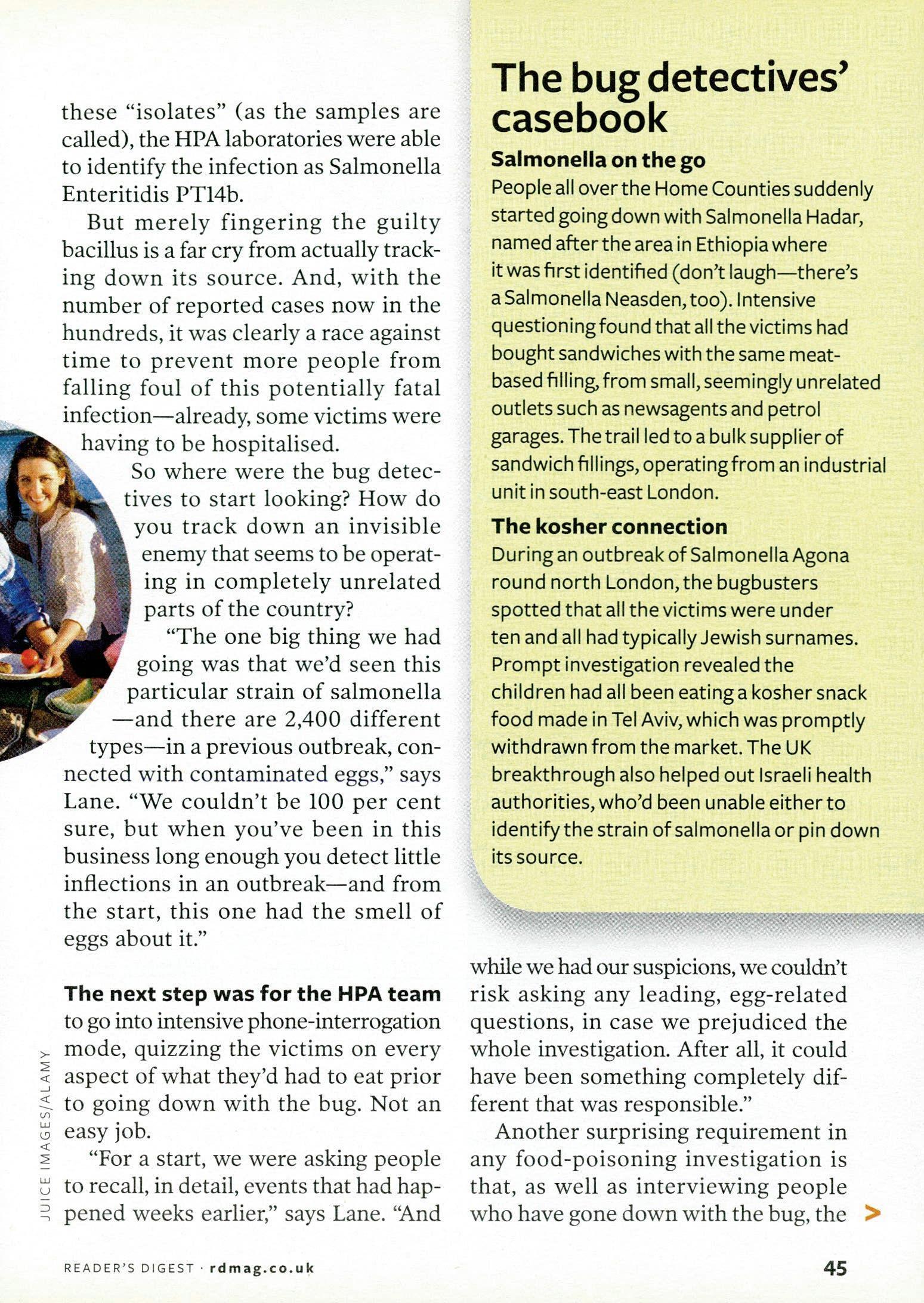
while we had our suspicions, we couldn't risk asking any leading, egg-related questions, in case we prejudiced the whole investigation. After all, it could have been something completely different that was responsible."
Another surprising requirement in any food-poisoning investigation is that, as well as interviewing people who have gone down with the bug, the >
JUI CE IMA GES/ AL AMY
READER'S DIGEST • rdmag.co.uk
45
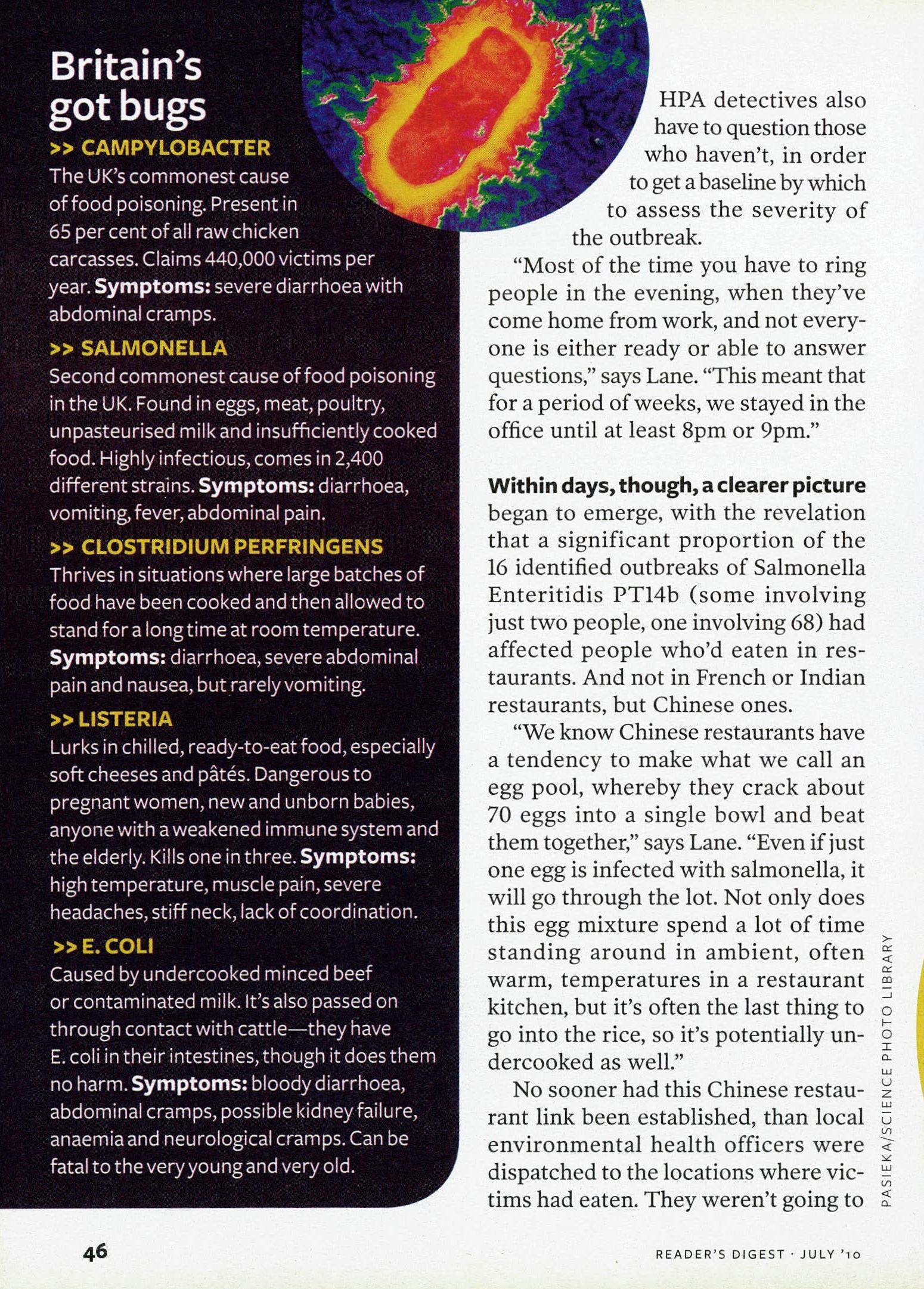
Britain's got bugs
» CAMPYLOBACTER
The UK's commonest cause of food poisoning. Present in 65 per cent of all raw chicken carcasses. Claims 440,000 victims per year.Symptoms:severe diarrhoea with abdominal cramps.
» SALMONELLA
Second commonest cause of food poisoning in the UK. Found in eggs, meat, poultry, unpasteurised milk and insufficiently cooked food. Highly infectious, comes in 2,400 different strains.Symptoms:diarrhoea, vomiting, fever, abdominal pain.
>> CLOSTRIDIUM PERFRINGENS
Thrives in situations where large batches of food have been cooked and then allowed to stand for a longtime at room temperature. Symptoms:diarrhoea, severe abdominal pain and nausea, but rarely vomiting.
» LISTERIA
Lurks in chilled, ready-to-eat food, especially soft cheeses and pâtés. Dangerous to pregnant women, new and unborn babies, anyone with a weakened immune system and the elderly. Kills one in three.Symptoms: hightemperature, muscle pain, severe headaches, stiff neck, lack of coordination.
» E. COLI
Caused by undercooked minced beef or contaminated milk. It's also passed on through contact with cattle—they have E. coli in their intestines, though it does them no harm.Symptoms:bloody diarrhoea, abdominal cramps, possible kidney failure, anaemia and neurological cramps. Can be fatal to the very young and very old.
HPA detectives also have to questionthose who haven't, in order to get a baseline by which to assess the severity of the outbreak.
"Most of the time you have to ring people in the evening, when they've come home from work, and not everyone is either ready or able to answer questions," says Lane. "This meant that for a period of weeks, we stayed in the office until at least 8pm or 9pm."
Within days, though, a clearer picture began to emerge, with the revelation that a significant proportion of the 16 identified outbreaks of Salmonella Enteritidis PT14b (some involving just two people, one involving 68) had affected people who'd eaten in restaurants. And not in French or Indian restaurants, but Chinese ones.
"We know Chinese restaurants have a tendency to make what we call an egg pool, whereby they crack about 70 eggs into a single bowl and beat them together," says Lane. "Even if just one egg is infected with salmonella, it will go through the lot. Not only does this egg mixture spend a lot of time standing around in ambient, often warm, temperatures in a restaurant kitchen, but it's often the last thing to go into the rice, so it's potentially undercooked as well."
No sooner had this Chinese restaurant link been established, than local environmental health officers were dispatched to the locations where victims had eaten. They weren't going to
46
READER'S DIGEST • JULY '10 PA SIEKA/ SCIENCE PHO TO LIBRAR Y
close these establishments down, but instead find out who supplied their eggs and to check their current stock for contamination.
It's just as well they did. Out of 480 eggs removed for analysis, more than 20 tested positive for Salmonella Enteritidis PT14b. The HPA team knew they had hit the bull's eye, since it turned out that all those eggs had been supplied by the same distributor, who'd sourced them from one particular farm in Spain (the eggs all bore the same supplier code number).
No sooner were these findings known than they were passed to the UK's Food Standards Agency, which then informed the European Food Safety Authority, which in turn informed the Spanish authorities (there's a strict protocol for these things).
As a result of this, the problem
Bacteria's greatest hits
The unhappiest day of their lives?
disappeared just as soon as it had arrived. Although there has been no official notification to the HPA, it's understood that the farm supplying the contaminated eggs was made to carry out a total overhaul of its hygiene regime and submit all its eggs for heat treatment and contamination testing until further notice.
Overall, some 500 cases of Salmonella Enteritidis PT14b were officially reported to the HPA, though the actual number of sufferers could have been anything up to seven times that amount. By the second week in December, the number of reported cases had dropped from 70 a week to zero.
And the lessons to be learned? First, cook your eggs thoroughly. And second, buy British.
"The British poultry industry has really cleaned up its act since the 1980s and 1990s, thanks to Edwina Currie highlighting the unacceptable levels of salmonella contamina-

>> An outbreak of campylobacter at a wedding reception in Bristol in 2006 resulted in the hospitalisation of 42 guests from around Europe. The caterers for the event admitted serving contaminated food and failing to ensure food safety procedures. They were fined £5,000.
>> Twenty-nine wedding guests went down with diarrhoea and vomitingfollowing a wedding reception at a pub in Kent in 2008. The source of the poisoning (campylobacter again) was an undercooked and then inadequately chilled chicken liver pate, the result of a new cooker and a faulty fridge.
tion in eggs," says Lane. "She got a lot of criticism for it, but essentially she was right. Not only are British-laid eggs now cleaned and polished before being sold, but also all boiler and layer flocks are routinely vaccinated.
"Back in 1996-97, we were seeing up to 16,000 egg-related salmonella cases per year in this country of phage type 4. Last >
47
Protect yourself
1. Wash your hands with soap and warm water before preparing food and after touching raw meat (or pets, or visiting the toilet).
2. Dry your hands after washing; wet hands spread bacteria more easily.
3. Change tea towels and dishcloths regularly; they're the perfect place for bacteria to grow.
4. Use separate knives and chopping boards for raw and cooked meat.
5. Cook all meat until it's piping hot and the juices run clear (no hint of blood, especially in
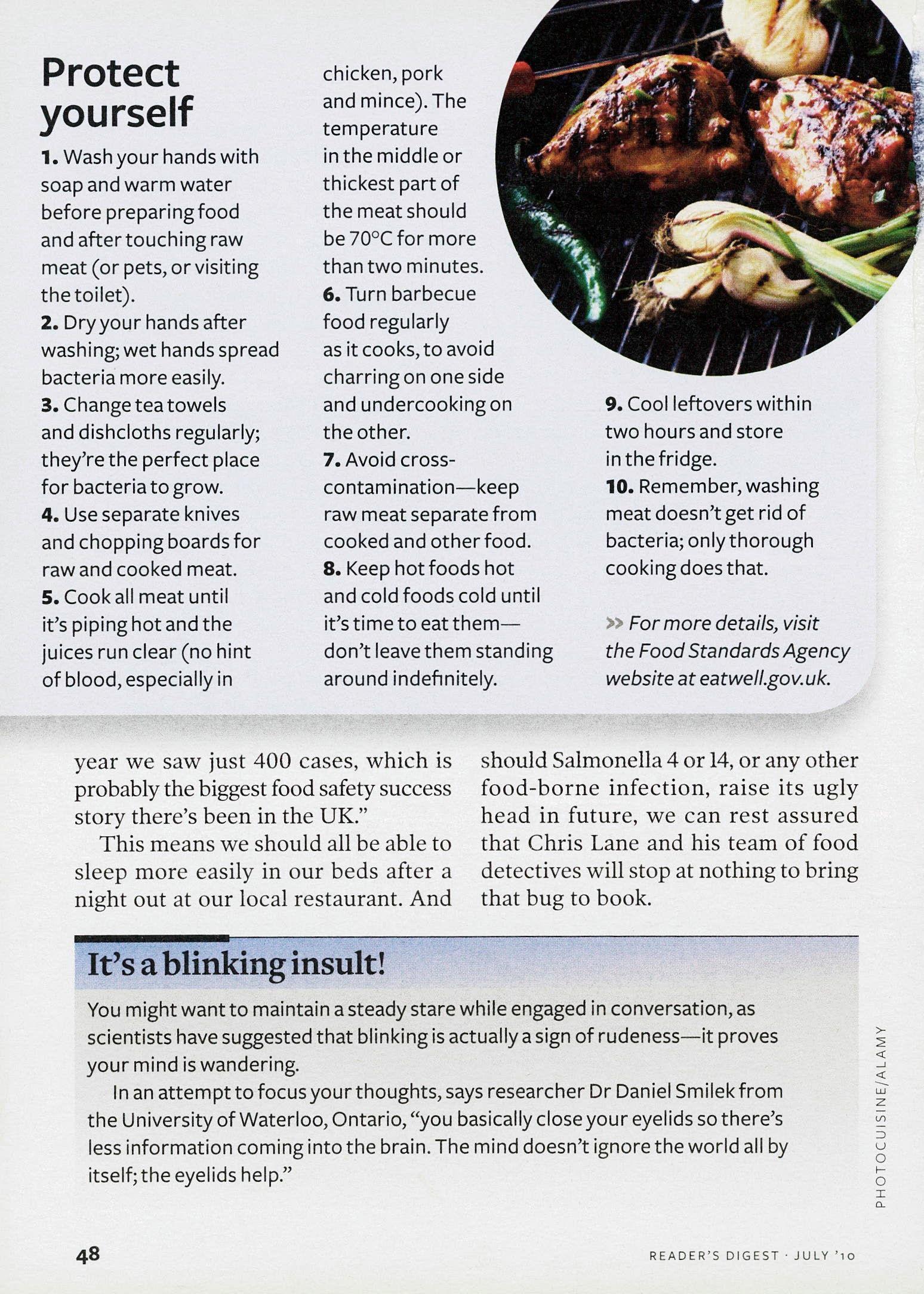
chicken, pork and mince). The temperature in the middle or thickest part of the meat should be 70°C for more than two minutes.
6. Turn barbecue food regularly as it cooks, to avoid charring on one side and undercooking on the other.
7. Avoid crosscontamination—keep raw meat separate from cooked and other food.
8. Keep hot foods hot and cold foods cold until it's time to eat them— don't leave them standing around indefinitely.
year we saw just 400 cases, which is probably the biggest food safety success story there's been in the UK."
This means we should all be able to sleep more easily in our beds after a night out at our local restaurant. And
It's a blinking insult!
9. Cool leftovers within two hours and store in the fridge.
10. Remember, washing meat doesn't get rid of bacteria; only thorough cooking does that.
- For more details, visit the Food Standards Agency website at eatwell.gov.uk.
should Salmonella 4 or 14, or any other food-borne infection, raise its ugly head in future, we can rest assured that Chris Lane and his team of food detectives will stop at nothing to bring that bug to book.
You might want to maintain a steady stare while engaged in conversation, as scientists have suggested that blinking is actually a sign of rudeness—it proves your mind is wandering.
In an attempt to focusyour thoughts, says researcher Dr Daniel Smilek from the University of Waterloo, Ontario, "you basically closeyour eyelids so there's less information coming into the brain. The mind doesn't ignore the world all by itself; the eyelids help."
PH OTOCUI SINE/ ALAMY 48 READER'S DIGEST JULY '10
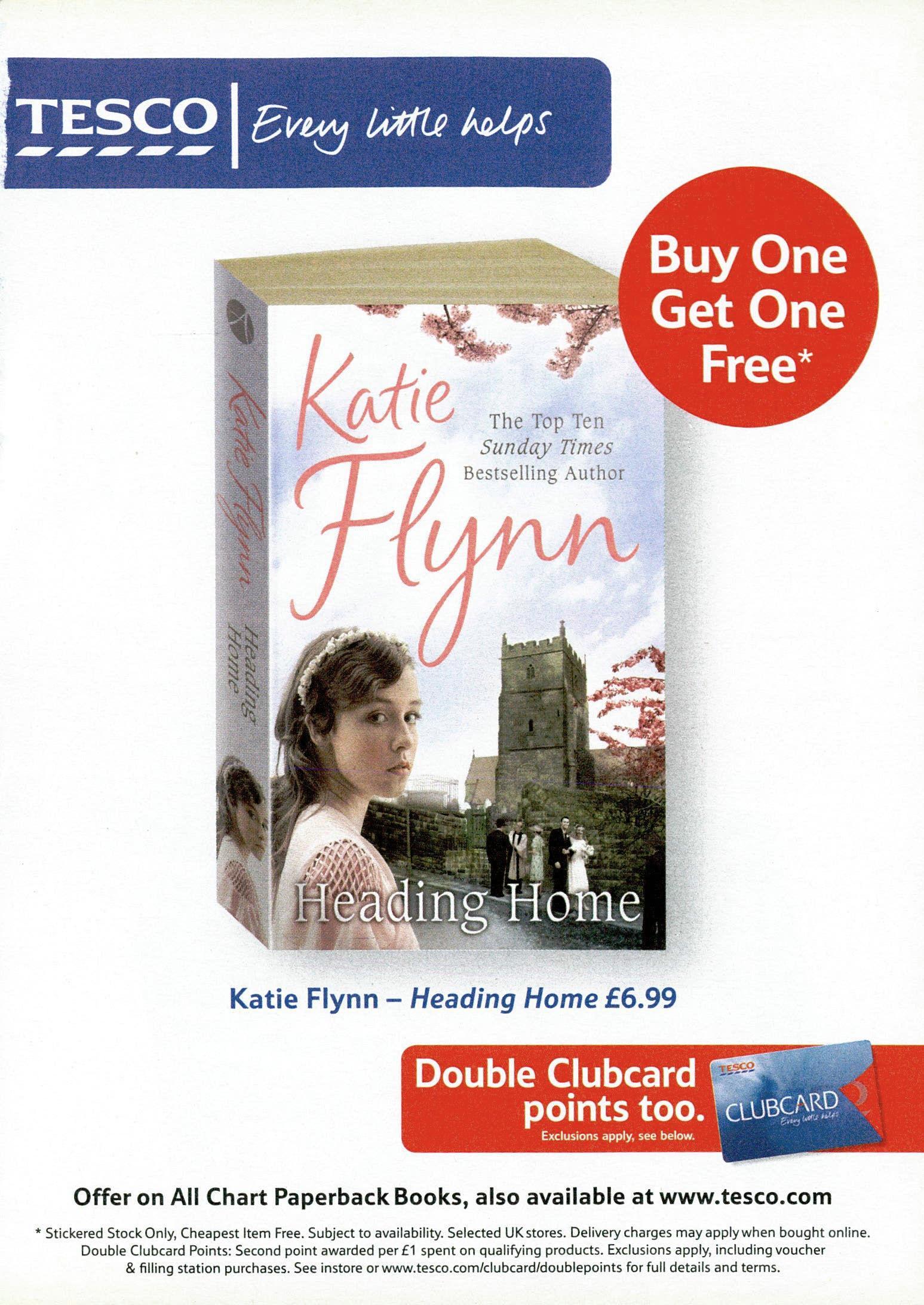
TESCOI E-vj Gi/Dtte AQ,W The Top Ten Sunday Times Bestselling Author Katie Flynn — Heading Home £6.99 Double Clubcard points too. -cLuBcf\RD Exclusions apply, see below. Offer on All Chart Paperback Books, also available at www.tesco.com Stickered Stock Only, Cheapest Item Free. Subject to availability. Selected UK stores. Delivery charges may apply when bought online. Double Clubcard Points: Second point awarded per £1 spent on qualifying products. Exclusions apply, including voucher & filling station purchases. See instore or www.tesco.com/clubcard/doublepoints for full details and terms.
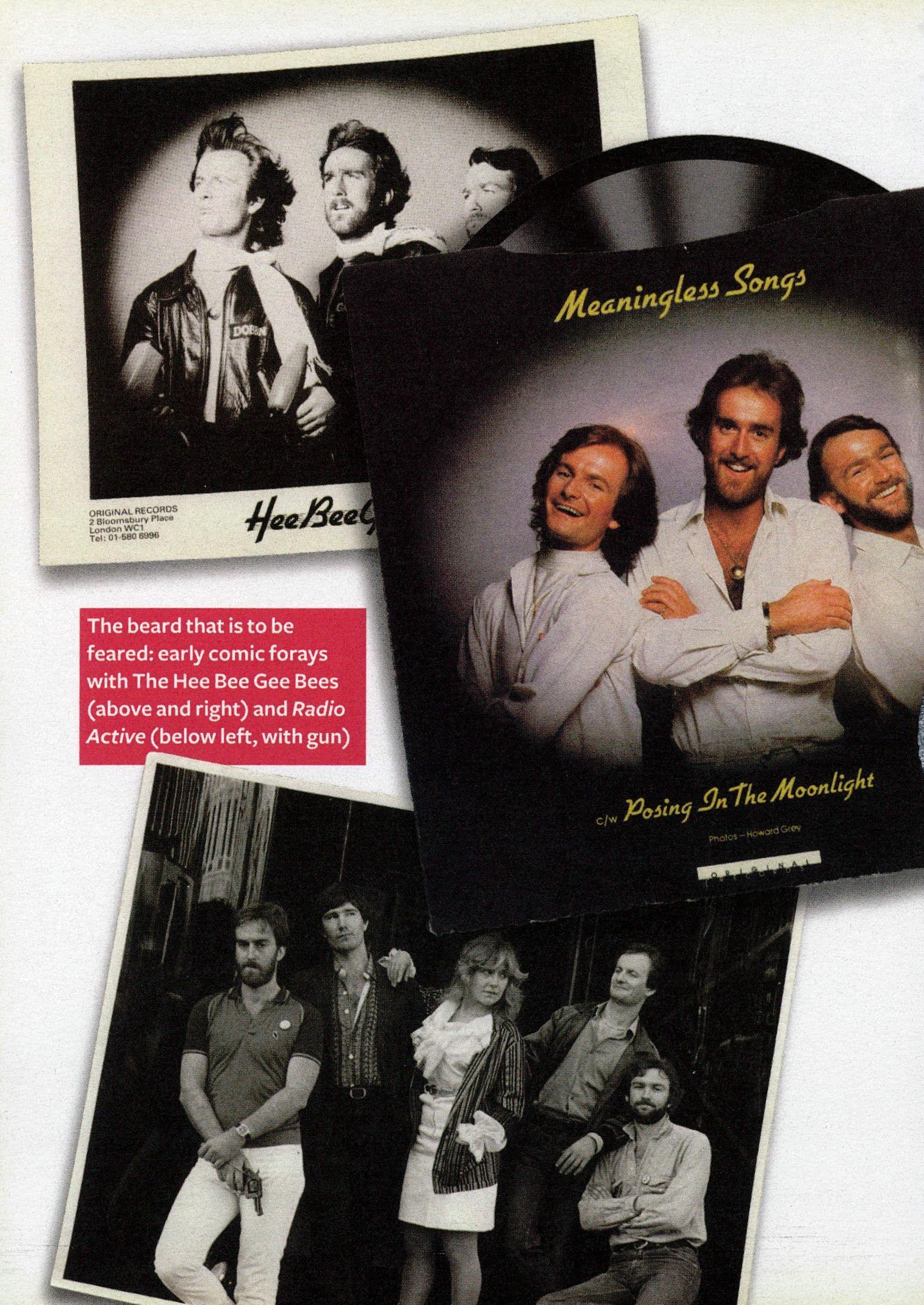
The beard that is to be feared: early comic forays with The Hee Bee Gee Bees (above and right) and Radio Active (below left, with gun)
I remember
Angus Deayton, 54, on no ecords, travelling around Africa and the sheer pleasure of fouling Maradona
I remember... the highlight of my week as a child was a Tuesday afternoon when my grandma visited and gave me a Crunchie. This suggests that the rest of my week must have been rather dull.
_when I was ten my mother went off to evening classes tobecome a cookery teacher. Each week she'd have to perfect a different dish that my father and two elder rothers and I had to eat every single night until she'd got it right. They were classic Seventies concoctionsboeuf bourguignon, toad in the hole and beef stroganoff. But her speciality is baking. Being Scottish, she's always been keen on rather unhealthy food, particularly cream teas and cakes.
...if my brothers and I were ever naughty the spectre of my father would be held over us:"Wait until your father gets home." He was a
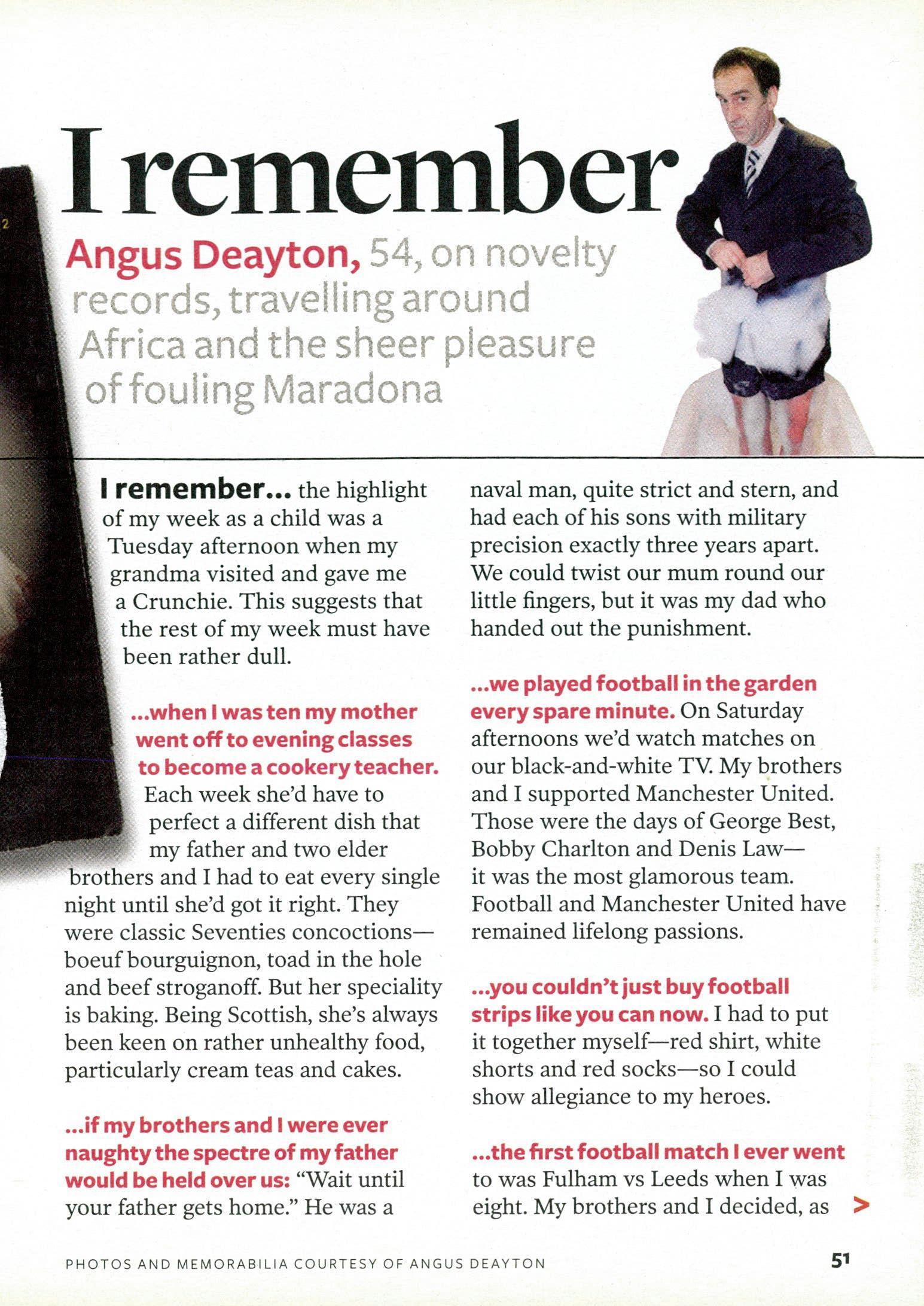
naval man, quite strict and stern, and had each of his sons with military precision exactly three years apart. We could twist our mum round our little fingers, but it was my dad who handed out the punishment.
...we played football in the garden every spare minute. On Saturday afternoons we'd watch matches on our black-and-white TV. My brothers and I supported Manchester United. Those were the days of George Best, Bobby Charlton and Denis Law— it was the most glamorous team. Football and Manchester United have remained lifelong passions.
...you couldn't just buy football strips like you can now. I had to put it together myself—red shirt, white shorts and red socks—so I could show allegiance to my heroes.
...the first football match I ever went to was Fulham vs Leeds when I was eight. My brothers and I decided, as >
PHOTOS AND MEMORABILIA COURTESY OF ANGUS DEAYTON 51
Leeds was closer to Manchester, to support the visiting team. We spent all week making a large LEEDS UNITED banner. When we unfurled it, we were subject to a barrage of abuse from all the Fulham fans.
...Crystal Palace was my local team and, because they were in a much lower division, it was OK to support them, too. I even had trials with them when I was 12.
...my dad was a rugby fan but did occasionally take us to football matches. Once, we drove nearly 60 miles from Caterham to north London to see a Spurs match. It was the days before credit-card hotlines and they shut the turnstiles just as we got to the front of the ticket queue. I still remember the roar from the crowd behind us as we turned tail and headed home disappointed.
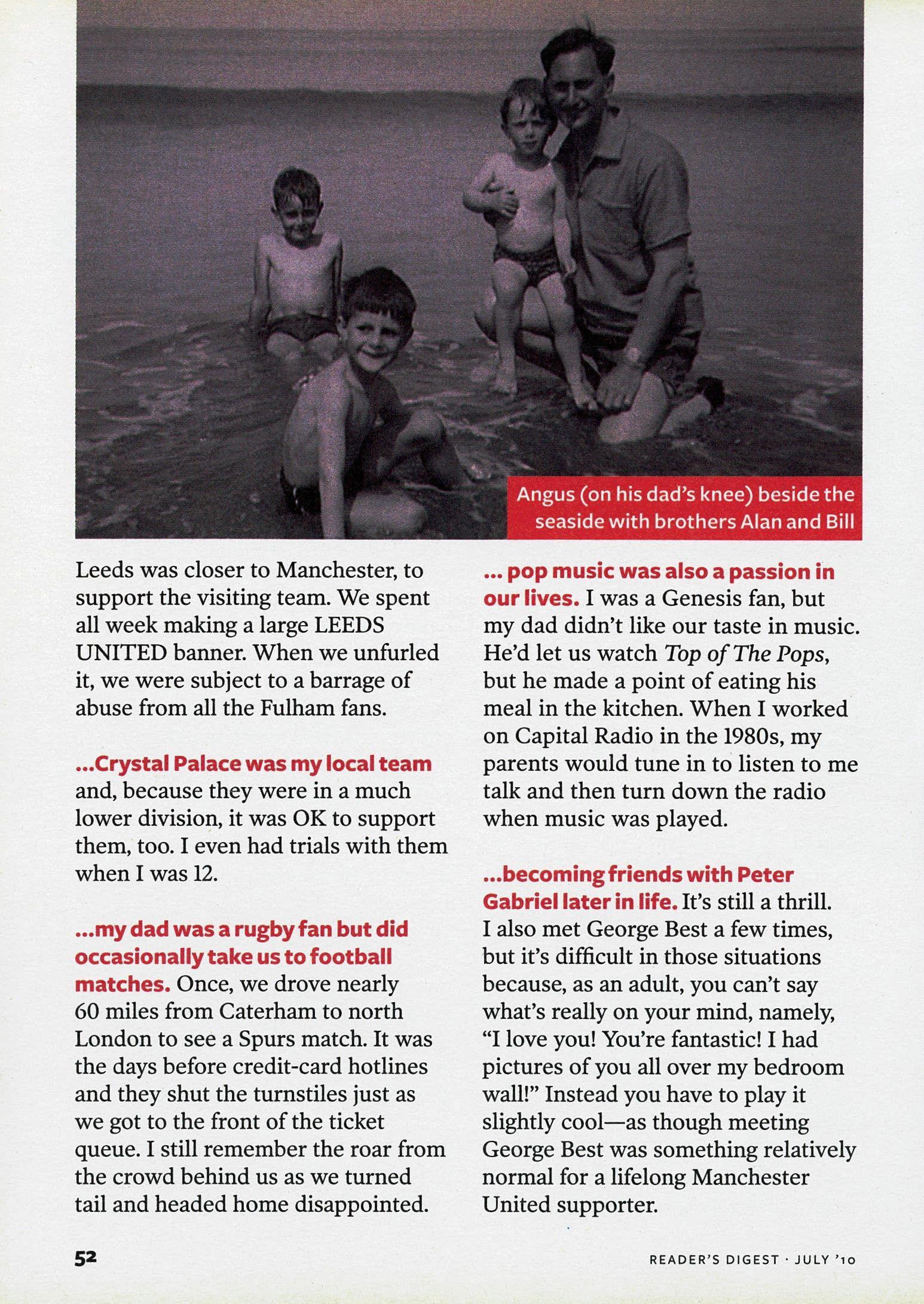
Angus
... pop music was also a passion in our lives. I was a Genesis fan, but my dad didn't like our taste in music. He'd let us watch Top of The Pops, but he made a point of eating his meal in the kitchen. When I worked on Capital Radio in the 1980s, my parents would tune in to listen to me talk and then turn down the radio when music was played.
...becoming friends with Peter Gabriel later in life. It's still a thrill. I also met George Best a few times, but it's difficult in those situations because, as an adult, you can't say what's really on your mind, namely, "I love you! You're fantastic! I had pictures of you all over my bedroom wall!" Instead you have to play it slightly cool—as though meeting George Best was something relatively normal for a lifelong Manchester United supporter.
(on his dad's knee) beside the seaside with brothers Alan and Bill
52 READER'S DIGEST • JULY ',o
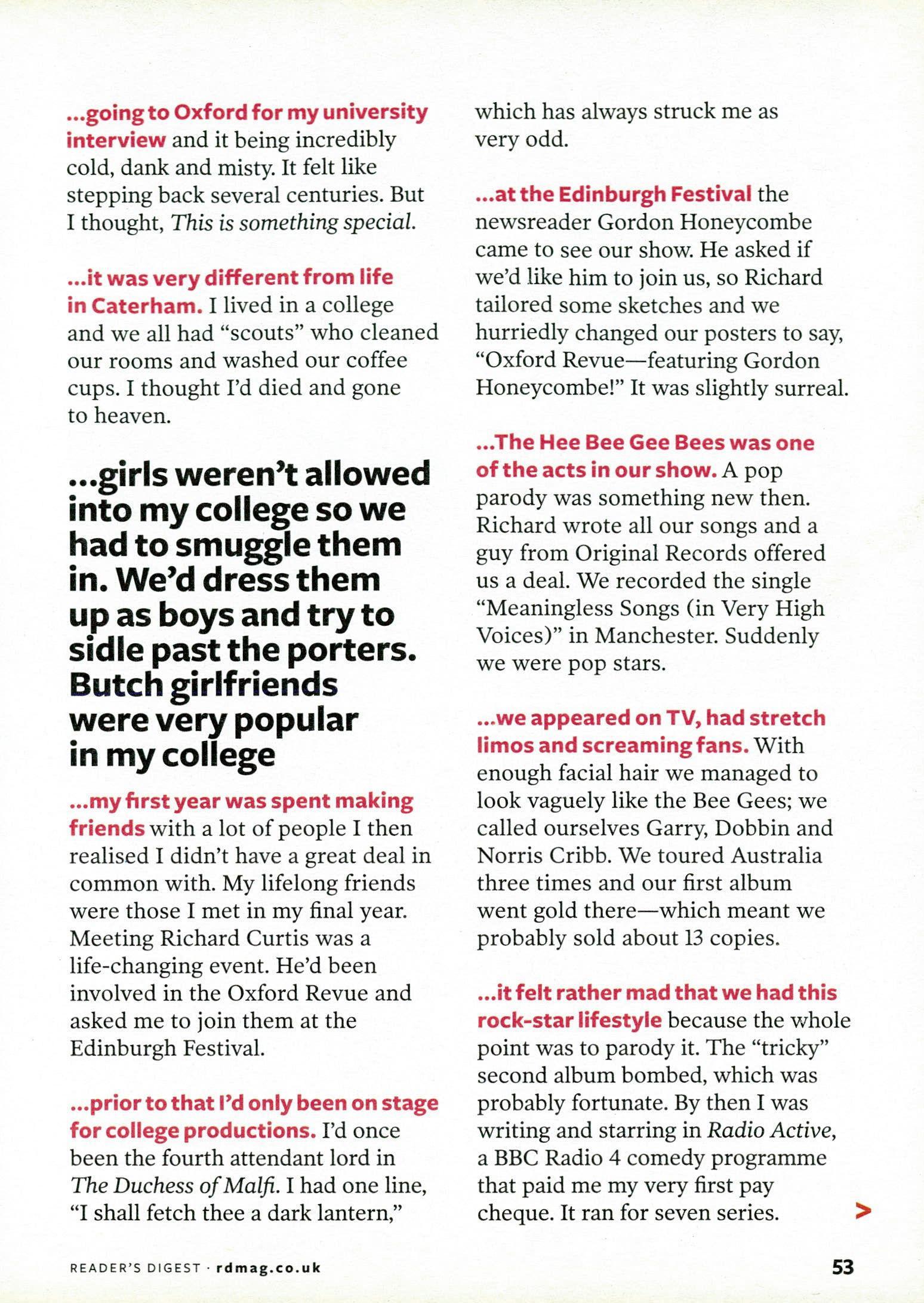
...going to Oxford for my university interview and it being incredibly cold, dank and misty.It felt like stepping back several centuries. But I thought, This is something special.
...it was very different from life in Caterham. Ilived in a college and we all had "scouts" who cleaned our rooms and washed our coffee cups. I thought I'd died and gone to heaven.
...girls weren't allowed into my college so we had to smuggle them in. We'd dress them up as boys and try to sidle past the porters. Butch girlfriends were very popular in my college
...my first year was spent making friendswith a lot of people I then realised I didn't have a great deal in common with. My lifelong friends were those I met in my final year. Meeting Richard Curtis was a life-changing event. He'd been involved in the Oxford Revue and asked me to join them at the Edinburgh Festival.
...prior to that I'd only been on stage for college productions.I'd once been the fourth attendant lord in The Duchess of Malfi.I had one line, "I shall fetch thee a dark lantern,"
which has always struck me as very odd.
...at the Edinburgh Festival the newsreader Gordon Honeycombe came to see our show. He asked if we'd like him to join us, so Richard tailored some sketches and we hurriedly changed our posters to say, "Oxford Revue—featuring Gordon Honeycombe!" It was slightly surreal.
...The Hee Bee Gee Bees was one of the acts in our show.A pop parody was something new then. Richard wrote all our songs and a guy from Original Records offered us a deal. We recorded the single "Meaningless Songs (in Very High Voices)" in Manchester. Suddenly we were pop stars.
...we appeared on TV, had stretch limos and screaming fans.With enough facial hair we managed to look vaguely like the Bee Gees; we called ourselves Garry, Dobbin and Norris Cribb. We toured Australia three times and our first album went gold there—which meant we probably sold about 13 copies.
...it felt rather mad that we had this rock-star lifestyle because the whole point was to parody it. The "tricky" second album bombed, which was probably fortunate. By then I was writing and starring in Radio Active, a BBC Radio 4 comedy programme that paid me my very first pay cheque. It ran for seven series.
READER'S DIGEST rdmag.co.uk 53
Three lions on a pitch: David Baddiel, Rod Stewart and Deayton (right) represent England for Soccer Aid
...Barry Gibb didn't like us at all and would slam down the phone if music journalists tried to ask him about The Hee Bee Gee Bees. This was odd because Richard Curtis was one of their biggest fans. But Maurice and Robin got the joke.
...when I auditioned for the part of Patrick Trench in One Foot in the Grave I hadn't seen the show. Acting, rather than writing or producing, hadn't been part of my game plan, but it was a relief just to concentrate on my performance and have someone else be responsible for the script. Richard Wilson became a firm friend; he's godfather to my son.
...being more nervous about the warm upat the start of Have I Got Newsfor You than presenting the
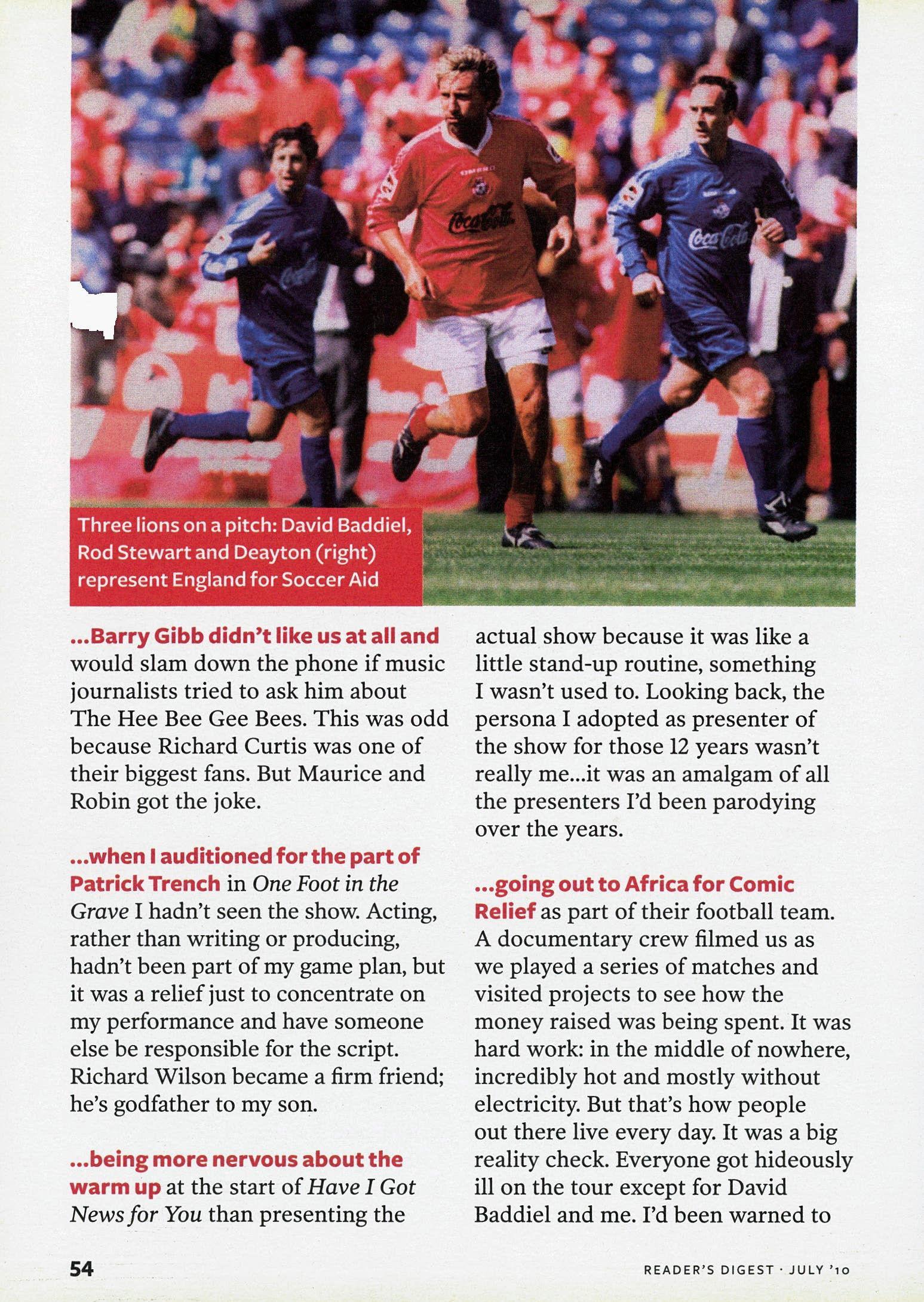
actual show because it was like a little stand-up routine, something I wasn't used to. Looking back, the persona I adopted as presenter of the show for those 12 years wasn't really me...it was an amalgam of all the presenters I'd been parodying over the years.
...going out to Africa for Comic Relief as part of their football team. A documentary crew filmed us as we played a series of matches and visited projects to see how the money raised was being spent. It was hard work: in the middle of nowhere, incredibly hot and mostly without electricity. But that's how people out there live every day. It was a big reality check. Everyone got hideously ill on the tour except for David Baddiel and me. I'd been warned to
54 READER'S DIGEST' JULY '10
eat nothing but vegetables while David ate everything that was put in front of him.
...there was a hole in the floor of our coach and we were covered in red dust from the roads. One evening we turned up at a safari lodge in Ghana. At the bar there was an English guy who'd been studying the menstrual cycle of elephants for seven years. He looked up to see this bunch of dusty travellers including David Essex, John Leslie, Frank Skinner, David Baddiel, Susan Tully, Victor Ubogu and me. He thought, I've been out here too long.
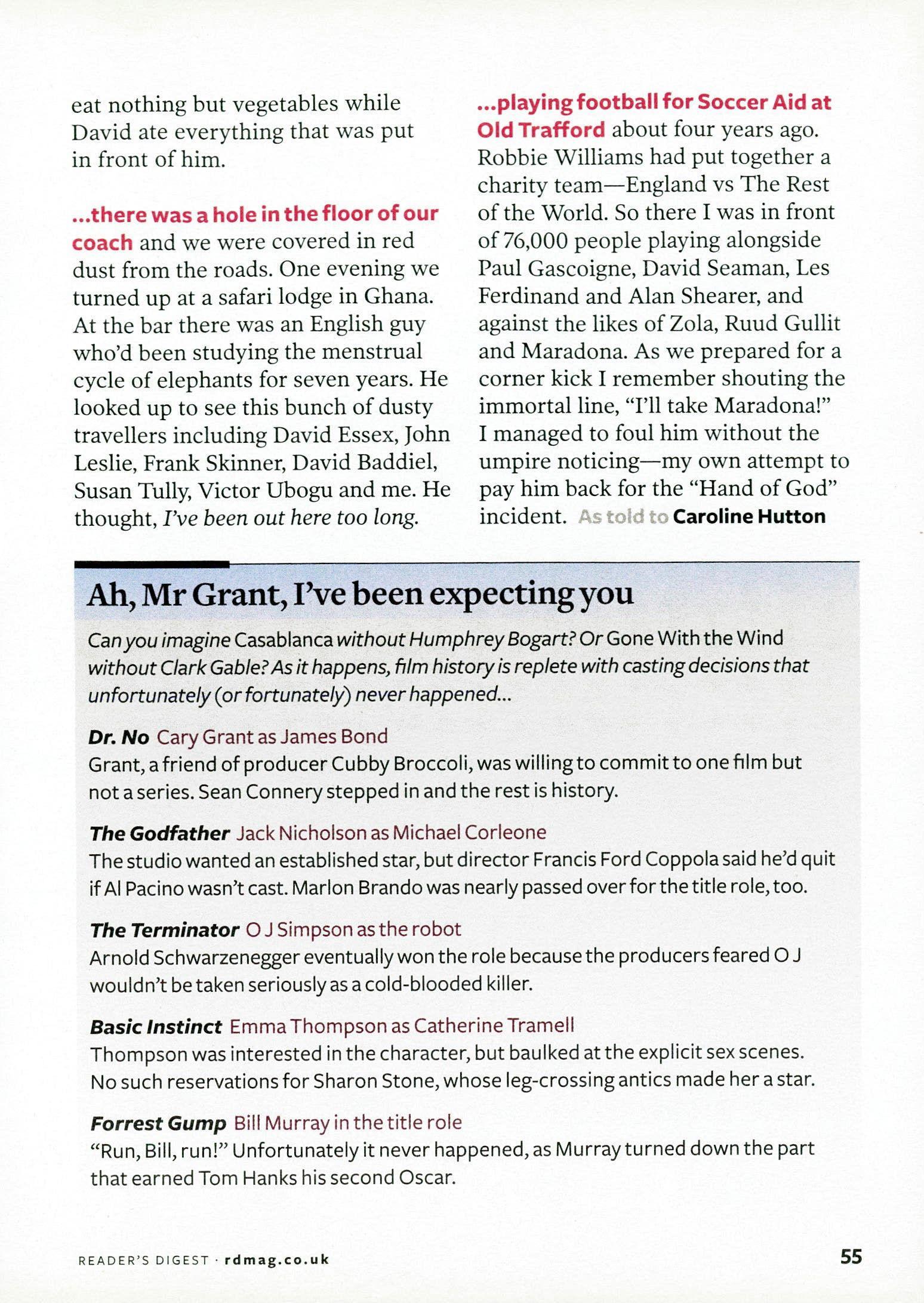
...playing football for Soccer Aid at Old Trafford about four years ago. Robbie Williams had put together a charity team—England vs The Rest of the World. So there I was in front of 76,000 people playing alongside Paul Gascoigne, David Seaman, Les Ferdinand and Alan Shearer, and against the likes of Zola, Ruud Gullit and Maradona. As we prepared for a corner kick I remember shouting the immortal line, "I'll take Maradona!" I managed to foul him without the umpire noticing—my own attempt to pay him back for the "Hand of God" incident.
Caroline Hutton
Ah, Mr Grant, I've been expecting you
Can you imagine Casablanca without Humphrey Bogart? Or Gone With the Wind without Clark Gable?Asit happens, film history is replete with casting decisions that unfortunately (or fortunately) never happened...
Dr. No Cary Grant as James Bond
Grant, a friend of producer Cubby Broccoli, was willing to commit to one film but not a series. Sean Connery stepped in and the rest is history.
The Godfather Jack Nicholson as Michael Corleone
The studio wanted an established star, but director Francis Ford Coppola said he'd quit if Al Pacino wasn't cast. Marlon Brando was nearly passed over for the title role, too.
The Terminator 0 J Simpson as the robot
Arnold Schwarzenegger eventually won the role because the producers feared 0 J wouldn't be taken seriously as a cold-blooded killer.
Basic Instinct Emma Thompson as Catherine Tramell
Thompson was interested in the character, but baulked at the explicit sex scenes. No such reservations for Sharon Stone, whose leg-crossing antics made her a star.
Forrest Gump Bill Murray in the title role
"Run, Bill, run!" Unfortunately it never happened, as Murray turned down the part that earned Tom Hanks his second Oscar.
READER'S DIGEST rdmag.co.uk 55

- VV
I of
Killer on the loose: the lionfish's wispy fins hide a deadly secret
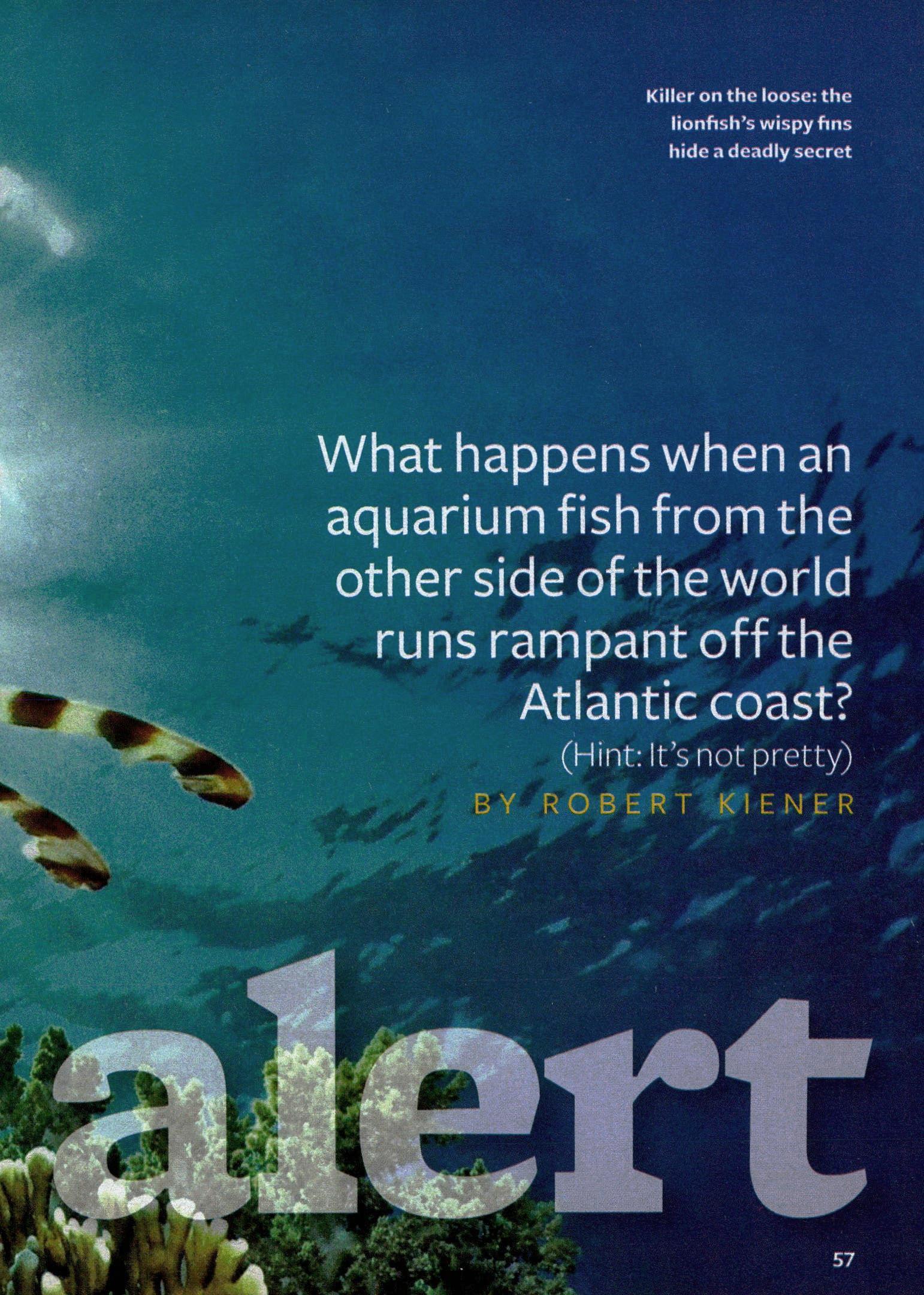
What happens when an aquarium fish from the other side of the world runs rampant off the Atlantic coast?
(Hint: It's not pretty)
BY ROBERT KIENER
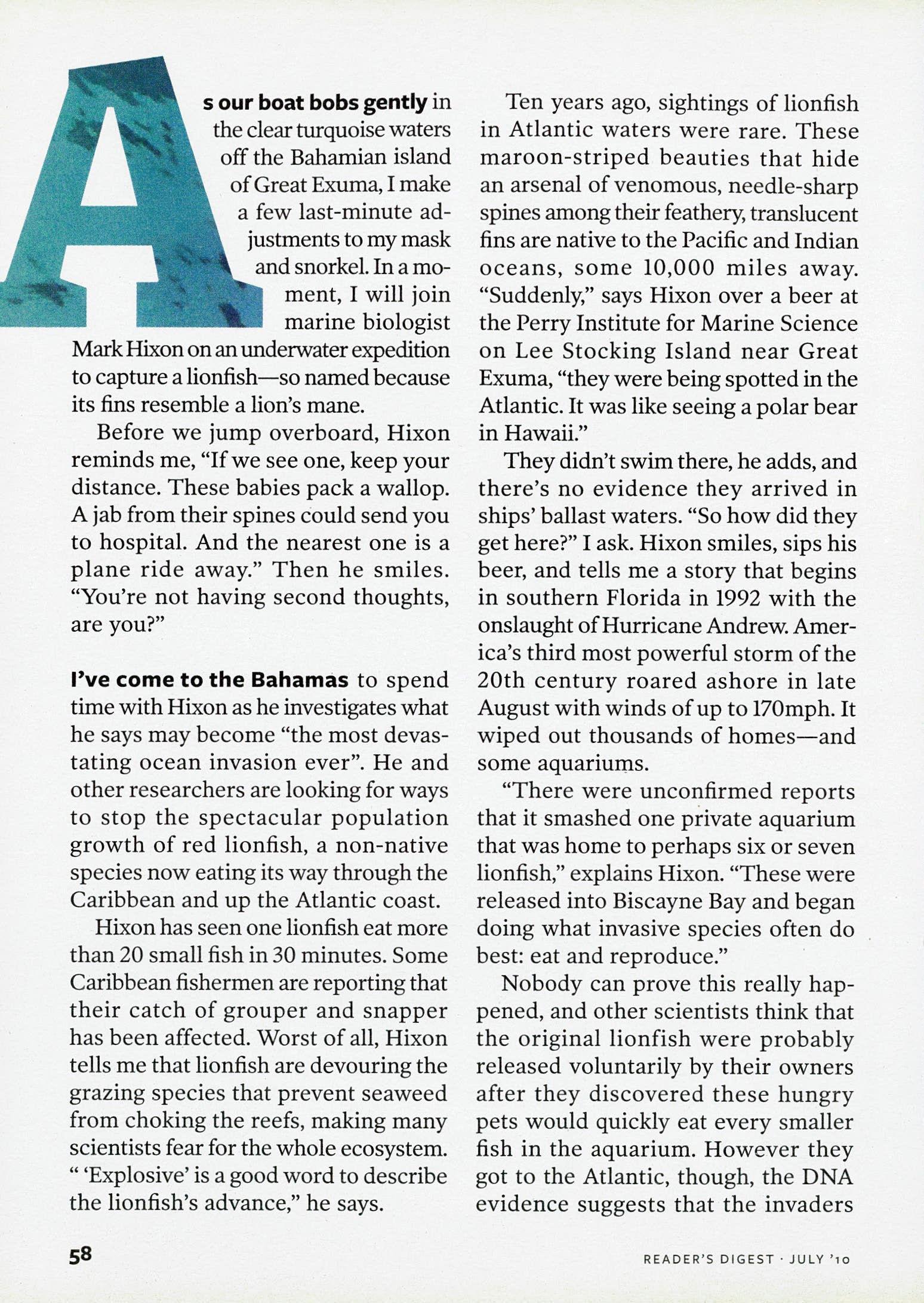
s our boat bobs gentlyin the clear turquoise waters off the Bahamian island of Great Exuma, I make a few last-minute adjustments to my mask and snorkel. In a moment, I will join marine biologist Mark Hixon on an underwater expedition to capture a lionfish—so named because its fins resemble a lion's mane.
Before we jump overboard, Hixon reminds me, "If we see one, keep your distance. These babies pack a wallop. A jab from their spines could send you to hospital. And the nearest one is a plane ride away." Then he smiles. "You're not having second thoughts, are you?"
I've come to the Bahamas to spend time with Hixon as he investigates what he says may become "the most devastating ocean invasion ever". He and other researchers are looking for ways to stop the spectacular population growth of red lionfish, a non-native species now eating its way through the Caribbean and up the Atlantic coast.
Hixon has seen one lionfish eat more than 20 small fish in 30 minutes. Some Caribbean fishermen are reporting that their catch of grouper and snapper has been affected. Worst of all, Hixon tells me that lionfish are devouring the grazing species that prevent seaweed from choking the reefs, making many scientists fear for the whole ecosystem. "'Explosive' is a good word to describe the lionfish's advance," he says.
Ten years ago, sightings of lionfish in Atlantic waters were rare. These maroon-striped beauties that hide an arsenal of venomous, needle-sharp spines among their feathery, translucent fins are native to the Pacific and Indian oceans, some 10,000 miles away. "Suddenly," says Hixon over a beer at the Perry Institute for Marine Science on Lee Stocking Island near Great Exuma, "they were being spotted in the Atlantic. It was like seeing a polar bear in Hawaii."
They didn't swim there, he adds, and there's no evidence they arrived in ships' ballast waters. "So how did they get here?" I ask. Hixon smiles, sips his beer, and tells me a story that begins in southern Florida in 1992 with the onslaught of Hurricane Andrew. America's third most powerful storm of the 20th century roared ashore in late August with winds of up to 170mph. It wiped out thousands of homes—and some aquariums.
"There were unconfirmed reports that it smashed one private aquarium that was home to perhaps six or seven lionfish," explains Hixon. "These were released into Biscayne Bay and began doing what invasive species often do best: eat and reproduce."
Nobody can prove this really happened, and other scientists think that the original lionfish were probably released voluntarily by their owners after they discovered these hungry pets would quickly eat every smaller fish in the aquarium. However they got to the Atlantic, though, the DNA evidence suggests that the invaders
58 READER'S DIGEST • JULY '10
"Yep, there's another one": a marine biologist charts the growing population of lionfish off the island of Great Exuma
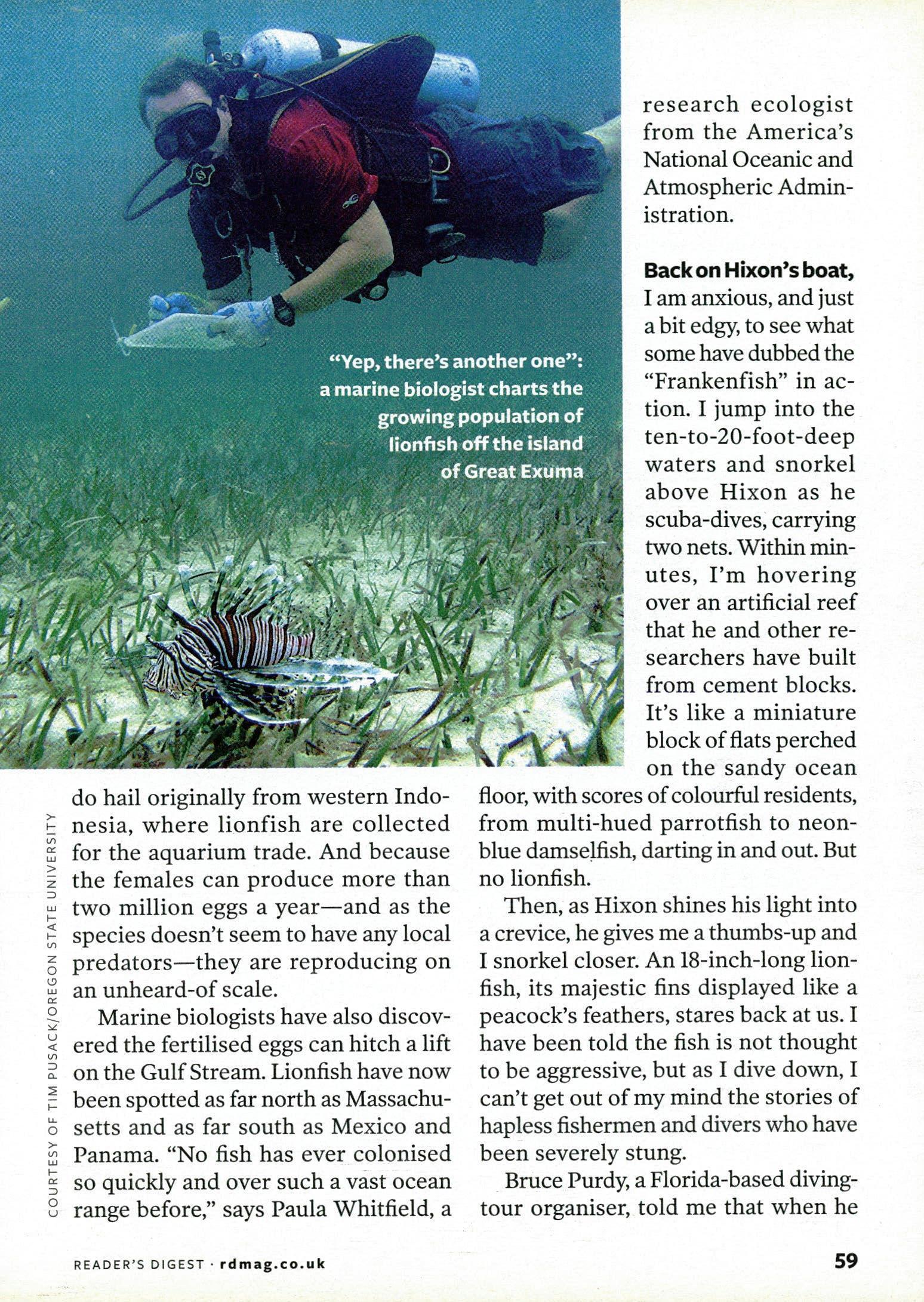
do hail originally from western Indonesia, where lionfish are collected for the aquarium trade. And because the females can produce more than two million eggs a year—and as the species doesn't seem to have any local predators—they are reproducing on an unheard-of scale.
Back on Hixon's boat, I am anxious, and just a bit edgy, to see what some have dubbed the "Frankenfish" in action. I jump into the ten-to-20-foot-deep waters and snorkel above Hixon as he scuba-dives, carrying two nets. Within minutes, I'm hovering over an artificial reef that he and other researchers have built from cement blocks. It's like a miniature block of flats perched on the sandy ocean floor, with scores of colourful residents, from multi-hued parrotfish to neonblue damselfish, darting in and out. But no lionfish.
Then, as Hixon shines his light into a crevice, he gives me a thumbs-up and I snorkel closer. An 18-inch-long lionfish, its majestic fins displayed like a peacock's feathers, stares back at us. I have been told the fish is not thought to be aggressive, but as I dive down, I can't get out of my mind the stories of hapless fishermen and divers who have been severely stung.
Bruce Purdy, a Florida-based divingtour organiser, told me that when he
Marine biologists have also discovered the fertilised eggs can hitch a lift on the Gulf Stream. Lionfish have now been spotted as far north as Massachusetts and as far south as Mexico and Panama. "No fish has ever colonised so quickly and over such a vast ocean range before," says Paula Whitfield, a research ecologist from the America's National Oceanic and Atmospheric Administration.
COUR TESY OF TI M PUSACK/ O R EGON S TA T E UNI VERS IT Y
READER'S DIGEST • rdmag.co.uk 59
was stung, his palm turned crimson and ballooned. "The pain was so severe, I wanted to cut my hand off," he said. A fisherman on Great Exuma confessed to crying like a baby. The stings can reportedly cause nausea, breathing difficulties, convulsions, and paralysis.
When I am finally face-to-face with a lionfish, it is spectacularly beautiful, its body glistening with red, white, and gold stripes, and its delicate, wispy fins swaying and fluttering hypnotically in
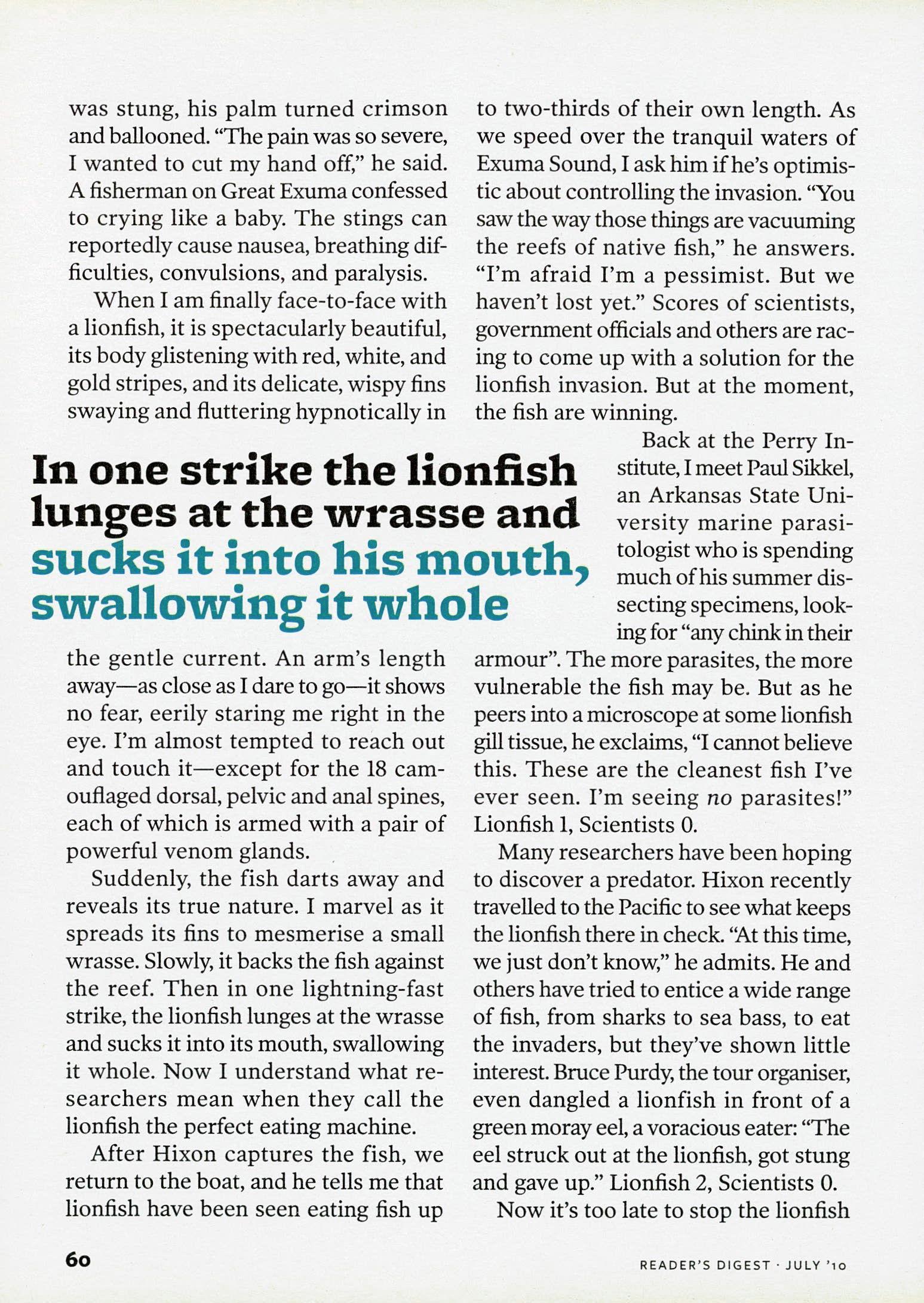
to two-thirds of their own length. As we speed over the tranquil waters of Exuma Sound, I ask him if he's optimistic about controlling the invasion. "You saw the way those things are vacuuming the reefs of native fish," he answers. "I'm afraid I'm a pessimist. But we haven't lost yet." Scores of scientists, government officials and others are racing to come up with a solution for the lionfish invasion. But at the moment, the fish are winning.
In one strike the lionfish lunges at the wrasse and sucks it into his mouth, swallowing it whole
the gentle current. An arm's length away—as close as I dare to go—it shows no fear, eerily staring me right in the eye. I'm almost tempted to reach out and touch it—except for the 18 camouflaged dorsal, pelvic and anal spines, each of which is armed with a pair of powerful venom glands.
Suddenly, the fish darts away and reveals its true nature. I marvel as it spreads its fins to mesmerise a small wrasse. Slowly, it backs the fish against the reef. Then in one lightning-fast strike, the lionfish lunges at the wrasse and sucks it into its mouth, swallowing it whole. Now I understand what researchers mean when they call the lionfish the perfect eating machine.
After Hixon captures the fish, we return to the boat, and he tells me that lionfish have been seen eating fish up
Back at the Perry Institute, I meet Paul Sikkel, an Arkansas State University marine parasitologist who is spending much of his summer dissecting specimens, looking for "any chink in their armour". The more parasites, the more vulnerable the fish may be. But as he peers into a microscope at some lionfish gill tissue, he exclaims, "I cannot believe this. These are the cleanest fish I've ever seen. I'm seeing no parasites!"
Lionfish 1, Scientists 0.
Many researchers have been hoping to discover a predator. Hixon recently travelled to the Pacific to see what keeps the lionfish there in check "At this time, we just don't know," he admits. He and others have tried to entice a wide range of fish, from sharks to sea bass, to eat the invaders, but they've shown little interest. Bruce Purdy, the tour organiser, even dangled a lionfish in front of a green moray eel, a voracious eaten "The eel struck out at the lionfish, got stung and gave up." Lionfish 2, Scientists 0. Now it's too late to stop the lionfish
6o READER'S DIGEST • JULY ',o
by capturing and killing them individually, some governments have initiated culling programmes. Local fishermen have also been taught how to catch and dispatch them safely. Even so, many marine biologists believe the best way to contain the lionfish would also be one of the simplest: by eating them.
Indeed, some restaurants in Nassau have begun featuring lionfish on their menus as a novelty item. But as I soon discover, Bahamians are wary of eating what many of them consider to be "that poison fish". But, I wondered, could they be made to change their minds?
When I first askthe noted Great Exuma chef Susan Gordon if she will share a lionfish dinner with me, she howls with laughter and says, "No way! I'm not touching them." Eventually, after I explain that the lionfish is harmless once its spines have been removed, and that cooking neutralises any venom, she reluctantly agrees to prepare one.
And so, at the kitchen of the Perry Institute, Paul Sikkel brings in a pudgy
18-incher dubbed Big Poppa. Sikkel has removed the spines and Susan promises to eat it with me, but only if I take the first bite.
With a crowd of locals and marine biologists urging us on, Susan fillets, batters and fries up the fish, adding lime juice and garlic. As I raise a forkful to my mouth, I could hear a pin drop—and I remember Hixon telling me, "The nearest hospital is a plane ride away."
The fish is white, flaky and almost sweet, like grouper. "Delicious," I say as I take another bite. Susan hesitates but takes a forkful. Her verdict: "Mmmmm."
Our audience nods in approval. I think we've convinced them that, when properly cooked, lionfish are safe—and tasty—to eat. But to clinch the deal, I remind them, "In Asia, the lionfish is said to be a powerful aphrodisiac."
I can still hear their laughter and see their smiles. Writer 1, Lionfish 0.
0 To see a short film about Mark Hixon's research into the lionfish, visit rdmag.co.uk.
That's clear, then
Signs
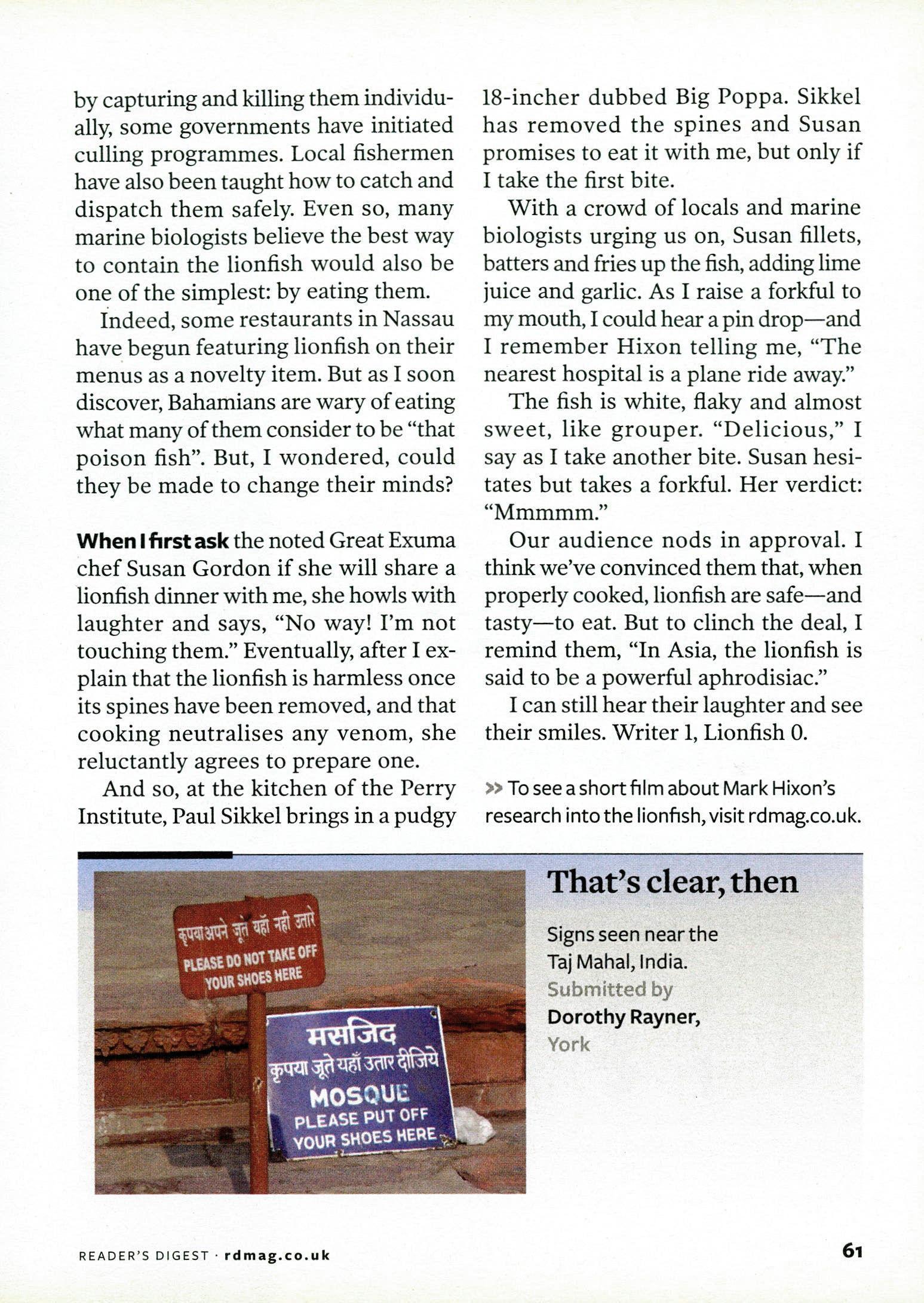
Dorothy Rayner, York
PLEASE00NOTTAKEOFF YOUR SHOESHERE FIVIDr4 fin,fatIPPWA:4 ' MOSOUL PLEASE PUT OFF YOUR SHOES HERE
Taj Mahal, India.
seen near the
READER'S DIGEST • rdmag.co.uk 61
Some of you may have given up on the values that made me come to Britain all those years ago. But I haven't
40years
BY MONICA PORTER
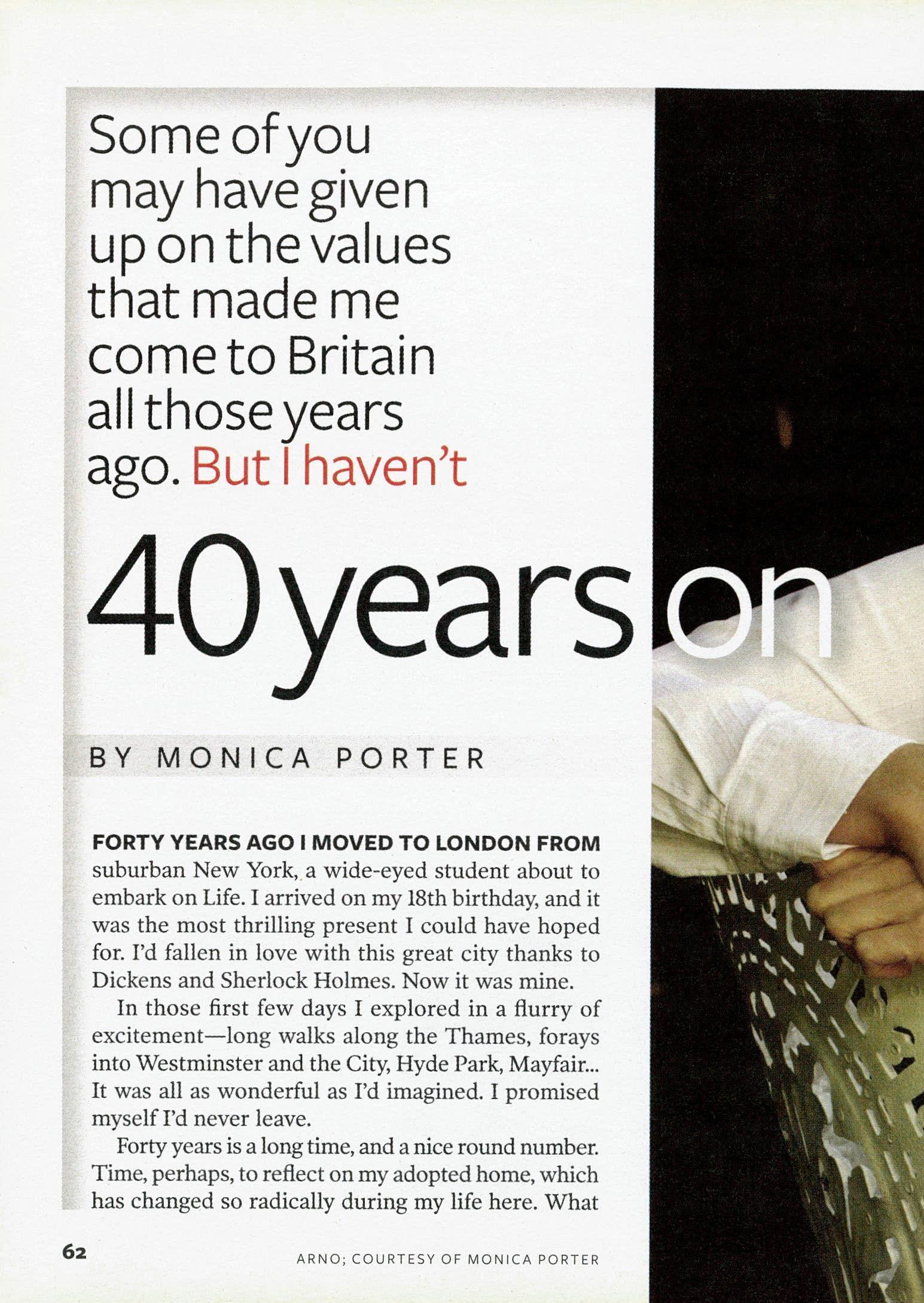
FORTY YEARS AGO I MOVED TO LONDON FROM suburban New York, a wide-eyed student about to embark on Life. I arrived on my 18th birthday, and it was the most thrilling present I could have hoped for. I'd fallen in love with this great city thanks to Dickens and Sherlock Holmes. Now it was mine.
In those first few days I explored in a flurry of excitement—long walks along the Thames, forays into Westminster and the City Hyde Park, Mayfair... It was all as wonderful as I'd imagined. I promised myself I'd never leave.
Forty years is a long time, and a nice round number. Time, perhaps, to reflect on my adopted home, which has changed so radically during my life here. What
62 ARNO; COURTESY OF MONICA PORTER
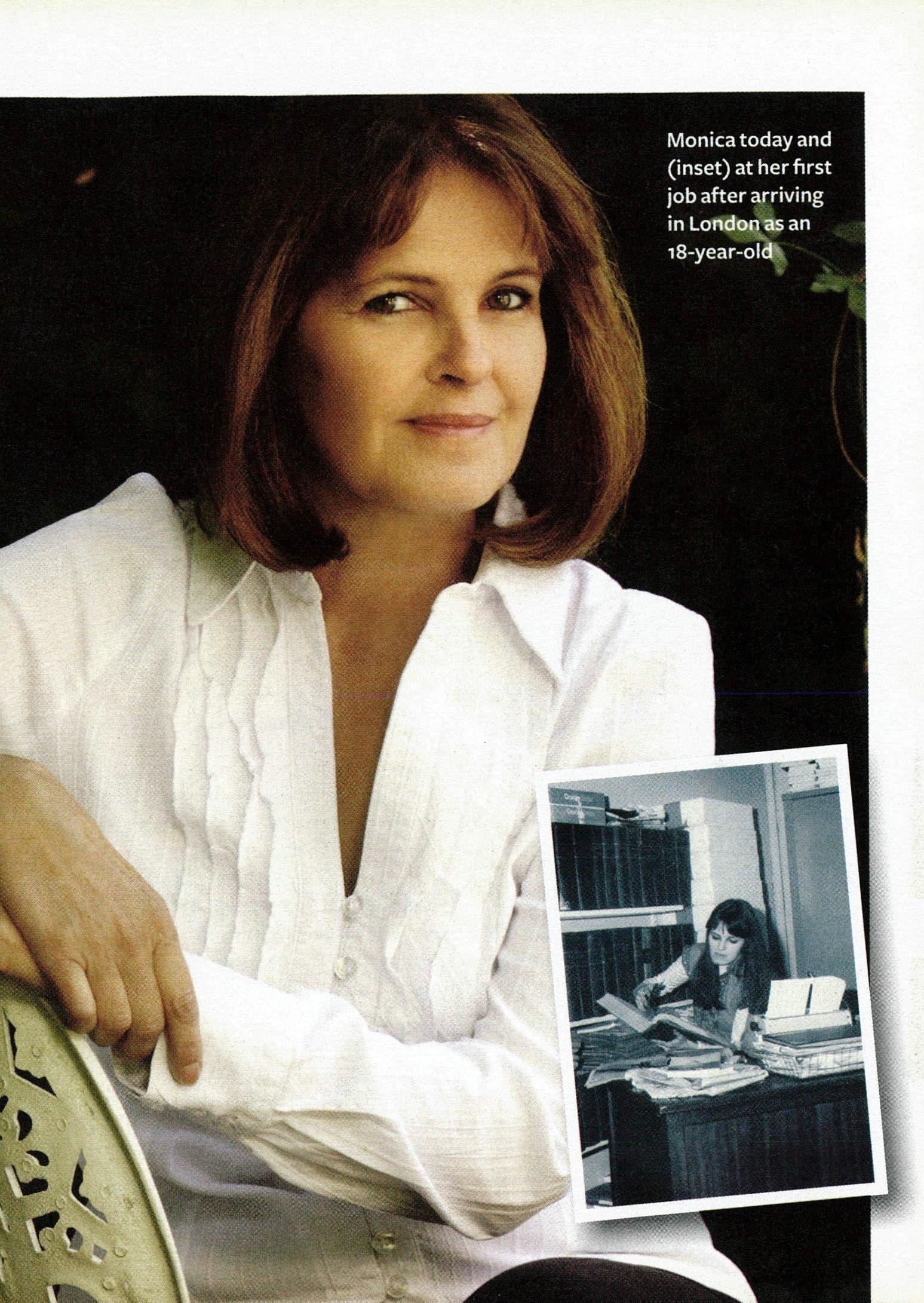
Monica today and (inset) at her first job after arriving in London as an i8-year-old
saddens me most is that we seem to have lost (or, more accurately, jettisoned) the very Britishness that drew me here in the first place.
When I arrived in 1970, London was already fabulously cosmopolitan— you'd meet 30 people at a party and they'd be from 15 different countries— which was something I relished. But this multiculturalism was underpinned by certain traditional British ideals: tolerance, equality, plurality. Everyone I met, no matter what their background, seemed to share these values and to regard themselves as fortunate to be
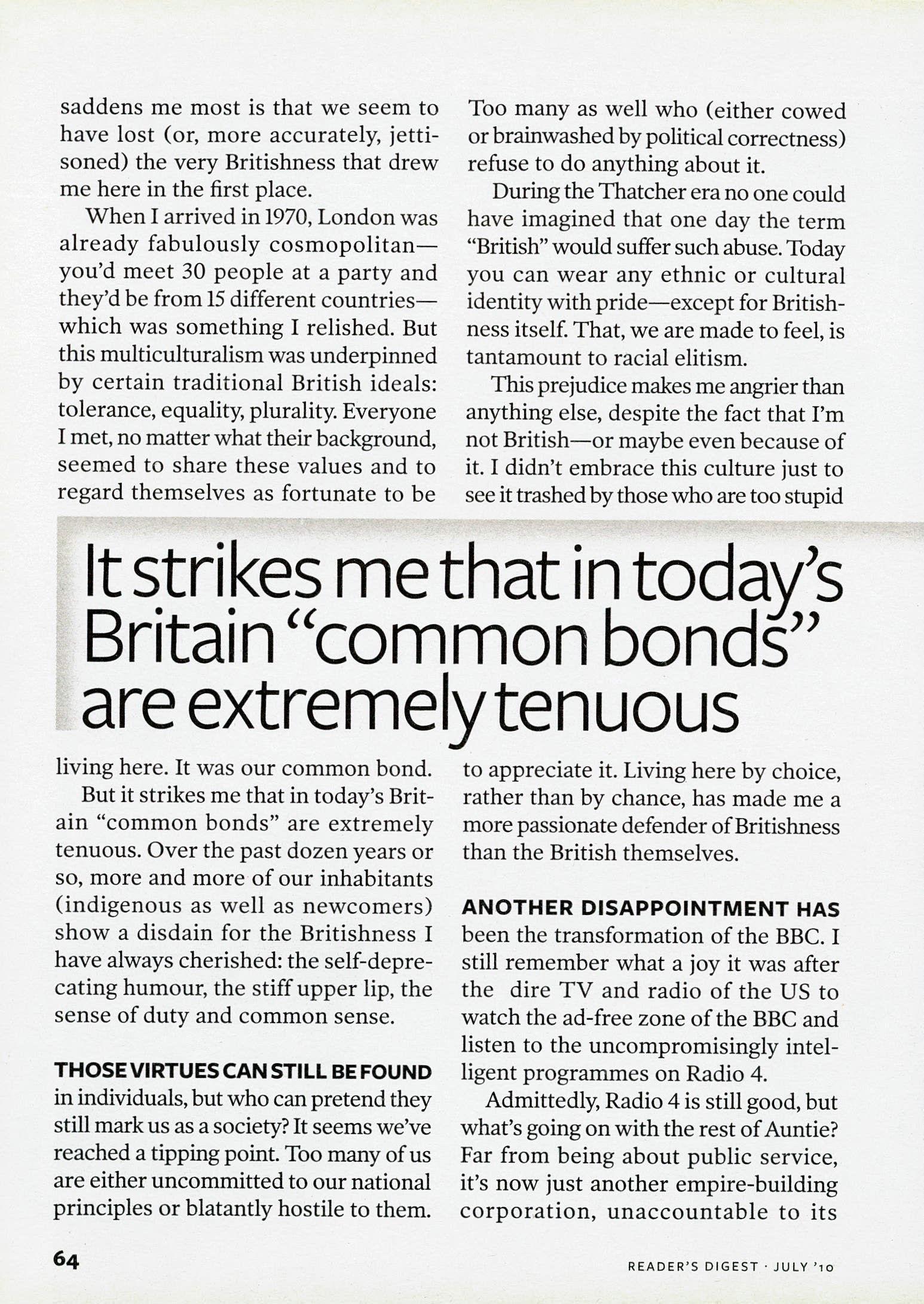
Too many as well who (either cowed or brainwashed by political correctness) refuse to do anything about it.
During the Thatcher era no one could have imagined that one day the term "British" would suffer such abuse. Today you can wear any ethnic or cultural identity with pride—except for Britishness itself. That, we are made to feel, is tantamount to racial elitism.
This prejudice makes me angrier than anything else, despite the fact that I'm not British—or maybe even because of it. I didn't embrace this culture just to see it trashed by those who are too stupid
It strikes me that in today's
Britain "common bonds" are extremely
living here. It was our common bond.
But it strikes me that in today's Britain "common bonds" are extremely tenuous. Over the past dozen years or so, more and more of our inhabitants (indigenous as well as newcomers) show a disdain for the Britishness I have always cherished: the self-deprecating humour, the stiff upper lip, the sense of duty and common sense.
THOSE
VIRTUES CAN STILL BE FOUND in individuals, but who can pretend they still mark us as a society? It seems we've reached a tipping point. Too many of us are either uncommitted to our national principles or blatantly hostile to them.
tenuous
to appreciate it. Living here by choice, rather than by chance, has made me a more passionate defender of Britishness than the British themselves.
ANOTHER DISAPPOINTMENT
HAS been the transformation of the BBC. I still remember what a joy it was after the dire TV and radio of the US to watch the ad-free zone of the BBC and listen to the uncompromisingly intelligent programmes on Radio 4.
Admittedly, Radio 4 is still good, but what's going on with the rest of Auntie? Far from being about public service, it's now just another empire-building corporation, unaccountable to its
64 READER'S DIGEST • JULY '10
owners—us—and too concerned with competing against commercial rivals. It seems to have lost its way—a metaphor for the country as a whole.
As for the great metropolis I first encountered, it's grown much more hard-boiled. It used to have a friendlier atmosphere. People used to trust each other more. (I guess trust went out the window after the 7/7 atrocities.)
And there was a quirkiness about London that has been all but wiped out by its gradual Americanisation. It didn't used to look or feel like any other place. Now it's just as full of McDonald's and Starbucks outlets and anonymous office blocks as any other city. Chunks of it could pass for Chicago or Los Angeles. It's not only more aggressively commercial, but also more samey.
Call me nostalgic, but I don't think I'm wearing rose-tinted glasses. I haven't forgotten the downside to the Seventies and Eighties—the strikes, riots and economic woes—and I realise that the regeneration of our cities was necessary
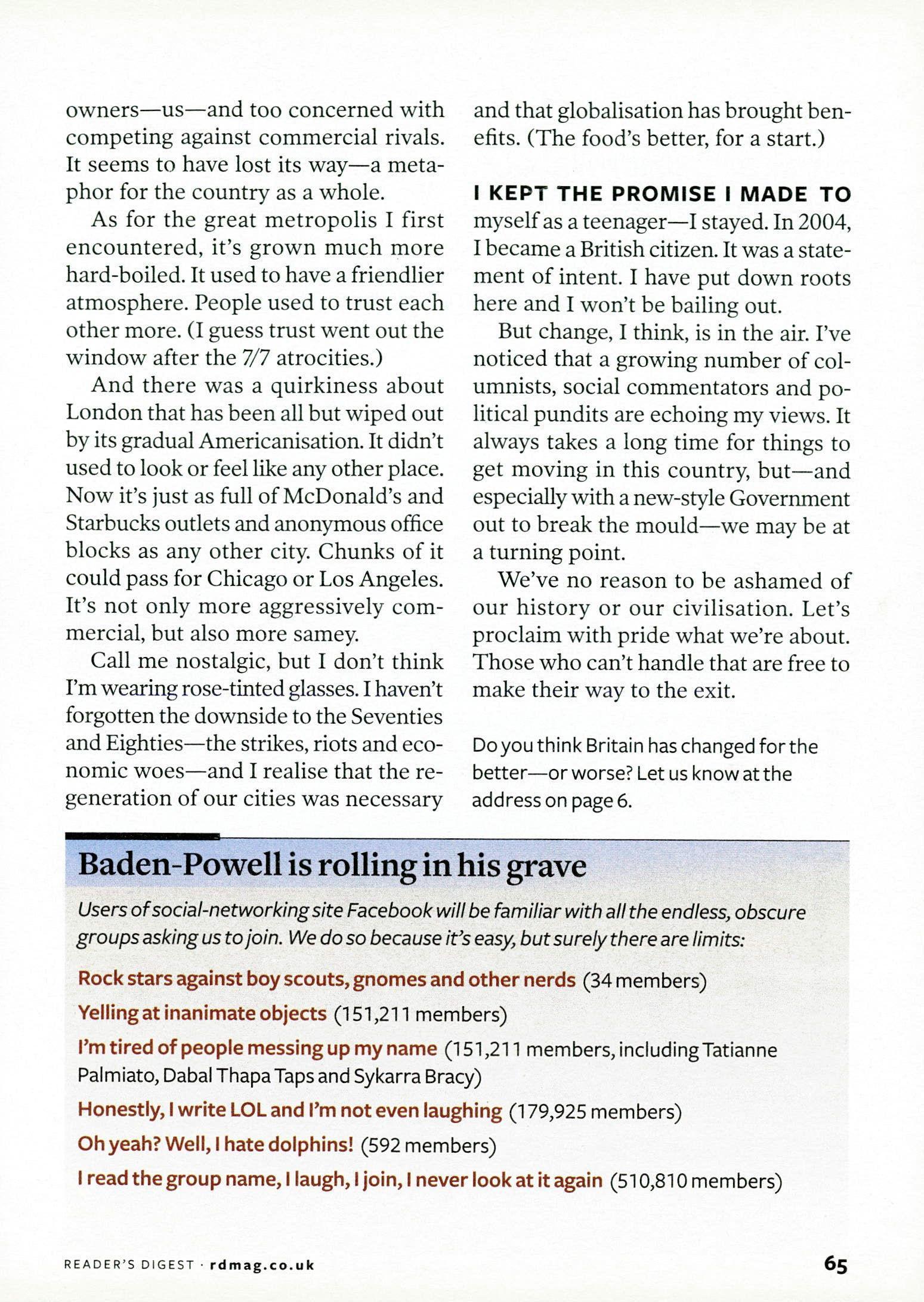
and that globalisation has brought benefits. (The food's better, for a start.)
I KEPT THE PROMISE I MADE TO myself as a teenager—I stayed. In 2004, I became a British citizen. It was a statement of intent. I have put down roots here and I won't be bailing out.
But change, I think, is in the air. I've noticed that a growing number of columnists, social commentators and political pundits are echoing my views. It always takes a long time for things to get moving in this country, but—and especially with a new-style Government out to break the mould—we may be at a turning point.
We've no reason to be ashamed of our history or our civilisation. Let's proclaim with pride what we're about. Those who can't handle that are free to make their way to the exit.
Doyou think Britain has changed for the better—or worse? Let us know at the address on page 6.
Baden-Powell is rolling in his grave
Users of social-networking site Facebook will be familiar with all the endless, obscure groups asking us to join. We do so because it's easy, but surely there are limits: Rock stars against boyscouts, gnomesand other nerds (34 members)
Yelling at inanimate objects (151,211 members)
I'm tired of people messing up my name (151,211 members,including Tatianne Palmiato, Dabal Thapa Taps and Sykarra Bracy)
Honestly, I write LOL and I'm not even laughing (179,925 members)
Oh yeah? Well, I hate dolphins! (592 members)
I read the group name, I laugh, I join, I never look at it again (510,810 members)
READER'S DIGEST • rdmag.co.uk 65

Small architectural details can reveal the fascinating histories of our homes.
Buildings historian, author and TV presenter Jonathan Foyle shows you what to look for
The IIidden Secrets of Britain's Ilouses
1t's a given that most Britons want their house to be more than just a box to live in. We think homes should have "character", be it an 18th-century fireplace, bricks the colour of local clay or original exposed timbers. We value these architectural details because they're a physical reminder of our ancestors' building techniques, tastes and lives—and estate agents make sure we pay a premium for them.
But every day, in our own homes or nearby streets, we see little clues to a building's past without knowing what they mean.
So here are ten often-overlooked features of British homes that will help you unlock their architectural past. They might even give you the edge over estate agents desperately trying to pass those sash windows off as "genuine 17th-century"...
66 ILLUSTRATED BY BILL SANDERSON
MEDIEVAL HOMES IN GEORGIAN CLOTHING
In many towns rich in 18th-century buildings, such as Framlingham in Suffolk, Pershore in Worcestershire or Lewes in East Sussex,you'll see any number of typical Georgian houses. But look closer and you'll spot that the Georgian obsession with windows being perfectly aligned isn't

always followed. The reason is usually that a medieval or Tudor timberframed house
lurks beneath. As Georgian tastes began to swing towards classical designs, old timber houses were often clad in brick, stucco, tiles or weatherboard. But punching holes in their ageing walls to install regularly spaced windows would often have meant removing a wall brace. This could have led to the house collapsing. So developers had to work round such supports, and settle for making windows as closely aligned as possible.
ROOM WITH A WOBBLY VIEW
Imperfect window panes are one of the chief joys of old houses. Sunlight casts wavy patterns on walls; the view of the outside is softened. The reason? Panes dating from the 167os to around 1840 are usually "crown glass", made by blowing a molten glass bubble (the "crown") and spinning it so that it forms a disc of up to five
feet in diameter. Rectangular panes (bearing rippled lines from the disc that
creates the wobbly light effect) were then cut to form glazing bars.
After 1840, manufacturers switched to plate glass, so you can identify pre-184o panes by these curved lines (al\ though Victorian plate glass wasn't perfect and may have smaller ripples). Traditionallooking windows without such imperfections may not be as old as you think. >
!!,I
67
MODEST ORIGINS, MODERN VALUE
Thick, knobbly bullseye panes were the remnants of handblown glass taken from the centre of the disc, where it made contact with the glassblowing rod. Essentially waste material, they were once the stuff of lowly
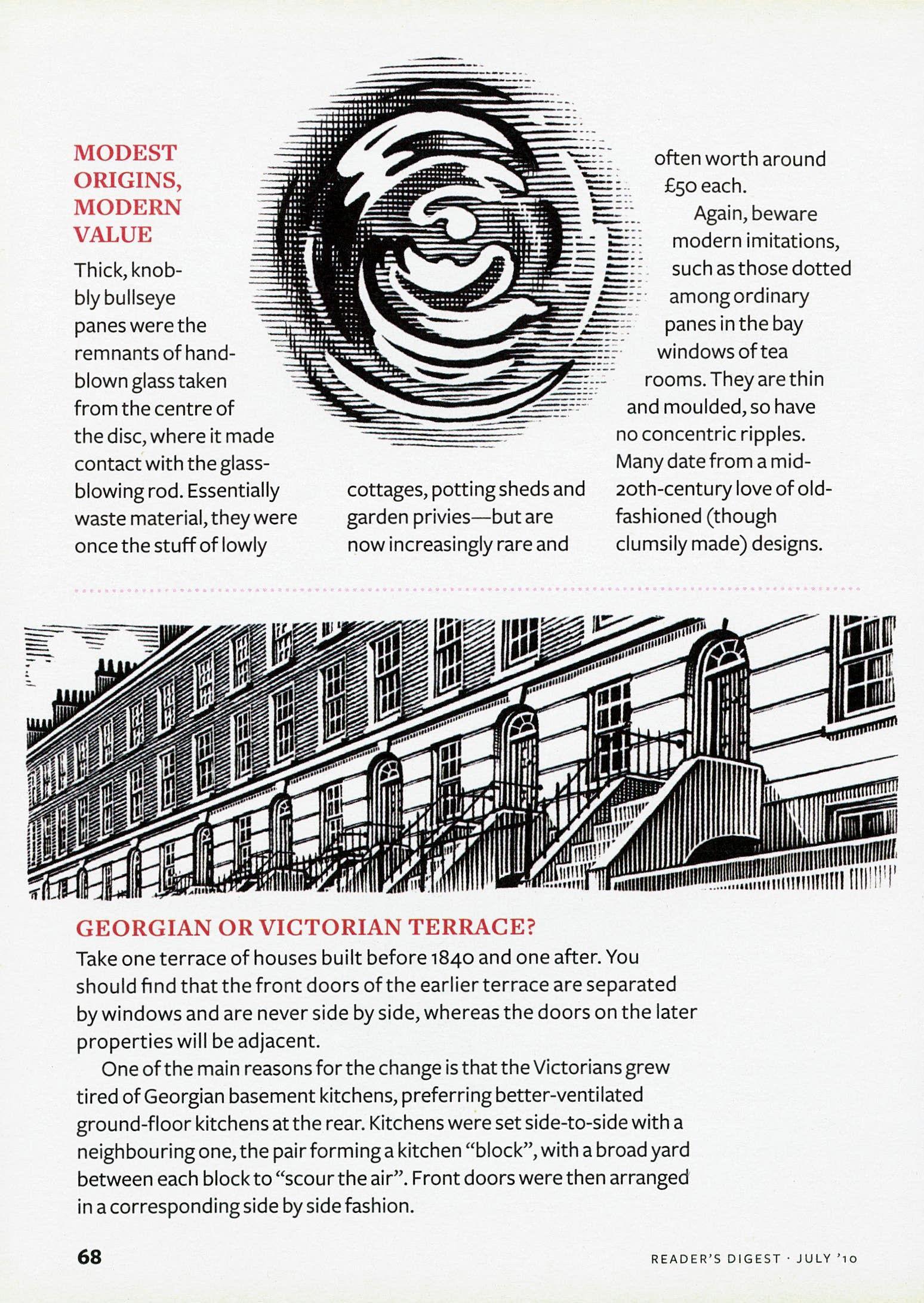
often worth around £50 each.
Again, beware modern imitations, such as those dotted among ordinary panes in the bay windows of tea rooms. They are thin and moulded, so have no concentric ripples.
Many date from a midcottages, potting sheds and zoth-century love of oldgarden privies—but are fashioned (though now increasingly rare and clumsily made) designs.
GEORGIAN OR VICTORIAN TERRACE?
Take one terrace of houses built before 1840 and one after. You should find that the front doors of the earlier terrace are separated by windows and are never side by side, whereas the doors on the later properties will be adjacent.
One of the main reasons for the change is that the Victorians grew tired of Georgian basement kitchens, preferring better-ventilated ground-floor kitchens at the rear. Kitchens were set side-to-side with a neighbouring one, the pair forming a kitchen "block", with a broad yard between each block to "scour the air". Front doors were then arranged in a corresponding side by side fashion.
•16,I odkr 411111400,',11" dr•KI,11 lir Al 111 7°P■ ii"10 I 1 111,i1 Ill IIII11111111111111111,
68 READER'S DIGEST • JULY
A FRUITY WELCOME

During the i8th century, pineapples popped up on the gateposts of houses on both sides of the Atlantic. The spiky-fronded sculp-
tures signified hospitality —early travellers to the Caribbean were greeted with fresh pineapples after long voyages spent eating dried foods. Across the Atlantic seaboard in Britain, pineapples outside houses promised a similarlywarm welcome. They can also be found on Quaker meeting houses, the choice of a spiritual order that rejected traditional religious imagery. The most spectacular example of a pineapple is the 45-foot-high stone structure that adorns a folly in Dunmore Park, near Falkirk, Scotland.
Pineapple sculptures outside houses signified hospitality
HOW OLD IS YOUR SASH?
Britain's distinctive sash window probably dates from the1670s. It dominated house-building for two centuries, until the nostalgic reintroduction of casements and i II leaded windows offered variety III lb' after about 1880. 0! There are two ways to gauge Illlll II the date of a sash. Firstly, the I 11 thicker the glazing bars, the earlier the window. They grew Ii slender after about1750, reducing from some i to 0.5 inches. !I111111 Nineteenth-century bars may be only 0.3 inches. Secondly, in IW the 18thcentury panes were arranged "six-over-six." But after II larger, plate-glass panes were introduced in the184os, sashes became two-over-two and, by 1900, one-over-one. >
ill ---ouluoiart4 41- 1,imtr■ z 11.111 "" 111 1111111 ON
II ikllill ilti ll111111111a m11111111111 !1!,11111
ui IL READER'S DIGEST rdmag.co.uk
UPSTAIRS, DOWNSTAIRS
In the 17th century, staircases were "closed string"; that is,the outside ends of the steps making up the side of the staircase were concealed and braced by a moulded diagonal length of timber. This is the "string", and on it sat the turned balusters.
In the earlyi8th century, we developed a preference for a lighter, more elegant form of construction and hid the stairs' supports beneath the open ends of the steps (hence "open string"). Balusters became thinner to suggest greater elegance. Modern banisters are thinner still.
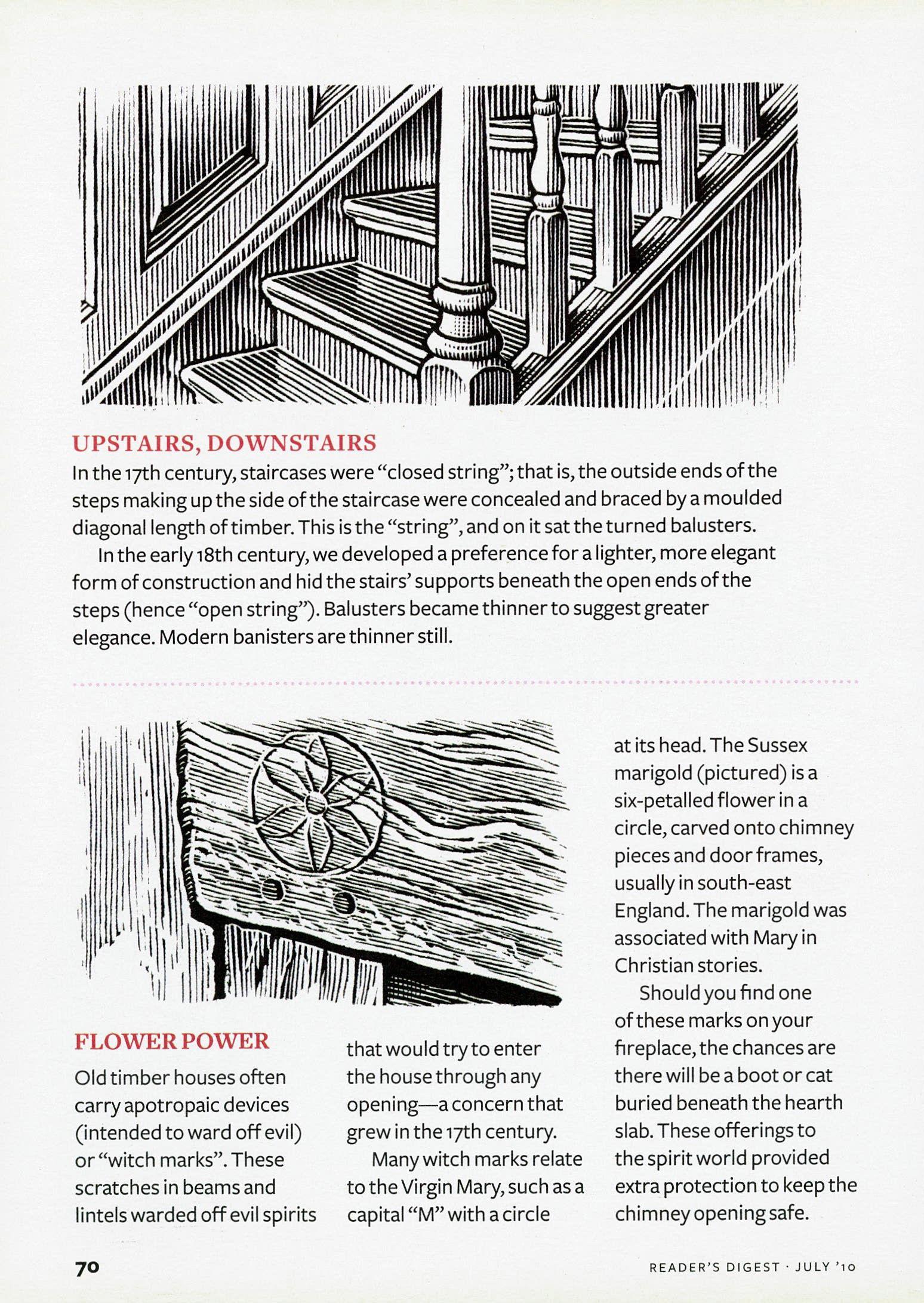
FLOWER POWER
Old timber houses often carry apotropaic devices (intended to ward off evil) or "witch marks". These scratches in beams and lintels warded off evil spirits
that would try to enter the house through any opening—a concern that grew in the 17th century. Many witch marks relate to the Virgin Mary, such as a capital "M" with a circle
at its head. The Sussex marigold (pictured) is a six-petalled flower in a circle, carved onto chimney pieces and door frames, usually in south-east England. The marigold was associated with Mary in Christian stories.
Shouldyou find one of these marks on your fireplace, the chances are there will be a boot or cat buried beneath the hearth slab. These offerings to the spirit world provided extra protection to keep the chimney opening safe.
70 READER'S DIGEST • JULY '10
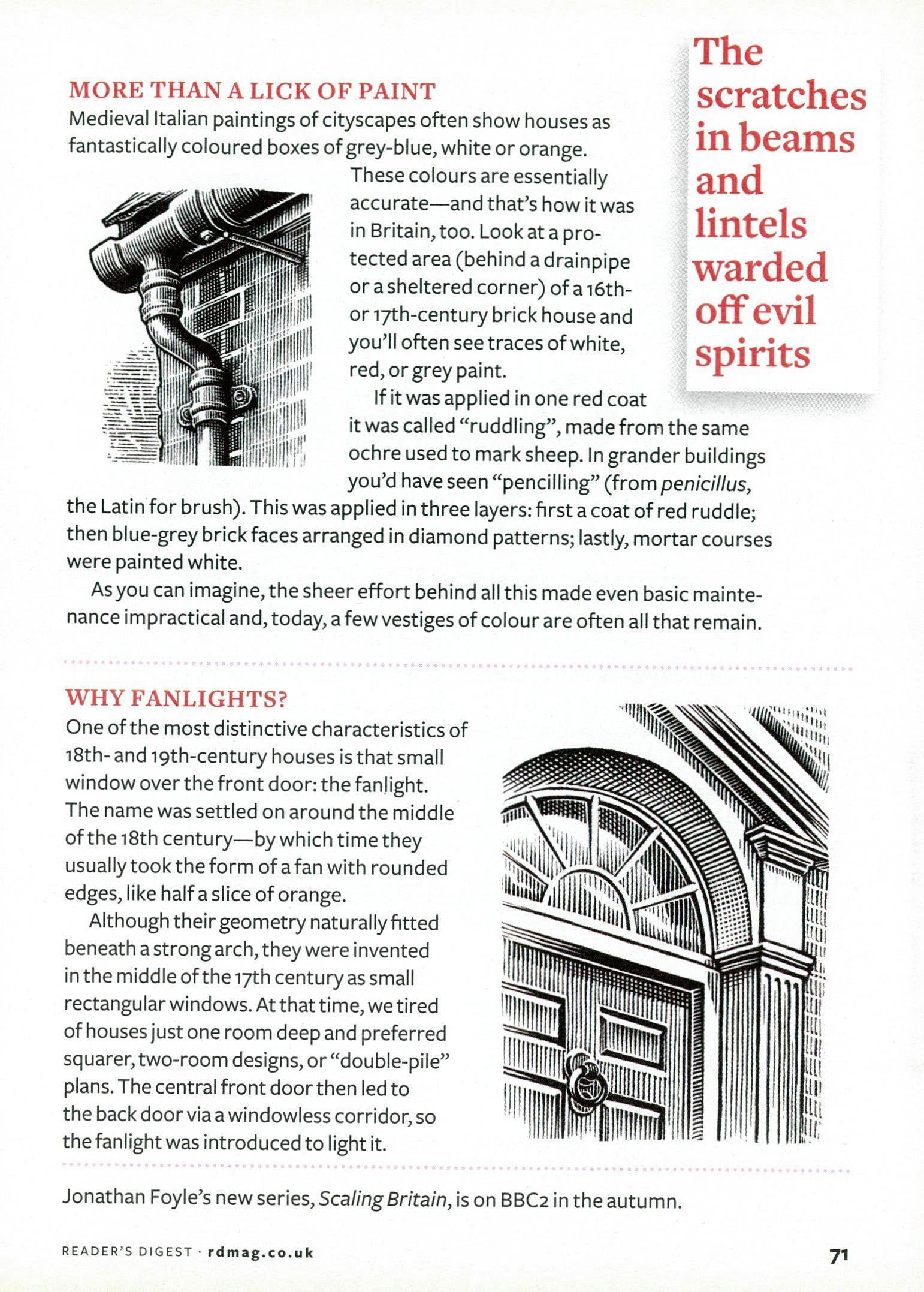
MORE THAN A LICK OF PAINT
Medieval Italian paintings of cityscapes often show houses as fantastically coloured boxes of grey-blue, white or orange. These colours are essentially accurate—and that's how it was in Britain, too. Look at a protected area (behind a drainpipe or a sheltered corner) of a-16thor 17th-century brick house and you'll often see traces of white, red, or grey paint.
The scratches in beams and lintels warded off evil spirits
If it was applied in one red coat it was called "ruddling", made from the same ochre used to mark sheep. In grander buildings you'd have seen "pencilling" (from penicillus, the Latin for brush). This was applied in three layers: first a coat of red ruddle; then blue-grey brick faces arranged in diamond patterns; lastly, mortar courses were painted white.
Asyou can imagine, the sheer effort behind all this made even basic maintenance impractical and, today, a few vestiges of colour are often all that remain.
WHY FANLIGHTS?
One of the most distinctive characteristics of 18th- and 19th-century houses is that small window over the front door: the fanlight. The name was settled on around the middle of the i8th century—by which time they usually took the form of a fan with rounded edges, like half a slice of orange.
Although their geometry naturally fitted beneath a strong arch, they were invented in the middle of the 17th century as small rectangular windows. At that time, we tired of houses just one room deep and preferred squarer, two-room designs, or "double-pile" plans. The central front door then led to the back door via a windowless corridor, so the fanlight was introduced to light it.
Jonathan Foyle's new series,Scaling Britain, is on BBC2 in the autumn.
READER'S DIGEST rdmag.co.uk 71
WHY CAN'T YOU GET THE TREATMENT YOU NEED?
There's a really effective, cutting-edge treatment foryour condition. It's just thatyou might not know about it. And neither might your doctor. Why?
Diabetes ruled the Double family's life. Both Joseph,13, and ll-year-old Thomas have the life-threatening condition and, until recently, their days were an endless treadmill of injections, pinprick blood tests and calculating carbohydrates and insulin. Their mother Jacqui had to watch what the boys ate and when, in a vain bid to avoid the hypoglycemic attacks that assailed them two or three times a day when their blood-glucose levels fluctuated wildly.
Thomas had been known to lie rigid on the floor screaming with his eyes rolling, at risk of brain damage. The family, from Whitstable in Kent, had given up many of their favourite activities, including swimming lessons.
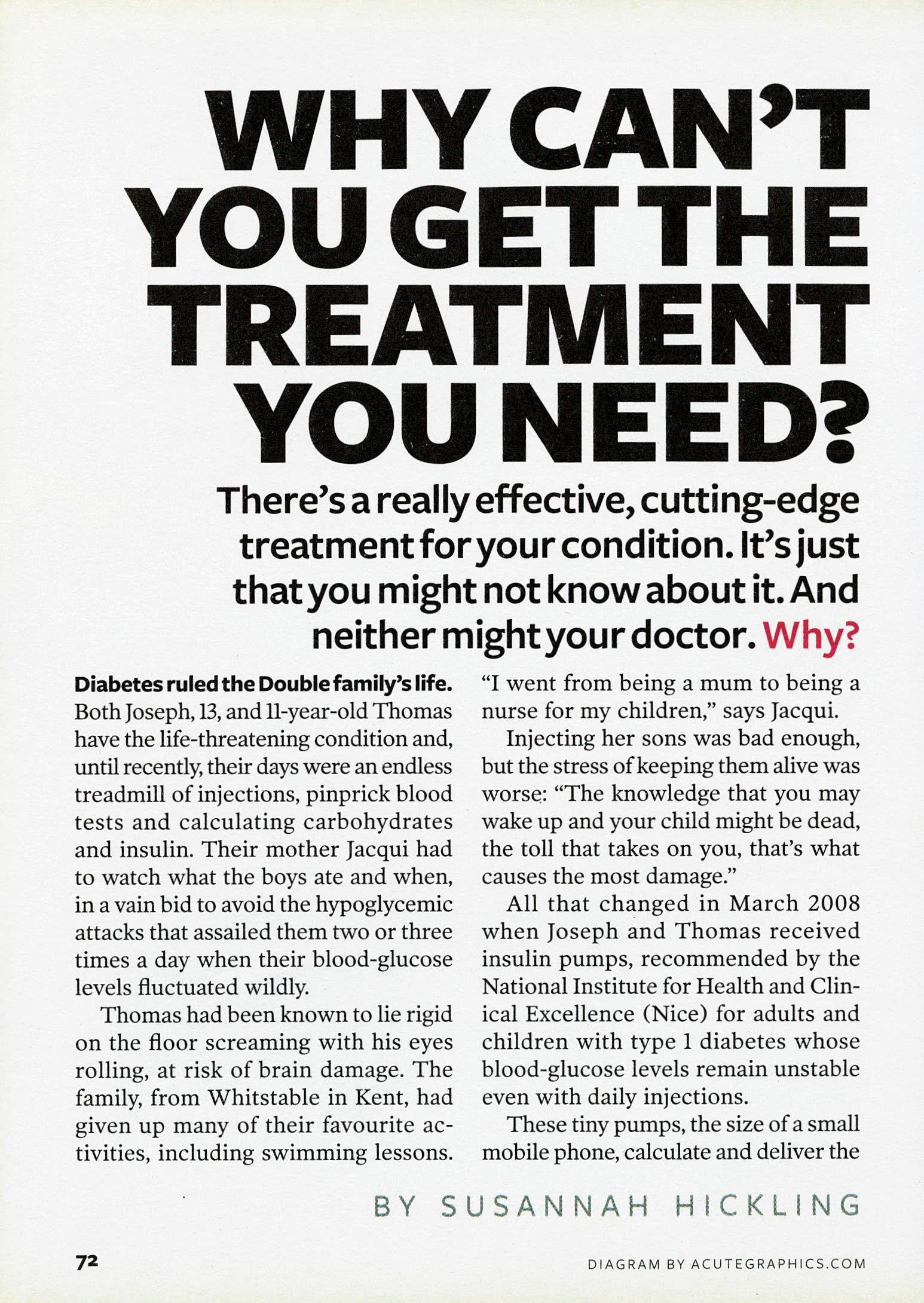
"I went from being a mum to being a nurse for my children," says Jacqui. Injecting her sons was bad enough, but the stress of keeping them alive was worse: "The knowledge that you may wake up and your child might be dead, the toll that takes on you, that's what causes the most damage."
All that changed in March 2008 when Joseph and Thomas received insulin pumps, recommended by the National Institute for Health and Clinical Excellence (Nice) for adults and children with type 1 diabetes whose blood-glucose levels remain unstable even with daily injections.
These tiny pumps, the size of a small mobile phone, calculate and deliver the
BY SUSANNAH HICKLING
72 DIAGRAM BY ACUTEGRAPHICS.COM
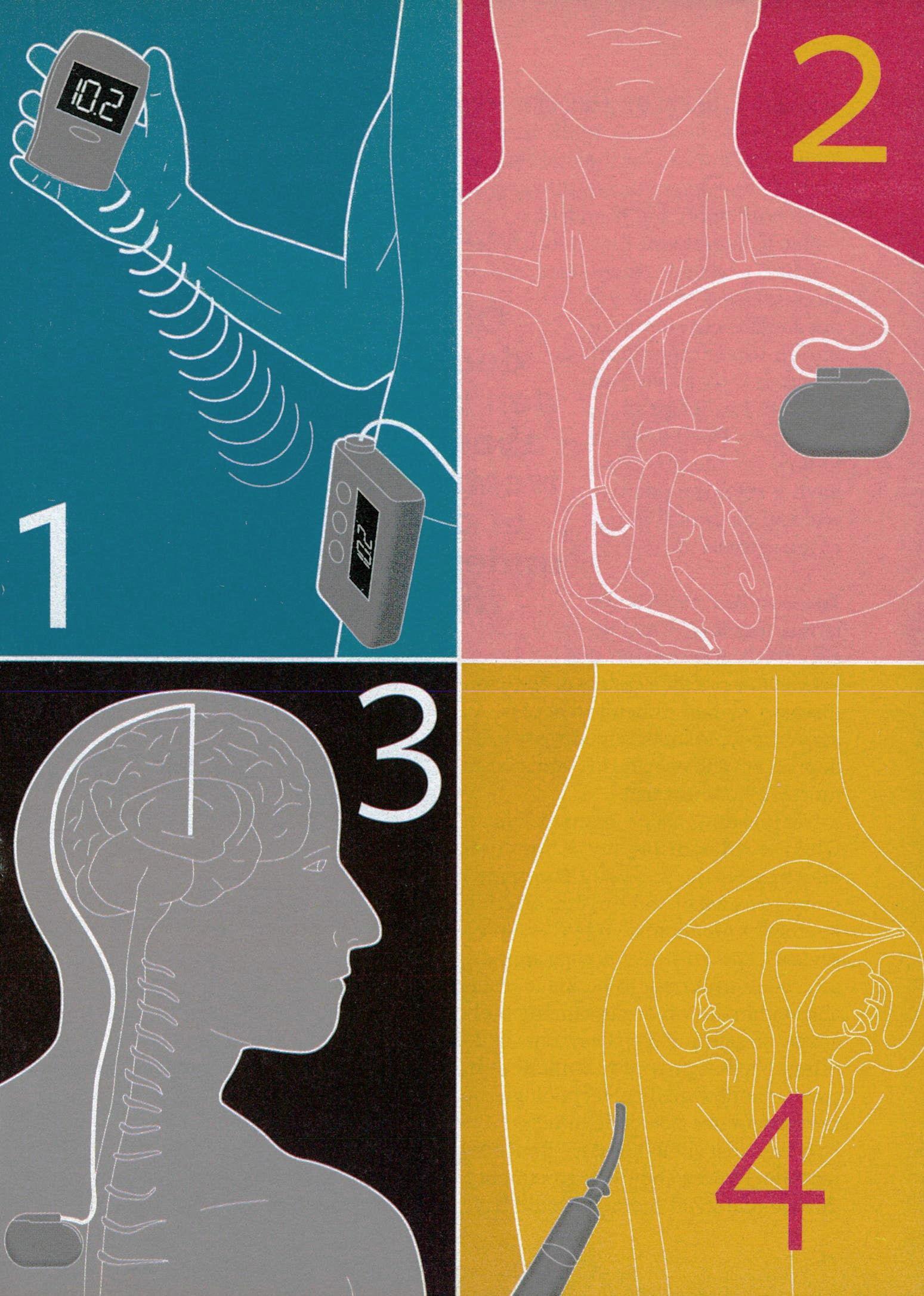
amount of insulin the patient needs. The boys' blood-glucose levels are now under control, and for the first time in years they are happy and healthy, enjoying school, sport and friendships.
But, incredibly, the boys' local diabetes clinic never even mentioned insulin pumps; Jacqui only found out about them after joining an internet support group. It took a two-year struggle for her primary care trust (PCT) to agree to fund the therapy. Now, having seen the positive effect, their clinic offers a pump service.
The Doubles' experience is not unusual. Cuttingedge medical treatments that have been proven to work for a variety of common diseases remain difficult to access. As a result, people suffer unnecessary pain, depression and even death, and it costs more in the long term.
to change the way their clinics are organised to provide them. Sometimes doctors don't want to take on a PCT that doesn't routinely fund the treatment. And sometimes patients who could benefit are misdiagnosed.
Oft en, doc tors don't know abou t the treat ments or d on't under stand them
"It's frustrating," says Nice chief executive Sir Andrew Dillon, "because we know that using whatever we are recommending in the circumstances that we have recommended it produces better outcomes. It could be life-extending, but more often it simply improves quality of life." At the same time, even when implementing guidance is mandatory, the final decision rests with the consultant.
Here are some treatments often subject to rationing:
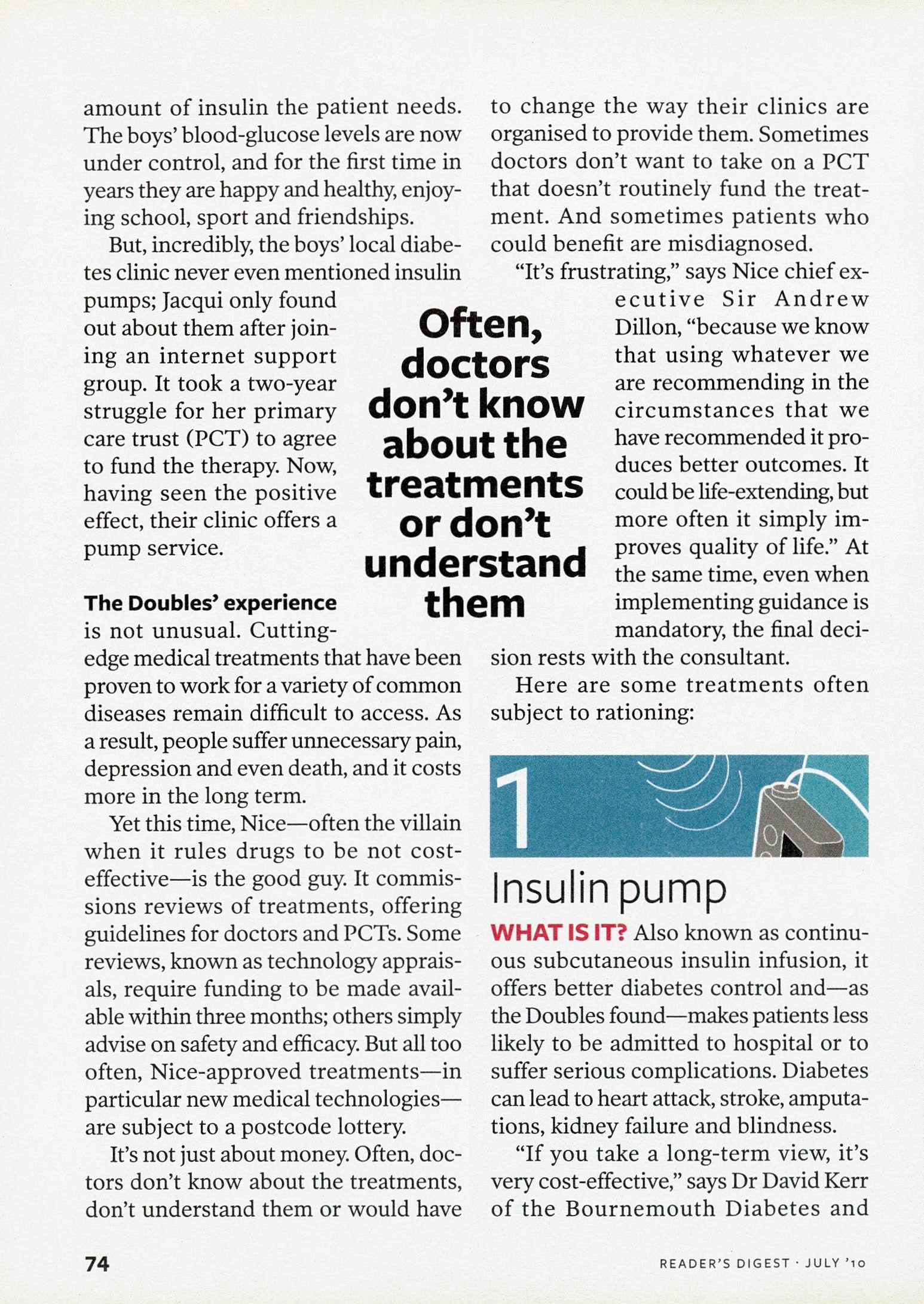
Yet this time, Nice—often the villain when it rules drugs to be not costeffective—is the good guy. It commissions reviews of treatments, offering guidelines for doctors and PCTs. Some reviews, known as technology appraisals, require funding to be made available within three months; others simply advise on safety and efficacy. But all too often, Nice-approved treatments—in particular new medical technologies— are subject to a postcode lottery.
It's not just about money. Often, doctors don't know about the treatments, don't understand them or would have
Insulin pump
WHAT IS IT?Also known as continuous subcutaneous insulin infusion, it offers better diabetes control and—as the Doubles found—makes patients less likely to be admitted to hospital or to suffer serious complications. Diabetes can lead to heart attack, stroke, amputations, kidney failure and blindness.
"If you take a long-term view, it's very cost-effective," says Dr David Kerr of the Bournemouth Diabetes and
74 READER'S DIGEST' JULY '1c,
Endocrine Centre. Yet according to the pressure group Input, which aims to improve access to pumps, only about four per cent of people with type 1 diabetes in the UK use one. Compare that with most other EU countries, where around 20 per cent benefit.
WHAT'S THE PROBLEM? It's the doctors, Dr Kerr argues. He blames "a lack of willingness and training". There aren't enough diabetes nurses and dieticians either, so many centres can't offer the follow-up service required. And some doctors are put off by bad experiences 30 years ago, not realising the technology has moved on.
While it's mandatory that PCTs fund pumps for patients who meet the criteria in the Nice guidance, a lot of consultants don't want to get involved in funding applications to cash-strapped PCTs. The situation is particularly bad in Scotland.
WHAT CAN YOU DO? For more on pump clinics and pump therapy, see input.me.uk or call 0800 228 9977.
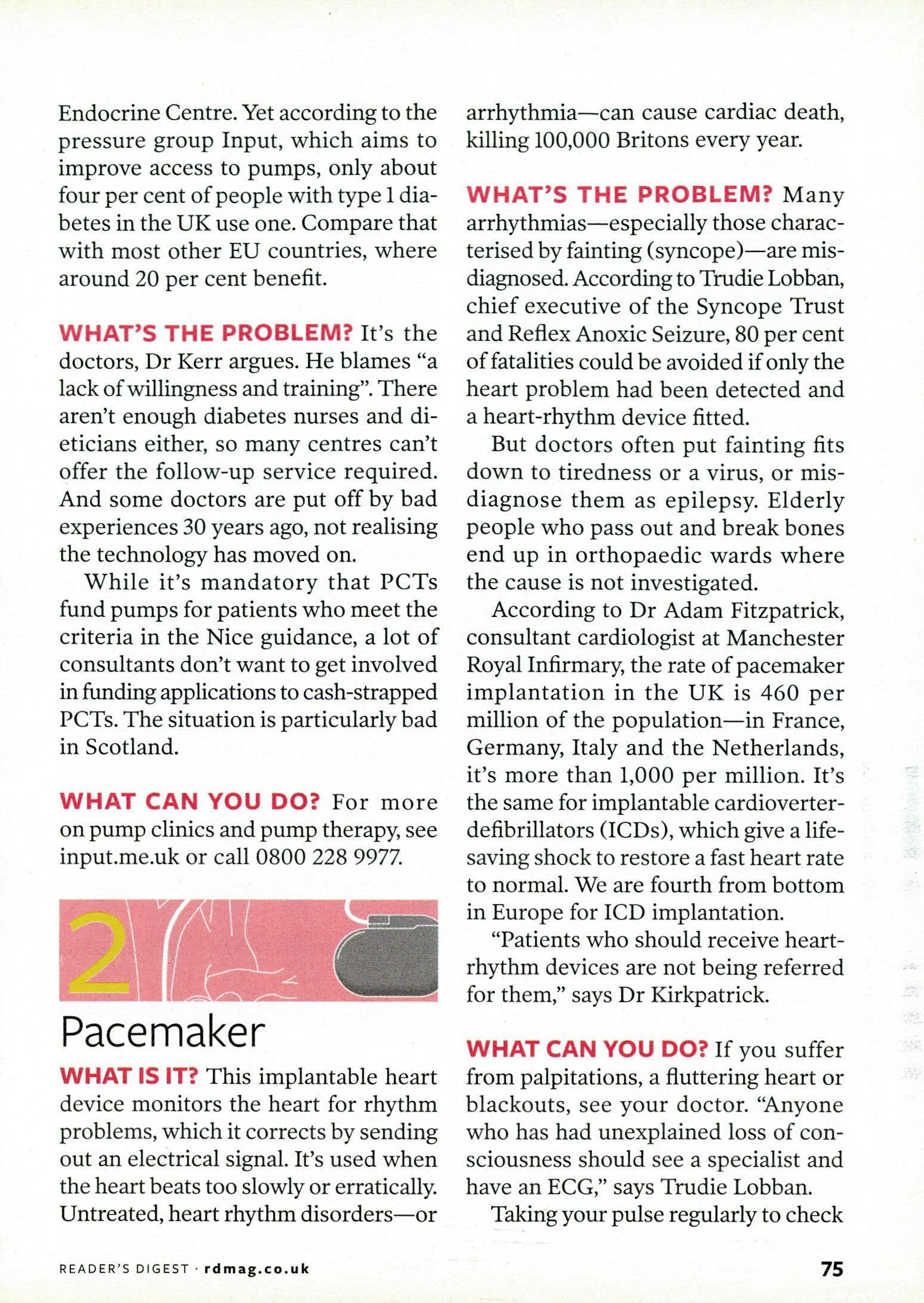
Pacemaker
WHAT IS IT? This implantable heart device monitors the heart for rhythm problems, which it corrects by sending out an electrical signal. It's used when the heart beats too slowly or erratically. Untreated, heart rhythm disorders—or
arrhythmia—can cause cardiac death, killing 100,000 Britons every year.
WHAT'S THE PROBLEM? Many arrhythmias—especially those characterised by fainting (syncope)—are misdiagnosed. According to Trudie Lobban, chief executive of the Syncope Trust and Reflex Anoxic Seizure, 80 per cent of fatalities could be avoided if only the heart problem had been detected and a heart-rhythm device fitted.
But doctors often put fainting fits down to tiredness or a virus, or misdiagnose them as epilepsy. Elderly people who pass out and break bones end up in orthopaedic wards where the cause is not investigated.
According to Dr Adam Fitzpatrick, consultant cardiologist at Manchester Royal Infirmary, the rate of pacemaker implantation in the UK is 460 per million of the population—in France, Germany, Italy and the Netherlands, it's more than 1,000 per million. It's the same for implantable cardioverterdefibrillators (ICDs), which give a lifesaving shock to restore a fast heart rate to normal. We are fourth from bottom in Europe for ICD implantation.
"Patients who should receive heartrhythm devices are not being referred for them," says Dr Kirkpatrick.
WHAT CAN YOU DO? If you suffer from palpitations, a fluttering heart or blackouts, see your doctor. "Anyone who has had unexplained loss of consciousness should see a specialist and have an ECG," says Trudie Lobban.
Taking your pulse regularly to check
READER'S DIGEST • rdmag.co.uk 75
that it's not less than 60 and not more than100 beats a minute on average could also alert you to arrhythmia. For more, go to heartrhythmcharity.org.uk.
Deep-brain stimulation
WHAT IS IT?DBS is a type of surgery that has a good record in patients who no longer respond to drugs prescribed to stop the tremors, rigidity and other motor problems caused by Parkinson's and other neurological movement disorders. It's also shown promising results for epilepsy and depression. An electrical device is implanted in the brain to deliver minute stimulation to the areas that control symptoms.
It's a therapy rather than a cure, but, according to Dr Shazia Javed, neurosurgery research fellow at Frenchay Hospital in Bristol, motor symptoms suffered by people with Parkinson's can improve by as much as 80 per cent. For "primary" dystonia—where patients experience involuntary muscle spasms because of a genetic defect—the success rate can be 90 per cent.
WHAT'S THE PROBLEM?"Referring specialists are not aware of the degree to which lives can be improved," says Dr Javed. "In addition, delaying the referral means that often the disease has progressed to a degree where they
are no longer suitable for treatment." Nice concluded there was adequate evidence on the safety and efficacy of DBS to justify its use for Parkinson's, essential tremor and dystonia. But it's only suitable for between two and four per cent of people with Parkinson's, as it requires patients to be drug resistant— but not too resistant—have a reasonable degree of mobility and no dementia.
It's also expensive—£30,000—so many PCTs won't stump up the money. Bristol is a case in point. Ireland sends all patients requiring DBS to Frenchay, but disabled people living just down the road can't access it.
But Dr Javed argues that it provides an extra five to ten years' good quality of life. "We often have disabled patients who require carers, costing a lot more than the surgery," she says. "Also, a lot of these people's carers are spouses or kids. You're taking away huge sections of society to look after them."
WHAT CAN YOU DO?Find out more about DBS at parkinsons.org.uk. The Dystonia Society (dystonia.org.uk) has a list of centres that offer it.
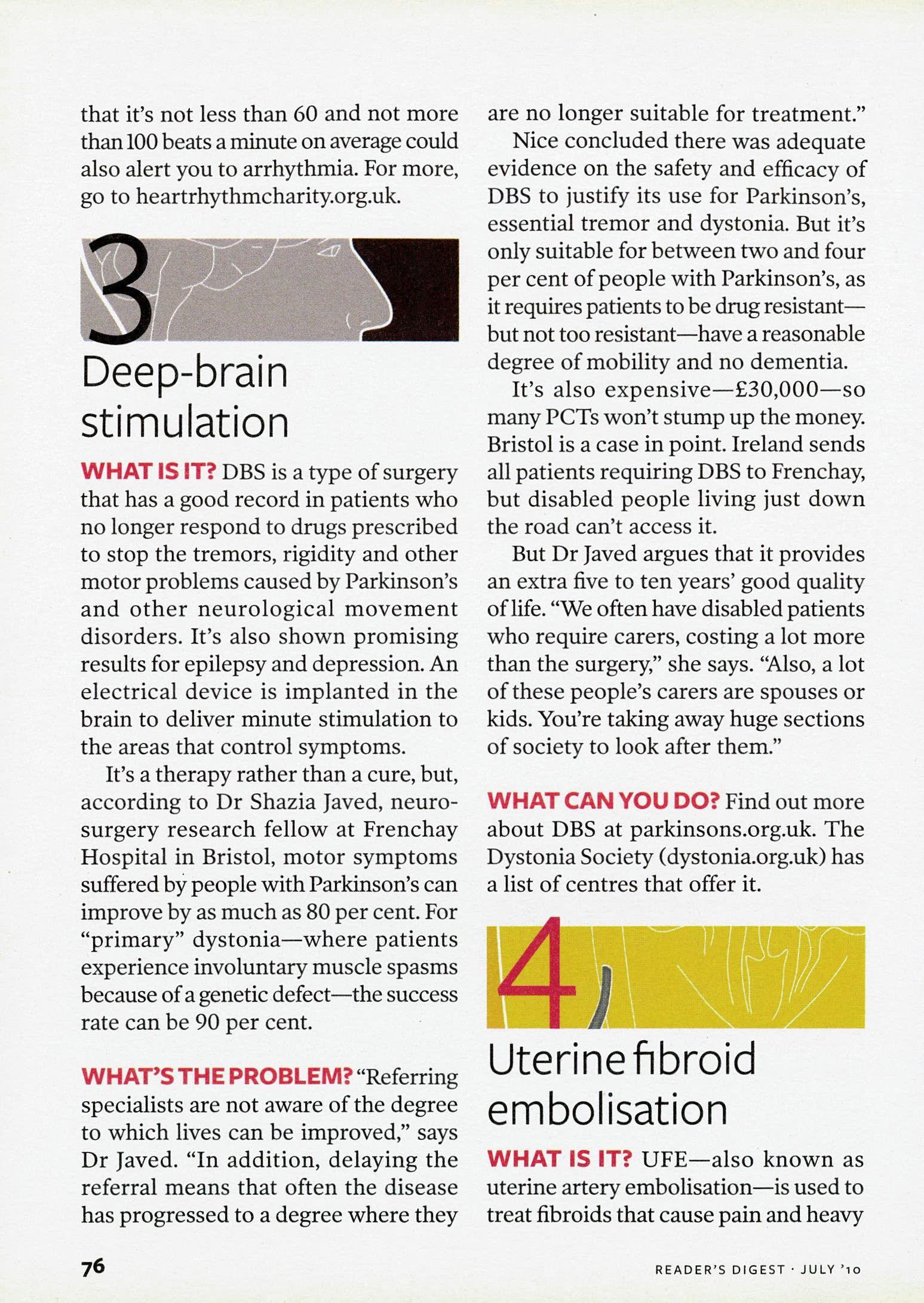
Uterine fibroid embolisation
WHAT IS IT? UFE—also known as uterine artery embolisation—is used to treat fibroids that cause pain and heavy
3
■ 76 READER'S DIGEST • JULY '10
menstrual bleeding. Tiny particles of polyvinyl alcohol or gelatin are injected into the uterine arteries to block off the blood supply, causing the benign tumours to shrink and die. The recovery time is much faster than for the favoured treatment, hysterectomy. What's more, there's no loss of fertility and usually no early menopause. Some women have successfully gone on to have children. Dr Nigel Cowan, an Oxford-based interventional radiologist, credits it with a success rate of 85 to 90 per cent.
WHAT'S THE PROBLEM?
Nice guidelines state that where surgery is necessary, UFE, hysterectomy and myomectomy—another procedure to remove fibroids—"must all be considered, discussed and documented". But Ginette Camps-Walsh, the founder of not-for-profit Fibroid Embolisation: Information, Support and Advice (FEmISA), says she receives emails from women weekly saying they have only been offered hysterectomy.
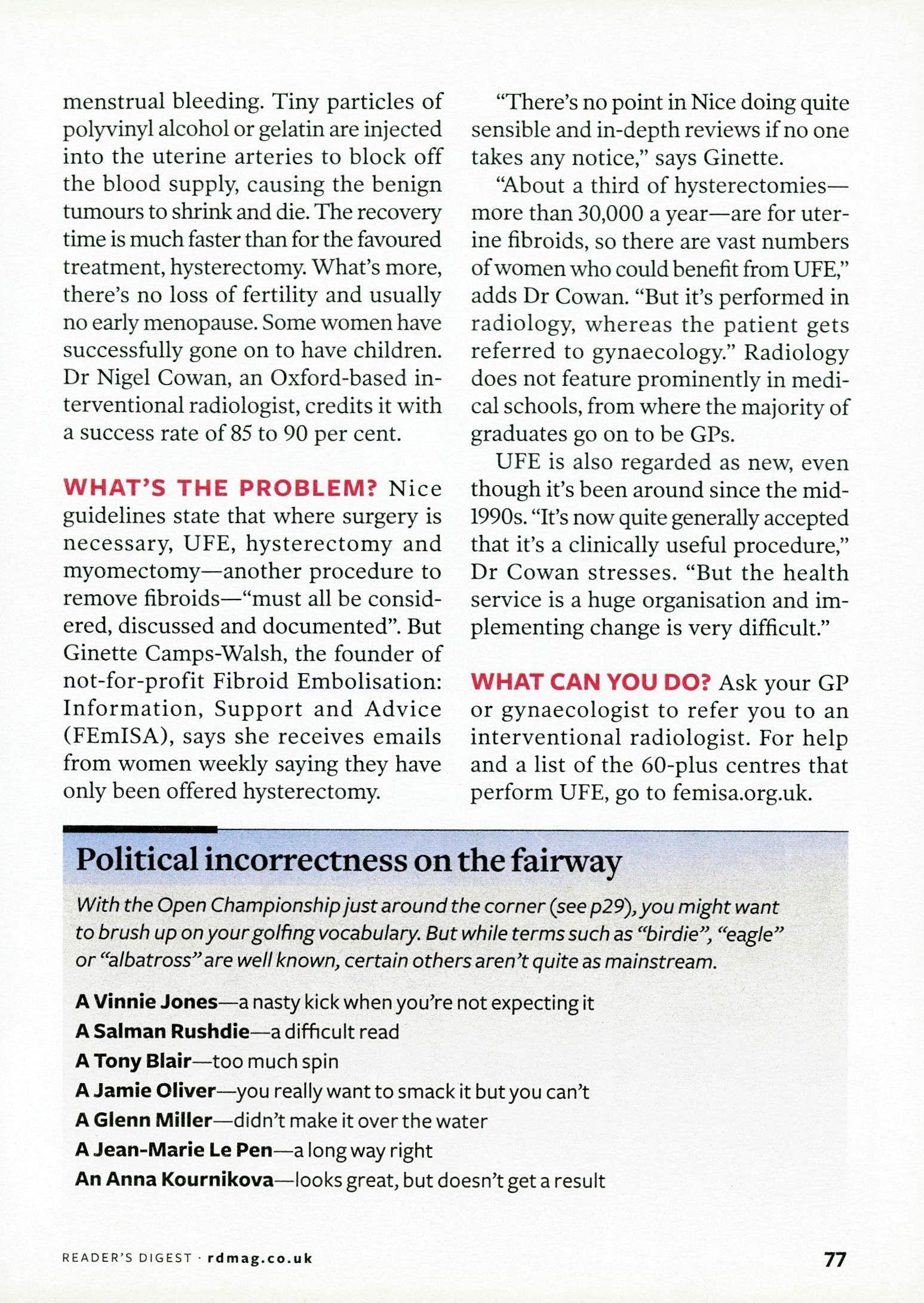
"There's no point in Nice doing quite sensible and in-depth reviews if no one takes any notice," says Ginette.
"About a third of hysterectomies— more than 30,000 a year—are for uterine fibroids, so there are vast numbers of women who could benefit from UFE," adds Dr Cowan. "But it's performed in radiology, whereas the patient gets referred to gynaecology." Radiology does not feature prominently in medical schools, from where the majority of graduates go on to be GPs.
UFE is also regarded as new, even though it's been around since the mid1990s. "It's now quite generally accepted that it's a clinically useful procedure," Dr Cowan stresses. "But the health service is a huge organisation and implementing change is very difficult."
WHAT CAN YOU DO? Ask your GP or gynaecologist to refer you to an interventional radiologist. For help and a list of the 60-plus centres that perform UFE, go to femisa.org.uk.
Political incorrectness on the fairway
With the Open Championship just around the corner (see p29),you might want to brush up on your golfingvocabulary. But while terms such as "birdie", "eagle" or "albatross"are well known, certain others aren't quite as mainstream.
A Vinnie Jones—anastykick when you're not expecting it
A Salman Rushdie—adifficult read
A Tony Blair—toomuch spin
A Jamie Oliver—youreally want to smack it but you can't
A Glenn Miller—didn'tmake it over the water
A Jean-Marie Le Pen—along way right
An Anna Kournikova—looksgreat, but doesn't get a result
READER'S DIGEST rdrnag.co.uk 77
An arncyy.alni barracks *1 four stuck, died. No forrfig investigatiorCZ A government " cover-up. Now, fifteen years later, Brian Cathcart asks:
REALLY HAPPENED
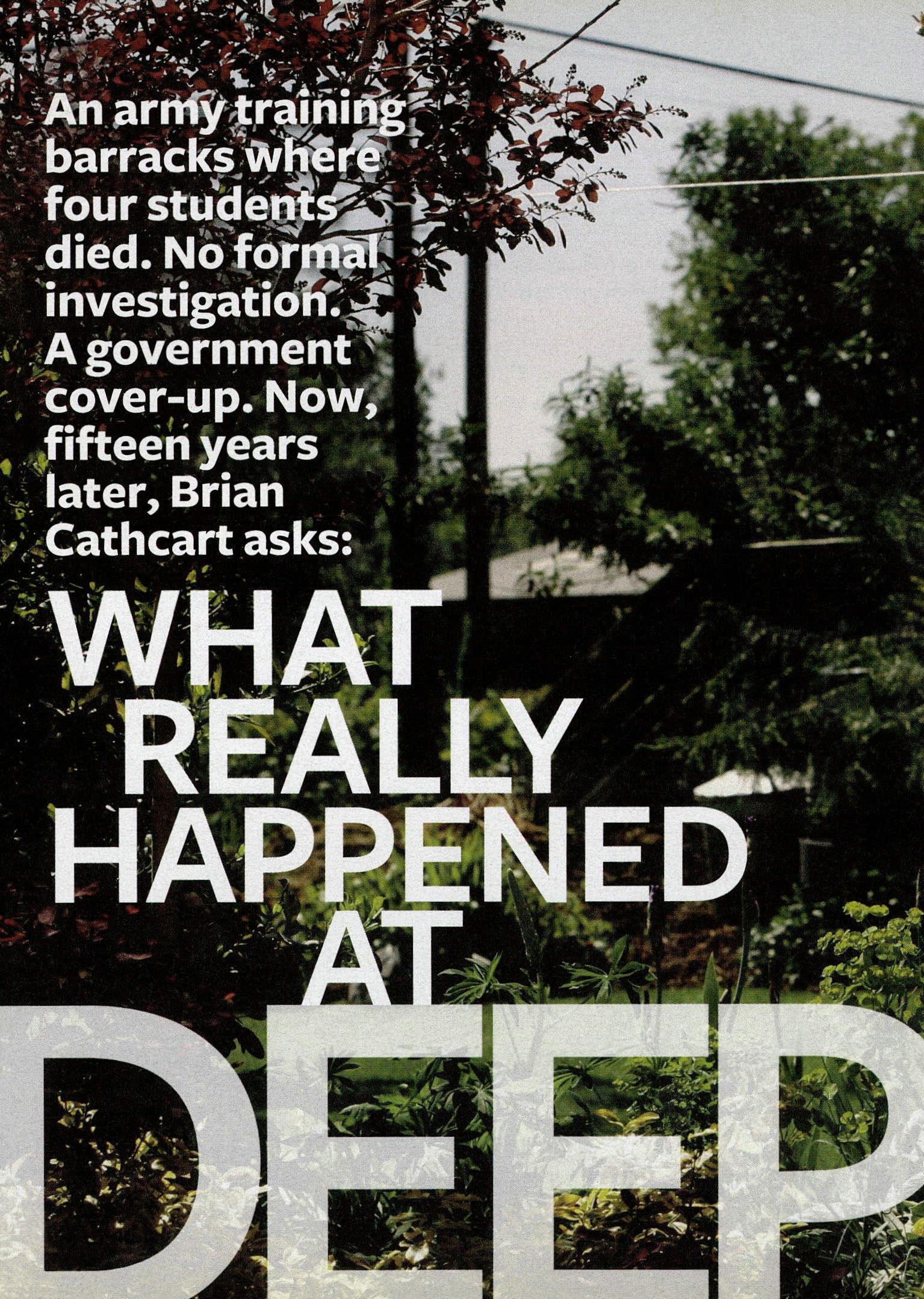
.9'11
•
ro • *oo, ,v $4 0 — • • o! ome • 11)01*
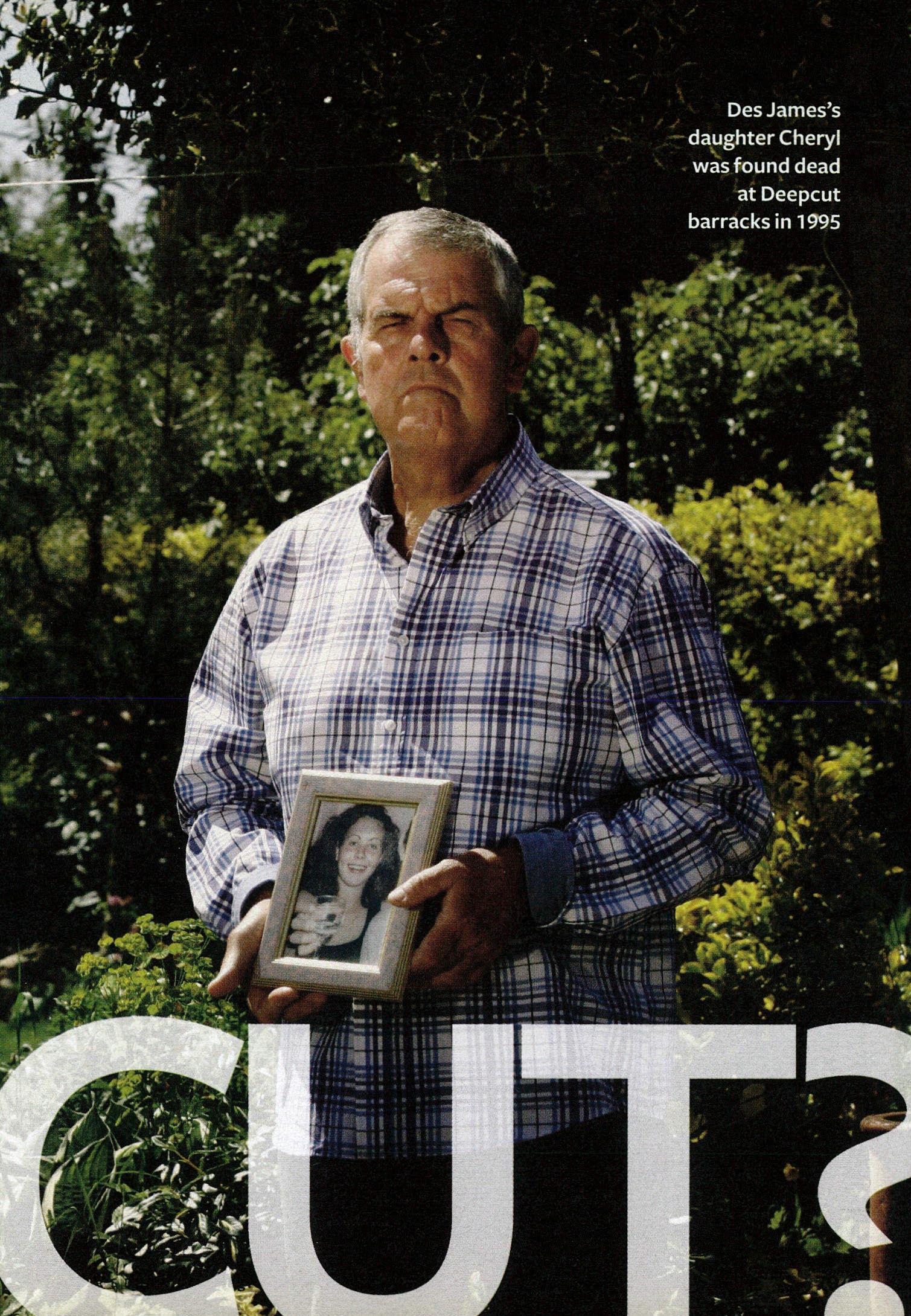
Des James's daughter Cheryl was found dead at Deepcut barracks in 1995

Afew years ago an educational establishment in the Home Counties got out of control. The students—of both sexes, in their late teens—tended to be academically very weak. Most were away from home for the first time, so were vulnerable.
There weren't enough teachers, so students were often idle and bored. Of the staff they had, a number were grossly unsuitable. Some were bullies and some exploited their positions for sexual advantage—for a spell, two convicted sex offenders worked in the gym.
Though many students were under 18, alcohol was a problem; one regular visitor said the place was like Glasgow on a Saturday night—every night. Sex between students was banned, but it was rife. Once, when the grounds were raked, 800 used condoms were found.
Predictably, some students were desperately unhappy, yet procedures to support them were sketchy at best. Some withdrew, some failed and quite a few resorted to self-harm.
And there was worse. All students in this unruly establishment were required to work long, dull night shifts, and on these occasions they were normally issued with loaded firearms.
Between 1995 and 2002, four students died of gunshot wounds.
You have probably heard about the scandal at Deepcut,the Royal Logistic Corps training establishment in Surrey,
although maybe not in those terms. If the name has come your way recently, it was probably the Ministry of Defence insisting that the whole thing has been investigated and the matter is closed.
This is not true. What went wrong at Deepcut has never been properly investigated, and a whole new chapter is about to begin.
In a small, tidy office in a bungalow near Oswestry, by the border between England and Wales, a 61-year-old man with a bulldog demeanour and a character to match sits reading papers and writing emails.
Des James used to be human resources director at Tetrapak. A few months ago he retired and, with characteristic determination, promptly shed several extra stone in weight that he had been carrying around for years.
He is fit, ready and, 15 years after his beloved daughter Cheryl was found shot in the head at Deepcut, he is impatient for the new chapter to begin.
"I don't care if it's been 15 years or 50 years. I'm not doing this for my own good," he says. "I don't want to be doing it at all, but a fundamental principle is at stake. If four kids can be shot and killed in an army training establishment and there is no proper inquiry, what does that say about justice and honesty in this country?"
As he warms to the subject he jabs his finger downward, marking familiar bullet points. He wants to know how his daughter and three other young recruits died. He wants to know how an
8o PREVIOUS SPREAD PHOTOGRAPHED BY GARY CALTON
the world For less...
Travelsphere is the UK's no.1 for guided holidays and offers a choice of over 700 holidays to over 80 countries. With over 30 year's experience we know what makes the perfect holiday and our Tour Guides will show you the highlights of your chosen destination.

Our prices include all this:
✓ Services of a Travelsphere Tour Guide and/or local guide
✓ Return flights, rail or coach travel
✓ Comfortable, well located hotels
✓ Comprehensive and well planned itineraries
r— m 0 HD flOHOE IH VH 13)11: 1VW
Request your brochures today. Call our Holiday Advisors FREE on: 0800 567 7368 Or visit: travelsphere.co.uk

Worldwide Guided Tours
Croatia Departs Sep - Oct 2010 8 DAYS FROM £299
Paris Weekend ~i• Departs Sep 2010 4 DAYS FROM £139 Plus many more 2010 & 2011 holidays Request your brochures today. Call our friendly Holiday Advisors FREE on: DABTA ABTA No.V5874 Plus No Surcharges Guaranteed* PRICE MATCH Fly from local airports Local coach pick-ups We promise we won't be beaten on price! 0800 567 7368 Or visit:travelsphere.co.uk Mon-Fri 9am-8pm; Sat 9am-4pm; Sun 10am-3pm (Please note that calls may be recorded to ensure high levels of customer service). Part of the Page & Moy Travel Group *If you find the same holiday offered by one of our competitors cheaper within seven days of confirming your booking with us, we'll refund the difference. We promise not to add any surcharges to your holiday once it has been confirmed. GUIDED
from £139
return the coupon: Title Surname Address Postcode Telephone
you would like to receive future details of holiday offers from Travelsphere by email please
Travelsphere Limited, which is part of the Page & Moy Travel Group, would like to use the details provided to contact you with information about our products and services we believe will be of interest to you. If you would prefer not to receive this information please tick here ❑ China Departs Sep 2010 - Dec 2011 8 DAYS FROM £899 America's Golden West Departs Jul 2010 - Oct 2011 12 DAYS FROM £899 Initial Lake Garda 4— Departs Sep 2010 - Oct 2011 8 DAYS FROM £499 Tick brochure required:
3) ❑ 2010/11 Holiday Collection
❑ Europe by Coach
❑ Europe by Air J 2/10) ❑ Worldwide
❑ America & Canada
❑ Cruise & Discover
❑ Christmas & New Year
TOURS
Or simply complete your details below and
If
enter your email address:
(max
1SHC/11)
H3/10)
H2/10)
(U2/10)
(02/10)
(XM/10)
SOME STUDENTS WITHDREW
SOMEFAILED AND QUITE ANEW RESORTED TO SELF-HARM
establishment controlled by the Government "went so terribly, terribly wrong". And he wants to know who was responsible, and see them called to account.
If you were the parent of a teenager who died in such circumstances, you would expect nothing less. But from the day the scandal erupted in 2002, Des James, his wife Doreen, and the families of the three other recruits have found the path to truth littered with deliberately placed official obstacles.
It is a hallmark of the case that the basic fact from which it all springs— that four recruits died of gunshot
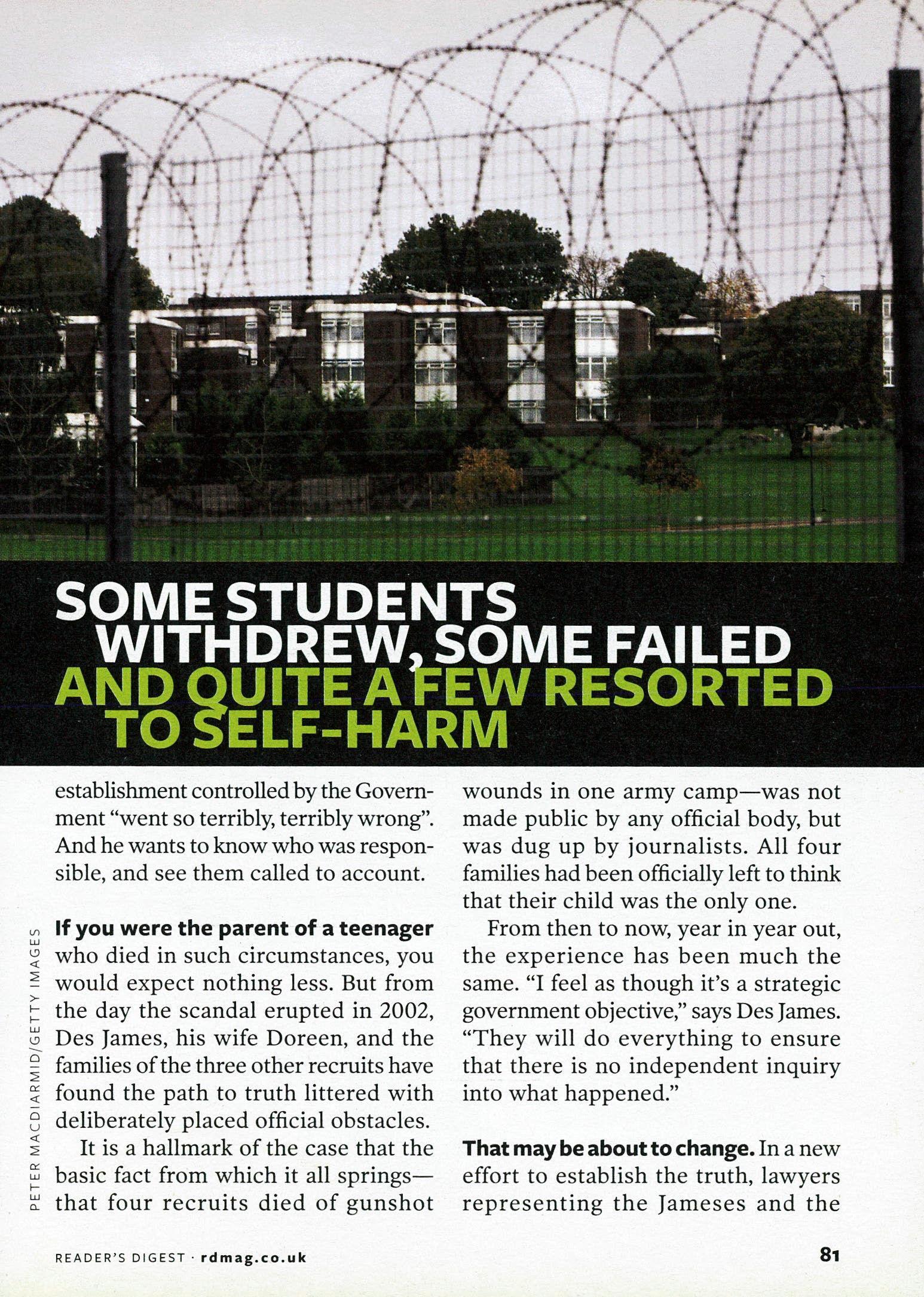
wounds in one army camp—was not made public by any official body, but was dug up by journalists. All four families had been officially left to think that their child was the only one.
From then to now, year in year out, the experience has been much the same. "I feel as though it's a strategic government objective," says Des James. "They will do everything to ensure that there is no independent inquiry into what happened."
That may be about to change.In a new effort to establish the truth, lawyers representing the Jameses and the
PE TER MAC DIARMID/ GETT Y IMAGES
READER'S DIGEST rdmag.co.uk
81
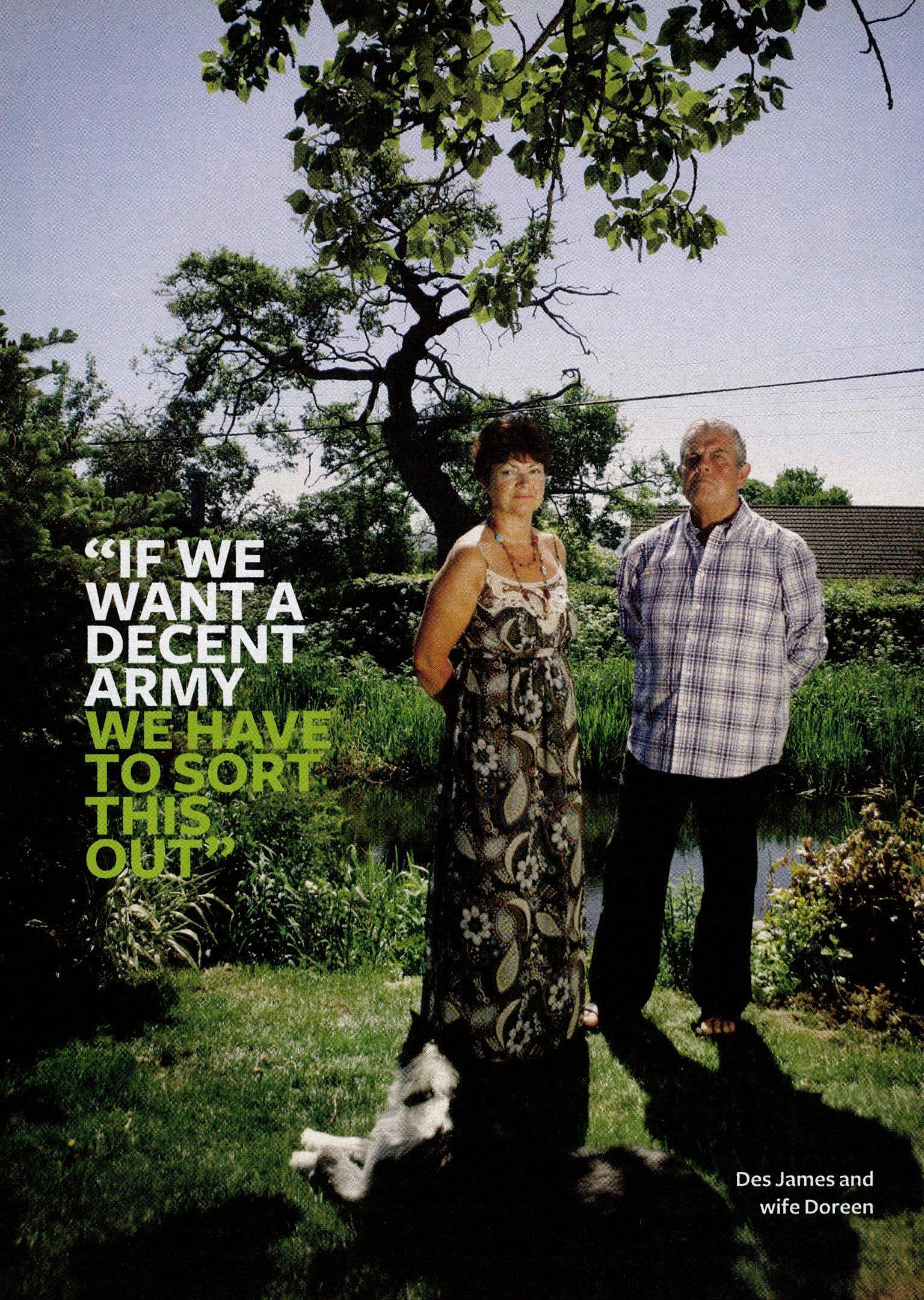
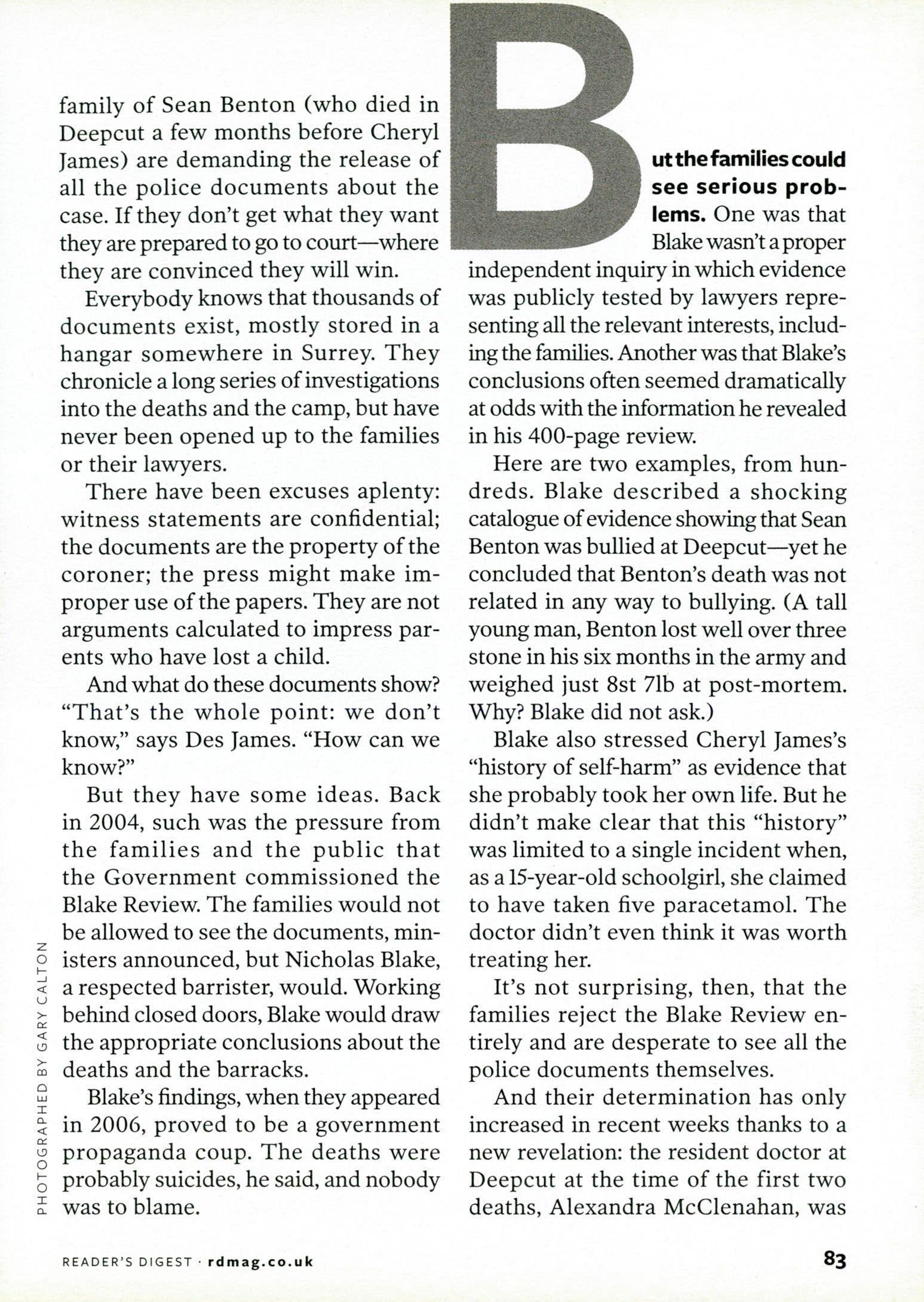
family of Sean Benton (who died in Deepcut a few months before Cheryl James) are demanding the release of all the police documents about the case. If they don't get what they want they are prepared to go to court—where they are convinced they will win.
Everybody knows that thousands of documents exist, mostly stored in a hangar somewhere in Surrey. They chronicle a long series of investigations into the deaths and the camp, but have never been opened up to the families or their lawyers.
There have been excuses aplenty: witness statements are confidential; the documents are the property of the coroner; the press might make improper use of the papers. They are not arguments calculated to impress parents who have lost a child.
And what do these documents show? "That's the whole point: we don't know," says Des James. "How can we know?"
But they have some ideas. Back in 2004, such was the pressure from the families and the public that the Government commissioned the Blake Review. The families would not be allowed to see the documents, ministers announced, but Nicholas Blake, a respected barrister, would. Working behind closed doors, Blake would draw the appropriate conclusions about the deaths and the barracks.
Blake's findings, when they appeared in 2006, proved to be a government propaganda coup. The deaths were probably suicides, he said, and nobody was to blame.
ut the families could see serious problems. One was that Blake wasn't a proper independent inquiry in which evidence was publicly tested by lawyers representing all the relevant interests, including the families. Another was that Blake's conclusions often seemed dramatically at odds with the information he revealed in his 400-page review.
Here are two examples, from hundreds. Blake described a shocking catalogue of evidence showing that Sean Benton was bullied at Deepcut—yet he concluded that Benton's death was not related in any way to bullying. (A tall young man, Benton lost well over three stone in his six months in the army and weighed just 8st 71b at post-mortem. Why? Blake did not ask.)
Blake also stressed Cheryl James's "history of self-harm" as evidence that she probably took her own life. But he didn't make clear that this "history" was limited to a single incident when, as a 15-year-old schoolgirl, she claimed to have taken five paracetamol. The doctor didn't even think it was worth treating her.
It's not surprising, then, that the families reject the Blake Review entirely and are desperate to see all the police documents themselves.
And their determination has only increased in recent weeks thanks to a new revelation: the resident doctor at Deepcut at the time of the first two deaths, Alexandra McClenahan, was
PHOTOGRAPHED BY GARY C AL TON
READER'S DIGEST rdmag.co.uk
83
highly critical of the way the barracks was run and called it "a volcano waiting to erupt".
Her evidence, it seems, had been hidden in the police files since 2002, and had never been made public. Even more alarmingly for Des and Doreen James, Dr McClenahan is also reported to have visited the scene of their daughter's death and expressed a suspicion that there was something wrong with the way the body and the gun were lying. No hint of this was made public.
The demand for documents is a start, but the drive to reopen the Deepcut case does not stop there. Plans are also in hand to reopen the inquests into three of the four deaths, on the legal grounds of "insufficiency of inquiry".
These inquests were hurried, and none took account of the fact that there were other, very similar deaths. Nor did the families have legal representation to safeguard their interests.
Des James recalls driving from the Welsh borders with Doreen through a blizzard and arriving to find that proceedings had begun without them. It was just three weeks since Cheryl's death and three days before Christmas, he says, and they were both "out of it".
"We had no advice," he says. "We just did what we were told. We could have had the whole thing adjourned, but nobody told us."
So passed the best opportunity they have had to probe the circumstances of their daughter's death. The Bentons and Grays tell similar stories—it's little
THOSE WHO DIED
Sean Benton, 20, from Hastings, Kent.
Found dead June 9, 1995, with five bullets to his chest.
6
Cheryl James, 18, from lirl, Llangollen, Clwyd.
Found dead November 27, 1995, single bullet to the head.
Geoff Gray, 17, from Seaham, Durham.
Found dead September 17, 2001, two bullets to
the head.
 1L-.A.Ak•
1L-.A.Ak•
James Collinson, 17, from Perth.
Found dead March 22, 2002, single bullet to the head.
wonder that they want new inquests. Beyond that, however, lies the biggest prize, which is a full public inquiry. The families' legal teams— recently reinforced by two barristers acting pro bono—are in no doubt that they can go to court and force the Home Office to order an inquiry. The grounds are straightforward: the deaths of people in public care (as army recruits are) have to be properly investigated, and neither the inquests nor the Blake Review amount to proper investigations.
It won't be next week or next month, but things are moving in the Deepcut case. And the families also see advantage in the change of government. The
SUPPLIED BY PR ESS ASSOCIA TI ON IMAGES
84
READER'S DIGEST • JULY
r
&LI
Labour administration fought them stubbornly, but the Liberal Democrats, partners in our new coalition, are longtime supporters of the families and their calls for a full inquiry and weighed by an impartial judge. They accept that, given the flaws in the initial investigations and the passage of time, they may never know for certain how their children came to die. But they demand to know what can be known.
So what can it achieve?
Eight years on from the last of the deaths, with Deepcut barracks soon to pass out of army use, what is to be gained from raking over the cold embers of this scandal?
Des James has no doubts. It will be very painful for him, Doreen and the other families. They will have to relive the worst moments of their lives. Their own roles as parents will become the subject of hostile scrutiny. They may learn things about their lost children that they would rather not know.
But they want the truth. They want the evidence tested in public by lawyers
the talking magazine
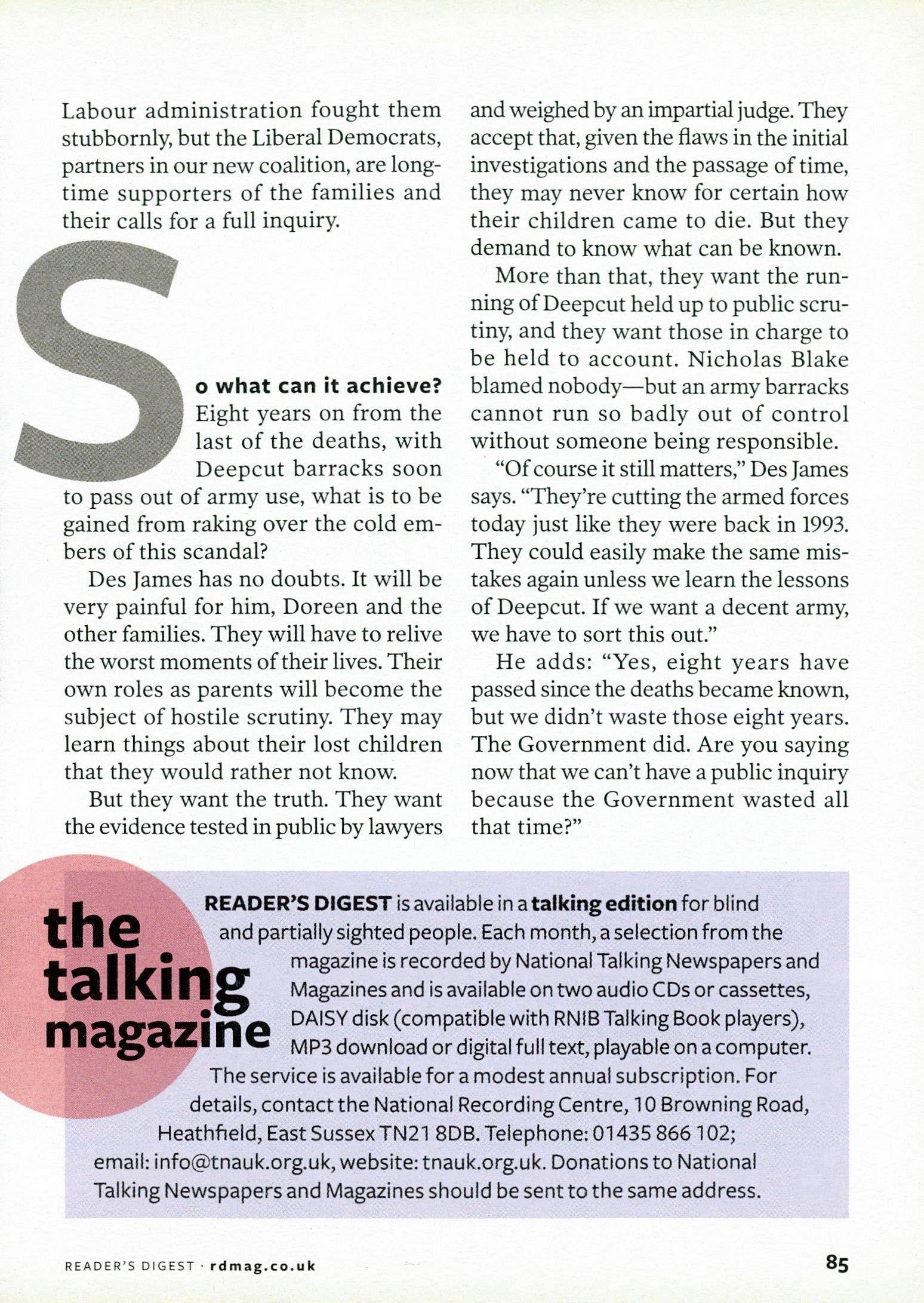
More than that, they want the running of Deepcut held up to public scrutiny, and they want those in charge to be held to account. Nicholas Blake blamed nobody—but an army barracks cannot run so badly out of control without someone being responsible.
"Of course it still matters," Des James says. "They're cutting the armed forces today just like they were back in 1993. They could easily make the same mistakes again unless we learn the lessons of Deepcut. If we want a decent army, we have to sort this out."
He adds: "Yes, eight years have passed since the deaths became known, but we didn't waste those eight years. The Government did. Are you saying now that we can't have a public inquiry because the Government wasted all that time?"
READER'S DIGESTis available in atalking editionfor blind and partially sighted people. Each month, a selection from the magazine is recorded by National Talking Newspapers and Magazines and is available on two audio CDs or cassettes, DAISY disk (compatible with RNIB Talking Book players), MP3 download or digital full text, playable on a computer. The service is available for a modest annual subscription. For details, contact the National Recording Centre, 10 Browning Road, Heathfield, East Sussex TN21 8DB. Telephone: 01435 866102; email: info@tnauk.org.uk, website: tnauk.org.uk. Donations to National Talking Newspapers and Magazines should be sent to the same address.
READER'S DIGEST rdmag.co.uk 85

EVERY HOUSEHOLD in Vietnam seems to have a bike. In Ho Chi Minh City, more than two million ply the streets. Narrow roads and traffic congestion mean bikes are the best way to transport people and an incredible range of goods—from cooking pots (left) to hula hoops
loaded! JUST HOW MUCH vrIti("ARTY VIETNAM'S BIKERS SHOW US HOW IT'S DONE... PHOTOGRAPHS BY HANS
86
KEMP

■1.1.;

FAST FOOD?As you can tell from this bike laden with live hens and ducks (above), there's little frozen meat or fish here—it all comes direct from farm, abattoir or dock. Incense (right) is another staple of Vietnamese culture; (above right) schoolgirls in uniform share a ride to class
88 C' Alt e111 fts afl 4■.t ■•■• 124,

■
SHIP LIN 21,
fr: -4,1, • hoe
AO ritt CH
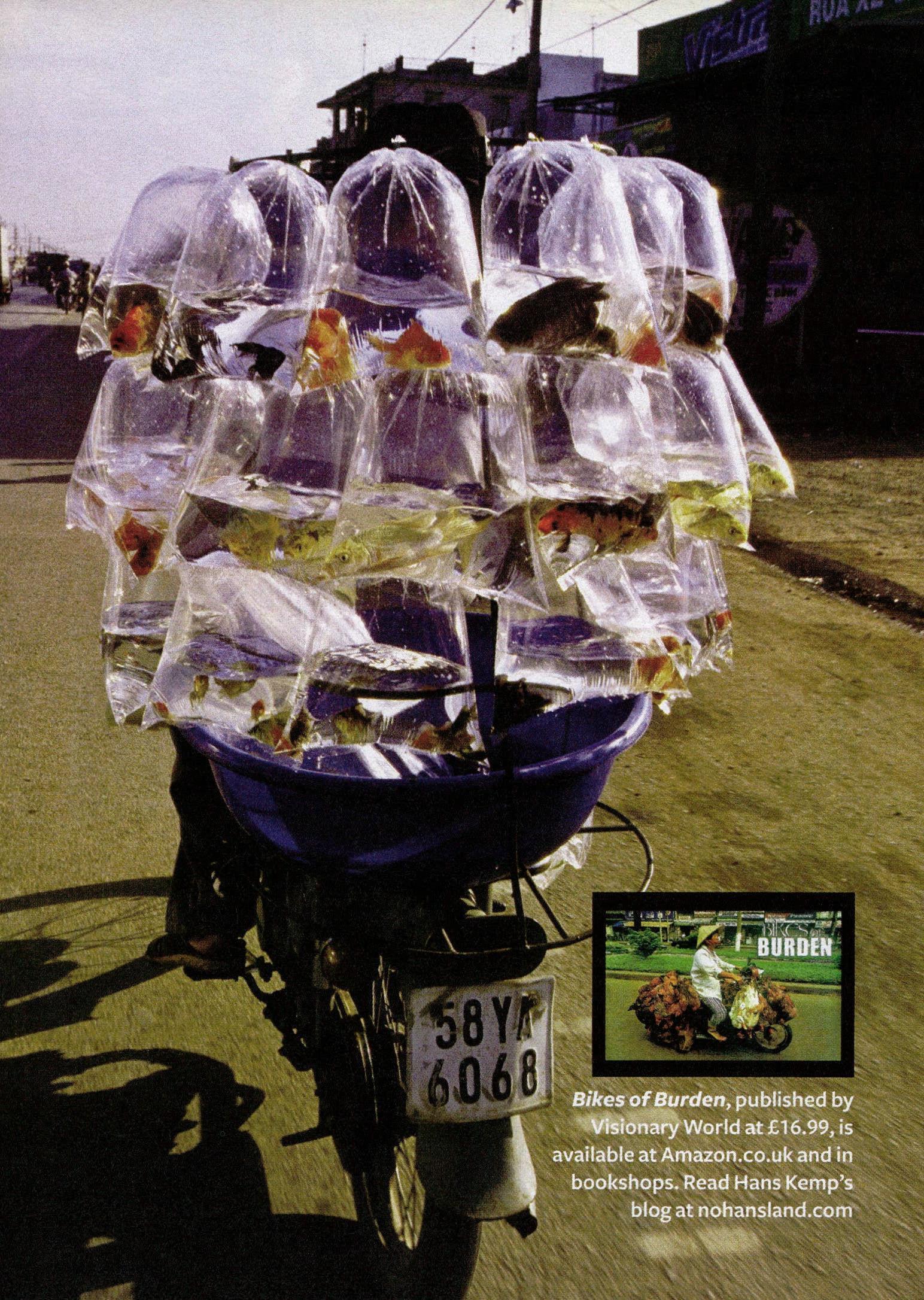
World
at
Wes ofBurden, published by Visionary
at £16.99, is available
Amazon.co.uk and in bookshops. Read Hans Kemp's blog at nohansland.com

SOME RIDERSseem totally unfazed by their huge and unwieldy loads. Fresh produce such as flowers (above) and goldfish (left) are a common sight, while some loads challenge the grip and navigational skills of the riders— check out the mirror (below) and plastic bottles (right)!
91
He's one of Britain's top terrorism experts, but hers also fighting a very personal war—with his body
As the afternoon sun begins to fade, John McDowall sits with his family and friends, looking out onto sun-dappled Surrey playing fields and enjoying the last of the day's warmth. It's hard to imagine a more convivial scene—or a scene further removed from the pressure of leading Britain's counterterrorism operation at Scotland Yard.
But it's not the only striking contrast. Behind this picture lies a cruel story about a terrible illness that's struck one of the nation's most senior police officers. Two years ago, aged 50, McDowall was diagnosed with motor neurone disease (MND). Today, the illness has ravaged his body to such an extent that he's confined to a wheelchair, with limited movement below his neck.
"The first sign I had that anything was wrong was a mild backache a few years ago that grew into a more severe pain," he explains. "I thought I might have slipped a disc, but I was so busy I didn't get it checked out to start with."
JOHN McDOWALL'S BATTLE
BY ALISON KERVIN
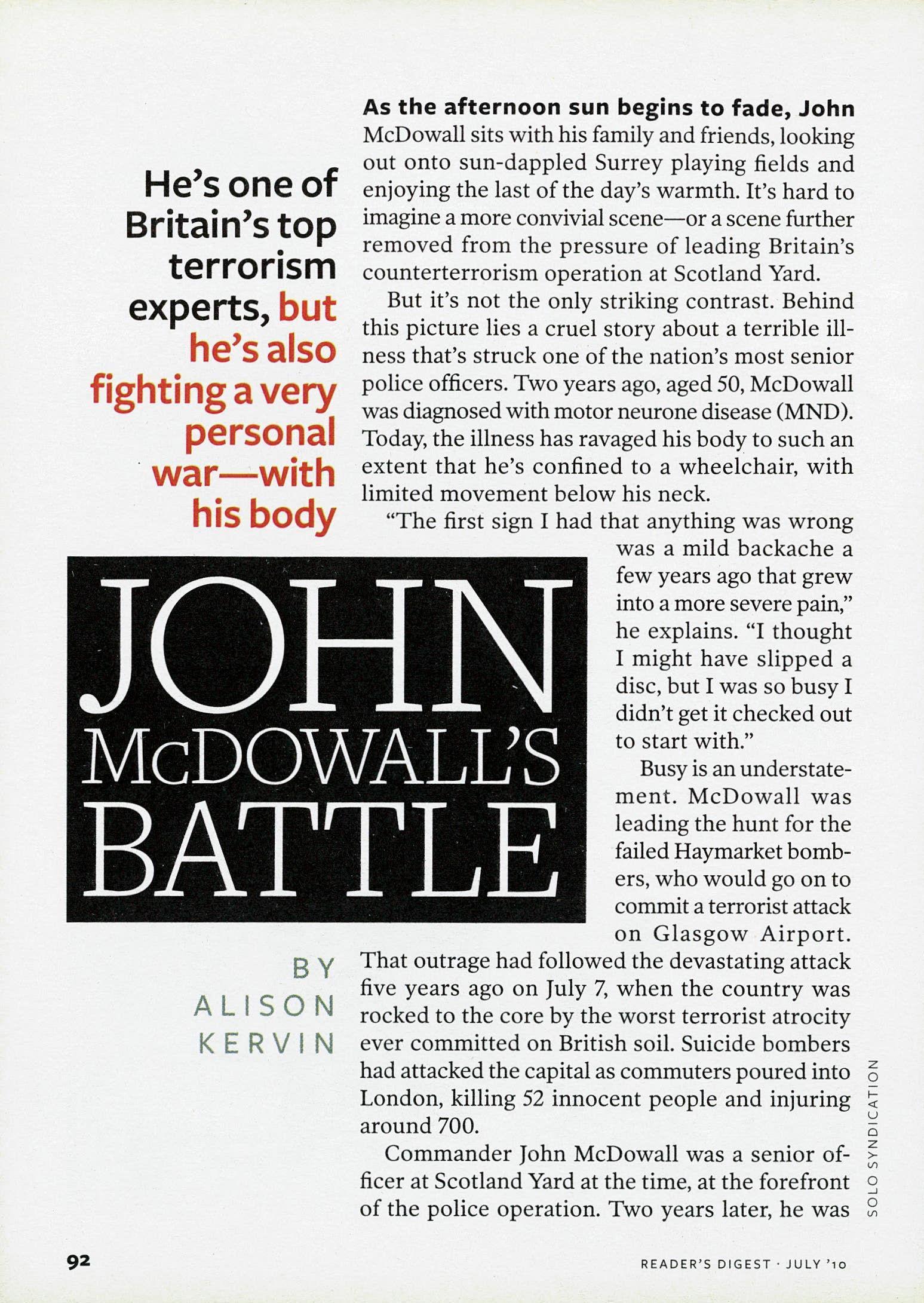
Busy is an understatement. McDowall was leading the hunt for the failed Haymarket bombers, who would go on to commit a terrorist attack on Glasgow Airport.
That outrage had followed the devastating attack five years ago on July 7, when the country was rocked to the core by the worst terrorist atrocity ever committed on British soil. Suicide bombers had attacked the capital as commuters poured into London, killing 52 innocent people and injuring around 700.
Commander John McDowall was a senior officer at Scotland Yard at the time, at the forefront of the police operation. Two years later, he was
SOLO SYND ICATION
92 READER'S DIGEST • JULY '10
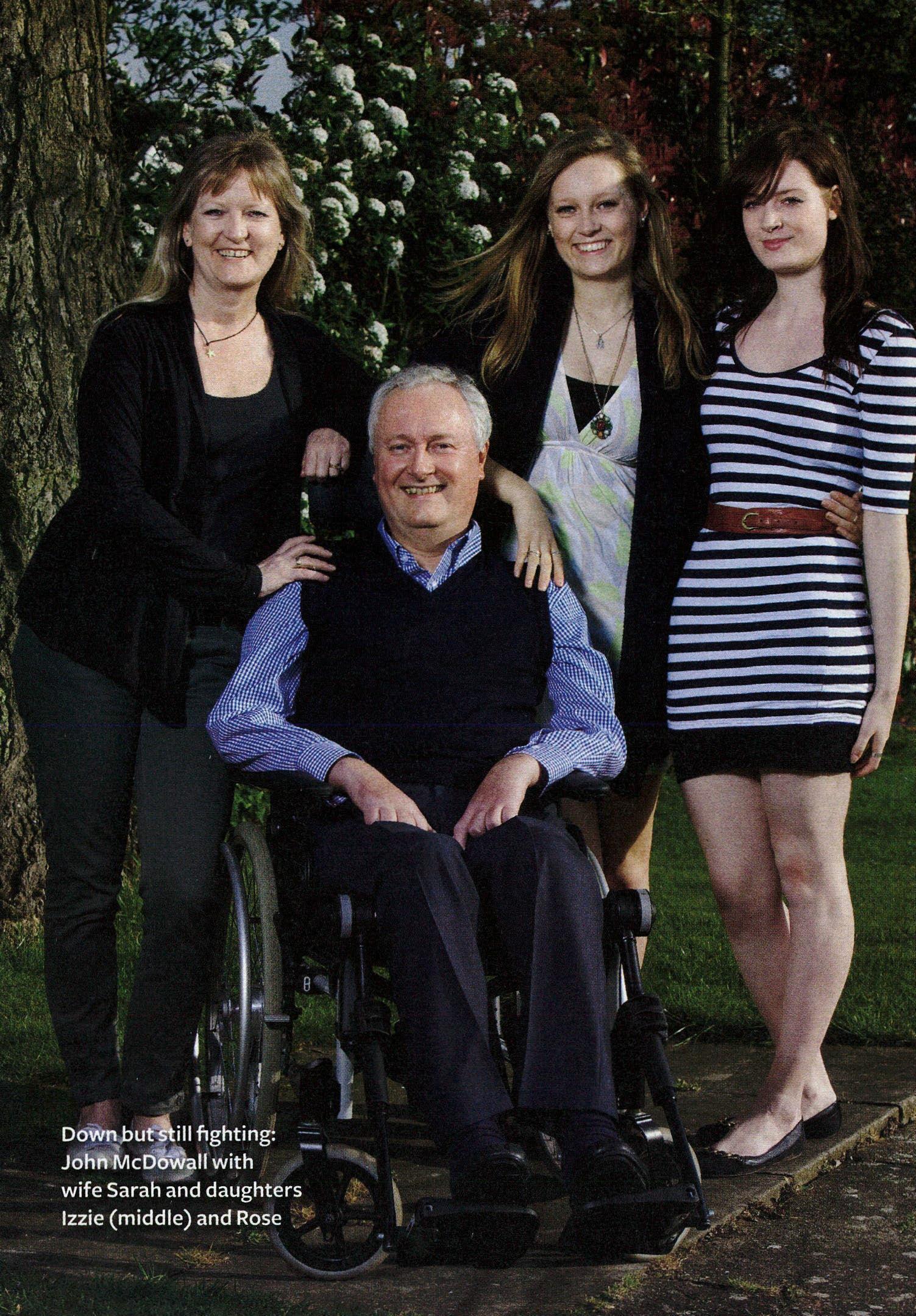
Down but still fighting: John
McDdliall with wife Sarah and daughters
Izzie (middle) and Rose
"I was a fit 50-year-old man I wouldn't recover from.
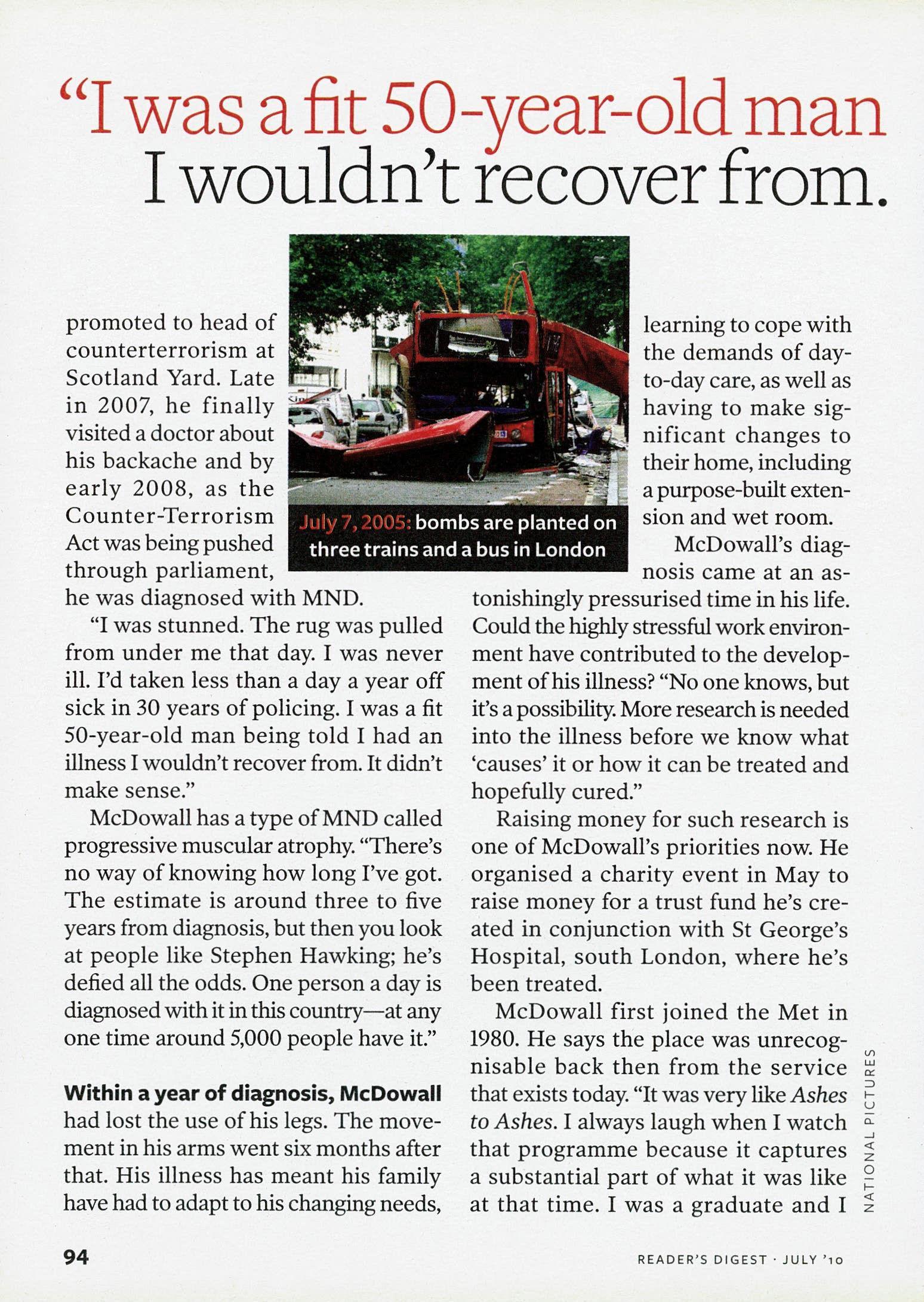
promoted to head of counterterrorism at Scotland Yard. Late in 2007, he finally visited a doctor about his backache and by early 2008, as the Counter-Terrorism Act was being pushed through parliament, he was diagnosed with MND.
r bombs are planted on three trains and a bus in London
"I was stunned. The rug was pulled from under me that day. I was never ill. I'd taken less than a day a year off sick in 30 years of policing. I was a fit 50-year-old man being told I had an illness I wouldn't recover from. It didn't make sense."
McDowall has a type of MND called progressive muscular atrophy. "There's no way of knowing how long I've got. The estimate is around three to five years from diagnosis, but then you look at people like Stephen Hawking; he's defied all the odds. One person a day is diagnosed with it in this country—at any one time around 5,000 people have it."
Within a year of diagnosis, McDowall had lost the use of his legs. The movement in his arms went six months after that. His illness has meant his family have had to adapt to his changing needs,
learning to cope with the demands of dayto-day care, as well as having to make significant changes to their home, including a purpose-built extension and wet room.
McDowall's diagnosis came at an astonishingly pressurised time in his life. Could the highly stressful work environment have contributed to the development of his illness? "No one knows, but it's a possibility. More research is needed into the illness before we know what `causes' it or how it can be treated and hopefully cured."
Raising money for such research is one of McDowall's priorities now He organised a charity event in May to raise money for a trust fund he's created in conjunction with St George's Hospital, south London, where he's been treated.
McDowall first joined the Met in 1980. He says the place was unrecognisable back then from the service that exists today. "It was very like Ashes to Ashes. I always laugh when I watch that programme because it captures a substantial part of what it was like at that time. I was a graduate and I
NA TIONAL PIC TURES
94
READER'S DIGEST • JULY '10
being told I had an illness
It didn't ma Ke sense'
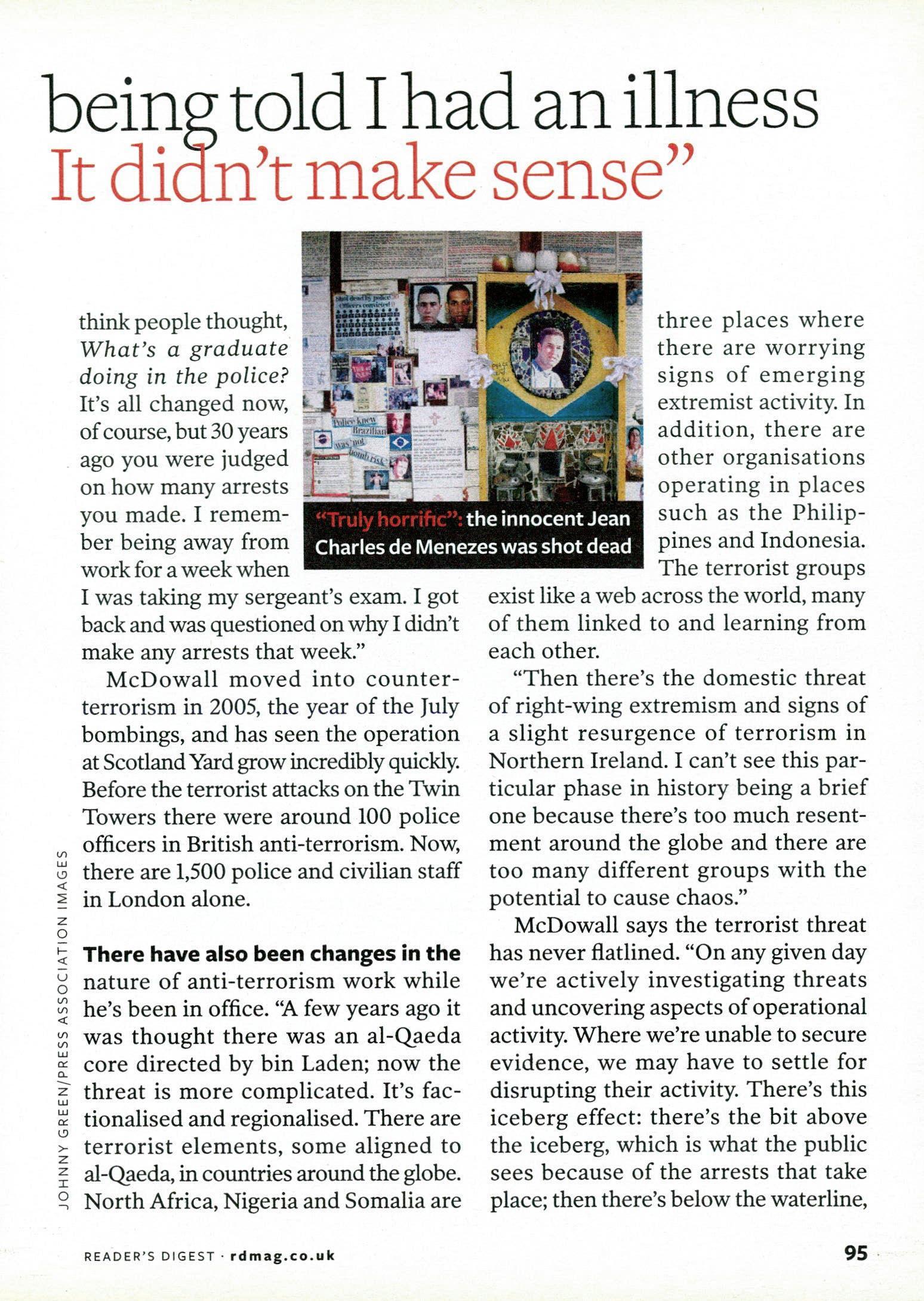
think people thought, What's a graduate doing in the police? It's all changed now, of course, but 30 years ago you were judged on how many arrests you made. I remember being away from work for a week when I was taking my sergeant's exam. I got back and was questioned on why I didn't make any arrests that week."
McDowall moved into counterterrorism in 2005, the year of the July bombings, and has seen the operation at Scotland Yard grow incredibly quickly. Before the terrorist attacks on the Twin Towers there were around 100 police officers in British anti-terrorism. Now, there are 1,500 police and civilian staff in London alone.
There have also been changes in the nature of anti-terrorism work while he's been in office. "A few years ago it was thought there was an al-Qaeda core directed by bin Laden; now the threat is more complicated. It's factionalised and regionalised. There are terrorist elements, some aligned to al-Qaeda, in countries around the globe. North Africa, Nigeria and Somalia are
three places where there are worrying signs of emerging extremist activity. In addition, there are other organisations operating in places such as the Philippines and Indonesia. The terrorist groups exist like a web across the world, many of them linked to and learning from each other.
"Then there's the domestic threat of right-wing extremism and signs of a slight resurgence of terrorism in Northern Ireland. I can't see this particular phase in history being a brief one because there's too much resentment around the globe and there are too many different groups with the potential to cause chaos."
McDowall says the terrorist threat has never flatlined. "On any given day we're actively investigating threats and uncovering aspects of operational activity. Where we're unable to secure evidence, we may have to settle for disrupting their activity. There's this iceberg effect: there's the bit above the iceberg, which is what the public sees because of the arrests that take place; then there's below the waterline,
J OH NN Y G REEN/ PRES S AS SO CIATIO N IMAG ES
READER'S DIGEST • rdmag.co.uk
95
"The fact that we killed an the opposite of everything

which is a lot of disruptive activity such as the seizing of assets. What's above or below the waterline changes as time goes by.
"Terrorists are people who are operating outside the law and with a skewed moral compass. They are criminals, and to paint them as anything else gives them a dignity they don't deserve. They have a warped view that allows them to believe that violence is a way forward. It's not, and they have to be stopped, but when they are operating so far out of the law and we're operating within it, it can be difficult. Also, they are much more aware of surveillance now, and it's important that we're able to stay one step ahead of them."
the Olympics —"a major logistical challenge"
point", but despite the pressure this placed on McDowall and his team, the focus remained on finding the group of committed terrorists "on the run" and he's pleased that all those believed to be responsible for the attempted bombings on July 21 were identified and prosecuted.
One of the most difficult times in McDowall's career was the shooting of jean Charles de Menezes at London's Stockwell tube station in 2005. McDowall was "gold" commander that day. "The fact that we killed an innocent person, which is the opposite of everything we're set up to achieve, was terrible, horrifying. Truly horrific."
He describes it as a "desperately low
Following his diagnosis in March 2008, McDowall was able to carry on working in anti-terrorism until just a couple of months ago; the Met made changes to his office and working environment. "I can't fault the support I've been given. The response from everyone I've dealt with in the Met and security services has been incredible," he says. "I have a staff officer and driver. It would be impossible to work without them. I'm not saying it's been easy. I can understand why some people want to go to the clinic in Switzerland for assisted suicide, but I'd like to persuade people there's another way.
"It's only your body that's failing. Your mind still works. If I can stop a person having negative thoughts or tell someone life's worth living, that would make me happy."
S TUART CLARKE/ REX FEATURES
96
READER'S DIGEST JULY ',o
innocent person, which
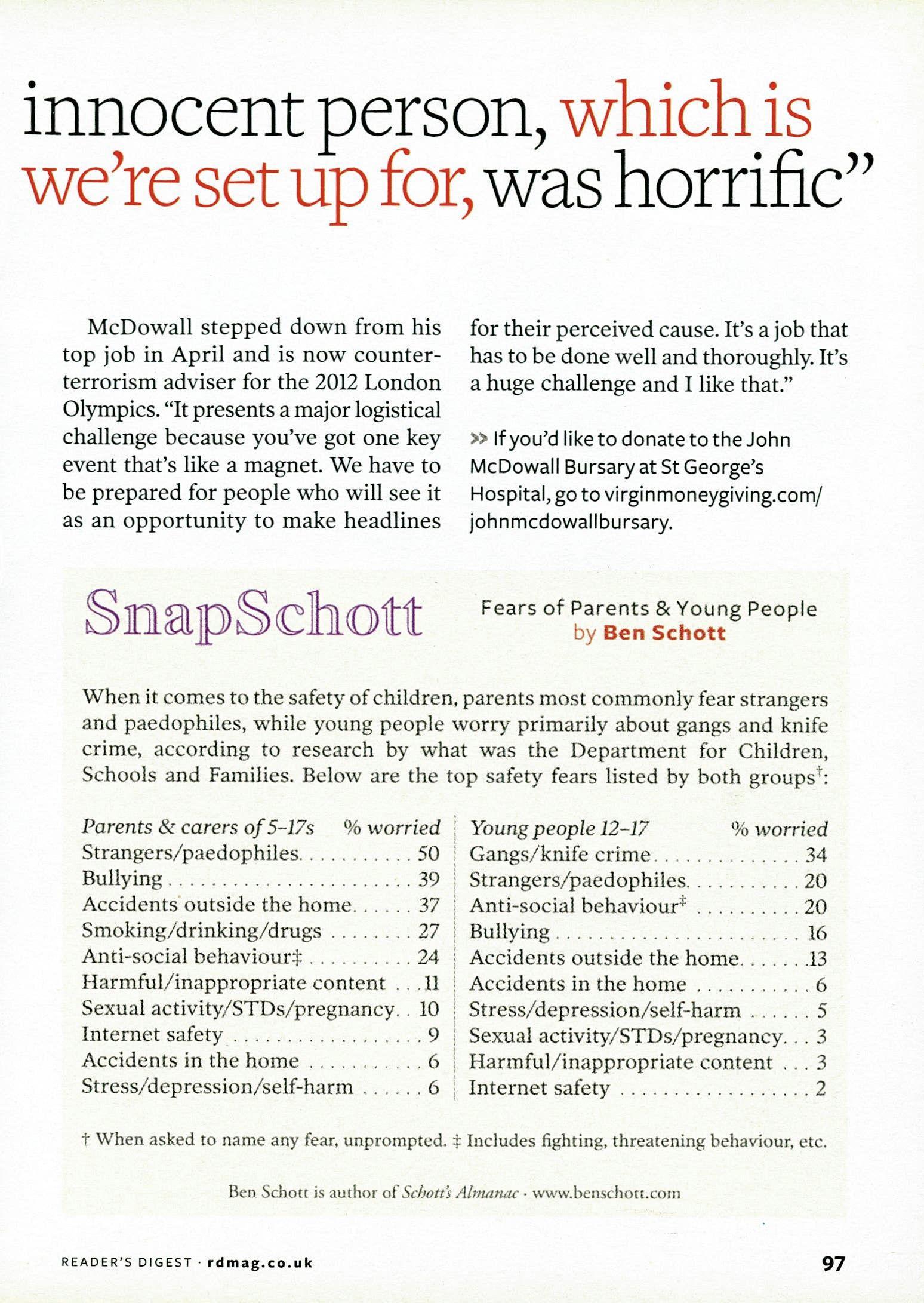
McDowall stepped down from his top job in April and is now counterterrorism adviser for the 2012 London Olympics. "It presents a major logistical challenge because you've got one key event that's like a magnet. We have to be prepared for people who will see it as an opportunity to make headlines
SnapScho
for their perceived cause. It's a job that has to be done well and thoroughly. It's a huge challenge and I like that."
> If you'd like to donate to the John McDowall Bursary at St George's Hospital, go to virginmoneygiving.com/ johnmcdowallbursary.
Fears of Parents & Young People by
Ben Schott
When it comes to the safety of children, parents most commonly fear strangers and paedophiles, while young people worry primarily about gangs and knife crime, according to research by what was the Department for Children, Schools and Families. Below are the top safety fears listed by both groupst:
t When asked to name any fear, unprompted. # Includes fighting, threatening behaviour, etc.
Ben Schott is author of Schott's Almanac • www.bensthotr.com
is
we're set up for, was horrific"
Parents & carers of5-17s % worried Young people 12-17 % worried Strangers/paedophiles 50 Gangs/knife crime 34 Bullying 39 Strangers/paedophiles 20 Accidents outside the home 37 Anti-social behaviour* 20 Smoking/drinking/drugs 27 Bullying 16 Anti-social behaviour* 24 Accidents outside the home 13 Harmful/inappropriate content 11 Accidents in the home 6 Sexual activity/STDs/pregnancy. 10 Stress/depression/self-harm 5 Internet safety 9 Sexual activity/STDs/pregnancy... 3 Accidents in the home 6 Harmful/inappropriate content . . . 3 Stress/depression/self-harm 6 Internet safety 2
READER'S DIGEST rdmag.co.uk 97
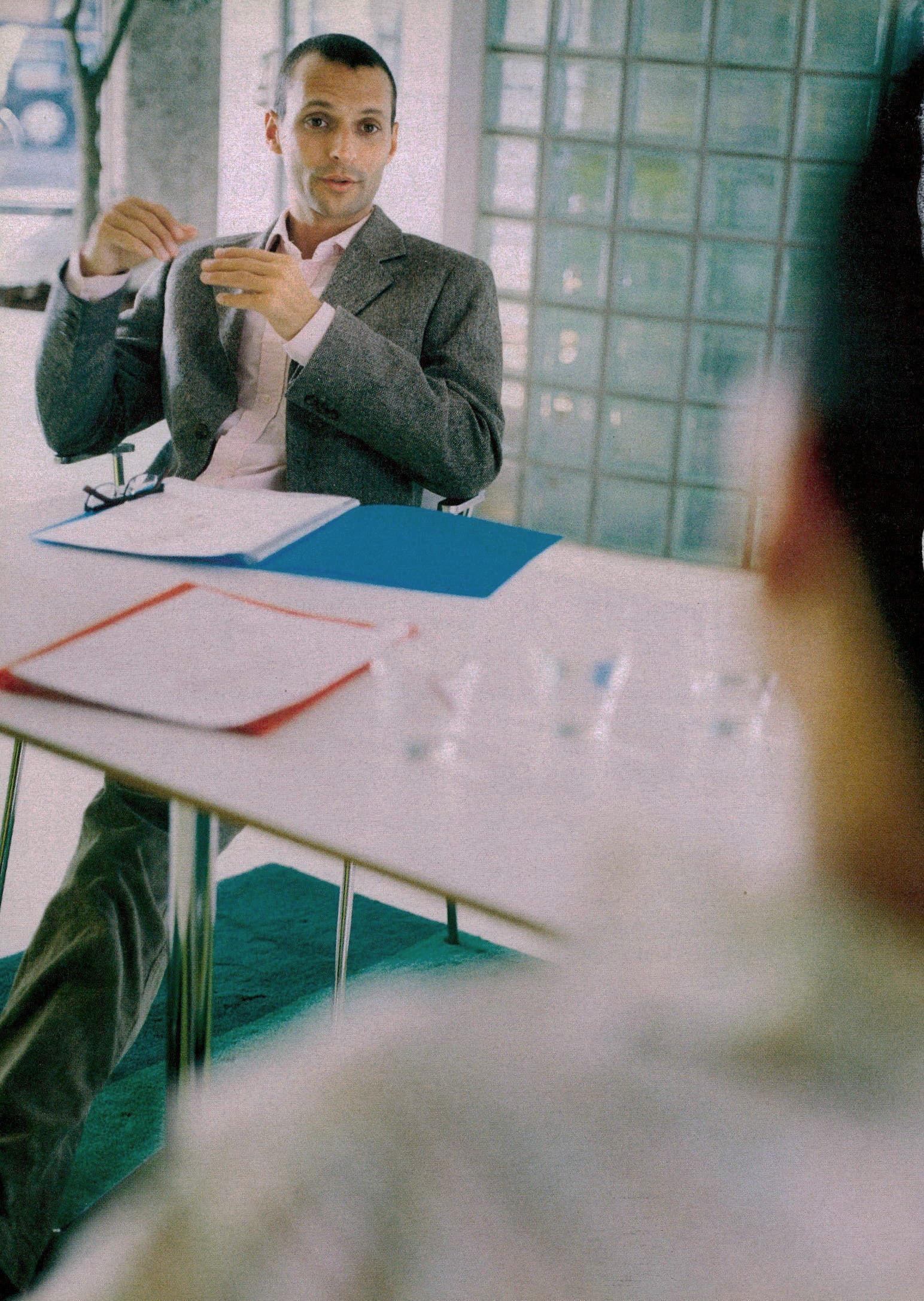
Mind how you move your arms—your career prospects, or even your relationship, may rest on a new way of reading your personality
bp .,,,,O A
BY AL
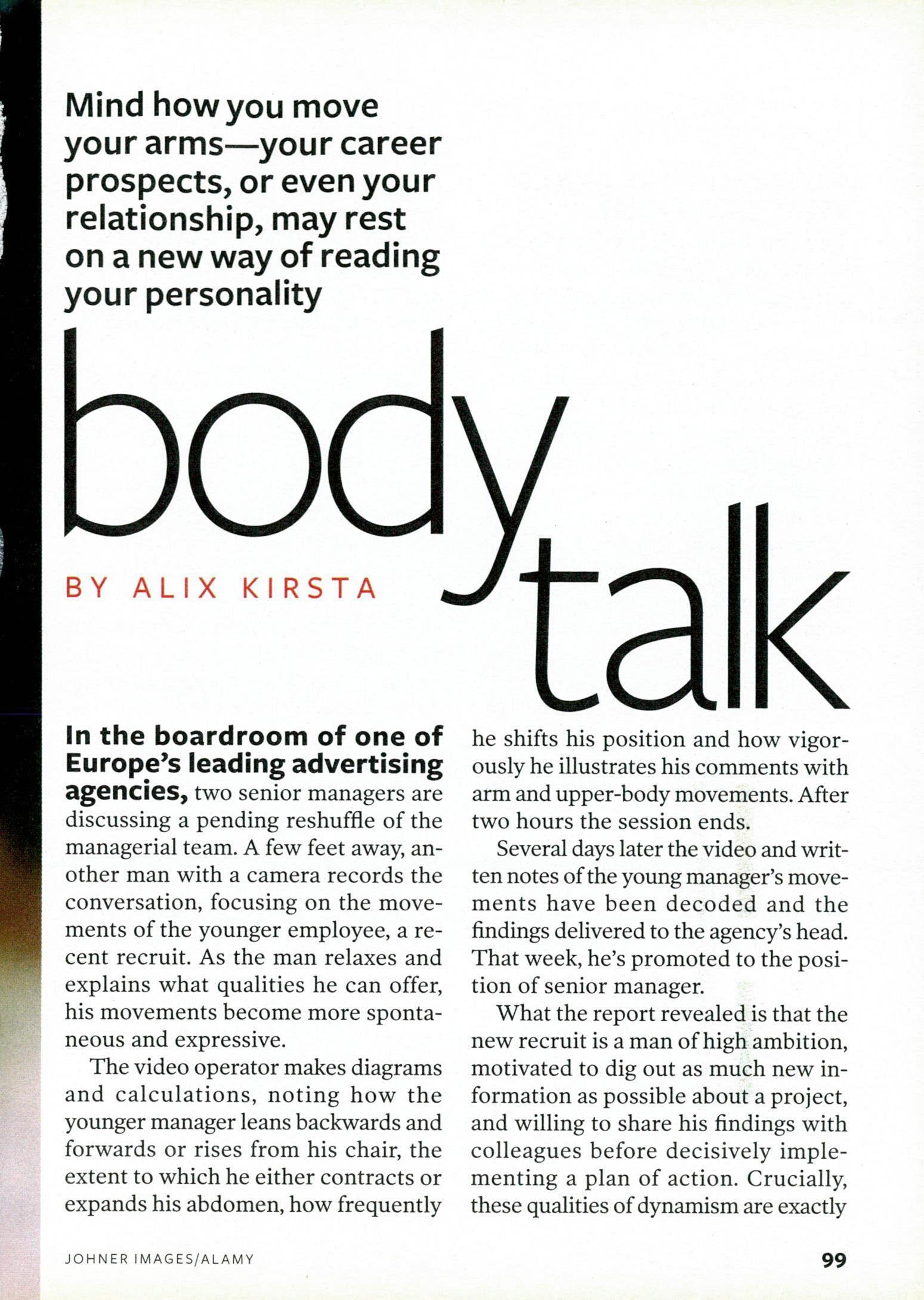
Ytak
In the boardroom of one of Europe's leading advertising agencies, two senior managers are discussing a pending reshuffle of the managerial team. A few feet away, another man with a camera records the conversation, focusing on the movements of the younger employee, a recent recruit. As the man relaxes and explains what qualities he can offer, his movements become more spontaneous and expressive.
The video operator makes diagrams and calculations, noting how the younger manager leans backwards and forwards or rises from his chair, the extent to which he either contracts or expands his abdomen, how frequently
he shifts his position and how vigorously he illustrates his comments with arm and upper-body movements. After two hours the session ends.
Several days later the video and written notes of the young manager's movements have been decoded and the findings delivered to the agency's head. That week, he's promoted to the position of senior manager.
What the report revealed is that the new recruit is a man of high ambition, motivated to dig out as much new information as possible about a project, and willing to share his findings with colleagues before decisively implementing a plan of action. Crucially, these qualities of dynamism are exactly
JOHNER IMAGES/ALAMY 99
what's needed to balance and strengthen the senior management team.
HOW DID THEY REACH THAT DECISION?
The profile of the new manager is based on one of the most comprehensive personality assessment systems of recent years. The principles of movement pattern analysis (MPA) were developed in Britain in the 1940s by the Hungarian movement analyst and dance notator Rudolf Laban, then expanded in the 1950s by Laban's former student Warren Lamb as a management consultancy tool in the corporate world.
Many behaviour analysts estimate that up to 80 per cent of human communication is non-verbal. But, according to Lamb, the shifting, overlapping and melding processes of movement should not be confused with more popular forms of "body language" said to reveal the deeper meaning behind our static postures and gestures.
"MPA is about a person's integrated movement, which uses the body as a
whole, especially the pelvis and trunk," says Lamb. "Trying to gauge someone's behaviour from crossed arms or a tapping foot is futile because these are isolated gestures that indicate absence of movement. Noting that someone's keeping their legs crossed isn't an observation of movement but of stillness. What counts is how the person arrived at this position."
Lamb and his colleagues believe that our constantly changing "posture/ gesture mergers"—the processes linking one body movement to the next— convey a unique "body signature". Profiling is a way of joining up the invisible dots linking every posture and gesture to another. The resulting patterns are as fundamental to our identity as our fingerprints or DNA, says Lamb. He suggests visualising our joints and limbs emitting a vapour trail, like a highflying aircraft against a blue sky: "The vapour trails illustrate a person's intrinsic patterns of movement."
The unique aspect of MPA is its capacity to indicate how a person acts
analysingworld leaders
Recently, Warren Lamb has acted as a consultant tothe Ministry of Defence and the US Defense Department. His analyses of world leaders— including Kim Jong-il, Muammar al-Gaddafi,
Vladimir Putin, Dmitry Medvedev and Hugo Chavez—based largely on videotape, were commissioned by the US Naval War College.
Lamb's findings, which are top secret,
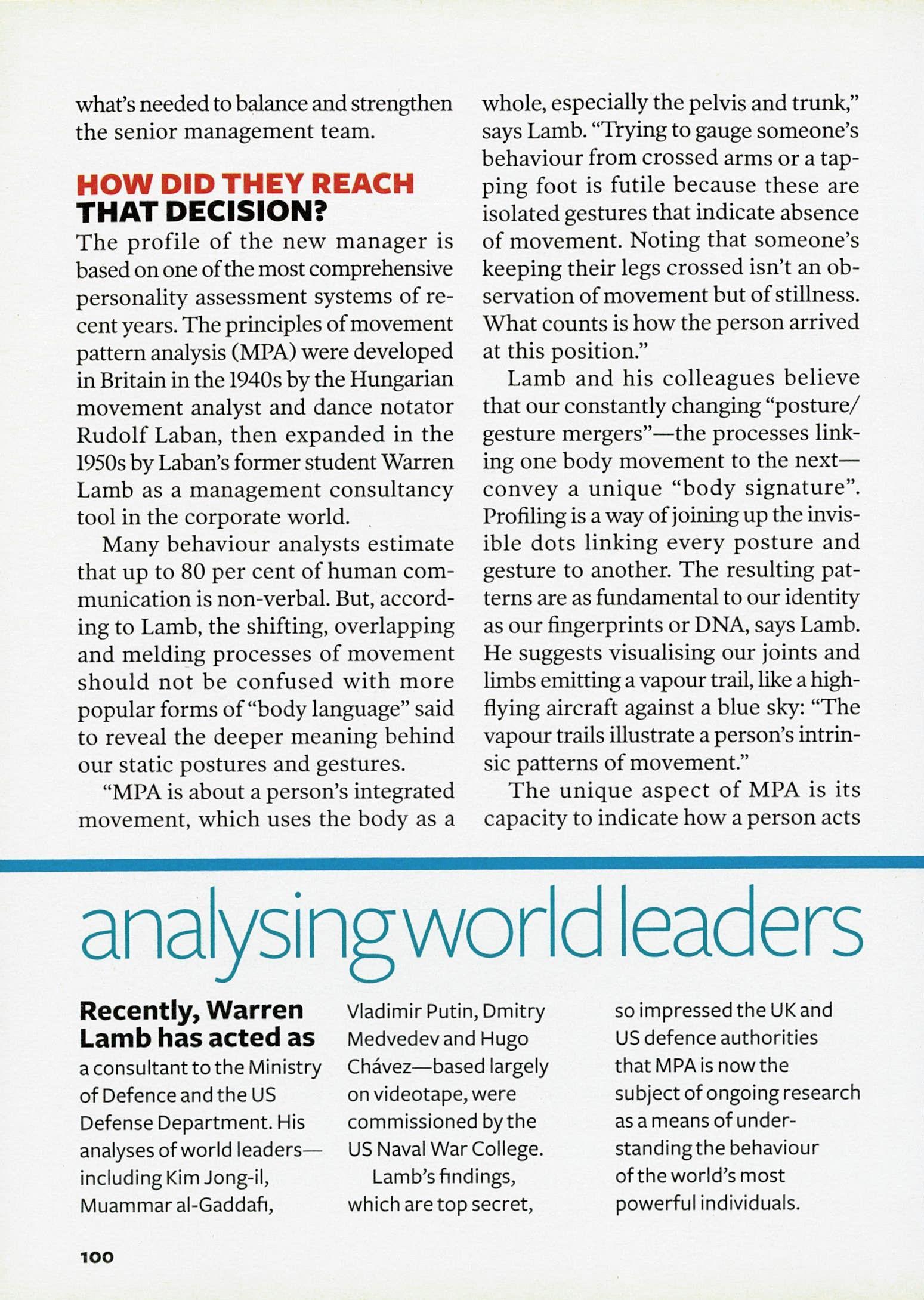
so impressed the UK and US defence authorities that MPA is now the subject of ongoing research as a means of understandingthe behaviour of the world's most powerful individuals.
100
and interacts with other people at all points of decision-making, at work or home. We all recognise such obvious traits in others as dynamism, impulsiveness and snap decision-making—the classic "human dynamo"; or fastidiousness, deliberation and hesitation— the typical "dependable plodder". But the discovery that these traits can be identified from how we move is relatively recent.
HOW IS MOVEMENT ASSESSED?
According to MPA, all decision-making —whether you're choosing what to cook for supper or when to launch a new product—consists of three distinct phases identified by Rudolf Laban and Warren Lamb.
The first "attention" phase involves ferreting out information, investigating the facts and doing all the homework necessary to assess a situation.
The second "intention" phase consists of weighing up the pros and cons of different possible courses of action,
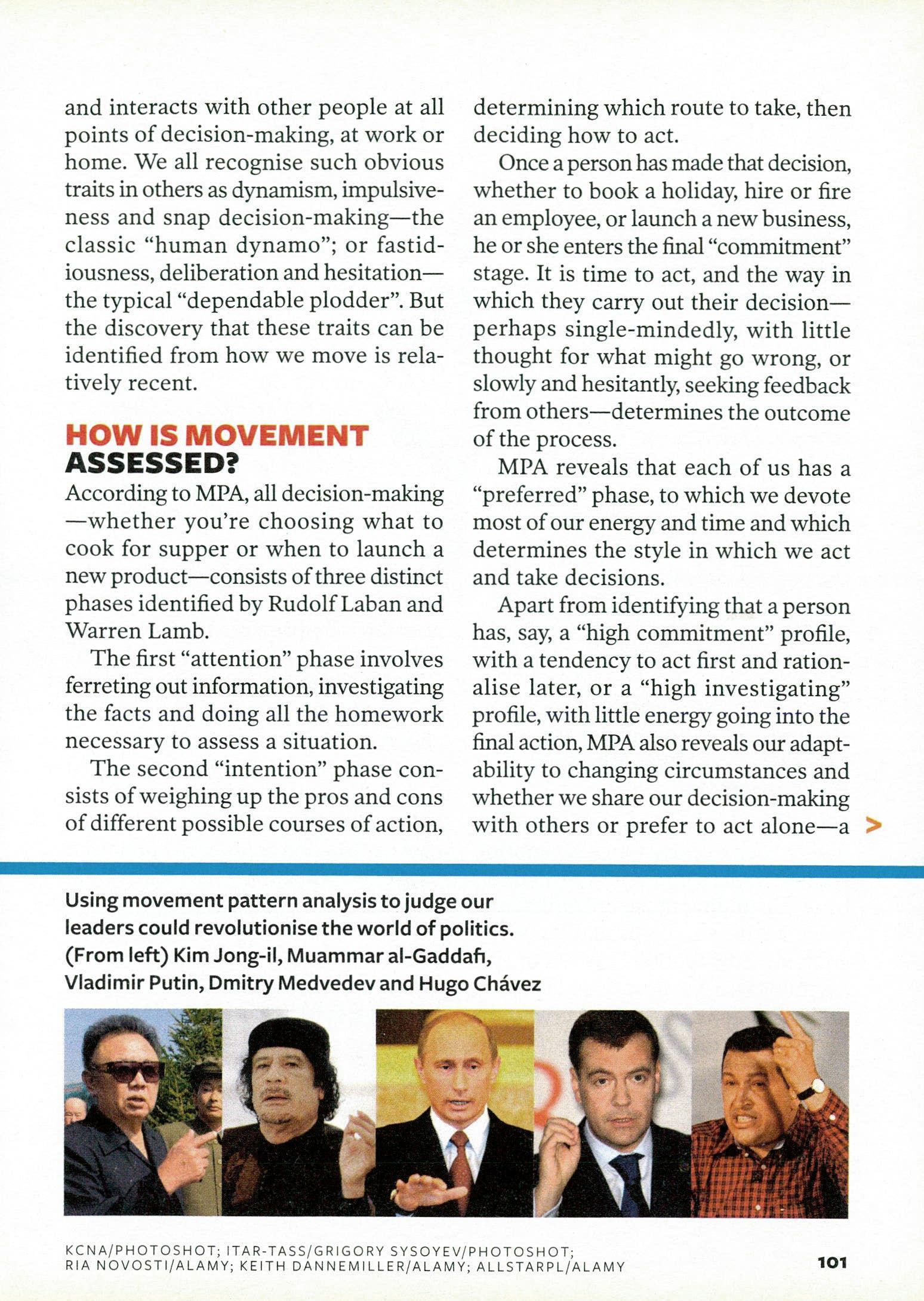
determining which route to take, then deciding how to act.
Once a person has made that decision, whether to book a holiday, hire or fire an employee, or launch a new business, he or she enters the final "commitment" stage. It is time to act, and the way in which they carry out their decision— perhaps single-mindedly, with little thought for what might go wrong, or slowly and hesitantly, seeking feedback from others—determines the outcome of the process.
MPA reveals that each of us has a "preferred" phase, to which we devote most of our energy and time and which determines the style in which we act and take decisions.
Apart from identifying that a person has, say, a "high commitment" profile, with a tendency to act first and rationalise later, or a "high investigating" profile, with little energy going into the final action, MPA also reveals our adaptability to changing circumstances and whether we share our decision-making with others or prefer to act alone—a >
Using movement pattern analysis to judge our leaders could revolutionise the world of politics. (From left) Kim Jong-il, Muammar al-Gaddafi, Vladimir Putin, Dmitry Medvedev and Hugo Chavez
KCNA/PHOTOSHOT; ITAR-TASS/GRIGORY SYSOYEV/PHOTOSHOT; RIA NOVOSTI/ALAMY; KEITH DANNEMILLER/ALAMY; ALLSTARPL/ALAMY 101
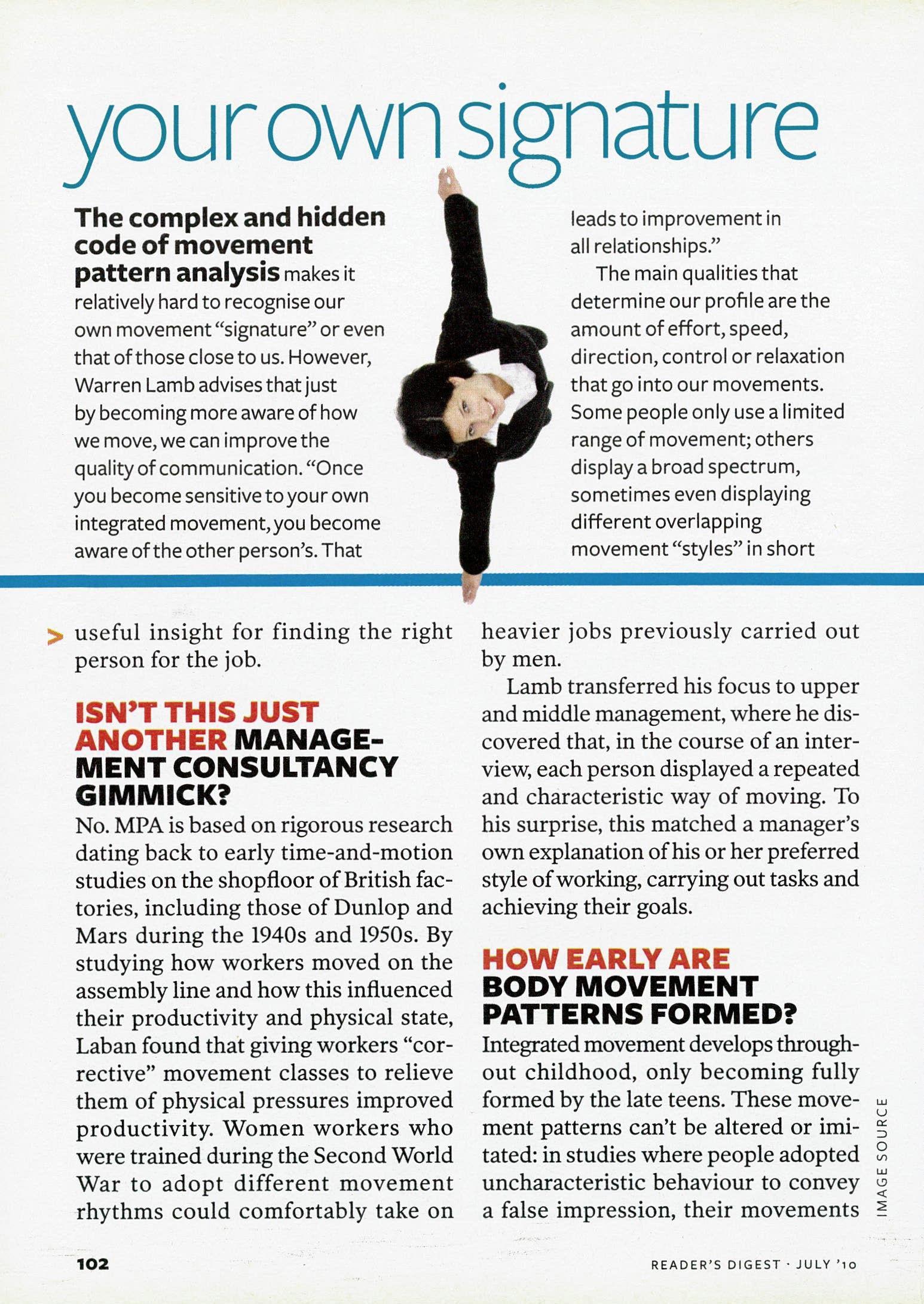
your own signature
The complex and hidden code of movement pattern analysis makes it relatively hard to recognise our own movement "signature" or even that of those close to us. However, Warren Lamb advises that just by becoming more aware of how we move, we can improve the quality of communication. "Once you become sensitive to your own integrated movement,you become aware of the other person's. That
> useful insight for finding the right person for the job.
ISN'T THIS JUST ANOTHER MANAGEMENT CONSULTANCY GIMMICK?
No. MPA is based on rigorous research dating back to early time-and-motion studies on the shopfloor of British factories, including those of Dunlop and Mars during the 1940s and 1950s. By studying how workers moved on the assembly line and how this influenced their productivity and physical state, Laban found that giving workers "corrective" movement classes to relieve them of physical pressures improved productivity. Women workers who were trained during the Second World War to adopt different movement rhythms could comfortably take on
leads to improvement in all relationships."
The main qualities that determine our profile are the amount of effort, speed, direction, control or relaxation that go into our movements. Some people only use a limited range of movement; others display a broad spectrum, sometimes even displaying different overlapping movement "styles" in short
heavier jobs previously carried out by men.
Lamb transferred his focus to upper and middle management, where he discovered that, in the course of an interview, each person displayed a repeated and characteristic way of moving. To his surprise, this matched a manager's own explanation of his or her preferred style of working, carrying out tasks and achieving their goals.
HOW EARLY ARE BODY MOVEMENT PATTERNS FORMED?
Integrated movement develops throughout childhood, only becoming fully formed by the late teens. These movement patterns can't be altered or imitated: in studies where people adopted uncharacteristic behaviour to convey a false impression, their movements
102
READER'S DIGEST • JULY ',o MAGE SOURCE
periods—indicating dynamism and assertiveness, an instinct to keep many challenges and tasks on the go at once.
As a rule, the more varied the speed of our actions, the more likely we are to act promptly, methodically and competitively. Switching frequently from sharp, direct movements to more meandering, circuitous ones indicates an analytical and probing approach to decisionmaking. Variations in the degree of pressure, delicacy, control and relaxation in movements reveal determination, purposefulness
soon became stilted and clumsy.(When Warren Lamb profiled Sir Lawrence Olivier in three different plays, Lamb found that although the actor's postures and gestures altered to suit the roles, his integrated movements remained consistent throughout.)
Not surprisingly, we express more integrated movement patterns when discussing topics that interest us. In a typical two-hour MPA interview, most people display about 200-250 sequences of similar or identical posture/gesture clusters. Throughout an average day, we will express our body signature in some way, even while asleep. Activities carried out daily—teeth-brushing, shaving, applying make-up—illustrate how such movements become a ritual. Integrated movements don't change as we age and may only be altered by severe illness, injury or mental
and a need to be atthe hub of activity at work.
A less obvious but key feature of MPA is how we shift position in the kinesphere: the 3D space "bubble" surroundingthe body. This spatial shape is defined by openingthe chest and arms as in greeting, or closing them as in an embrace; rising and falling, contracting or stretching; and moving backwards and forwards. Some of us may create fewer or very limited shapes. In contrast, a full range of shapes corresponds to the desire to explore alternatives, bring fresh perspectives and anticipate the outcome of one's actions.
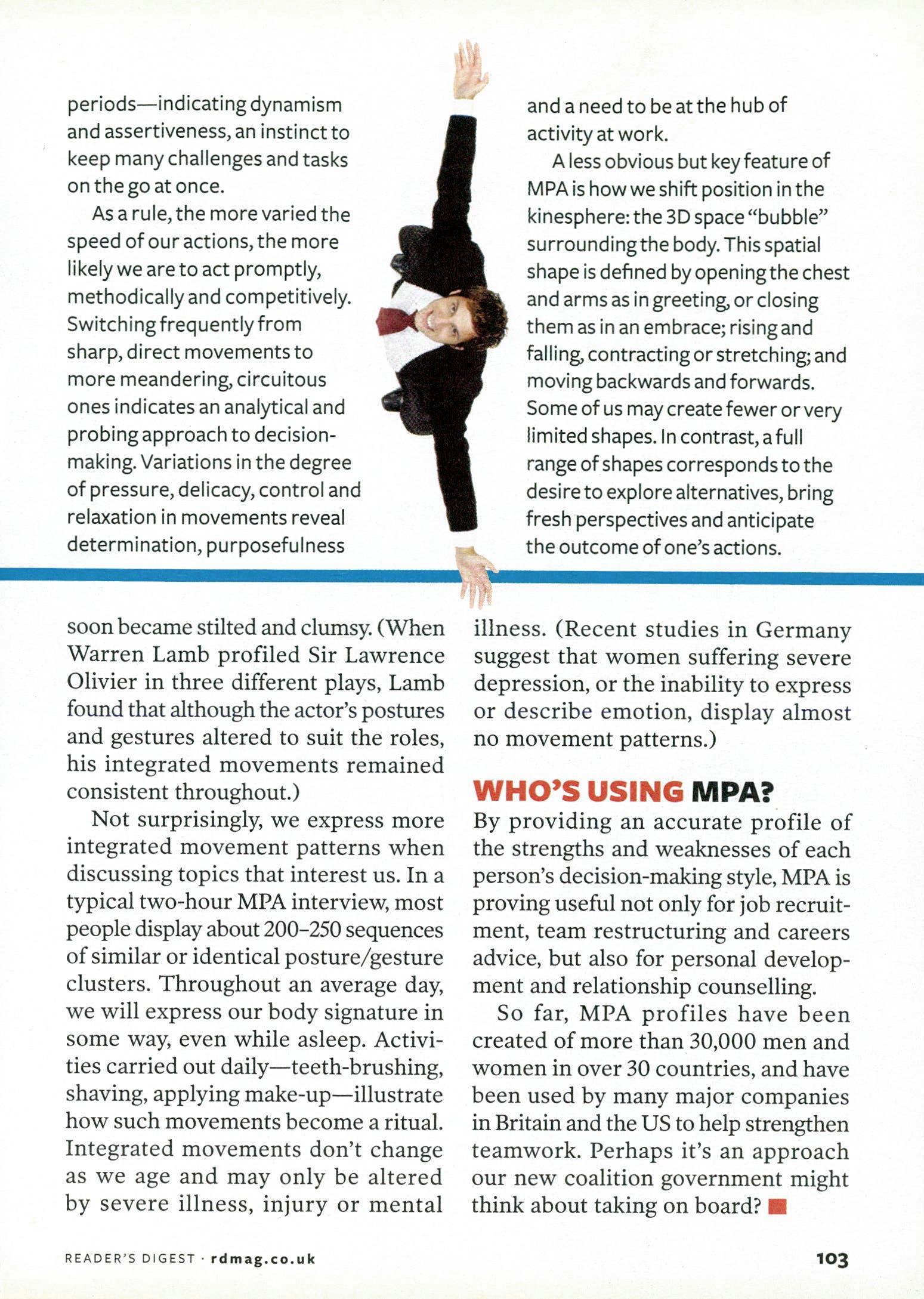
illness. (Recent studies in Germany suggest that women suffering severe depression, or the inability to express or describe emotion, display almost no movement patterns.)
WHO'S USING MPA?
By providing an accurate profile of the strengths and weaknesses of each person's decision-making style, MPA is proving useful not only for job recruitment, team restructuring and careers advice, but also for personal development and relationship counselling.
So far, MPA profiles have been created of more than 30,000 men and women in over 30 countries, and have been used by many major companies in Britain and the US to help strengthen teamwork. Perhaps it's an approach our new coalition government might think about taking on board? ■
READER'S DIGEST rdmag.co.uk 103
The nine times I nearly died
BY BENEDICT ALLEN
There's a lot to recommend my job. You meet interesting people, have a challenging work environment, get lots of fresh air.
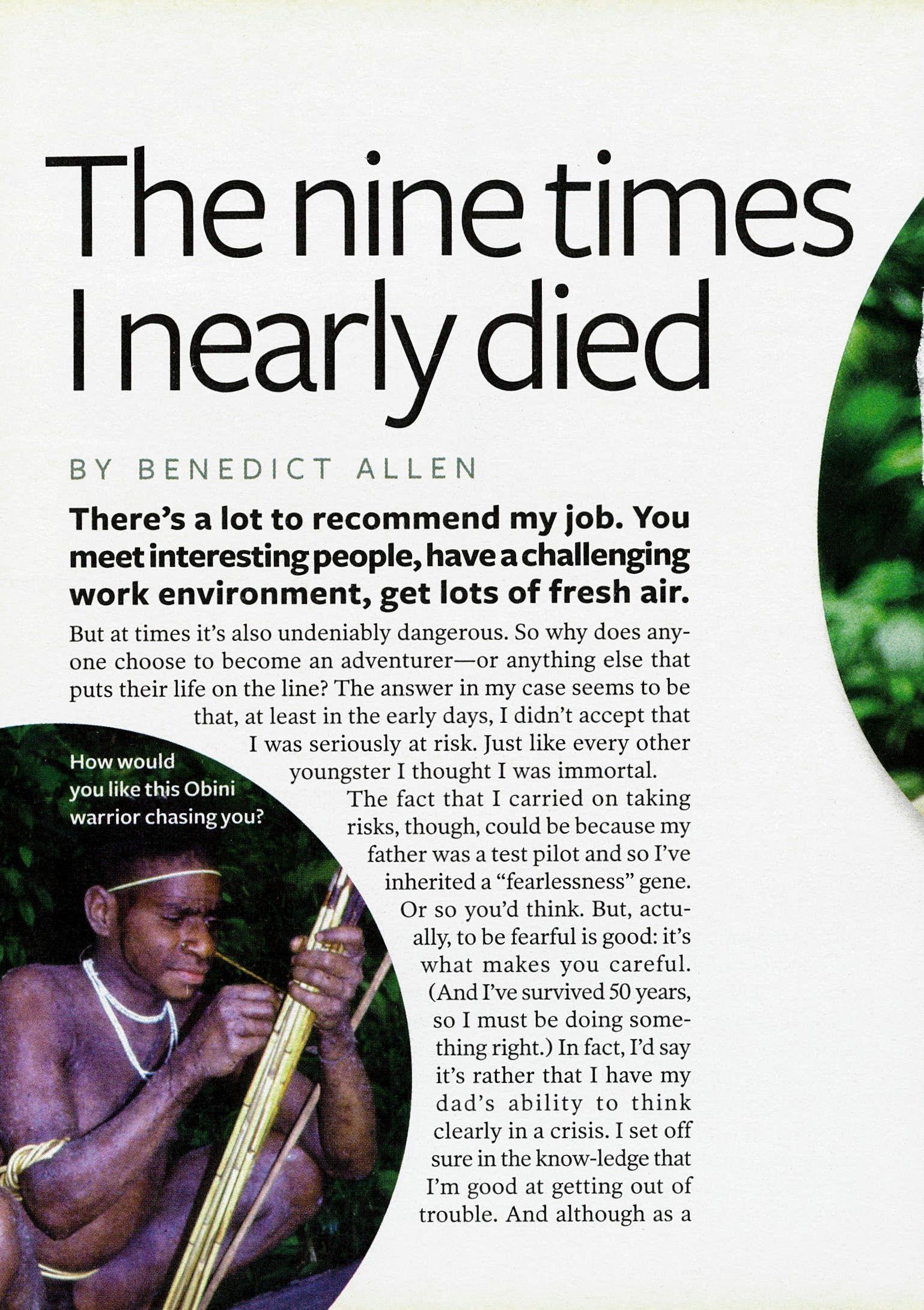
How would you like this Obini warrior chasing you?
But at times it's also undeniably dangerous. So why does anyone choose to become an adventurer—or anything else that puts their life on the line? The answer in my case seems to be that, at least in the early days, I didn't accept that I was seriously at risk. Just like every other youngster I thought I was immortal. The fact that I carried on taking risks, though, could be because my father was a test pilot and so I've inherited a "fearlessness" gene. Or so you'd think. But, actually, to be fearful is good: it's what makes you careful. (And I've survived 50 years, so I must be doing something right.) In fact, I'd say it's rather that I have my dad's ability to think clearly in a crisis. I set off sure in the know-ledge that I'm good at getting out of trouble. And although as a

105
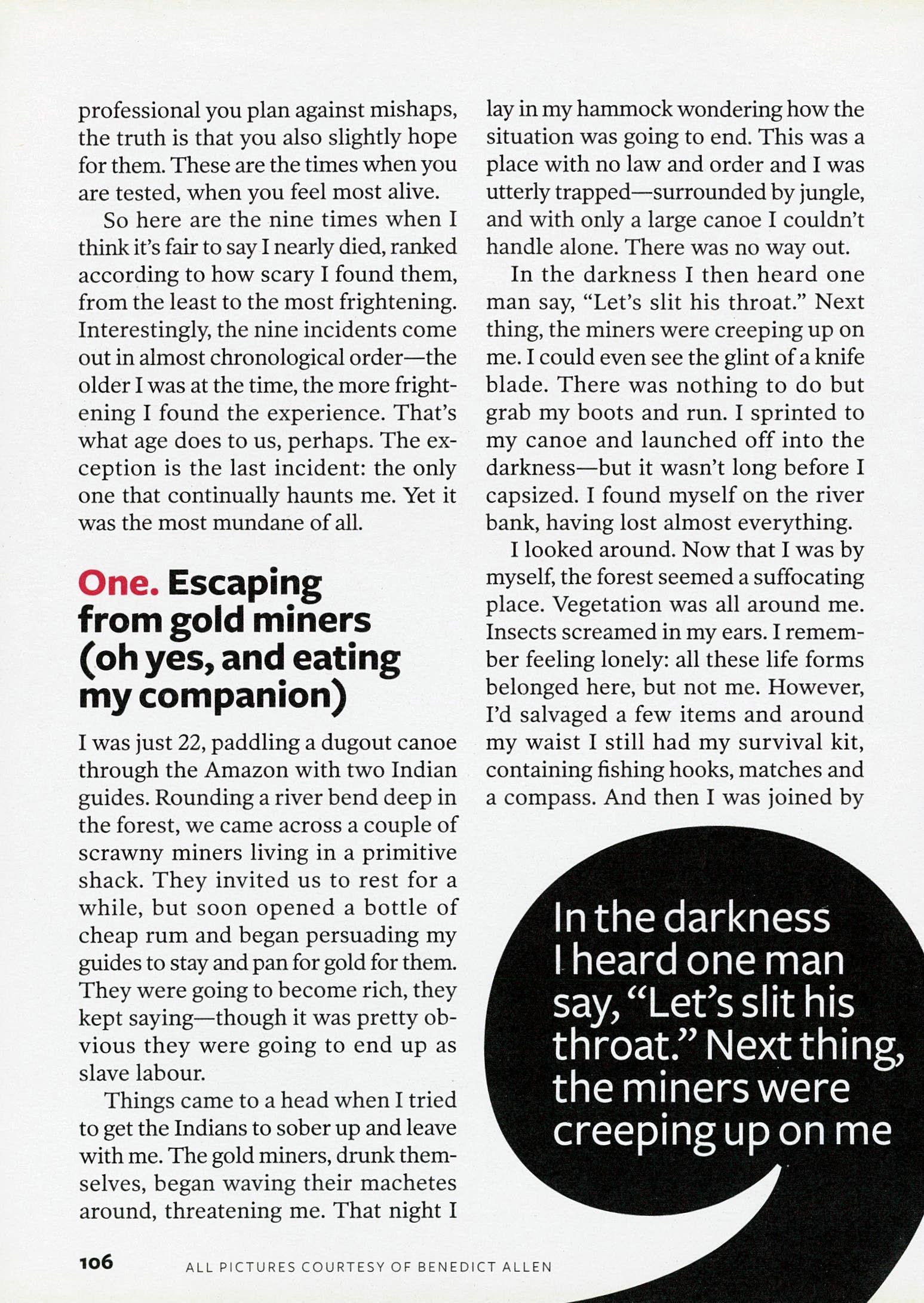
professional you plan against mishaps, the truth is that you also slightly hope for them. These are the times when you are tested, when you feel most alive.
So here are the nine times when I think it's fair to say I nearly died, ranked according to how scary I found them, from the least to the most frightening. Interestingly, the nine incidents come out in almost chronological order—the older I was at the time, the more frightening I found the experience. That's what age does to us, perhaps. The exception is the last incident: the only one that continually haunts me. Yet it was the most mundane of all.
One. Escaping from gold miners (oh yes, and eating my companion)
I was just 22, paddling a dugout canoe through the Amazon with two Indian guides. Rounding a river bend deep in the forest, we came across a couple of scrawny miners living in a primitive shack. They invited us to rest for a while, but soon opened a bottle of cheap rum and began persuading my guides to stay and pan for gold for them. They were going to become rich, they kept saying—though it was pretty obvious they were going to end up as slave labour.
Things came to a head when I tried to get the Indians to sober up and leave with me. The gold miners, drunk themselves, began waving their machetes around, threatening me. That night I
lay in my hammock wondering how the situation was going to end. This was a place with no law and order and I was utterly trapped—surrounded by jungle, and with only a large canoe I couldn't handle alone. There was no way out.
In the darkness I then heard one man say, "Let's slit his throat." Next thing, the miners were creeping up on me. I could even see the glint of a knife blade. There was nothing to do but grab my boots and run. I sprinted to my canoe and launched off into the darkness—but it wasn't long before I capsized. I found myself on the river bank, having lost almost everything.
I looked around. Now that I was by myself, the forest seemed a suffocating place. Vegetation was all around me. Insects screamed in my ears. I remember feeling lonely: all these life forms belonged here, but not me. However, I'd salvaged a few items and around my waist I still had my survival kit, containing fishing hooks, matches and a compass. And then I was joined by
In the darkness
I
heard one man say, "Let's slit his throat." Next thing, the miners were creeping up on me
106 ALL PICTURES COURTESY OF BENEDICT ALLEN
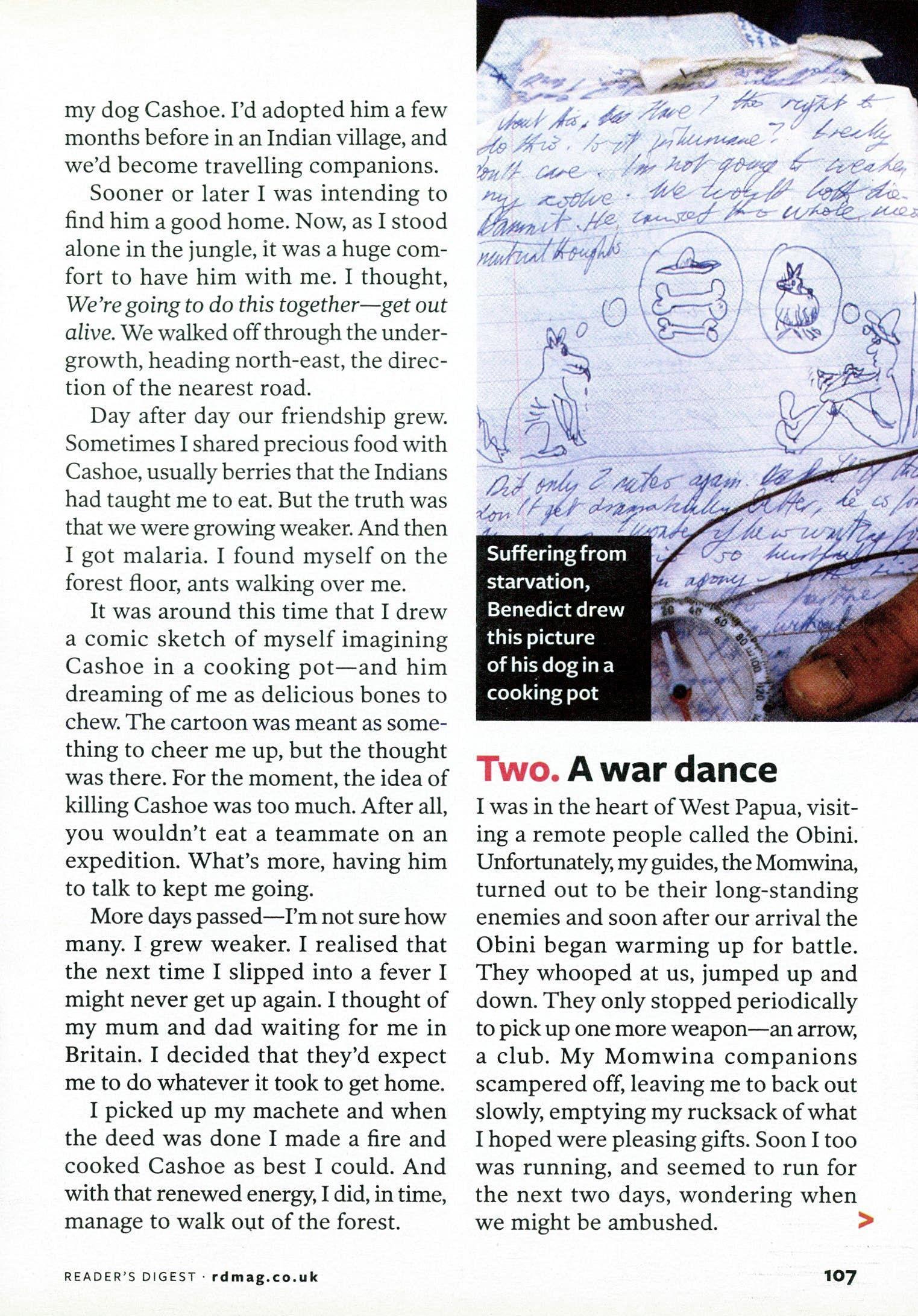
my dog Cashoe. I'd adopted him a few months before in an Indian village, and we'd become travelling companions.
Sooner or later I was intending to find him a good home. Now, as I stood alone in the jungle, it was a huge comfort to have him with me. I thought, We're going to do this together—get out alive. We walked off through the undergrowth, heading north-east, the direction of the nearest road.
Day after day our friendship grew. Sometimes I shared precious food with Cashoe, usually berries that the Indians had taught me to eat. But the truth was that we were growing weaker. And then I got malaria. I found myself on the forest floor, ants walking over me.
It was around this time that I drew a comic sketch of myself imagining Cashoe in a cooking pot—and him dreaming of me as delicious bones to chew. The cartoon was meant as something to cheer me up, but the thought was there. For the moment, the idea of killing Cashoe was too much. After all, you wouldn't eat a teammate on an expedition. What's more, having him to talk to kept me going.
More days passed—I'm not sure how many. I grew weaker. I realised that the next time I slipped into a fever I might never get up again. I thought of my mum and dad waiting for me in Britain. I decided that they'd expect me to do whatever it took to get home.
I picked up my machete and when the deed was done I made a fire and cooked Cashoe as best I could. And with that renewed energy, I did, in time, manage to walk out of the forest.
Two. A war dance
I was in the heart of West Papua, visiting a remote people called the Obini. Unfortunately, my guides, the Momwina, turned out to be their long-standing enemies and soon after our arrival the Obini began warming up for battle. They whooped at us, jumped up and down. They only stopped periodically to pick up one more weapon—an arrow, a club. My Momwina companions scampered off, leaving me to back out slowly, emptying my rucksack of what I hoped were pleasing gifts. Soon I too was running, and seemed to run for the next two days, wondering when we might be ambushed.
%r 6,s/4
Suffering from starvation, Benedict drew this picture of his dog in a cooking pot
READER'S DIGEST rdmag.co.uk 107
Three. A stitch in time
I was looking for the "Gugu", the apeman that's said to live in the Sumatran jungle. My guides crept with me nearer and nearer its legendary hideout until, hearing a strange noise ahead, they lost their nerve. They turned and fled. Unfortunately, they had all my provisions, so I had to run after them— and it was then that I slipped, slicing open my chest on a bamboo stem. Blood gushed everywhere. Nothing seemed to stop the flow. I had no choice but to sew myself up with my bootmending kit.
Four. Marooned on a rock
I was crossing the Torres Strait, the 100-mile passage between New Guinea and Australia, in a dugout canoe with two Papuans. It was a tricky enough stretch of water, but then a storm blew up. We lost our food overboard, and then our water. Eventually, we hauled our canoe onto an exposed rock—and sat there, washed by waves, for two
Getting the hump: mutinous
Jigjig (left) tried to lead the other two camels home
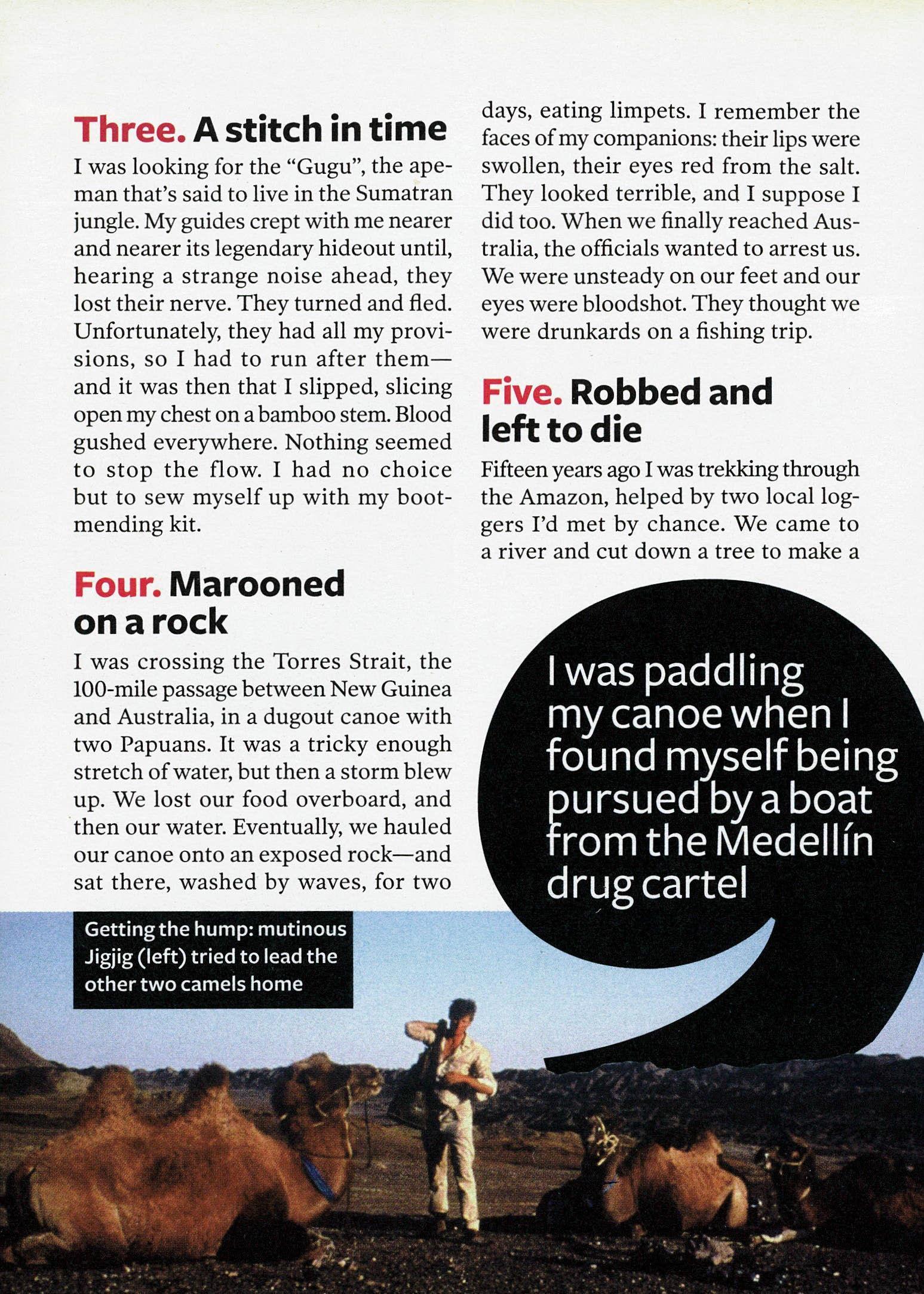
days, eating limpets. I remember the faces of my companions: their lips were swollen, their eyes red from the salt. They looked terrible, and I suppose I did too. When we finally reached Australia, the officials wanted to arrest us. We were unsteady on our feet and our eyes were bloodshot. They thought we were drunkards on a fishing trip.
Five. Robbed and left to die
Fifteen years ago I was trekking through the Amazon, helped by two local loggers I'd met by chance. We came to a river and cut down a tree to make a
I was paddling my canoe when found myself being
f ursued by a boat rom the Medellin drug cartel
bridge. The men took my bags over and I was just about to get on the tree trunk myself when they kicked the tree away and walked off, having robbed me of everything. I was 100 miles from the outside world, and really didn't stand a chance without getting back my food. So, although the men had guns, there was nothing for it but to track them down. Finally, I reached their camp, sneaked in and grabbed one bag. Now I had a fighting chance.
Six. Camel mutiny
Thirteen days into the Gobi desert, one of my three camels, a cunning beast called Jigjig, decided to lead the other two camels home. This would have been catastrophic: they carried my food and water. My life depended on getting the other two camels to obey and follow me, rather than the treacherous Jigjig. It was a tense but ridiculous moment—me pulling one way, Jigjig pulling the other. The two other camels wavered, wondering who to follow. Finally, they walked off with me, leaving Jigjig alone, bellowing furiously in the desert.
All was well on the Bering Strait—until Benedict lost his dogs...

Seven. Shot at by a drug gang
I was paddling my canoe through the Colombian forests when I found myself being pursued by a boat from the Medellin drug cartel. Perhaps their boss, drug lord Pablo Escobar, was hiding out nearby. The men began firing— and I was an easy target, roughly 30 yards away. I paddled furiously. It was terrifying: I was waiting for the impact of a bullet in my back. But nothing. I looked over my shoulder—and discovered that these assassins couldn't paddle a boat and kill someone at the same time. They'd totally lost the plot, and were going around in circles! I jumped into the forest.
Eight. Losing my dogs
On my last expedition I trained a dog team with the help of the indigenous Chukchis and then attempted to cross the semi-frozen Bering Strait, the 50mile gap between Russia and Alaska. Off the dogs and I went into the shifting pack-ice towards America. It was a labyrinth of grinding, creaking >
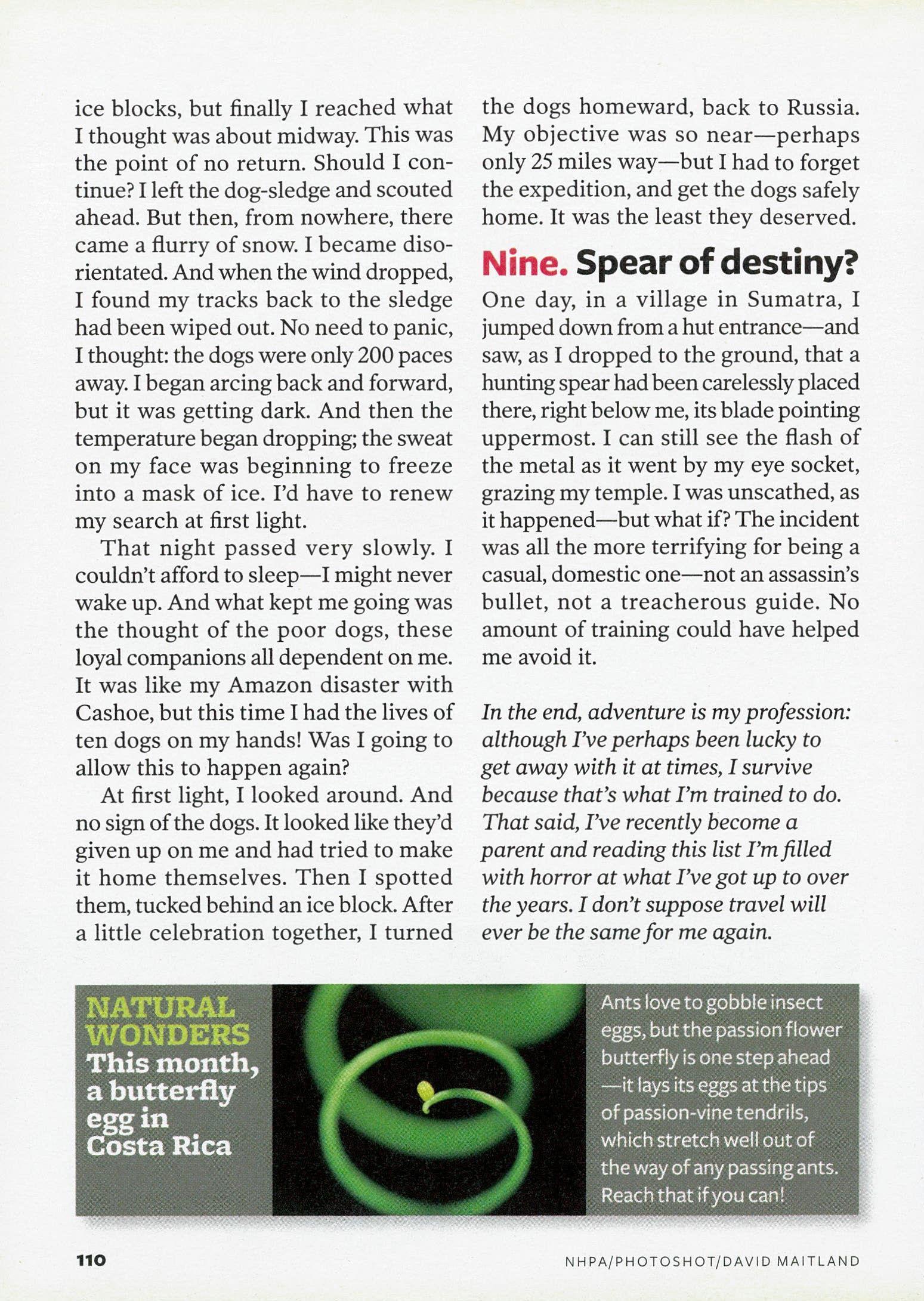
ice blocks, but finally I reached what I thought was about midway. This was the point of no return. Should I continue? I left the dog-sledge and scouted ahead. But then, from nowhere, there came a flurry of snow. I became disorientated. And when the wind dropped, I found my tracks back to the sledge had been wiped out. No need to panic, I thought: the dogs were only 200 paces away. I began arcing back and forward, but it was getting dark. And then the temperature began dropping; the sweat on my face was beginning to freeze into a mask of ice. I'd have to renew my search at first light.
That night passed very slowly. I couldn't afford to sleep—I might never wake up. And what kept me going was the thought of the poor dogs, these loyal companions all dependent on me. It was like my Amazon disaster with Cashoe, but this time I had the lives of ten dogs on my hands! Was I going to allow this to happen again?
At first light, I looked around. And no sign of the dogs. It looked like they'd given up on me and had tried to make it home themselves. Then I spotted them, tucked behind an ice block. After a little celebration together, I turned
the dogs homeward, back to Russia. My objective was so near—perhaps only 25 miles way—but I had to forget the expedition, and get the dogs safely home. It was the least they deserved.
Nine. Spear of destiny?
One day, in a village in Sumatra, I jumped down from a but entrance—and saw, as I dropped to the ground, that a hunting spear had been carelessly placed there, right below me, its blade pointing uppermost. I can still see the flash of the metal as it went by my eye socket, grazing my temple. I was unscathed, as it happened—but what if? The incident was all the more terrifying for being a casual, domestic one—not an assassin's bullet, not a treacherous guide. No amount of training could have helped me avoid it.
In the end, adventure is my profession: although I've perhaps been lucky to get away with it at times, I survive because that's what I'm trained to do. That said, I've recently become a parent and reading this list I'm filled with horror at what I've got up to over the years. I don't suppose travel will ever be the same for me again.
Ants love to gobble insect eggs, but the passion flower butterfly is one step ahead —it lays its eggs at the tips of passion-vine tendrils, which stretch well out of the way of any passing ants. „each that if you can!
110 NHPA/PHOTOSHOT/DAVID MAITLAND
"Do you need a yogurt drink with a difference?"
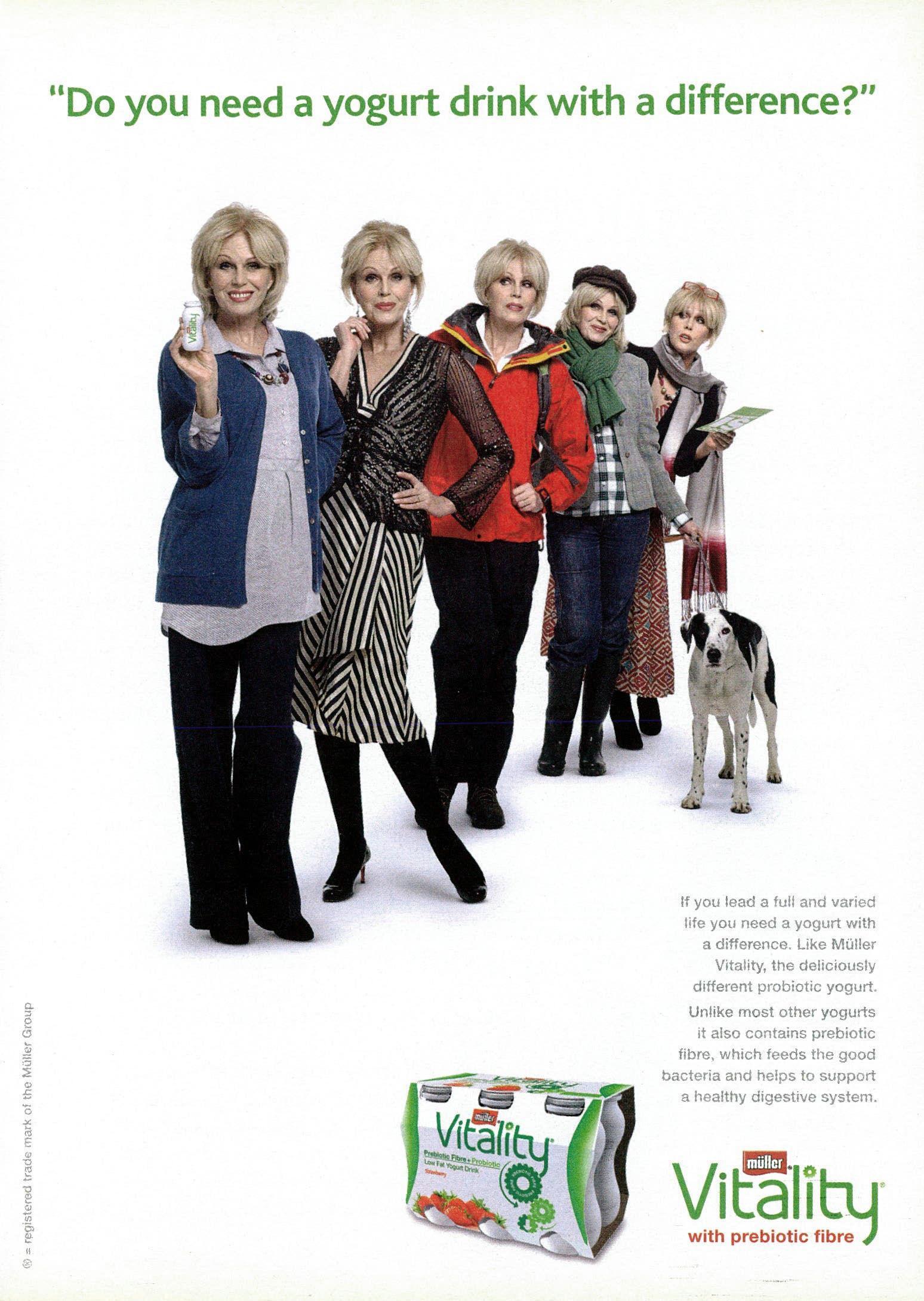
If you lead a full and varied life you need a yogurt with a difference. Like Miller Vitality, the deliciously different probiotic yogurt. Unlike most other yogurts it also contains prebiotic fibre, which feeds the good bacteria and helps to support a healthy digestive system. Vitality with prebiotic fibre
= reg is tere d tra de mar k o f the M O
A Reader's Story "My face wasrebuilt"
An amazing charity helped me face up to the future, says Emily Holden, 21
It's been about seven months since the accident,but I can still remember the first time I looked at myself in the mirror. It was like a scene from a horror film. My head was swollen beyond belief. My blind eye was bandaged, while the working one was red and bloodshot. My mouth was full of metal, my body skeletal. It was like a stranger staring back at me.
Before then, like any 21-yearold woman, I
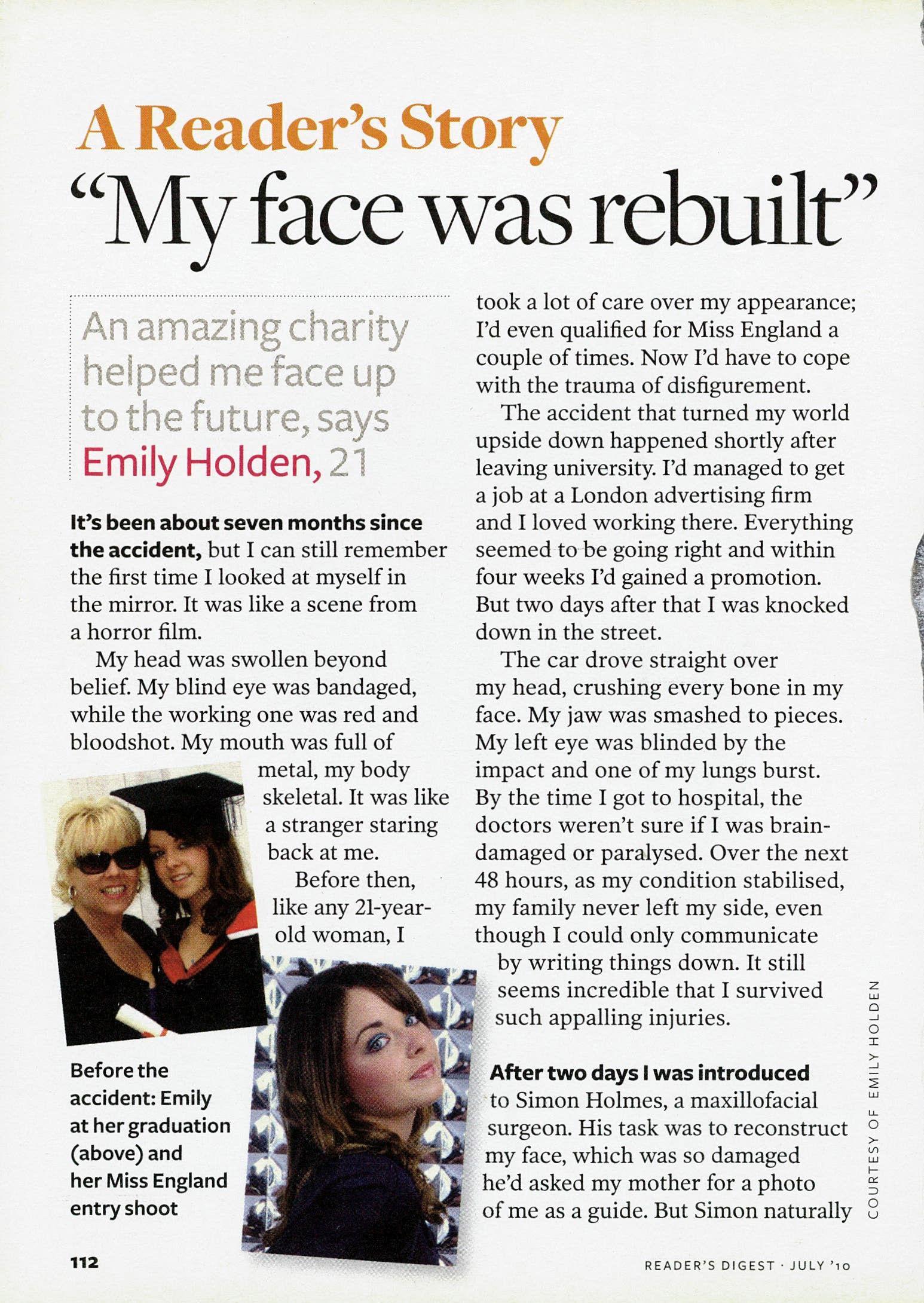
Before the accident: Emily at her graduation (above) and her Miss England entry shoot
took a lot of care over my appearance; I'd even qualified for Miss England a couple of times. Now I'd have to cope with the trauma of disfigurement.
The accident that turned my world upside down happened shortly after leaving university. I'd managed to get a job at a London advertising firm and I loved working there. Everything seemed to be going right and within four weeks I'd gained a promotion. But two days after that I was knocked down in the street.
The car drove straight over my head, crushing every bone in my face. My jaw was smashed to pieces. My left eye was blinded by the impact and one of my lungs burst. By the time I got to hospital, the doctors weren't sure if I was braindamaged or paralysed. Over the next 48 hours, as my condition stabilised, my family never left my side, even though I could only communicate by writing things down. It still seems incredible that I survived such appalling injuries.
After two days I was introduced to Simon Holmes, a maxillofacial surgeon. His task was to reconstruct my face, which was so damaged he'd asked my mother for a photo of me as a guide. But Simon naturally
COU RTESY OF EMILY HOLDEN
112 READER'S DIGEST • JULY '10
Emily today (sitting, in the blue cardigan) withvolunteers fromthe Saving
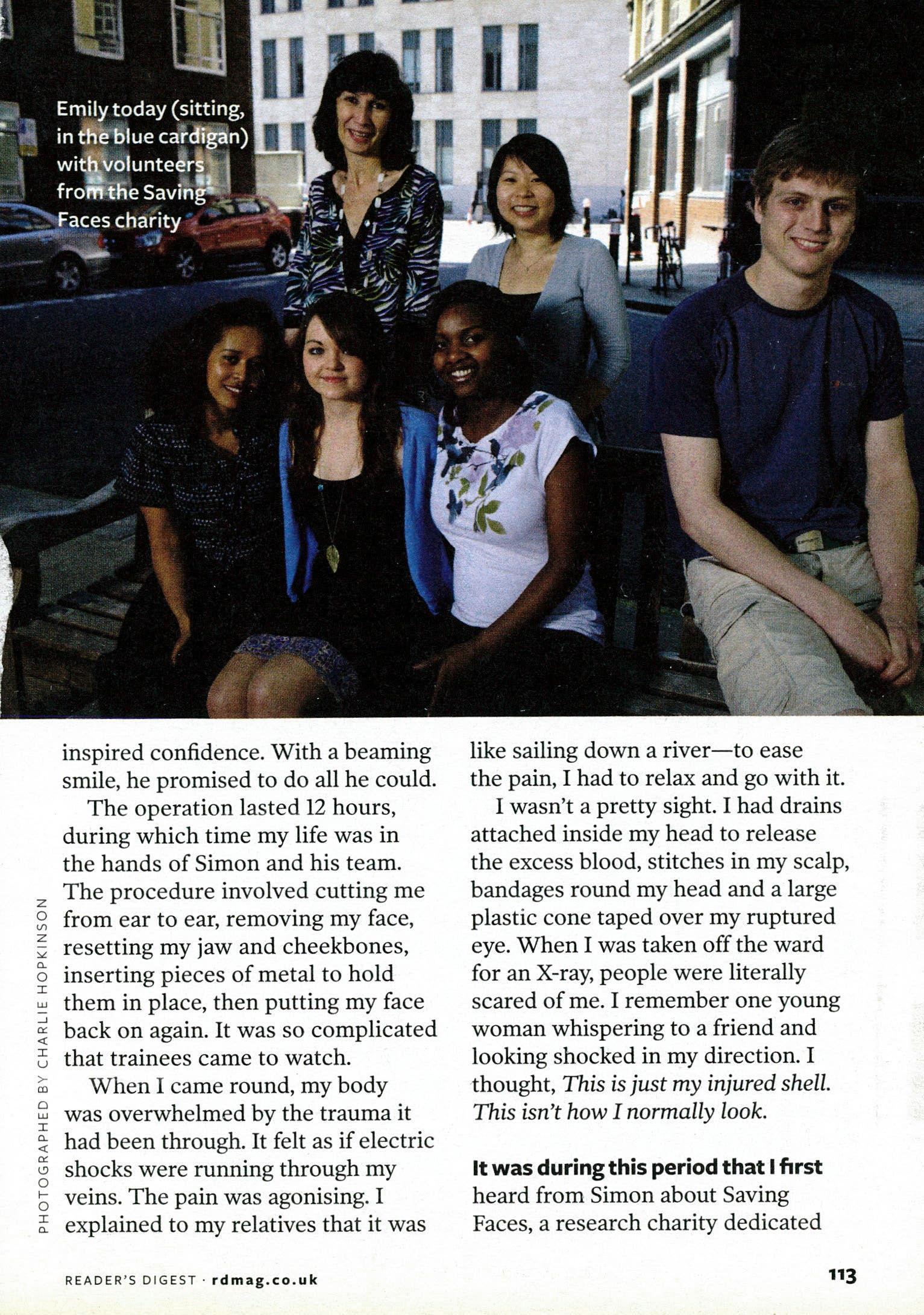
inspired confidence. With a beaming smile, he promised to do all he could.
The operation lasted 12 hours, during which time my life was in the hands of Simon and his team. The procedure involved cutting me from ear to ear, removing my face, resetting my jaw and cheekbones, inserting pieces of metal to hold them in place, then putting my face back on again. It was so complicated that trainees came to watch.
When I came round, my body was overwhelmed by the trauma it had been through. It felt as if electric shocks were running through my veins. The pain was agonising. I explained to my relatives that it was
like sailing down a river—to ease the pain, I had to relax and go with it.
I wasn't a pretty sight. I had drains attached inside my head to release the excess blood, stitches in my scalp, bandages round my head and a large plastic cone taped over my ruptured eye. When I was taken off the ward for an X-ray, people were literally scared of me. I remember one young woman whispering to a friend and looking shocked in my direction. I thought, This is just my injured shell. This isn't howl normally look.
It was during this period that I first heard from Simon about Saving Faces, a research charity dedicated
• PHO TO GRAPHED BY C HARLIE HO PKINSO N
READER'S DIGEST rdmag.co.uk
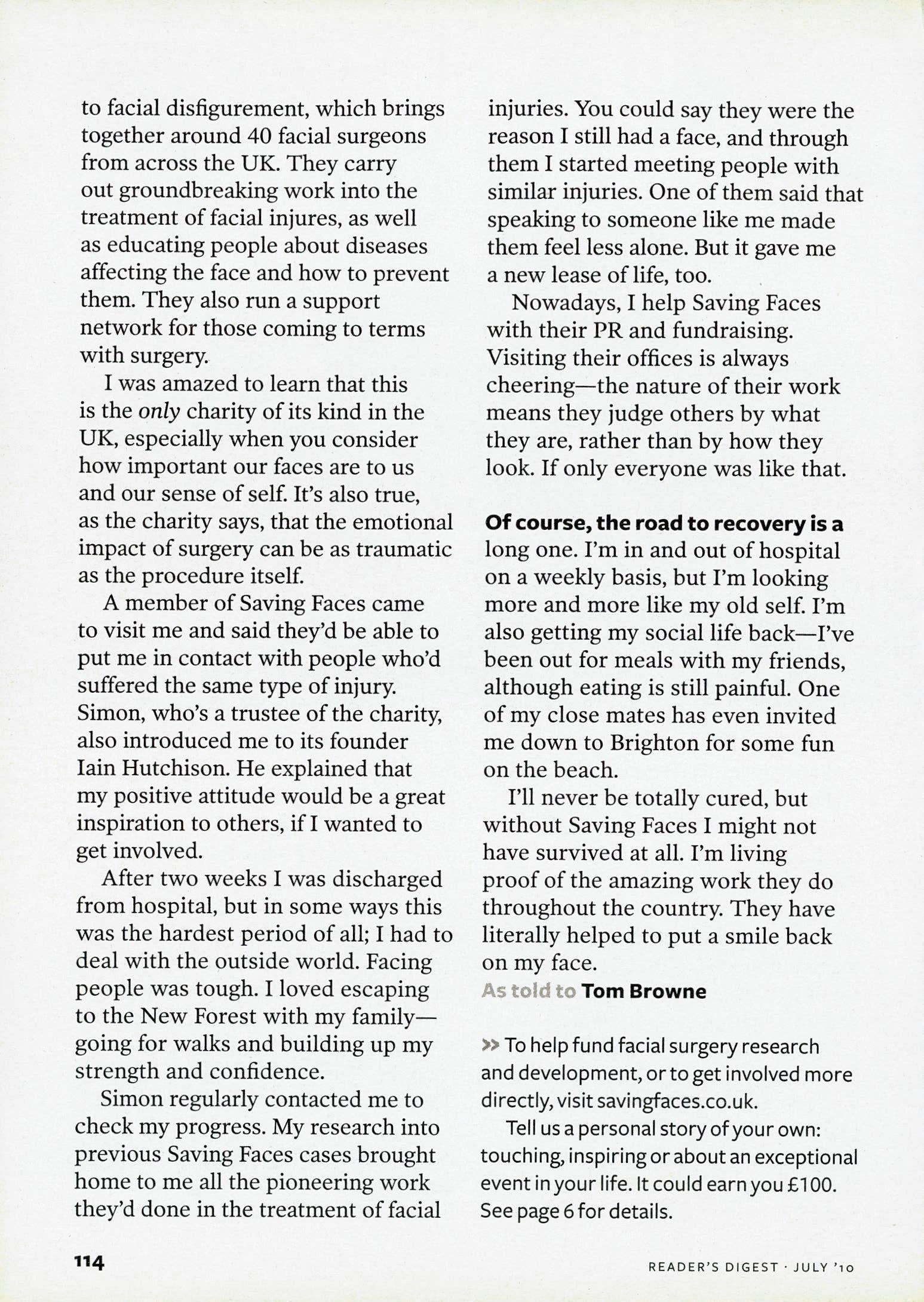
to facial disfigurement, which brings together around 40 facial surgeons from across the UK. They carry out groundbreaking work into the treatment of facial injures, as well as educating people about diseases affecting the face and how to prevent them. They also run a support network for those coming to terms with surgery.
I was amazed to learn that this is the only charity of its kind in the UK, especially when you consider how important our faces are to us and our sense of self. It's also true, as the charity says, that the emotional impact of surgery can be as traumatic as the procedure itself.
A member of Saving Faces came to visit me and said they'd be able to put me in contact with people who'd suffered the same type of injury.
Simon, who's a trustee of the charity, also introduced me to its founder lain Hutchison. He explained that my positive attitude would be a great inspiration to others, if I wanted to get involved.
After two weeks I was discharged from hospital, but in some ways this was the hardest period of all; I had to deal with the outside world. Facing people was tough. I loved escaping to the New Forest with my family— going for walks and building up my strength and confidence.
Simon regularly contacted me to check my progress. My research into previous Saving Faces cases brought home to me all the pioneering work they'd done in the treatment of facial
injuries. You could say they were the reason I still had a face, and through them I started meeting people with similar injuries. One of them said that speaking to someone like me made them feel less alone. But it gave me a new lease of life, too.
Nowadays, I help Saving Faces with their PR and fundraising. Visiting their offices is always cheering—the nature of their work means they judge others by what they are, rather than by how they look. If only everyone was like that.
Of course, the road to recovery is a long one. I'm in and out of hospital on a weekly basis, but I'm looking more and more like my old self. I'm also getting my social life back—I've been out for meals with my friends, although eating is still painful. One of my close mates has even invited me down to Brighton for some fun on the beach.
I'll never be totally cured, but without Saving Faces I might not have survived at all. I'm living proof of the amazing work they do throughout the country. They have literally helped to put a smile back on my face.
As told toTom Browne
>> To help fund facial surgery research and development, or to get involved more directly, visit savingfaces.co.uk.
Tell us a personal story of your own: touching, inspiring or about an exceptional event in your life. It could earn you £100. See page 6 for details.
114 READER'S DIGEST • JULY '10
Which EXPOSED: TRAVEL INSURANCE FROM TRAVEL AGENTS

Should you give travel agents' insurance a wide berth? Find out in the June issue of Which?
Your travel agent may find you a great deal on a two-week break in the sun. But when it comes to your travel insurance it pays to shop elsewhere. For the June issue of Which? magazine, we sent undercover researchers to 29 travel agents. They were all offered overpriced insurance and less than half were given the full details of cover. Many agents failed to mention important exclusions — which means that your insurance company may not pay out if you make a claim.
Protect yourself with the facts
Which? investigates the issues that matter to consumers. We are completely independent — we don't work for anyone but you. That means that we're free to tell the truth. Our reports give you the information you need to avoid the scams, over-claims, and plain old rip-offs.
Every issue contains in-depth reports that make for fascinating reading. You'll also find detailed
product reviews, revealing the Best Buys and Don't Buys on anything from cars to coffee makershelping you make smarter buying choices.
Get Which? on your side for just £2
Why not put Which? to the test with our special trial offer? Receive the next two issues of the magazine for just £2 and find out for yourself what makes Which? such compulsive reading. We think you'll be hooked. But if you're not, don't worry — there's no obligation.
Uncover the truth in Which? magazine when you try 2 issues for £2
".46.9411ATED "ara■COMING UP: Why low-frills flights aren't always the cheapest WHICH11 call 0800 533 026 which
WELCOME TO THE PAGES THAT HELP MAKE LIFE SIMPLER, EASIER AND, WE HOPE, MORE FUN! STARTING HERE WITH...

...I in peace
NOISE IS AS UNWELCOME IN THE GARDEN AS WEEDS, the difference beingthatyou can't put weedkiller on next door's teenagers, or their dog. Loud music and barking top the list of noise complaints, says Mary Stevens, policy officer from Environmental Protection UK, but at this time of year there are plenty more. New grumbles concern leaf blowers, trampolines, "hot tub antics" and the ever-increasing number of outdoor events. Throw in the constant thrum of traffic and planes, and it's clear that, whatever the law says, we have no right to 1,001 things... remain silent. is compiled
There are limits on the real din-makers—flights, vehicles and written and commercial premises—and ways to complain about traffic by Linda Gray noise (contact the Highways Agency) or a ruckus in the street
CARO/ A LAMY 116 READER'S DIGEST • JULY ',o
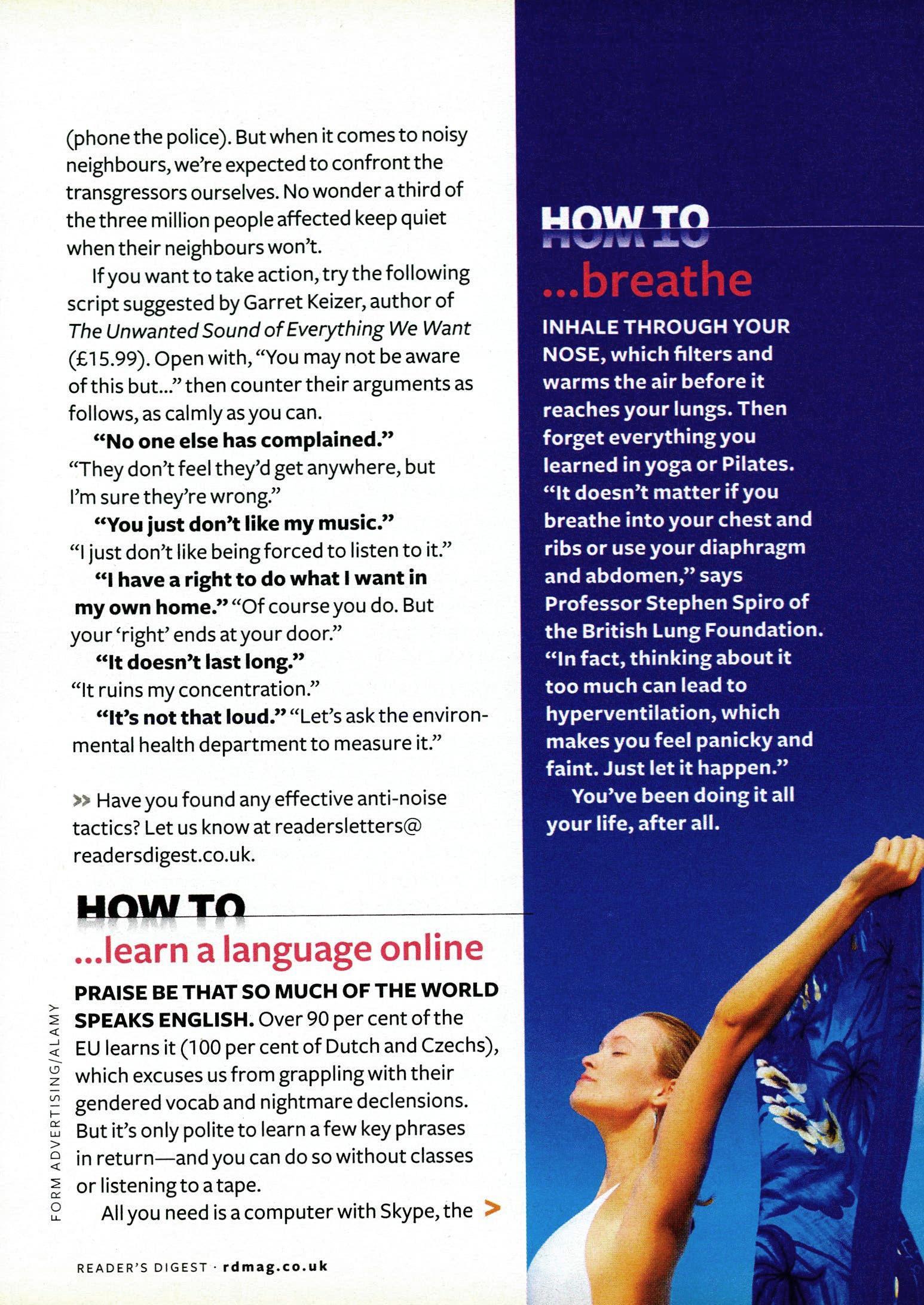
(phone the police). But when it comes to noisy neighbours, we're expected to confront the transgressors ourselves. No wonder a third of the three million people affected keep quiet when their neighbours won't.
If you want to take action, try the following script suggested by Garret Keizer, author of TheUnwanted Sound of Everything We Want (El 5.99). Open with, "You may not be aware of this but..." then counter their arguments as follows, as calmly as you can.
"No one else has complained." "They don't feel they'd get anywhere, but I'm sure they're wrong."
"You just don't like my music." "Ijust don't like being forced to listen to it."
"I have a right to do what I want in my own home.""Of course you do. But your `right' ends at your door."
"It doesn't last long." "It ruins my concentration."
"It's not that loud.""Let's ask the environmental health department to measure it."
>> Have you found any effective anti-noise tactics? Let us know at readersletters@ readersdigest.co.uk.
HAW TA
...learn a language online
PRAISE BE THAT SO MUCH OF THE WORLD SPEAKS ENGLISH. Over 90 per cent of the EU learns it (100 per cent of Dutch and Czechs), which excuses us from grappling with their gendered vocab and nightmare declensions. But it's only polite to learn a few key phrases in return—and you can do so without classes or listening to a tape.
All you need is a computer with Skype, the >
..breathe
INHALE THROUGH YOUR NOSE, which filters and warms the air before it reaches your lungs. Then forget everything you learned in yoga or Pilates. "It doesn't matter if you breathe into your chest and ribs or use your diaphragm and abdomen," says Professor Stephen Spiro of the British Lung Foundation. "In fact, thinking about it too much can lead to hyperventilation, which makes you feel panicky and faint. Just let it happen." You've been doing it all your life, after all.
a %oat sr .111010
F O RM A D VE RTI S ING/ ALA MY
READER'S DIGEST rdmag.co.uk
internet videophone that's free to download and use. Then him a 1 nnkl ( inG11 sign up to an agency such as verbalplanet.com, where you'll gm mom find 300 tutors teaching 20 languages for around £20 an hour. They're all star-rated and the first lesson is often free. It's even cheaper—only £8 an hour—to learn Spanish with 1to1languages.com, but their tutors are Colombian, so you may end up with a South American accent.
Ifyou want an online tutor, look for a Lancelot-qualified one (Language Learning with Certified Online Trainers) who understands how the system works. And ifyou just want to brush upyour vocab, try languagehelpers.com compiled by volunteers, orthe free courses on the BBC website—the "Cool" sections will makeyou street-smart in four languages.
idanifu
rn
...avoid cheap air traps
airline will make its profit another way. If you let them. "You can't afford to make a single mistake when buying tickets," he warns.

CLICK ON TO !HATE RYANAIR.CO.UKand you'll be amazed the airline is still in business. But no onemakes you fly Ryanair, points out Simon Calder, travel journalist and author of NoFrills (Virgin, £9.99): "I use them because I know I'll get where I'm going safely, cheaply and reliably." No, he's not on the payroll. He simply accepts that ifyou're flyingfor the price of a bus fare, the
• Avoid credit card charges—save £10 (ES each way) by paying with the specified cards. Bmibaby, easyJet, Flybe and Jett ask for Visa Electron, while Ryanair insists on a Mastercard prepaid debit card.
• Reduce check-in charges—save £40.That's what Ryanair docks you if you fail to print outyour boarding pass. And if you're going away for a month, find an internet cafe before you fly home as Ryanair won't letyou check in more than 15 days ahead.
• Beat baggage restrictions—save £80. You'll pay double to check
in your cases at the airport, so do it online. Even then it costs youeach way—up to £20 for 15kg with Ryanair. If you're goingfor a short break, cram everything into your cabin bag (easyJet sets no weight limit) and wear your cold-weather clothes.
• Ditch fast boarding— save £10.First on the bus is often last on the plane.
• Decline travel insurance—save £9.
• Take a picnic—save £12 and your digestion.
• Get compensation for a cancelled flight— save £1000s.Don't accept a refund! Ifyour flight is with an EU airline (or flying from the EU) you can insist they find you another. You can also claim for meals and accommodation if you're stranded, says the Air Traffic Users Council.
MITI. pooh* yOur 0,1,101,,,R1%,fid 604 amoa
VARIO IMAGES GMBH @ CO. KG/ ALAMY 118 READER'S DIGEST • JULY '10
Aviv it Mks
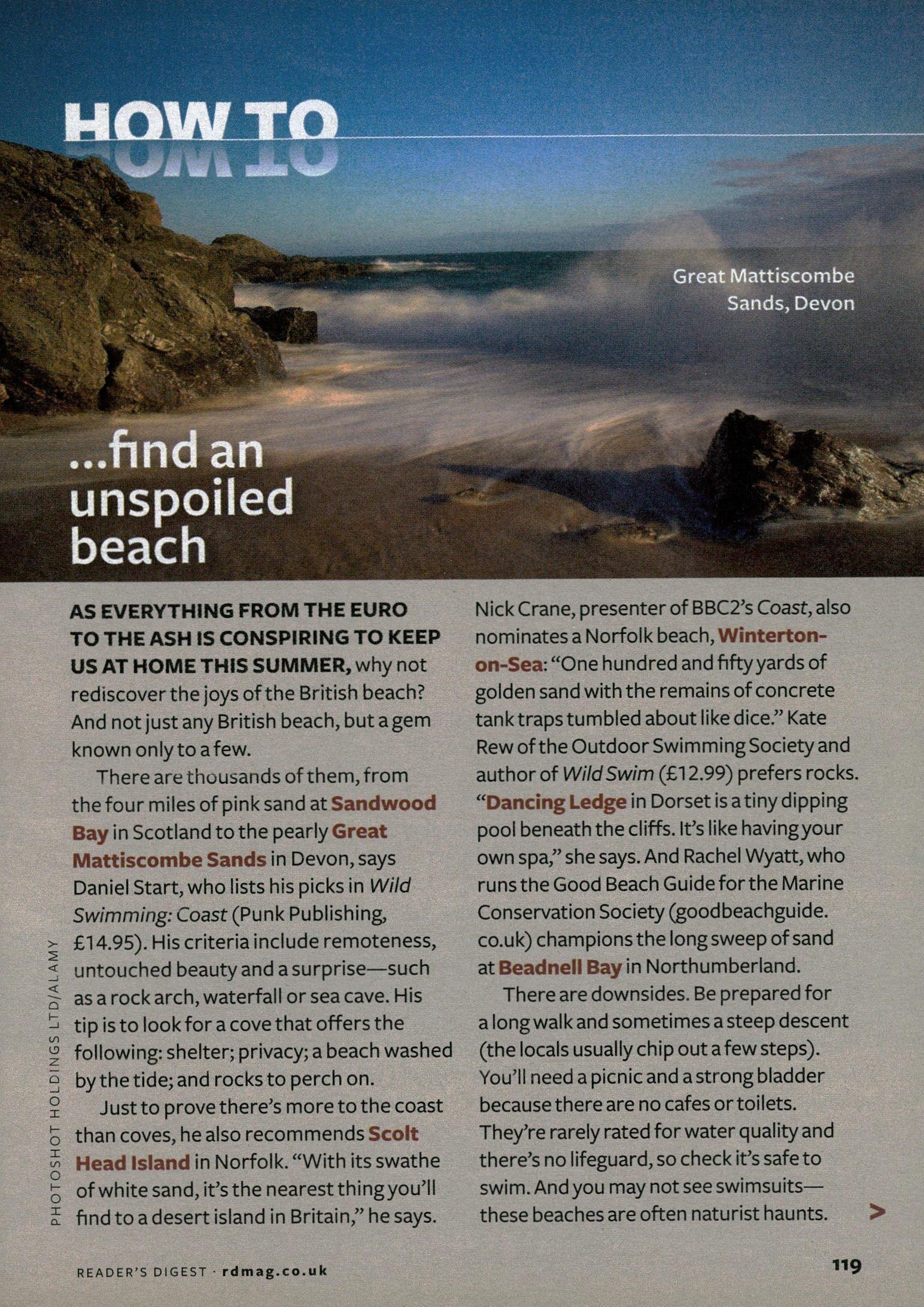
...find an unspoiled beach
AS EVERYTHING FROM THE EURO TO THE ASH IS CONSPIRING TO KEEP US AT HOME THIS SUMMER,why not rediscover the joys of the British beach? And not just any British beach, but a gem known only to a few.
There are thousands of them, from the four miles of pink sand atSandwood Bayin Scotland to the pearlyGreat Mattiscombe Sands inDevon, says Daniel Start, who lists his picks in Wild Swimming: Coast (Punk Publishing, £14.95). His criteria include remoteness, untouched beauty and a surprise—such6- as a rock arch, waterfall or sea cave. His ti tip is to look for a cove that offers the following: shelter; privacy; a beach washed by the tide; and rocks to perch on.
Just to prove there's more to the coast l E ) than coves, he also recommends Scolt Head Islandin Norfolk. "With its swathe 0 of white sand, it's the nearest thingyou'll find to a desert island in Britain," he says.
Nick Crane, presenter of BBC2's Coast, also nominates a Norfolk beach,Wintertonon-Sea:"One hundred and fifty yards of golden sand with the remains of concrete tank traps tumbled about like dice." Kate Rew of the Outdoor Swimming Society and author ofWild Swim (£12.99) prefers rocks. "Dancing Ledgein Dorset is a tiny dipping pool beneath the cliffs. It's like havingyour own spa," she says. And Rachel Wyatt, who runs the Good Beach Guide for the Marine Conservation Society (goodbeachguide. co.uk) champions the long sweep of sand atBeadnell Bayin Northumberland.
There are downsides. Be prepared for a longwalk and sometimes a steep descent (the locals usually chip out a few steps). You'll need a picnic and a strong bladder because there are no cafes or toilets. They're rarely rated for water quality and there's no lifeguard, so check it's safe to swim. And you may not see swimsuits— these beaches are often naturist haunts. >
Great Mattiscombe Sands, Devon
READER'S DIGEST rdmag.co.uk 119
THE GREY-FACED MAN CLUTCHING HIS CHEST
What your ...save a life waiter won't tell you
and the woman choking on her pizza could owe their lives to you. All you need is a little knowledge and a willingness to intervene, says St John Ambulance, which reckons that 150,000 lives a year are lost because we hang back. "Give it a go," urges training manager Clive James. "If someone's not breathing, they have only four minutes until the brain starts to die—and an ambulance takes at least eight." Just remember to call 999 too.
1.Passed-out partygoer.Asphyxiation is the most easily preventable cause of death, says James, so put them on their side in the recovery position.
2. Heart attack at home.Keep aspirin in the cupboard (Nurofen won't do). If they turn pale, feel a crushing pain in the shoulder or chest and start sweating, give them 300mg.
3.Horror-film bleeding.Apply pressure to the wound with a clean cloth and if the blood keeps coming, pile on more cloths. Don't attempt to remove anything embedded in the wound—work around it. Keep the affected area elevated.
4, Cafe killer.Choking kills around 180 people a year, but five purposeful slaps on the back are usually enough to dislodge rogue food.
5.No pulse.Shout fora defibrillator—they're in most shopping malls—and give 30 chest compressions plus two mouth-to-mouth breaths. There's rarely an instant response, so keep going.
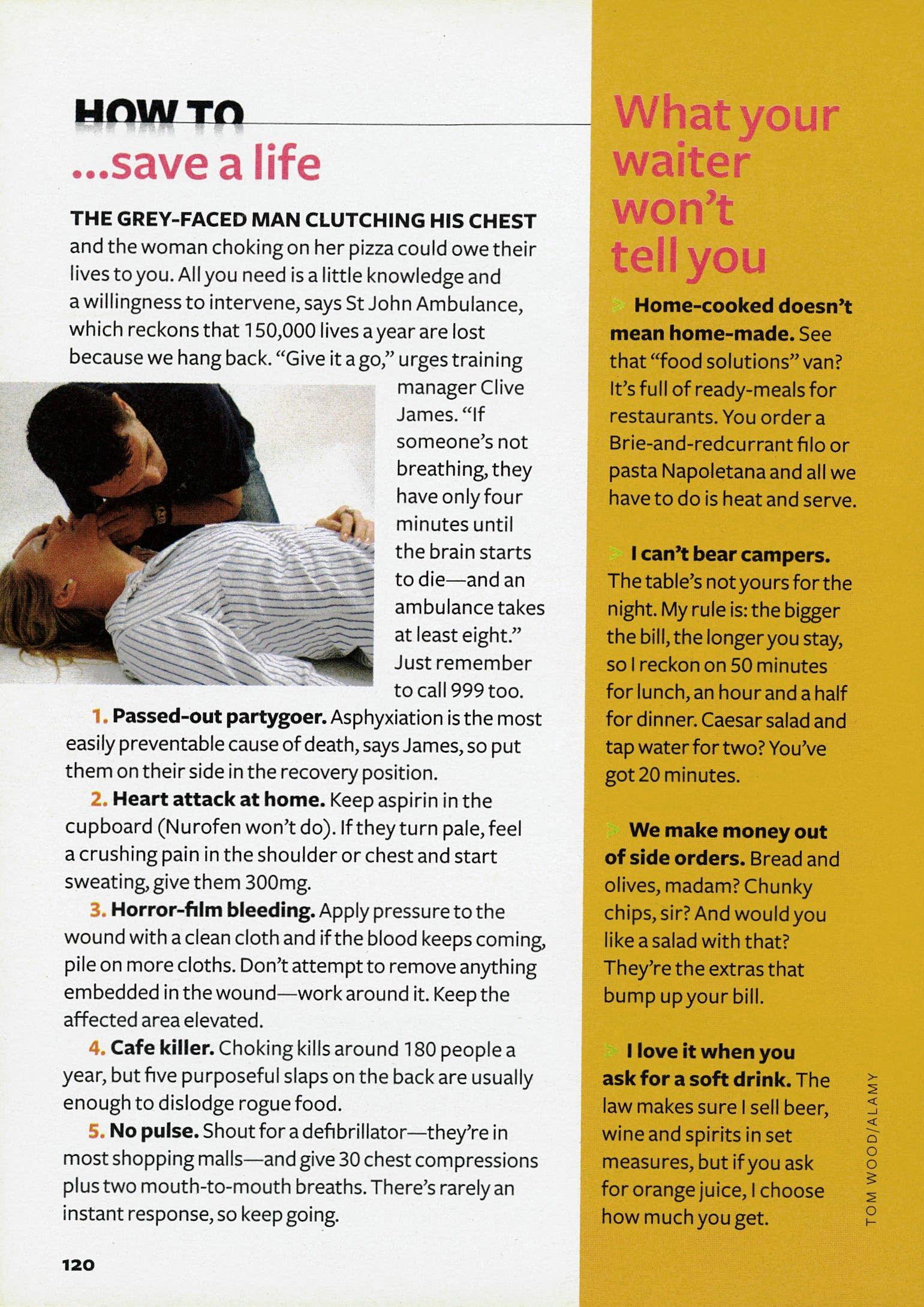
Home-cooked doesn't mean home-made.See that "food solutions" van? It's full of ready-meals for restaurants. You order a Brie-and-redcurrant fib or pasta Napoletana and all we have to do is heat and serve.
I can't bear campers. The table's notyours for the night. My rule is: the bigger the bill, the longeryou stay, so I reckon on 50 minutes for lunch, an hour and a half for dinner. Caesar salad and tap water for two? You've got 20 minutes.
We make money out of side orders.Bread and olives, madam? Chunky chips, sir? And would you like a salad with that? They're the extras that bump upyour bill.
I love it when you ask for a soft drink.The law makes sure I sell beer, wine and spirits in set measures, but if you ask for orange juice, I choose how much you get.
114(11ATel
TOM WOOD/
120
ALAMY
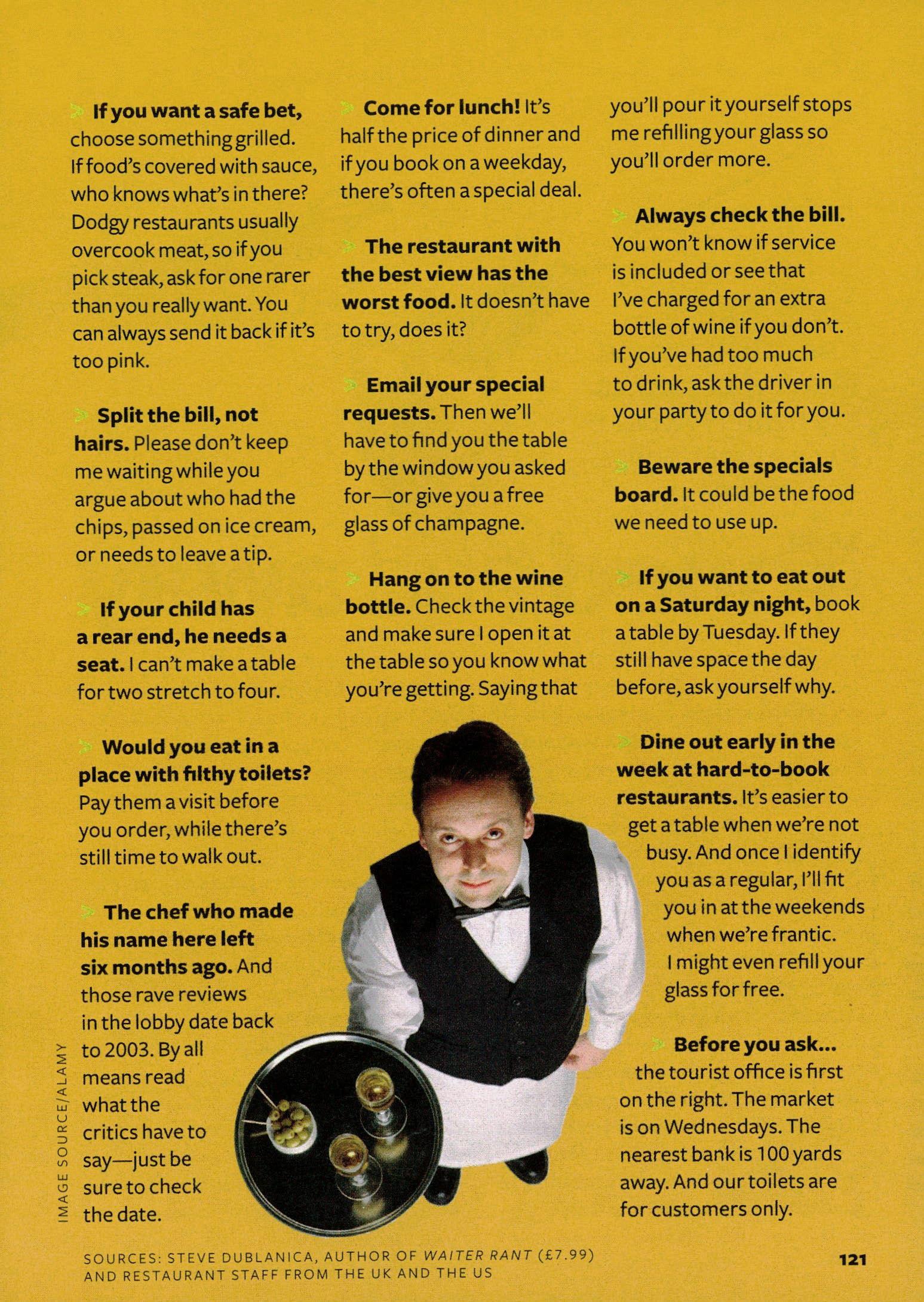
I
If you want a safe bet, choose something grilled. If food's covered with sauce, who knows what's in there? Dodgy restaurants usually overcook meat, so if you pick steak, ask for one rarer than you really want. You can always send it back if it's too pink.
Split the bill, not hairs.Please don't keep me waiting while you argue about who had the chips, passed on ice cream, or needs to leave a tip.
If your child has a rear end, he needs a seat.I can't make a table for two stretch to four.
Would you eat in a place with filthy toilets? Pay them a visit before you order, while there's still time to walk out.
The chef who made his name here left six months ago.And those rave reviews in the lobby date back to 2003. By all means read what the critics have to say—just be sure to check the date.
Come for lunch!It's half the price of dinner and if you book on a weekday, there's often a special deal.
The restaurant with the best view has the worst food.It doesn't have to try, does it?
Email your special requests.Then we'll have to find you the table by the window you asked for—or give you a free glass of champagne.
Hang on to the wine bottle.Check the vintage and make sure I open it at the table so you know what you're getting. Saying that
you'll pour ityourself stops me refilling your glass so you'll order more.
Always check the bill. You won't know if service is included or see that I've charged for an extra bottle of wine if you don't. If you've had too much to drink, ask the driver in your party to do it for you.
Beware the specials board.It could be the food we need to use up.
If you want to eat out on a Saturday night,book a table by Tuesday. If they still have space the day before, ask yourself why.
Dine out early in the week at hard-to-book restaurants.It's easier to get a table when we're not busy. And once I identify you as a regular, I'll fit you in at the weekends when we're frantic. I might even refill your glass for free.
Before you ask... the tourist office is first on the right. The market is on Wednesdays. The nearest bank is 100 yards away. And our toilets are for customers only.
MAGE SOU RCE/ A LAMY
SOURCES: STEVE DUBLANICA, AUTHOR OF WAITER RANT (E7.99) AND RESTAURANT STAFF FROM THE UK AND THE US
121
Just hanging out— windsurfing is a great calorie burner
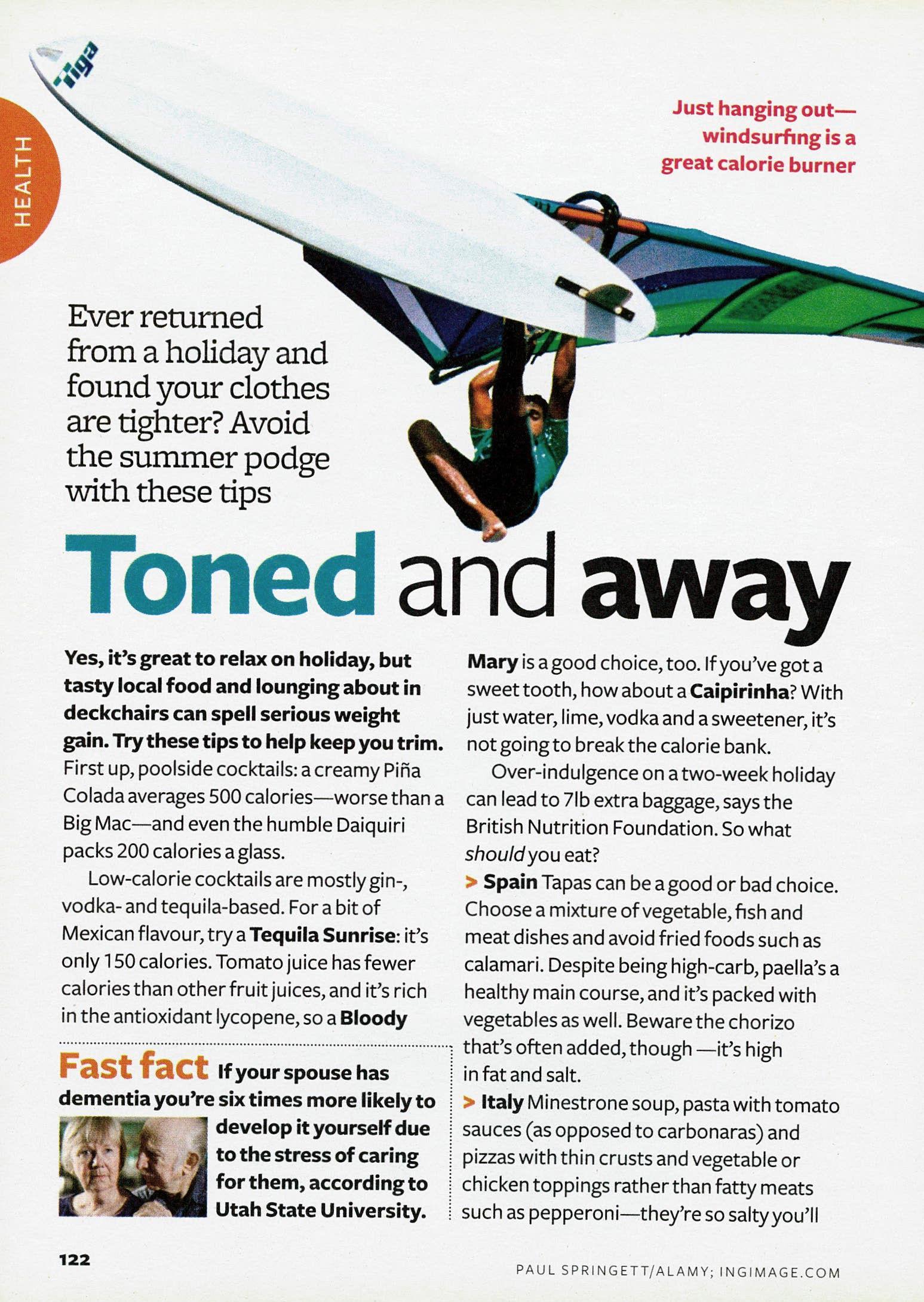
Ever returned from a holiday and found your clothes are tighter? Avoid the summer podge with these tips
Tonedandaway
Yes, it's great to relax on holiday, but tasty local food and lounging about in deckchairs can spell serious weight gain. Try these tips to help keep you trim. First up, poolside cocktails: a creamy Piña Colada averages 500 calories—worse than a Big Mac—and even the humble Daiquiri packs 200 calories a glass.
Low-calorie cocktails are mostly gin-, vodka- and tequila-based. For a bit of Mexican flavour, try aTequila Sunrise:it's only 150 calories. Tomato juice has fewer calories than other fruit juices, and it's rich in the antioxidant lycopene, so aBloody
Fast fact If your spouse has dementia you're six times more likely to develop it yourself due to the stress of caring for them, according to Utah State University.
Maryis a good choice, too. If you've got a sweet tooth, how about aCaipirinha?With just water, lime, vodka and a sweetener, it's not goingto break the calorie bank.
Over-indulgence on a two-week holiday can lead to 71b extra baggage, says the British Nutrition Foundation. So what should you eat?
> SpainTapas can be a good or bad choice. Choose a mixture of vegetable, fish and meat dishes and avoid fried foods such as calamari. Despite being high-carb, paella's a healthy main course, and it's packed with vegetables as well. Beware the chorizo that's often added, though —it's high in fat and salt.
> ItalyMinestrone soup, pasta with tomato sauces (as opposed to carbonaras) and pizzas with thin crusts and vegetable or chicken toppings rather than fatty meats such as pepperoni—they're so saltyyou'll
122
PAUL SPRINGETT/ALAMY INGIMAGE.COM
end up drinking more,too.
> GreeceStuffed vine leaves, hummus and tzatziki are fine, but skip taramasalata. For mains, choose chicken or fish souvlaki and Greek salad. Steer clear of moussaka: the fried mince and béchamel sauce make it a calorific minefield.
> FranceAvoid the garlic bread and pastries on offer. Instead, choose moules mariniere and grilled steaks (high in protein), or French onion soup, as opposed to creamier options.
Holidays are a great opportunity toget some exercise and have fun too:
> Swimming burns around io calories a minute, but this is increased in the sea thanks to extra resistance from the waves.
> Even better isjoggingin the sea—runningthrough water helps tighten your abs!
> Beach football is fun, and the sand's uneven surface means you'll be using 20-50 per cent more calories than if you were on a flat surface.
8 > Windsurfingburns up to 500 calories an hour, and 2 learning how to balance will strengthen your abs, legs LL and shoulders.
5 stepsto better lungpower
HAVE SPAGHETTI ...with tomato sauce. Research from Nottingham University found that people who ate tomatoes three times a week had improved lungfunction and less wheeziness.
TAKE THE STAIRS
Exercise that makes your heart beat faster, such as climbing stairs or riding a bike, keeps your lungs in shape. Studies show that walking for 15 minutes, three to four times a day, improved breathing in people with emphysema.
BRUSH
YOUR TEETH Research shows that people with gum disease are 11/2times more likely to have chronic obstructive pulmonary disease, a lung disease affecting mainly the over-65s. You're 70 per cent more likely to suffer heart problems, too.
BE OPTIMISTIC
Harvard researchers followed 670 men aged 63 for eight years and found that the optimists had better lungfunction than the pessimists.
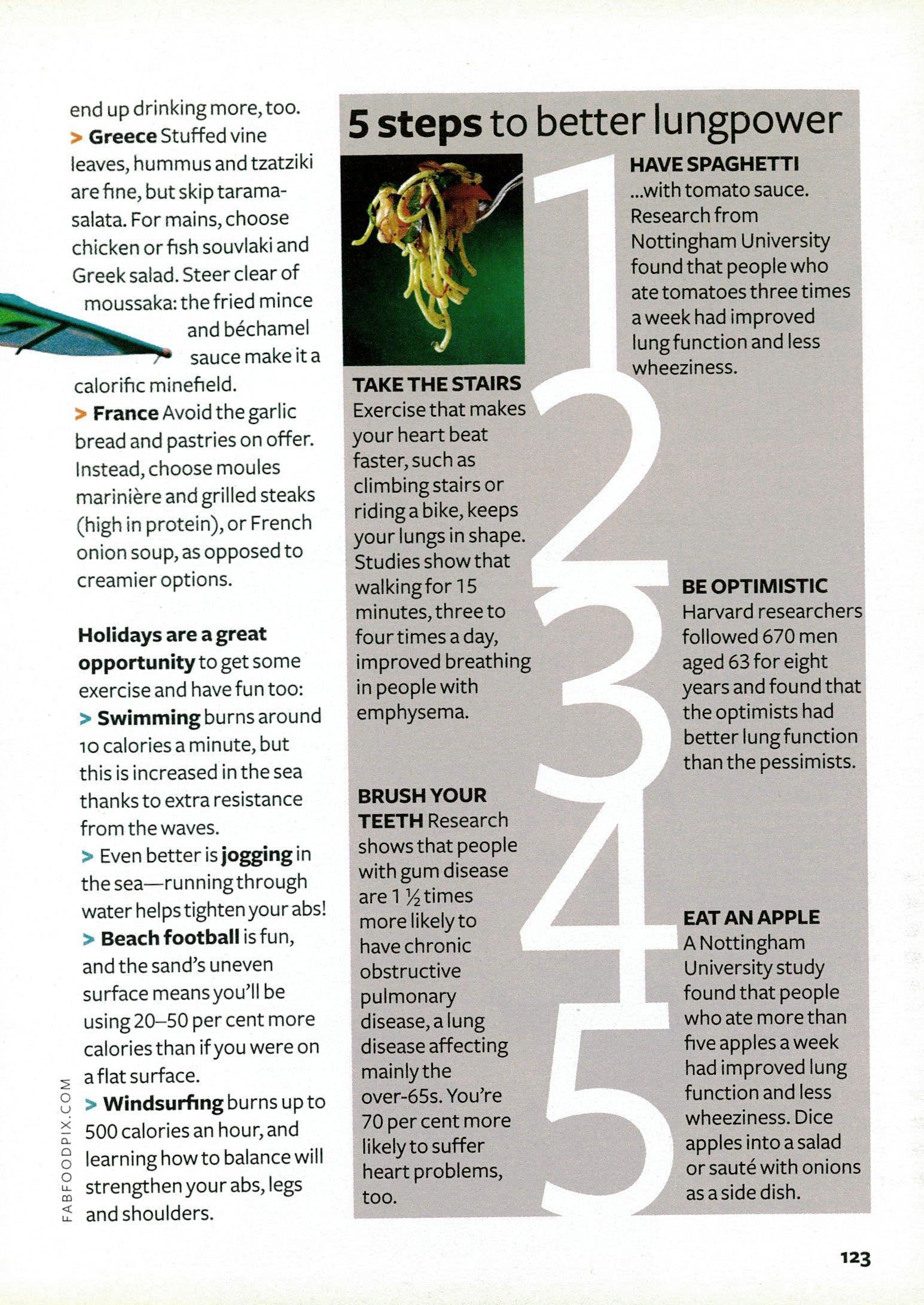
EAT AN APPLE
A Nottingham University study found that people who ate more than five apples a week had improved lung function and less wheeziness. Dice apples into a salad or sauté with onions as a side dish.
123
Doctor on the Ward
Max Pemberton can handle anything— anything except worried parents, that is
Just get him better and we can all get out of here," growls the man between gritted teeth as I attempt to take his son's blood. The child starts screaming as I approach him with the needle.
I haven't even touched him yet,I think to myself. I dread to think how he's going to react when I actually stick a sharp object into him. I look at the man's tattoos and shaved head. He cracks his knuckles and I swallow hard.
A nurse pokes her head round the curtain to see what all the fuss is about and quickly retreats, satisfied that I'm not murdering someone—despite how it sounds from outside.
"Why are you making him cry?" the man roars at me. I try to smile in a benign manner but I suspect I just look
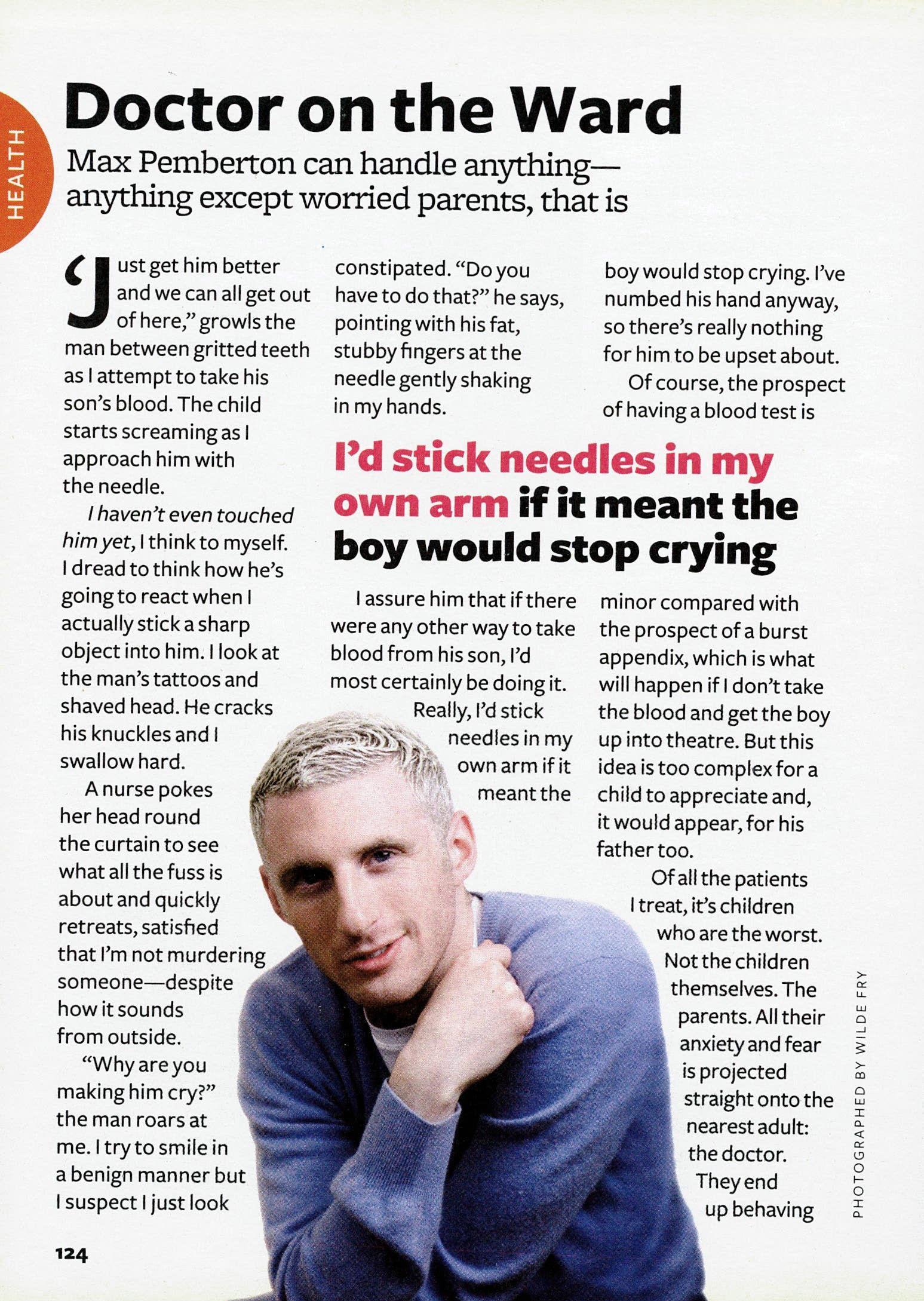
constipated. "Do you have to do that?" he says, pointing with his fat, stubby fingers at the
needle gently shaking in my hands.
boy would stop crying. I've numbed his hand anyway, so there's really nothing for him to be upset about.
Of course, the prospect of having a blood test is
I'd stick needles in my own arm if it meant the boy would stop crying
I assure him that if there minor compared with were any other way to take the prospect of a burst blood from his son, I'd appendix, which is what most certainly be doing it. will happen if I don't take Really, I'd stick the blood and get the boy needles in my up into theatre. But this own arm if it idea is too complex for a meant the child to appreciate and, it would appear, for his father too.
Of all the patients I treat, it's children who are the worst. Not the children themselves. The parents. All their anxiety and fear is projected straight onto the nearest adult: the doctor. They end up behaving
PHOTOGRAPHED BY WI LDE FRY
124
worse than the children.
Yet the problem with badly behaved adults (as opposed to children) is that there are no parents to discipline them. You just have to put up with it while simultaneously trying to look after the child.
The man continues to glare at me as though I'm to blame for his son's appendicitis. Then the nurse reappears from behind the curtain with something in her hand.Not another procedure toinflict on this poor child, I think.
"There we go," she says, unwrapping a boiled sweet and shoving it into the child's screaming open mouth. Silence. The child suddenly starts smiling. The father continues to scowl at me. I look at the nurse, then at the father. I wonder if he'd like a boiled sweet too?
g >> Max Pemberton is a u hospital doctor. His book Where Does It Hurt? is published by Hodder and Stoughton at £1 2.99.
KNOW YOUR ORGANS
The bladder
Time to go?
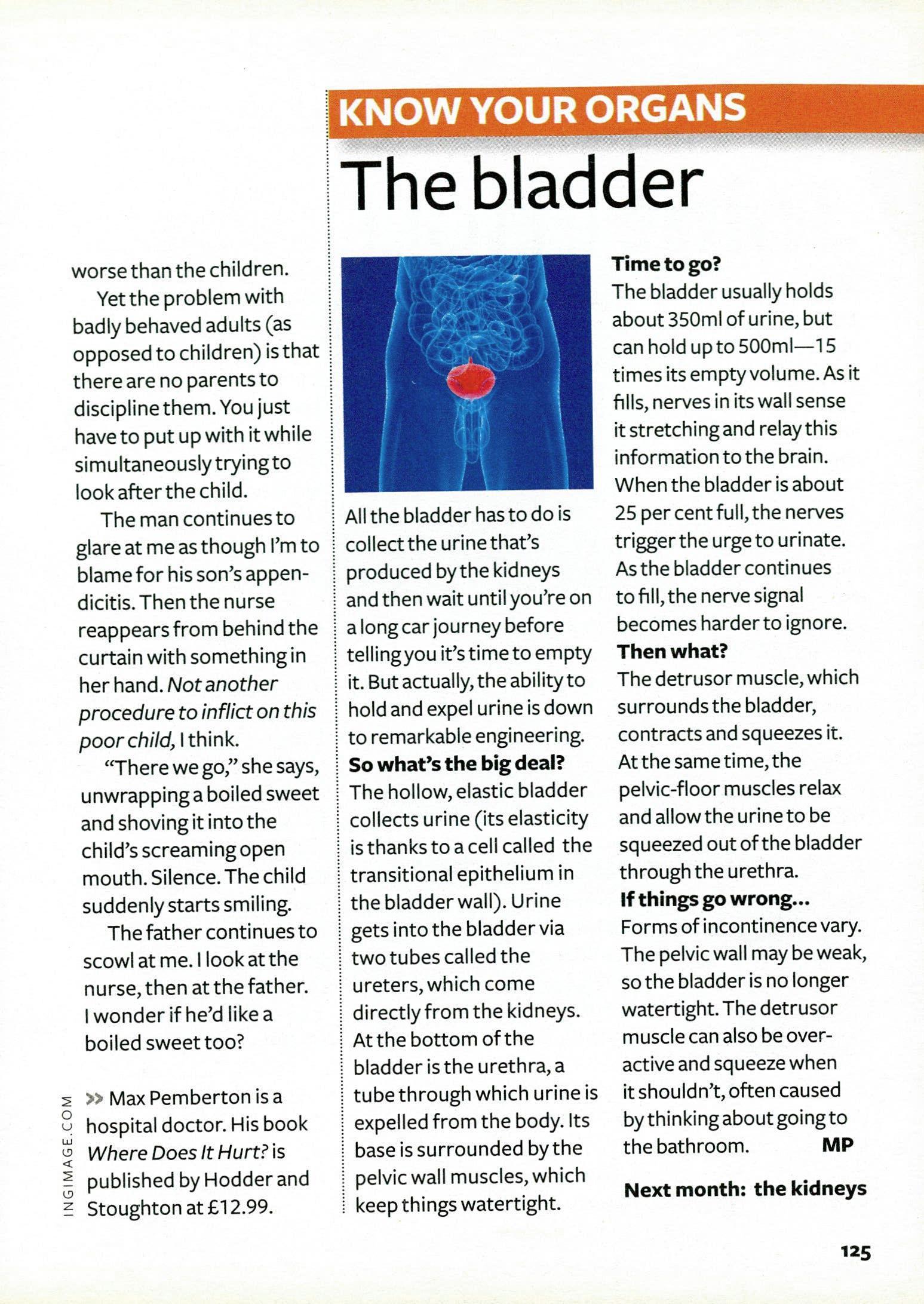
All the bladder has to do is collect the urine that's produced by the kidneys and then wait until you're on a long car journey before tellingyou it's time to empty it. But actually, the ability to hold and expel urine is down to remarkable engineering.
So what's the big deal?
The hollow, elastic bladder collects urine (its elasticity is thanks to a cell called the transitional epithelium in the bladder wall). Urine gets into the bladder via two tubes called the ureters, which come directly from the kidneys. At the bottom of the bladder is the urethra, a tube through which urine is expelled from the body. Its base is surrounded by the pelvic wall muscles, which keep things watertight.
The bladder usually holds about 350m1of urine, but can hold up to 500mI-15 times its empty volume. As it fills, nerves in its wall sense it stretching and relay this information to the brain. When the bladder is about 25 per cent full, the nerves trigger the urge to urinate. As the bladder continues to fill, the nerve signal becomes harder to ignore. Then what?
The detrusor muscle, which surrounds the bladder, contracts and squeezes it. At the same time, the pelvic-floor muscles relax and allow the urine to be squeezed out of the bladder through the urethra.
If things go wrong...
Forms of incontinence vary. The pelvic wall may be weak, so the bladder is no longer watertight. The detrusor muscle can also be overactive and squeeze when it shouldn't, often caused by thinking about going to the bathroom. MP
Next month: the kidneys
125
HEALTH UPDATE A breakthrough in treating joint pain naturally Joint effort
Most of us will experience joint painat some point in our lives, but it can be hard to treat.
Painful joints occur when synovial fluid (which supports and lubricates movement) decreases in quantity and quality. The cushioning effect is lost and cartilage deteriorates as bones grind together. This leads to inflammation, then pain and stiffness. Inflammation further damages synovial fluid; it's a cycle of joint deterioration.
Now there's new hope. A unique formulation by Mentholatum (the company
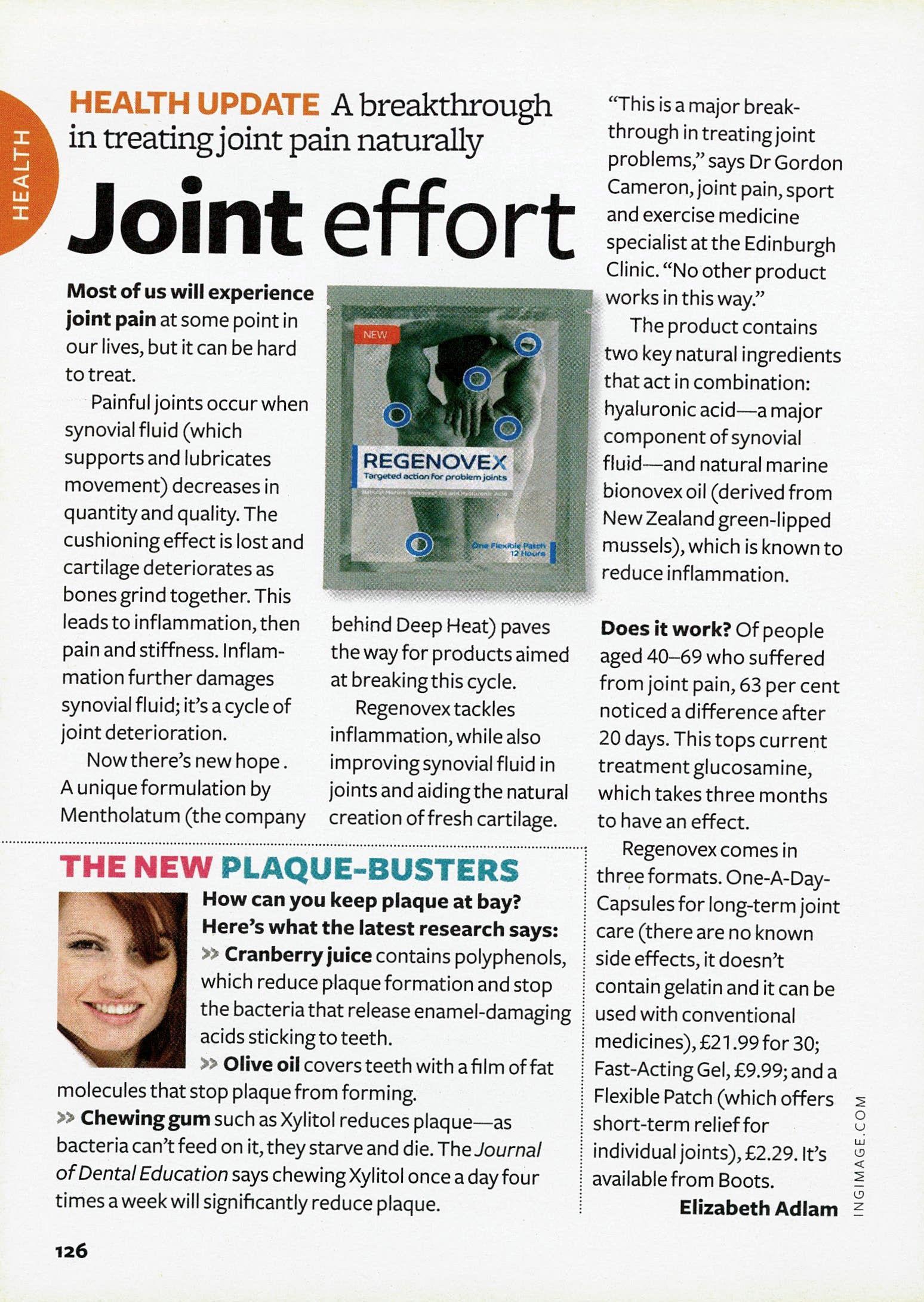
behind Deep Heat) paves the way for products aimed at breakingthis cycle.
Regenovex tackles inflammation, while also improving synovial fluid in joints and aidingthe natural creation of fresh cartilage.
THE NEW PLAQUE-BUSTERS
How can you keep plaque at bay?
Here's what the latest research says: » Cranberry juicecontains polyphenols, which reduce plaque formation and stop the bacteria that release enamel-damaging acids stickingto teeth. as Olive oilcovers teeth with a film of fat molecules that stop plaque from forming.
Chewing gumsuch as Xylitol reduces plaque—as bacteria can't feed on it, they starve and die. TheJournal of Dental Education says chewing Xylitol once a day four times a week will significantly reduce plaque.
"This is a major breakthrough in treating joint problems," says Dr Gordon Cameron, joint pain, sport and exercise medicine specialist at the Edinburgh Clinic. "No other product works in this way."
The product contains two key natural ingredients that act in combination: hyaluronic acid—a major component of synovial fluid—and natural marine bionovex oil (derived from New Zealand green-lipped mussels), which is known to reduce inflammation.
Does it work?Of people aged 40-69 who suffered from joint pain, 63 per cent noticed a difference after 20 days. This tops current treatment glucosamine, which takes three months to have an effect.
Regenovex comes in three formats. One-A-DayCapsules for long-term joint care (there are no known side effects, it doesn't contain gelatin and it can be used with conventional medicines), £21.99 for 30; Fast-Acting Gel, £9.99; and a Flexible Patch (which offers short-term relief for individual joints), £2.29. It's available from Boots.
Elizabeth Adlam
INGIMAGE. COM
126
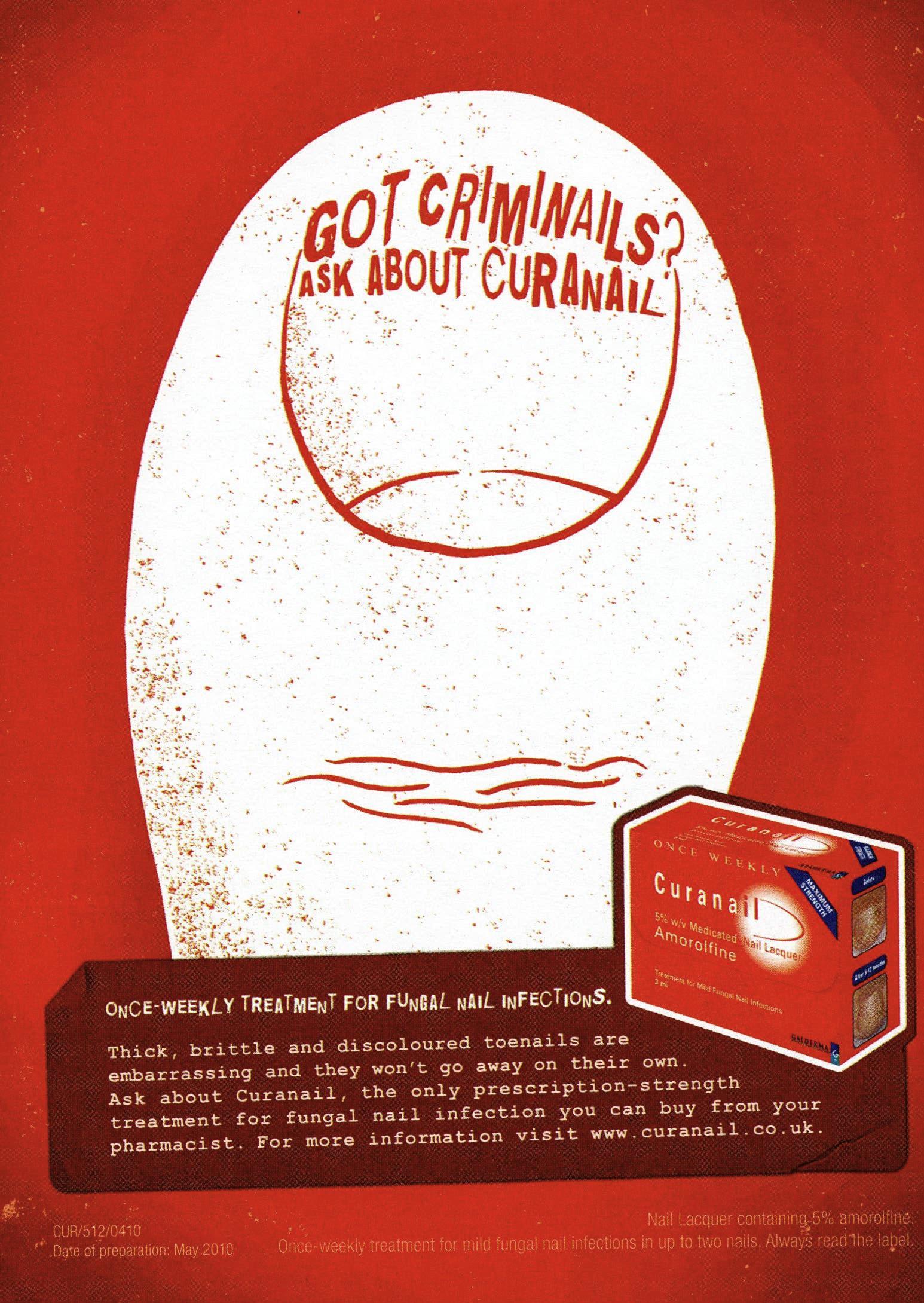
ONCE-WEEKLYTREATMENTFORFU NGALNMLINFECTIONS. Thick, brittle and discoloured toenails are embarrassing and they won't go away on their own. Ask about Curanail, the only prescription-strength treatment for fungal nail infection you can buy from your pharmacist. For more information visit www.curanail.co.uk. CUR/512/0410 Date of preparation:
For an instant make-up shakeup, look to lipstick
By Jan Masters
At the Prada spring/summer catwalk show, it was all glow on the lipstick front. Models sported a citrus orange shade that made a zing statement.
At Christian Dior, there was a 1940s femme fatale vibe, the fashion focusing on lame, the hair channelling Lauren Bacall, and the lips kissed with crimson. Pristine. Precise. Polished.
I tend to use more nude lipstick shades for summer, only daring to go darker in winter. But seeing these bolts of bold colour reminded me how cheering buying a new lipstick can be. If you can't afford that eyewateringly expensive outfit, or you're just having a bad week, there's something undeniably satisfying about selecting from a Pantone-esque
pick 'n' mix of shades, twisting that new lipstick from its case and touchingyour lips with its satiny colour for the first time.
Bright lipstick is versatile too—it can make you feel really poised. If it's ultraglossy, the result is racier—and poppy, tomato and geranium shades send upbeat signals. That said, some of the pure reds are more suitable for young, flawless faces (which counts me out). Rich scarlets, for instance, can make lips look thinner and so can be rather ageing.
However, I've always thought some shades are smile-enhancers, and this has just been proved courtesy of Clinique.The cosmetics house has grouped eleven of its hot sellers into a"Lip Collection for a Brighter Smile". Not all of them are vibrant colours—one or two are nudes —but they were all chosen specifically because they can make teeth look whiter.
Dr Paul Siu, a New York dentist, checked the effects of the lipsticks using a dental-shade guide as a reference. "The subtle blue tones and contrast in each colour instantly brightened the appearance of the teeth," he confirmed.
Coral has also gained catwalk favour this season—but I must admit, it's a shade from which I've long backed away on the basis that
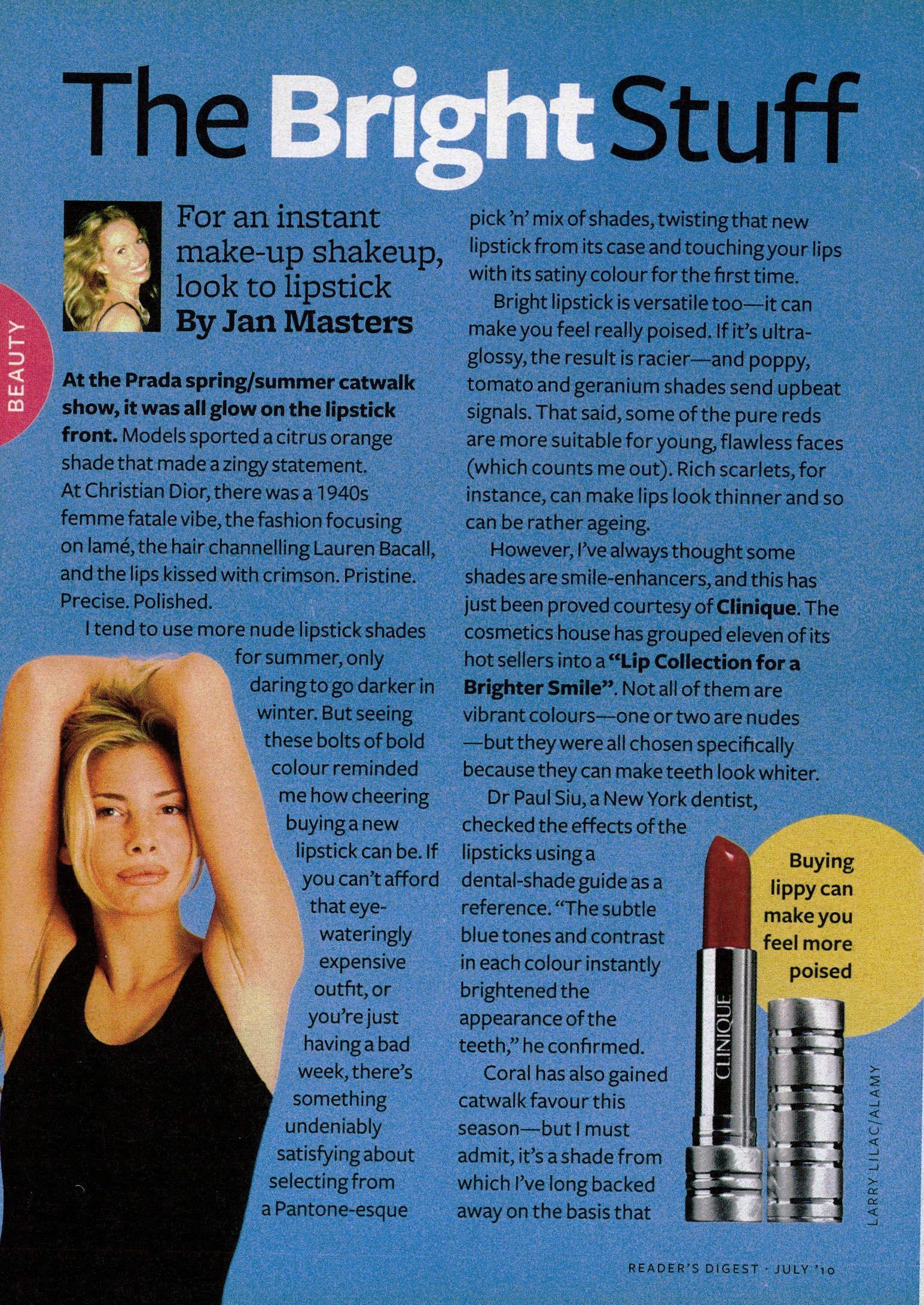
Buying lippy can make you feel more poised
LARRY L ILAC/ ALAMY
Stuff
READER'S DIGEST' JULY '10

it was a handbag staple for my aunties for about half a century. But now, I've come to see that corals can make you feel pretty and perky, particularly in the new moist, transparent finishes.
Check out the new Dior Addict in Coral Craze, £21.50;Maybelline New York Color Sensational in Coral Pop, £6.99 and Estee Lauder's new Pure Color Gloss in Passion Fruit,£14.50, which contains pigments wrapped in a crystal-like coating to provide brilliant colour and shine, as well as humectants, which attract and retain moisture from the atmosphere.
As it's summer, skip too much lip liner—it looks overworked. For precision, it's better to load a brush with colour from the bullet. Apply brights to the centre of lips first and work outward—and do check none has stuck to your teeth. A brighter smile is all well and good, but lip colour splashed on your incisors has zero allure.
PASS IT ON
One of my favourite fake tans isGamier Ambre Solaire No Streaks Bronzer Dry Body Mist, £10.99. I'm not alone— last year, one was sold every minute. Why the devotion? It's all in the "mist-action"—which gives a nice even tan—and the different shades that are perfectly pitched for all skin tones.
NEED FOR SPEED »
Women today need all the multitasking beauty gadgets they can get, accordingto Wilkinson Sword—research found that nearly 60 per cent of us take up to an hour to get ready each morning! But Wilkinson Sword's Intuition Revitalising Care Razor,£5.69, is a help. It lathers in water, moisturises and has a wear indicator to tell you when to replace the blades.
Other go-faster tips
• Clear dressing-table space for all your brushes and eyelash curlers, so you don't have to keep rummaging about in your drawers for them.
• A classic John Frieda piece of advice: wash your hair before you do any other getting-ready task and let it almost dry before you blow-dry. Heat-styling only has real impact when hair is goingfrom damp to dry.
• Once your brows have been shaped to your satisfaction, get into the habit of plucking out any stray hairs as they show up. It's much quicker and easier in the long run than tryingto do a whole reshape every now and then.
All Washed Up Don't slap on shampoo and conditioner in the same way. Use the pads of your fingers to apply shampoo to your scalp and, for the ends, just let the lather flow through your hair. As roots tend to be greasier, apply conditioner to the length and ends first, using what's left on your hands for the scalp.
PI O TR MA RCI NS KI/ AL A MY
READER'S DIGEST rdmag.co.uk 129
Should you go for a tracker or a fixed rate?
Mortgage lenders' rates are continuing to fall and the Bank of England base rate is at an all-time low, sois this a good time to remortgage? And should
)you go fora fixed rate or a tracker? A fixed rate gives peace of mind thatyour rate won't rise and increaseyour monthly outgoings. But a tracker, which rises and falls with the base rate, is usually cheaper—as long as rates don't suddenly shoot up.
Ray Boulger, senior technical manager at mortgage experts John Charcol, says: "If I had to make a judgement, trackers are going to be better value than fixed rates. It appears
unlikely that the base rate will go above one per cent for five years." Boulger says he'd pick a lifetime tracker

rather than a two- or three-year deal.
David Hollingworth of mortgage broker L&C also prefers trackers, but says that remortgaging isn't of benefit to everyone. "If
you have less than 25 per cent equity in your property, you have fewer options," he notes.
And even ifyou're coming near to the end of a deal, you may be better off staying put. "Some lenders have low revert-to rates, so you won't get a rate that's much cheaper by moving," Boulger says. Mortgage size matters. "If you have a small mortgage, the fees for remortgaging make a bigger difference," Hollingworth says.
If you still prefer the predictability of a fix, both experts recommend a term of no less than five years. Alison Gibson
>>BANK UPDATE!
From this month, Alliance and Leicester won't allow holders of basic current accounts to draw out less than £300 over the counter (less than £ioo at Nationwide). As a result, less wealthy customers—including pensioners, who may struggle to remember pin numbers—will be forced to use the hole in the wall.
REMORTGAGING
READER'S DIGEST • JULY '10 ICP/ ALAMY; DBURKE/ AL AMY
Teena
the

Lyonslooks at
best places to go for advice on how to get your finances in order
Get out of Debt
Average personal debt in the UK, excluding mortgages, now stands at £9,731and one person in ten is struggling to manage the problem. Yet, while one in three consumers keeps their money worries hidden from their family, and suffers the emotional consequences of covering up the debt, ranging from problems at work to alcohol abuse, those who want advice believe they have a limited range of options.
Traditionally, the Citizens Advice Bureau has been the first point of call for free debt advice, but the service is often overwhelmed with enquiries. Those unwilling, or unable, to get an appointment with their local centre, may consider visiting the t growing band of for-
• profit, paid-for advisers as a last-ditch solution.
Commercial debt
• advisers have their critics—not least
• because the average
• cost per person for
face-to-face advice is £265, or £51 per customer for a phone consultation. For someone already mired in debt, this is obviously an additional worry. So it's no surprise that two other free debt-advice services are seeing enquiries soar. The Consumer Credit Counselling Service helped i5o,000 people last year, up almost two-thirds on 2008, while National Debtline received 405,167 calls last year, compared with 256,167 the previous year.
FastFact:
The free services do get oversubscribed, but they all run useful websites, which are a great place to start debt-planning while waiting for an appointment. Plus, those being harassed by debt collection agencies are guaranteed 3o days' breathing space if they seek help, thanks to an agreement between the Government and the Credit Services Association, the body that represents debtcollecting agents.
READER'S DIGEST rdmag.co.uk 131
Easy ways to entertain your kids this summer—and save money
Child'splay
School's out and many parents will find themselves digging deep into their pockets between now and September.It's not just the extra childcare— between £62.70 and £113.72 a week according to the Daycare Trust—but also the cost of entertaining "bored" children that can run to hundreds of pounds over six weeks.
My husband and I reduce the cost of occupying our two by opting for low-key days out to the beach and collecting tokens and vouchers for discounted entries to attractions. Instead of gym membership we sign up for cheap council-run sports activities. We always take our own food and drink (I think my children would kill for a burger) and share petrol costs where possible, or
buy advance train tickets. Here are some more ideas.
> Consider a day out with the National Trust (nationaltrust.org.uk) from around Do for a family ticket. Many of the properties offer children's trails and events, and have the added bonus of beautiful settings for perfect picnics. South Foreland lighthouse

and Corfe Castle, both in Dover, are our current favourites.
> Many museums and galleries are free.Check culture24.org.uk for childfriendly ideas.
> See a film on the cheap with Orange Wednesdaystwo-for-one tickets. Cineworld cinemas (cineworld.co.uk/films/ junior) offer Saturday
READER'S DIGEST • JULY '10
132

morning Movies for Juniors screenings for El per child. Vue cinemas (myvue.com/ kids-films) have a similar deal with children and accompanying adults getting in to morning screenings for 95p.
> Take your five- to ii-year-olds to a Tesco/ FA free football skills introductory coaching session (usually two hours) with professional FA Skills Coaches. See fa-tescoskills.co.uk.
> Swim for nothing at more than i,000 pools up and down the country offering free swimming to children aged -16 and under, and the over-6os. Ask at your local pool for information.
> Look on your local council website or call for information about holiday sports activities and courses.
> Walking costs nothing. Pack a picnic and set off for the nearest green space, or pick up an Ordnance Survey map and head for the country
o (many public footpaths start near train stations so you don't have to drive).
0 Chloe Bryan-Brown
Don't let the numbers get you down—online money calculators just got a whole lot better
Doing the maths
Consumers looking for online calculatorsto help them manage their money now have a wider range to choose from on the moneymadeclear.org.uk website—the FSA's national money guidance service. Tools just launched include a savings calculator, an improved mortgage calculator and a more detailed budget planner. More calculators are in the pipeline.
"Each tool will also have a 'next steps' page that gives tips, and there are links for further help," says Nancy Baynes, of the new Consumer Financial Education Body, which was established by the FSA in April and now manages moneymadeclear.
Martin Lewis, the money guru, is widely credited with providing the most comprehensive budget planner on his website moneysavingexpert.com. "About a million people have used it, but many others won't take the two hours you need to do a proper budget," he says. His advice when choosing calculators? "Find a trusted source and make sure you understand the questions and answers."
Hargreaves Lansdown, the independent financial adviser, has a well-regarded pensions calculator on its website h-l.co.uk. Danny Cox, head of advice, says: "Online tools have made a big difference. Consumers no longer have to rely on banks and advisers for many of their financial needs." So if you want to keep getting the best deals, reach for your computer's keypad. AG
READER'S DIGEST rdmag.co.uk
133
Blueberry Thrill
Marco Pierre Whitespoils us with this half-cake, half-custard delight
Whenever I've put blueberries on the menu they've turned out to be a bestseller.One reason for this is because blueberries are rated as super-healthy thanks to their high level of antioxidants. But I suspect that the main reason they're popular is simply because they taste so wonderful. You can grow them quite easily in Britain, and then you have the pleasure of pickingthem at this time of year—a simple pleasure, but one that's growing in popularity as we get the message about usingfood that hasn't travelled long distances. However,you must make sure they're the right colour (a deep blue).
Timing is everything with these noble fruits.
Clafoutis (pronounced kla-foo-tee) is a classic French dessert that makes for a real summer treat. It looks like a cake—but it's
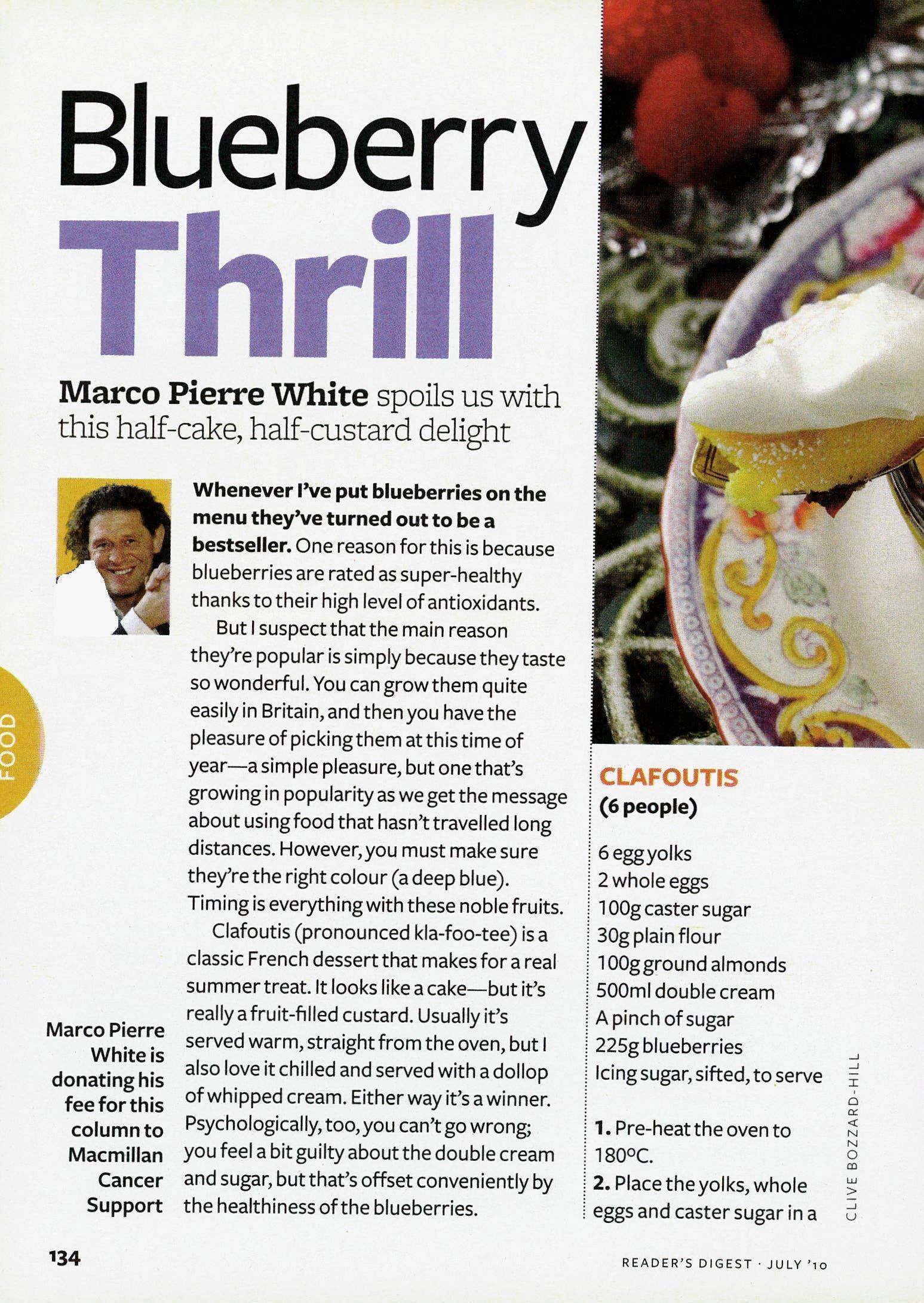
Marco Pierre donating his fee for this
White is also love it chilled and served with a dollop of whipped cream. Either way it's a winner. served warm, straight from the oven, butI really a fruit-filled custard. Usually it's
Psychologically, too, you can't go wrong; column to you feel a bit guilty about the double cream Macmillan and sugar, but that's offset conveniently by Cancer the healthiness of the blueberries. Support
CLAFOUTIS (6 people)
6 eggyolks
2 whole eggs
100g caster sugar
30g plain flour
100gground almonds
500m1double cream
A pinch of sugar
225g blueberries
Icing sugar, sifted, to serve
1.Pre-heat the oven to 180°C.
2.Place the yolks, whole eggs and caster sugar in a
CLIVE BOZZARDHILL •
134 READER'S DIGEST • JULY '10
mixing bowl and whisk until the mixture becomes a pale colour.
Add a pinch of salt just before mixing into a batter. It will offset the sweetness of the dish and make it even tastier. visit al:frecipes.co.uk tor many more recipes and cookingtips
3.Add the flour, ground almonds and double cream.
4. Mix well —it should now resemble a light batter and coat the back of a spoon.
5.Take six shallow ramekins and sprinkle the base of
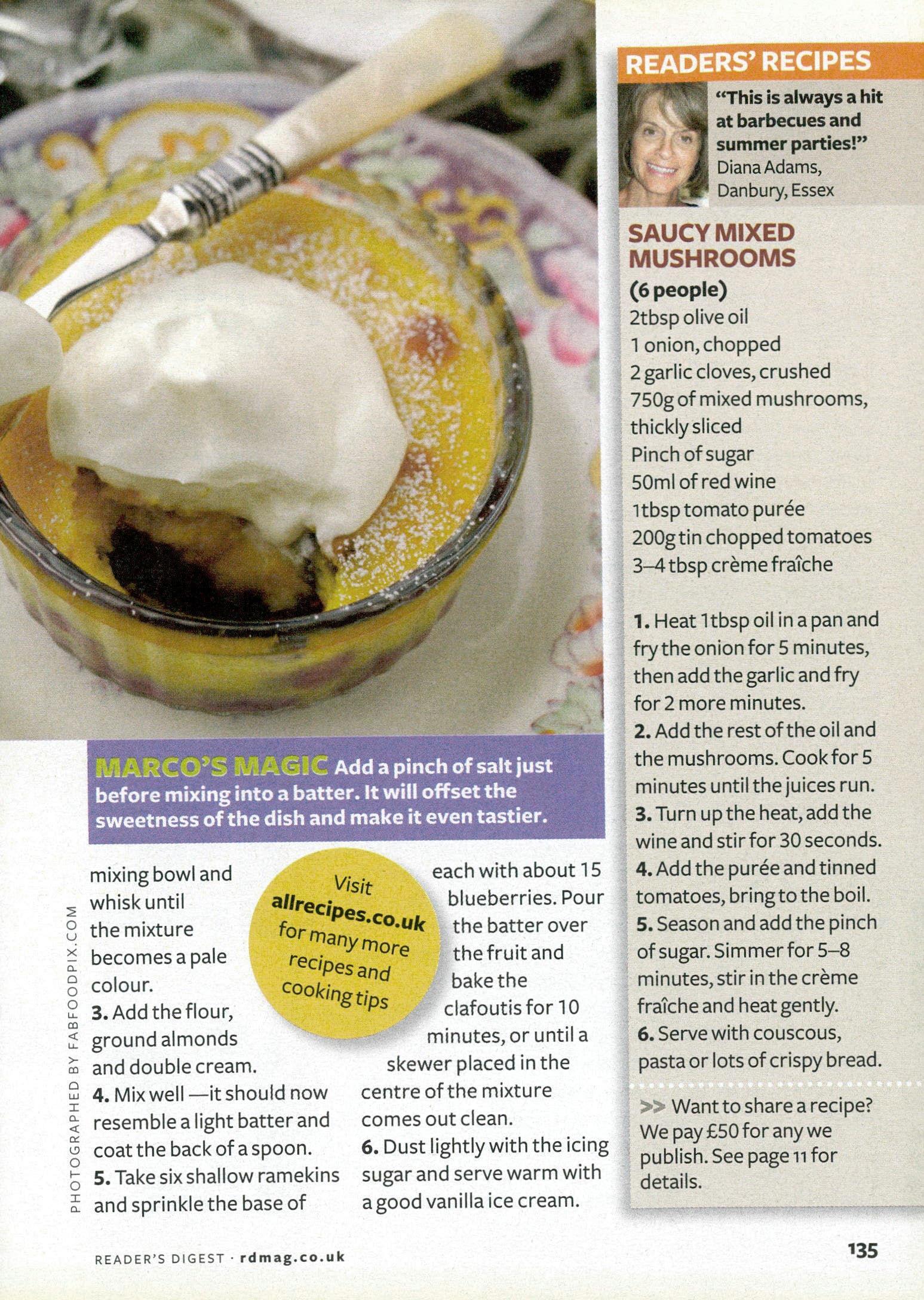
each with about 15 blueberries. Pour the batter over the fruit and bake the clafoutis for 10 minutes, or until a skewer placed in the centre of the mixture comes out clean.
6.Dust lightly with the icing sugar and serve warm with a good vanilla ice cream.
"This is always a hit at barbecues and summer parties!"
Diana Adams, Danbury, Essex
SAUCY MIXED MUSHROOMS
(6 people)
2tbsp olive oil
1 onion, chopped
2 garlic cloves, crushed
750g of mixed mushrooms, thickly sliced
Pinch of sugar
50m1of red wine
itbsp tomato purée
200g tin chopped tomatoes
3-4 tbsp crème fraiche
1.Heat ltbsp oil in a pan and fry the onion for 5 minutes, then add the garlic and fry for 2 more minutes.
2.Add the rest of the oil and the mushrooms. Cook for 5 minutes until the juices run.
3.Turn up the heat, add the wine and stir for 30 seconds.
4.Add the purée and tinned tomatoes, bringto the boil.
5.Season and add the pinch of sugar. Simmer for 5-8 minutes, stir in the crème fraiche and heat gently.
6.Serve with couscous, pasta or lots of crispy bread.
Want to share a recipe?
We pay £50 for any we publish. See page n for details.
P HOT O GRA PHE D BY FA BF O ODP I X. C OM
READER'S DIGEST rdmag.co.uk 135
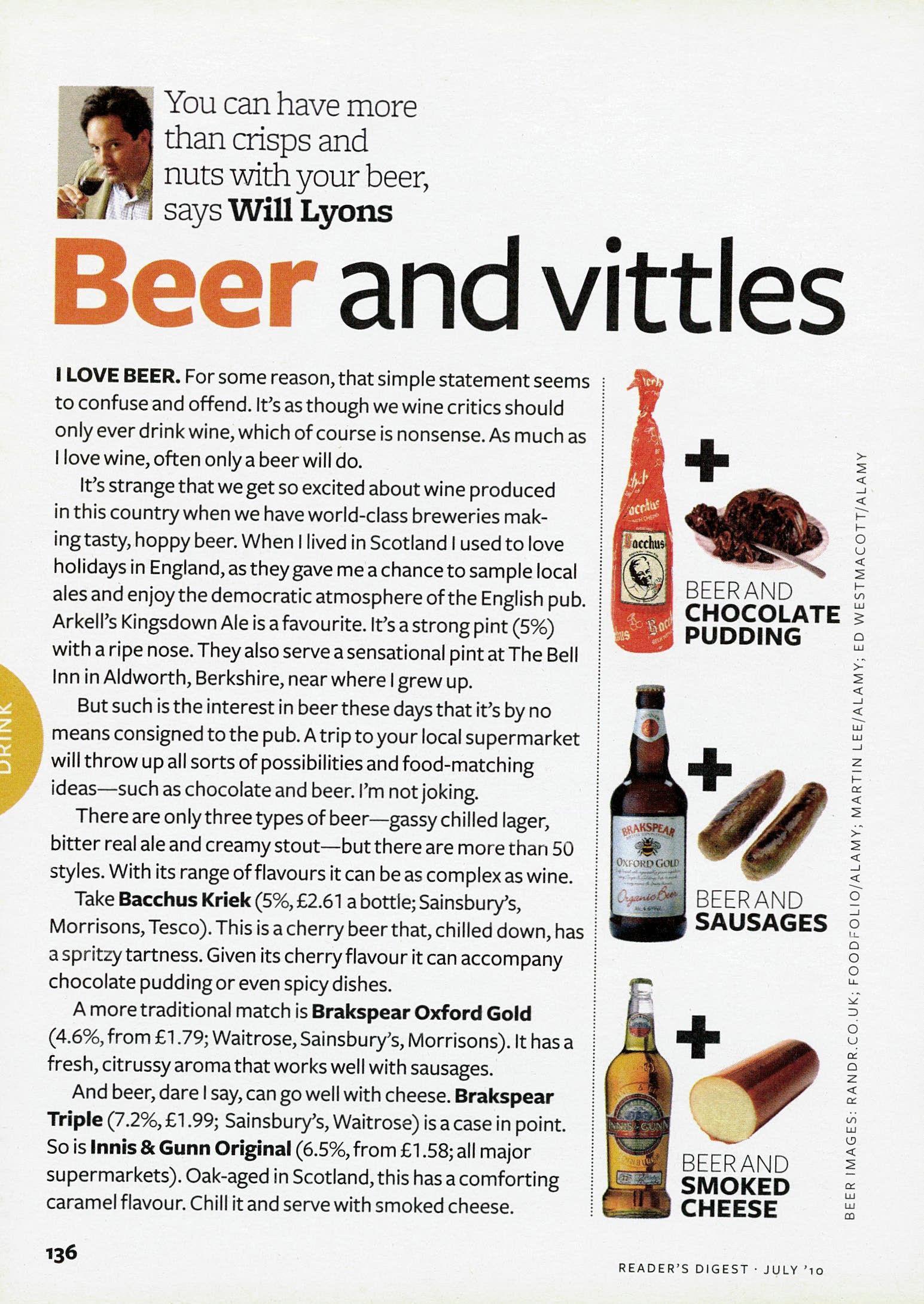
You can have more than crisps and nuts with your beer, lid saysWill Lyons
Beer and vittles
I LOVE BEER.For some reason, that simple statement seems to confuse and offend. It's as though we wine critics should only ever drink wine, which of course is nonsense. As much as I love wine, often only a beer will do.
It's strange that we get so excited about wine produced in this country when we have world-class breweries making tasty, hoppy beer. When I lived in Scotland I used to love holidays in England, as theygave me a chance to sample local ales and enjoy the democratic atmosphere of the English pub. Arkell's Kingsdown Ale is a favourite. It's a strong pint (5%) with a ripe nose. They also serve a sensational pint at The Bell Inn in Aldworth, Berkshire, near where I grew up.
But such is the interest in beer these days that it's by no means consigned to the pub. A trip toyour local supermarket will throw up all sorts of possibilities and food-matching ideas—such as chocolate and beer. I'm not joking.
There are only three types of beer—gassy chilled lager, bitter real ale and creamy stout—but there are more than 50 styles. With its range of flavours it can be as complex as wine.
TakeBacchus Kriek(5%, £2.61 a bottle; Sainsbury's, Morrisons, Tesco). This is a cherry beer that, chilled down, has a spritzy tartness. Given its cherry flavour it can accompany chocolate pudding or even spicy dishes.
A more traditional match isBrakspear Oxford Gold (4.6%, from £1.79; Waitrose, Sainsbury's, Morrisons). It has a fresh, citrussy aroma that works well with sausages.
And beer, dare I say, can go well with cheese.Brakspear Triple(7.2%, £1.99; Sainsbury's, Waitrose) is a case in point. So isInnis & Gunn Original(6.5%, from £1.58; all major supermarkets). Oak-aged in Scotland, this has a comforting caramel flavour. Chill it and serve with smoked cheese.
H 0 ° BEER AND CHOCOLATE `` PUDDING BEER AND SAUSAGES BEER AND SMOKED CHEESE 0 2 0 0 I 1 5: 0 0 0 0 0 U 2 co
136 READER'S DIGEST • JULY 'co
The Apple iPad is already the most talked-about device of the decade— so it's only right and proper thatyou should be able to find the world's best-loved magazine on it. But what do we like most about the iPad? Reader's Digest is the perfect fit, that's what—our wonderfully portable small format means that our pages are tailor-made to the size of the iPad screen. You'd almost think they'd designed it just for us...

Got your iPad?Shown it off to all your friends? Feeling (understandably) just a little bit smug? Now, all that's left foryou to do is go to the Apple store at store.apple.com/ukand download us for FREE—you'll be able to leaf your way through every page of the latest issue. Plus see a welcome video from c.._4 editor-in-chief Gill Hudson (left), who'll introduce some of this month's Reader's month from now on. top stories. And yes, we'll be available
on the iPad every
on the
Your favourite magazine—now available
iPad!
Treatments your doctor won't tell you about Deepcut startanere ,,cotiT° „, ,d14•7
igest
WHAT YOUR 137
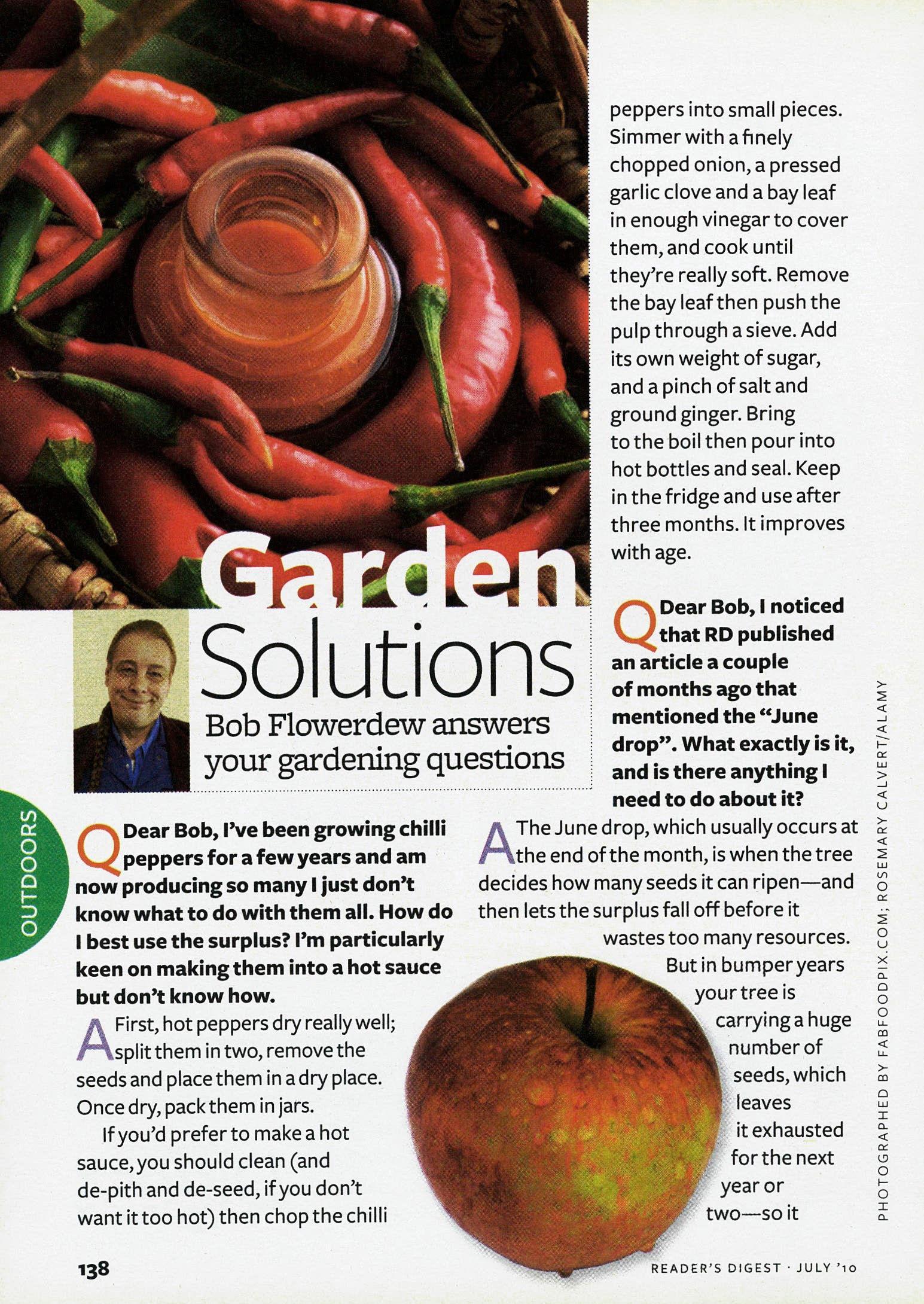
&Soutions
Bob Flowerdew answers your gardening questions
QDear Bob, I've been growing chilli peppers for a few years and am now producing so many I just don't know what to do with them all. How do I best use the surplus? I'm particularly keen on making them into a hot sauce but don't know how.
A First, hot peppers dry really well; split them in two, remove the seeds and place them in a dry place. Once dry, pack them in jars. If you'd prefer to make a hot sauce, you should clean (and de-pith and de-seed, if you don't want it too hot) then chop the chilli
peppers into small pieces. Simmer with a finely chopped onion, a pressed garlic clove and a bay leaf in enough vinegar to cover them, and cook until they're really soft. Remove the bay leaf then push the pulp through a sieve. Add its own weight of sugar, and a pinch of salt and ground ginger. Bring to the boil then pour into hot bottles and seal. Keep in the fridge and use after three months. It improves with age.
QDear Bob, I noticed that RD published an article a couple of months ago that mentioned the "June drop". What exactly is it, and is there anything I need to do about it?
A The June drop, which usually occurs at .the end of the month, is when the tree decides how many seeds it can ripen—and then lets the surplus fall off before it wastes too many resources. But in bumperyears your tree is carrying a huge number of seeds, which leaves it exhausted for the next year or two—so it
OU TD O ORS
PH OTOGRA P HED BY FABFOODPIX. CO M; ROS EMARY CALVERT/ AL A MY 138 READER'S DIGEST • JULY '10
can manage only a few. Thinning will give you more regular crops of bigger, better fruits. By removing, say, half the number,you reduce the strain in a good year, enabling the tree to carry another batch the following one. So at the beginning of July, pull off small fruitlets that are crowded, or have holes, splits or scabby patches. Don't be afraid of overdoing it: it's hard to over-thin. Reduce triplets and fivers to one or two at most. Remember, you want fewer and bigger fruits, so the ones left should be up to a hand's breadth apart.
>) Bob Flowerdew is an organic gardener and a regular on BBC Radio 4's Gardeners' Question Time.
READER'S TIP
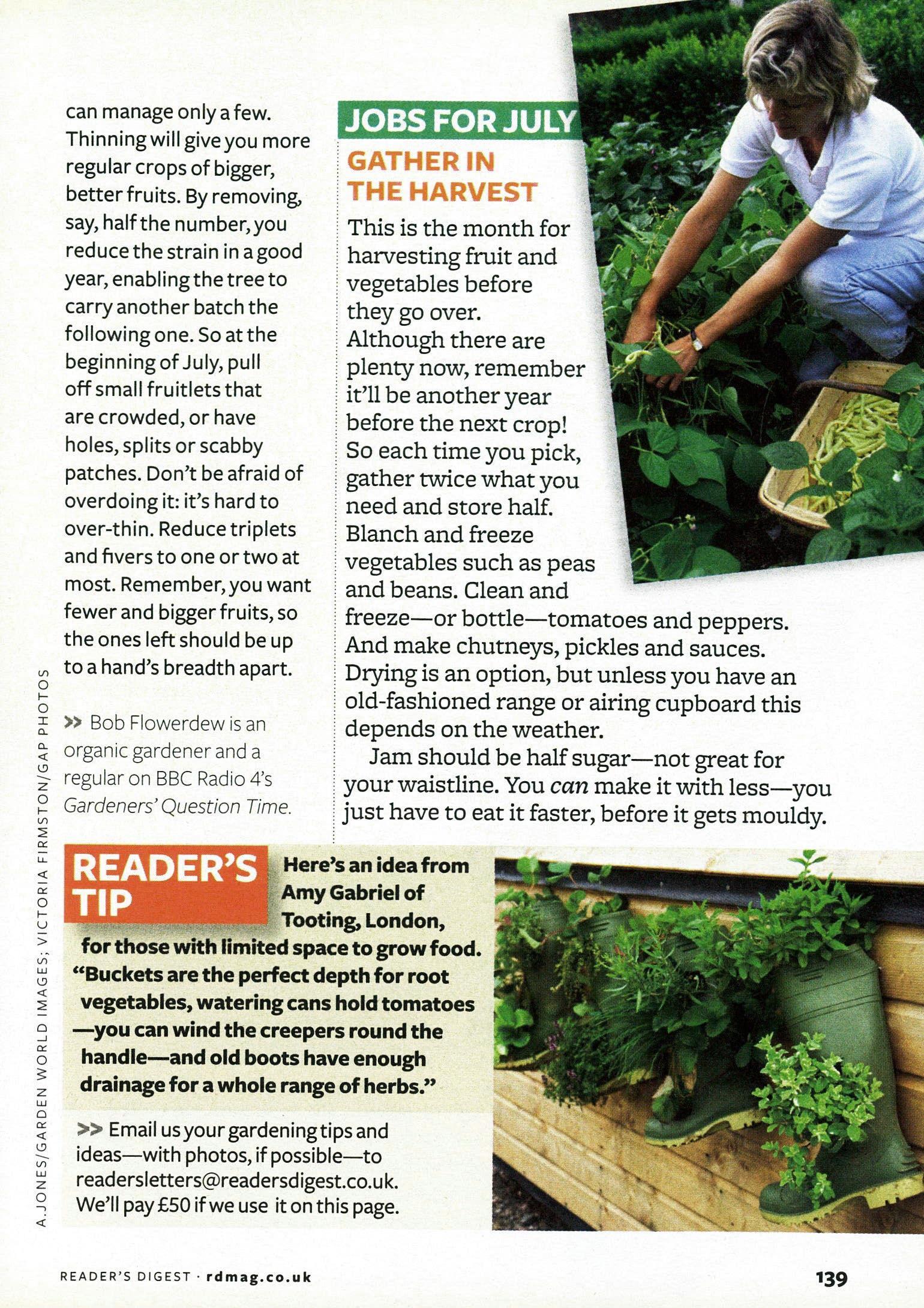
GATHER IN THE HARVEST
This is the month for harvesting fruit and vegetables before they go over. Although there are plenty now, remember it'll be another year before the next crop! So each time you pick, gather twice what you need and store half. Blanch and freeze vegetables such as peas and beans. Clean and freeze—or bottle—tomatoes and peppers. And make chutneys, pickles and sauces. Drying is an option, but unless you have an old-fashioned range or airing cupboard this depends on the weather. Jam should be half sugar—not great for your waistline. You can make it with less—you just have to eat it faster, before it gets mouldy.
Here's an idea from Amy Gabriel of Tooting, London, for those with limited space to grow food. "Buckets are the perfect depth for root vegetables, watering cans hold tomatoes —you can wind the creepers round the handle—and old boots have enough drainage for a whole range of herbs."
>> Email usyour gardening tips and ideas—with photos, if possible—to readersletters@readersdigest.co.uk. We'll pay £50 if we use it on this page.
A. J ON ES/ GARDEN W ORLD IMAG ES; VIC TORIA FIRMSTON/ GAP PHOTOS
READER'S DIGEST rdmag.co.uk 139

SUMMER'S CAULDRON
I love the summery sound of bees and wasps buzzing around the garden: the bees carrying out their essential work pollinating our fruit and the wasps helping the gardener by preying on insect larvae. But is what you think is a bee really a bee? And is that wasp really a wasp?
Many insects mimic wasps to protect themselves against potential predators. There's also a "bee fly" that looks very much like a furry bumblebee. See ifyou can pick the genuine wasp from these four pictures (answer below).
Wildlife Watch
Flowers are blooming, says Martin Hughes-Games, so mind the wasps and bees
POLLEN POWER
Some limestone-rich roadsides will by now be carpeted with exoticlooking purple orchids. Orchid reproduction is fascinating (ask Darwin!). Inside many orchid flowers are small, sticky "pollinia", masses of pollen that stick to an insect pollinator in exactly the right place to pollinate the next orchid they visit. To see it for yourself, gently insert a pencil point into an orchid flower. With luck, twoyellow blobs will appear and stick to the pencil as you withdraw it.
STOOPS TO CONQUER
In July, young birds of prey start to hone their skills—including the fastest of them all, the peregrine falcon. The youngsters still have to learn their trade though, and nature gives them a helping hand. Their first set of flight feathers are much longer than adults', giving them larger control surfaces to help them learn to manoeuvre. As they moult, the new feathers become
Martin Hughes- shorter, making the birds more unstable in the air, but by Games is a host of now they'll have learned how to control their awesome BBC2'sSpringwatch "stoop" as they plunge from the sky at breathtaking and Autumn watch speed, locking onto their prey with lethal accuracy.
.sagJanoy aie (sapoadna) a pup (sninpuad snllydolay)3 apym`(spatie
140 snv(ja)apaq
elpato eindsanoyollop papeo dssMe—e4i3MS NV R OB KN ELL; RUS SELL COOP ER/ NA TU REPL. CO M; AR TE R RA PIC TURE LIB RA RY/ ALAM Y
e s!y

24-hour emergency assistance and claims administration No upper age limit on single trip policies
Children under 2 covered FREE
Instant quotes available online
D i Rge t TAKE IT EASY with our
Single-trip policies from ONLY £5.58 Annual MULTI-TRIP policies from ONLY £48.58
Vivat Finance Limited (trading as Readers Digest Financial Services) is an appointed representative of As Insurance Services Ltd which is authorised and regulated by the Financial Services Authority. FSA Register number 308675.
Visit us online at
My best holiday ever
Julie Foskett from Lincolnshire loved Kenya so much that she wants to move there with her husband!
This photo takes me back to November 2007 around Sam,watchingthe sun rise over the Indian Ocean on ourfirst trip to Kenya. We were staying at the Travellers Beach Hotel in Mombasa—a last-minute booking—but as soon as we landed in the balmy Kenyan sunshine, we knew this was going to be special.
Our first excursion outside Mombasa was snorkelling in the breathtaking waters around Wasini Island and Kisite Marine Park. Shortly afterwards we ventured out again, just half

a mile from the hotel to Haller Park. It was here that we came literally face to face with giraffes and giant tortoises.
Ourfinal trip was to Akamba Handicrafts. It's a cooperative that produces amazing carvings out of one piece of wood, usingthe crudest tools. Of course, we bought a couple of items, including a 60kg solid rosewood carving of an elephant and her calf that had to be air-freighted home.
> Somak Holi days has five nights, h alf-board, at Travellers Be ach Hotel in Mombasa fro m £879 p p, including ret urn flights and transfers , valid for November d epartures. Call 020 8423 3000 or visit somak.c om (quote Reader's Dig est).
Having lost our hearts to Kenya, Richard and I went back to the same hotel in 2008, to be greeted like old friends. This time we did a three-day safari to Tsavo East, Tsavo West and the Amboseli National Park. What a joy it was to see these animals in the wild where they belong. We've been converts ever since, and our dream now is to live in Kenya and enjoy its natural beauty every day.
Send us a photo of your favourite holiday, tell us briefly what made it so special, and if we include it on this page we'll pay you £75. See address on p6.
COU RTES Y OF JULIE AND RIC HARD FO SKET T
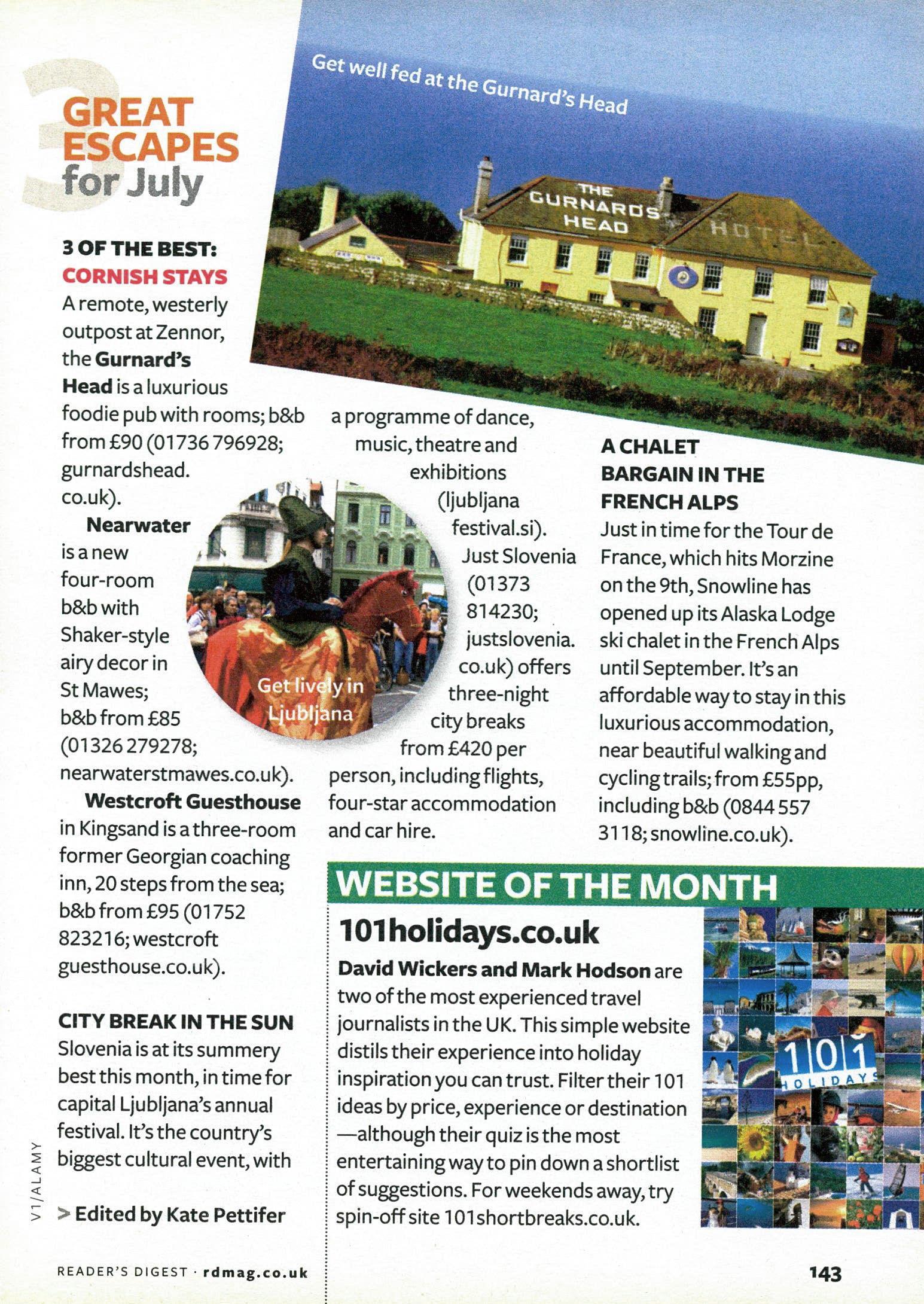
GREAT ESCAPES for July
3 OF THE BEST: CORNISH STAYS
A remote, westerly outpost at Zennor, theGurnard's Headis a luxurious foodie pub with rooms; b&b from £90 (01736796928; gurnardshead. co.uk).
Nearwater is a new four-room b&b with Shaker-style airy decor in St Mawes; b&b from £85 (01326 279278; nearwaterstmawes.co.0 k).
Westcroft Guesthouse in Kingsand is a three-room former Georgian coaching inn, 20 steps from the sea; b&b from £95 (01752 823216; westcroft guesthouse.co.uk).
CITY BREAK IN THE SUN
Slovenia is at its summery best this month, in time for capital Ljubljana's annual festival. It's the country's biggest cultural event, with
> Edited by Kate Pettifer
a programme of dance, music, theatre and exhibitions (Ljubljana festival.si).
Just Slovenia (01373 814230; justslovenia. co.uk) offers three-night city breaks from £420 per person, including flights, four-star accommodation and car hire.
A CHALET BARGAIN IN THE FRENCH ALPS
Just in time for the Tour de France, which hits Morzine on the 9th, Snowline has opened up its Alaska Lodge ski chalet in the French Alps until September. It's an affordable way to stay in this luxurious accommodation, near beautiful walking and cycling trails; from £55pp, including b&b (0844 557 3118; snowline.co.uk).
WEBSITE OF THE MONTH
101holidays.co.uk
David Wickers and Mark Hodsonare two of the most experienced travel journalists in the UK. This simple website distils their experience into holiday inspiration you can trust. Filter their 101 ideas by price, experience or destination —although their quiz is the most entertaining way to pin down a shortlist of suggestions. For weekends away, try spin-off site 101shortbreaks.co.uk.
READER'S DIGEST rdmag.co.uk
143
The RD
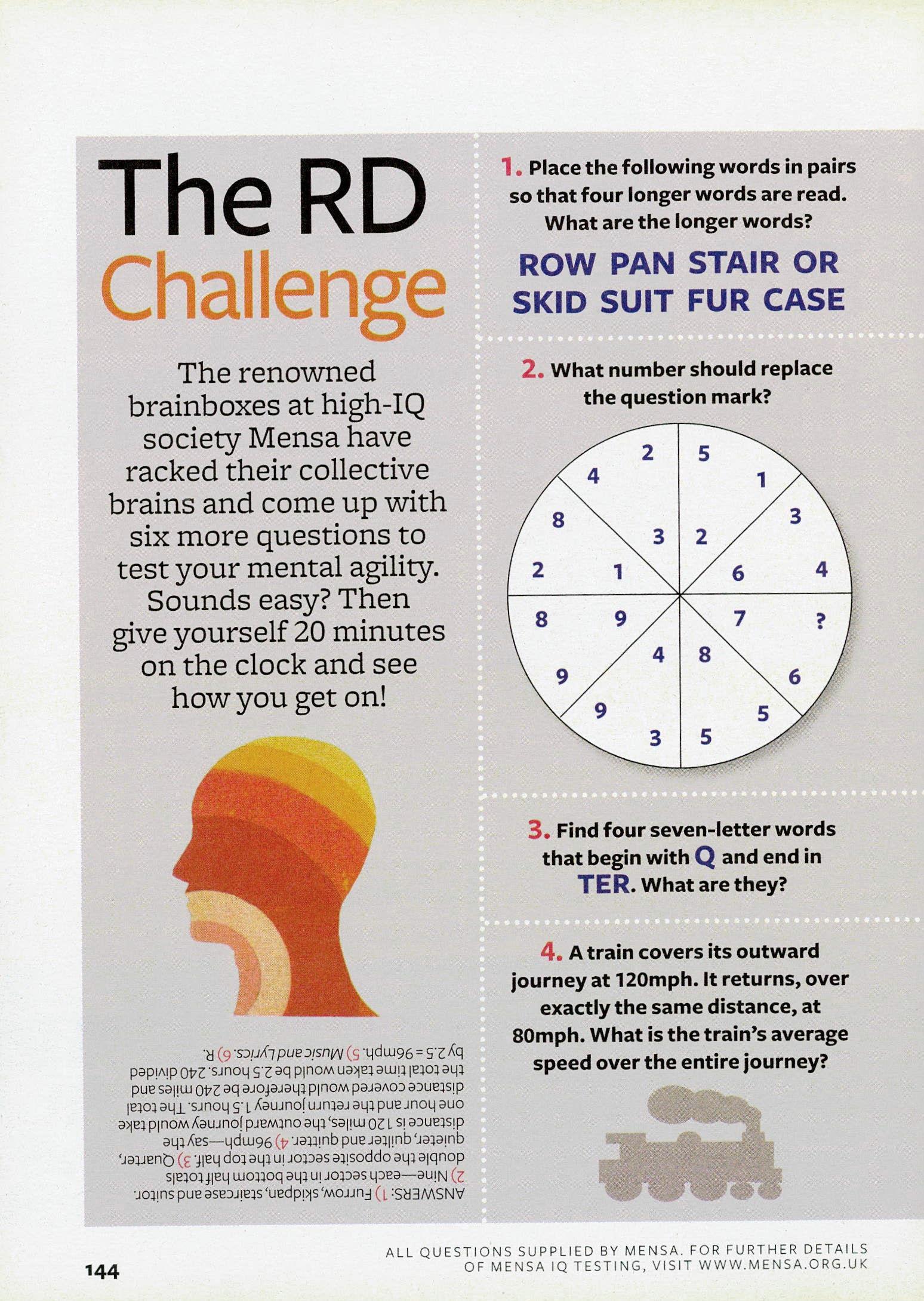
The renowned brainboxes at high-IQ society Mensa have racked their collective brains and come up with six more questions to test your mental agility. Sounds easy? Then give yourself 20 minutes on the clock and see how you get on!
1. Place the following words in pairs so that four longer words are read. What are the longer words?
ROW PAN STAIR OR SKID SUIT FUR CASE
2. What number should replace the question mark?
8 (9'oPk/pue.)!snyv(L, 'ydu-196=S'Z Aq PaP!A!P abz 'sinoy s-z aq pinom uarlawu Ielol ap pue sap.' otz aq aJoiaiaql pinom paianoDaDuels!p 1E101ELLI•sinoq S' Aauinof wnlaa ayl pueJnoq auo pinomAawno[pJemro ayl `salp oz L s!aauelsp alp 4es—ydw96 (LpLIallpb pueJalipb‘..Glapb `JallenZ) (s '}ley dol apu!LiolDas al!soddo ayl annop ELul Jolpas Lpea—au!N (Z Johns pue asep_qels `uedppis`moLun ( L :S2i3MSNV
3. Find four seven-letter words that begin with Q and end in TER. What are they?
4. A train covers its outward journey at 120mph. It returns, over exactly the same distance, at 80mph. What is the train's average speed over the entire journey?
ALL QUESTIONS SUPPLIED BY MENSA. FOR FURTHER DETAILS OF MENSA IQ TESTING, VISIT WWW.MENSA.ORG.UK 144
5. Rearrange the letters of CYNIC SLURS MAID to give the title of a film starring Hugh Grant. What is it?
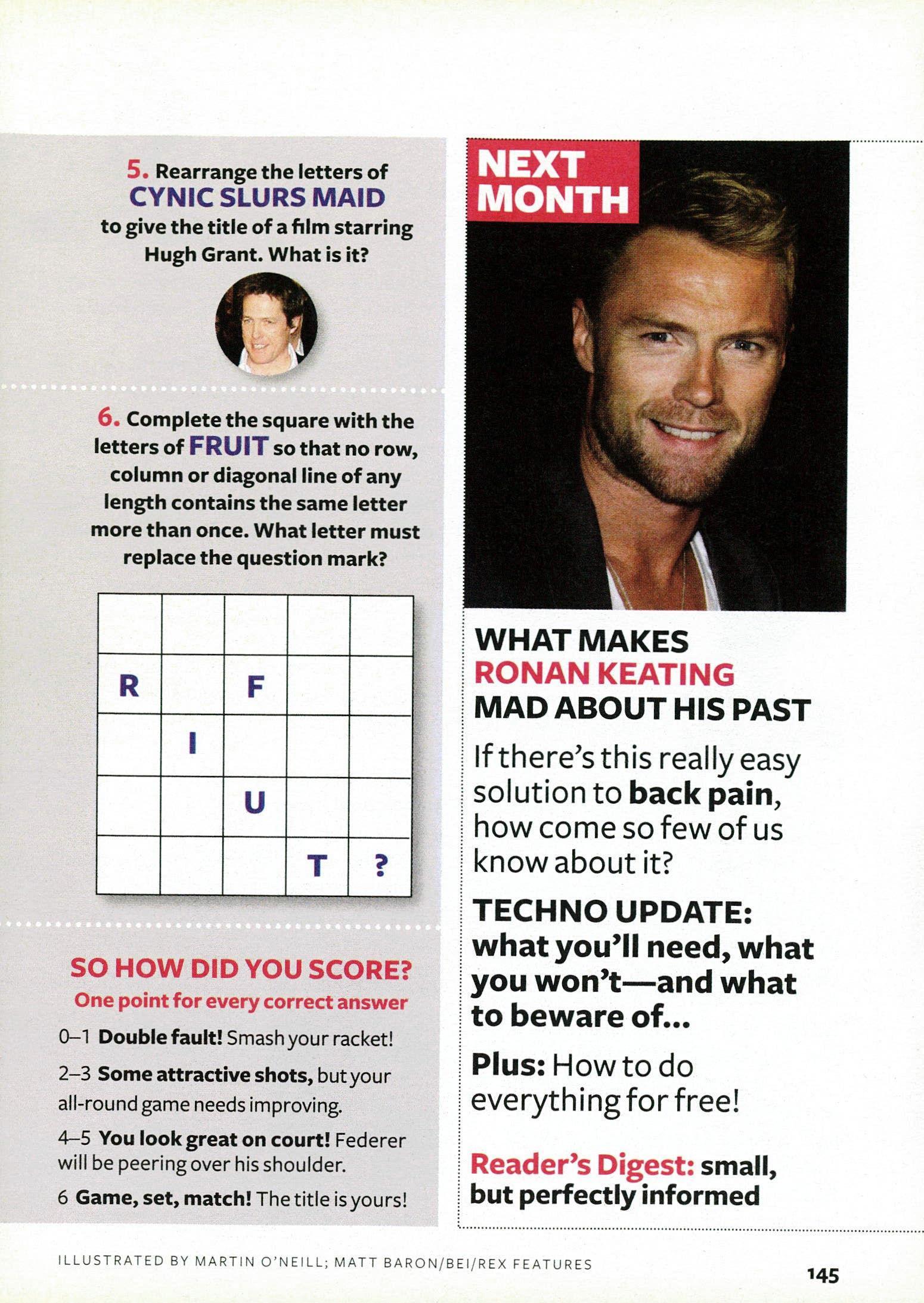
6. Complete the square with the letters of FRUITso that no row, column or diagonal line of any length contains the same letter more than once. What letter must replace the question mark?
F
SO HOW DID YOU SCORE?
One point for every correct answer
0-1 Double fault!Smash your racket!
2-3 Some attractive shots, but your all-round game needs improving.
4-5 You look great on court! Federer will be peering over his shoulder.
6 Game, set, match!The title isyours!
WHAT MAKES RONAN KEATING MAD ABOUT HIS PAST
If there's this really easy solution to back pain, how come so few of us know about it?
TECHNO UPDATE: what you'll need, what you won't—and what to beware of...
Plus:How to do everything for free!
Reader's Digest: small, but perfectly informed
R
I U T
ILLUSTRATED BY MARTIN O'NEILL; MATT BARON/BEI/REX FEATURES 145
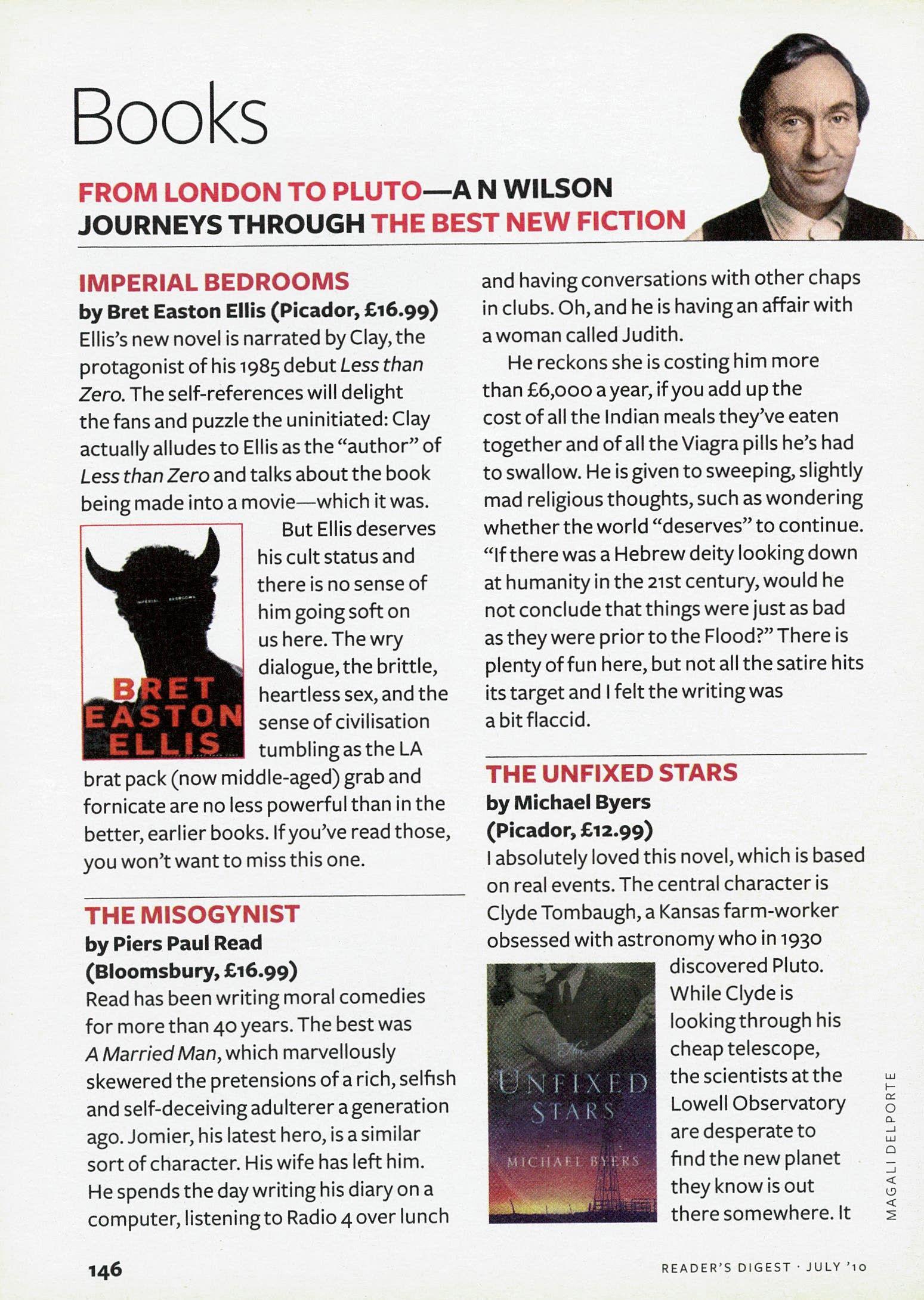
Books
FROM LONDON TO PLUTO-AN WILSON JOURNEYS THROUGH THE BEST NEW FICTION
IMPERIAL BEDROOMS
by
Bret Easton Ellis (Picador, £16.99)
Ellis's new novel is narrated by Clay, the protagonist of his 1985 debut Less than Zero. The self-references will delight the fans and puzzle the uninitiated: Clay actually alludes to Ellis as the "author" of Less than Zero and talks about the book being made into a movie—which it was. But Ellis deserves his cult status and there is no sense of him going soft on us here. The wry dialogue, the brittle, heartless sex, and the sense of civilisation tumbling as the LA brat pack (now middle-aged) grab and fornicate are no less powerful than in the better, earlier books. If you've read those, you won't want to miss this one.
THE MISOGYNIST
by Piers Paul Read (Bloomsbury, £16.99)
Read has been writing moral comedies for more than 4o years. The best was A Married Man, which marvellously skewered the pretensions of a rich, selfish and self-deceiving adulterer a generation ago. Jomier, his latest hero, is a similar sort of character. His wife has left him. He spends the day writing his diary on a computer, listening to Radio 4 over lunch
and having conversations with other chaps in clubs. Oh, and he is having an affair with a woman called Judith.
He reckons she is costing him more than £6,000 a year, if you add up the cost of all the Indian meals they've eaten together and of all the Viagra pills he's had to swallow. He is given to sweeping, slightly mad religious thoughts, such as wondering whether the world "deserves" to continue. "If there was a Hebrew deity looking down at humanity in the 21st century, would he not conclude that things were just as bad as they were prior to the Flood?" There is plenty of fun here, but not all the satire hits its target and I felt the writing was a bit flaccid.
THE UNFIXED STARS
by Michael Byers (Picador,
£12.99)
I absolutely loved this novel, which is based on real events. The central character is Clyde Tombaugh, a Kansas farm-worker obsessed with astronomy who in 1930 discovered Pluto. While Clyde is looking through his cheap telescope, the scientists at the Lowell Observatory are desperate to find the new planet they know is out there somewhere. It
MAGAL I DELP OR TE 146 READER'S DIGEST • JULY ',o
is partly a matter of scientific pride, and partly, after the Wall Street Crash, a matter of national and political significance. Byers evokes the character of Clyde—a difficult, simple man—with great warmth and wit. Another dimension to the story is the wonderful Felix DuPrie, the rich industrialist who comes West to find dinosaurs and, if possible, God. Think of the great open spaces of a John Steinbeck novel. Think of the gin-and-jazz era of Scott Fitzgerald seen through the prism of a fine modern imagination. The result adds up to a great saga of ideas.
INHERITANCE
by Nicholas Shakespeare
(Harvill Secker, £12.99)
Two young men—initially poor and against whom all the odds appear to be stacked—become enormously rich. One, ayoungArmenian, does so in Australia in 1960, by almost literally stumbling on land that contains iron ore. The other is a hapless young publisher, half a century later, who happens to blunder into the wrong crematorium in a London suburb. By the bizarre terms of the Armenian's will, as an attender at the obsequies he receives a share of the loot. From being a penniless drudge, who works ineffectually on selfhelp-books fora hilariously described monster publisher, Andy himself learns the burden and joy of Inheritance. This is a very funny book indeed, beautifully plotted, and it tells a nice morality tale about the nature of avarice, and the absurdity of our times.
RD Book Club
Each month, we invite you to read our recommended paperback and let us have your comments and marks out of ten. Our professional critic A N Wilson then reads the same book and we report on how your views compare with his.
JULY'S CHOICE
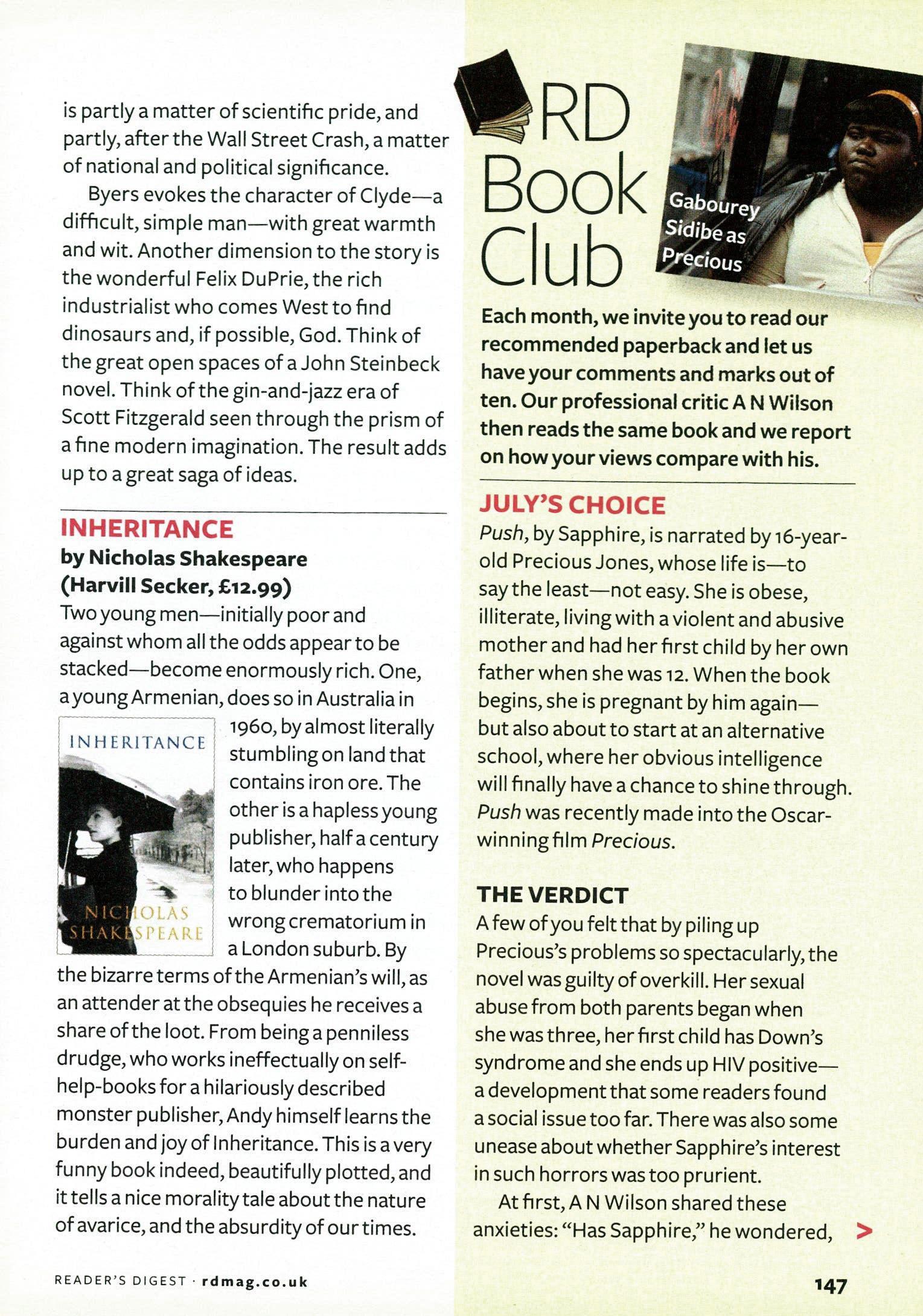
INHERITANCE
Push, by Sapphire, is narrated by 16-yearold Precious Jones, whose life is—to say the least—not easy. She is obese, illiterate, living with a violent and abusive mother and had her first child by her own father when she was 12. When the book begins, she is pregnant by him again— but also about to start at an alternative school, where her obvious intelligence will finally have a chance to shine through. Push was recently made into the Oscarwinning film Precious.
THE VERDICT
A few of you felt that by piling up Precious's problems so spectacularly, the novel was guilty of overkill. Her sexual abuse from both parents began when she was three, her first child has Down's syndrome and she ends up HIV positive— a development that some readers found a social issue too far. There was also some unease about whether Sapphire's interest in such horrors was too prurient.
At first, A N Wilson shared these anxieties: "Has Sapphire," he wondered, >
READER'S DIGEST rdmag.co.uk
147
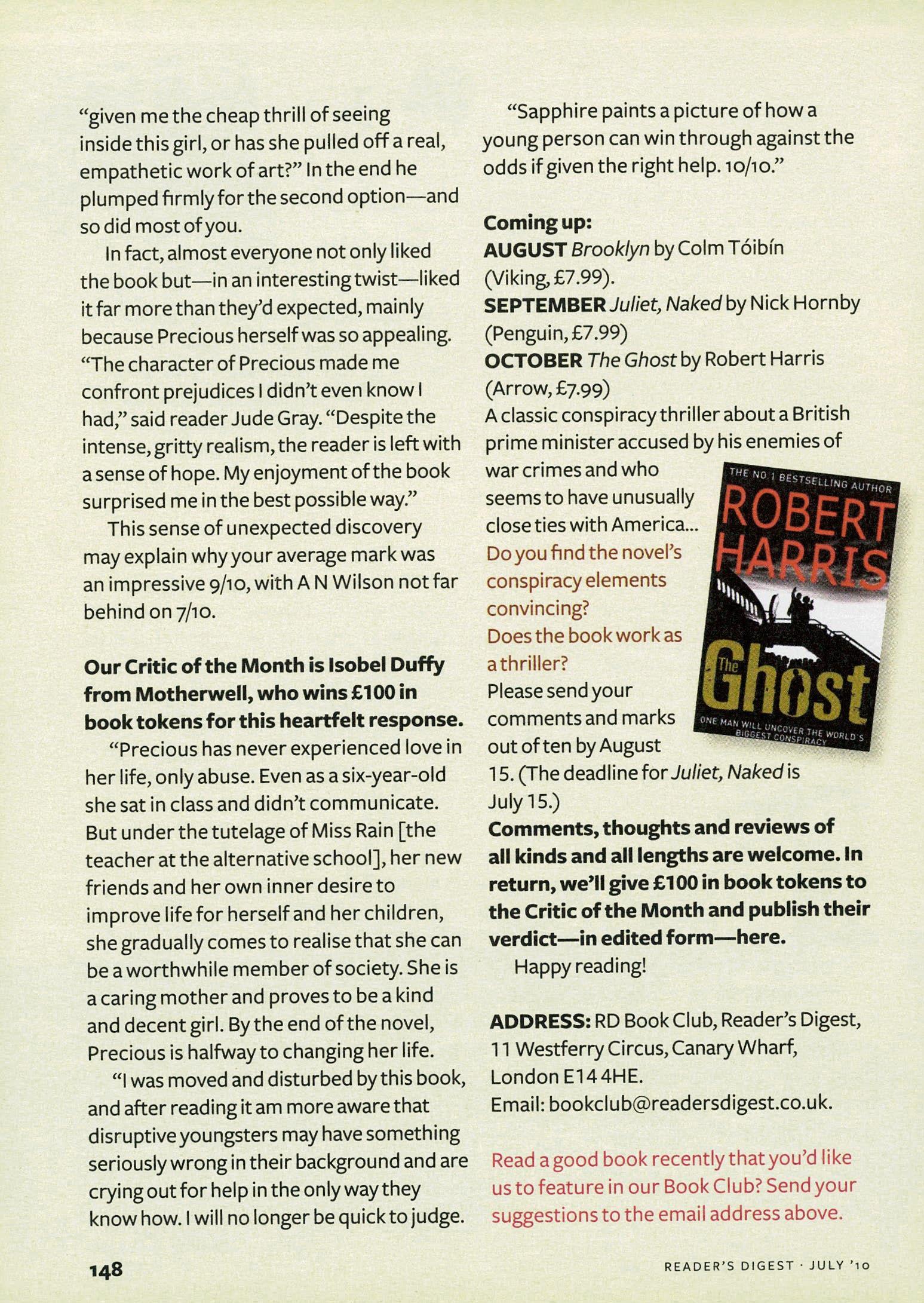
"given me the cheap thrill of seeing inside this girl, or has she pulled off a real, empathetic work of art?" In the end he plumped firmlyfor the second option—and so did most of you.
In fact, almost everyone not only liked the book but—in an interesting twist—liked it far more than they'd expected, mainly because Precious herself was so appealing. "The character of Precious made me confront prejudices I didn't even know I had," said reader Jude Gray. "Despite the intense, gritty realism, the reader is left with a sense of hope. My enjoyment of the book surprised me in the best possible way."
This sense of unexpected discovery may explain whyyour average mark was an impressive 9/10, with A N Wilson not far behind on 7/10.
Our Critic of the Month is Isobel Duffy from Motherwell, who wins CI00 in book tokens for this heartfelt response.
"Precious has never experienced love in her life, only abuse. Even as a six-year-old she sat in class and didn't communicate. But under the tutelage of Miss Rain [the teacher at the alternative school], her new friends and her own inner desire to improve life for herself and her children, she gradually comes to realise that she can be a worthwhile member of society. She is a caring mother and proves to be a kind and decent girl. By the end of the novel, Precious is halfway to changing her life.
"I was moved and disturbed bythis book, and after reading it am more aware that disruptiveyoungsters may have something seriously wrong in their background and are crying out for help in the only way they know how. I will no longer be quick to judge.
"Sapphire paints a picture of how a young person can win through against the odds if given the right help. mho."
Coming up:
AUGUSTBrooklyn by Colm Taibin (Viking, £7.99).
SEPTEMBERJuliet, Naked by Nick Horn by (Penguin, £7.99)
OCTOBER The Ghost by Robert Harris (Arrow, £7.99)
A classic conspiracy thriller about a British prime minister accused by his enemies of war crimes and who seems to have unusually close ties with America... Do you find the novel's conspiracy elements convincing? Does the book work as a thriller?
Please send your comments and marks out of ten by August 15. (The deadline forJuliet, Naked is July 15.)
Comments, thoughts and reviews of all kinds and all lengths are welcome. In return, we'll give £100 in book tokens to the Critic of the Month and publish their verdict—in edited form—here.
Happy reading!
ADDRESS:RD Book Club, Reader's Digest, 11 Westferry Circus, Canary Wharf, London E14 4HE.
Email: bookclub@readersdigest.co.uk.
Read a good book recently that you'd like us to feature in our Book Club? Send your suggestions to the email address above.
EESTSELLINf HOR t'UBERT T _ GhTist ONE MAIN3 UN% WOE S
148 READER'S DIGEST • JULY 'to
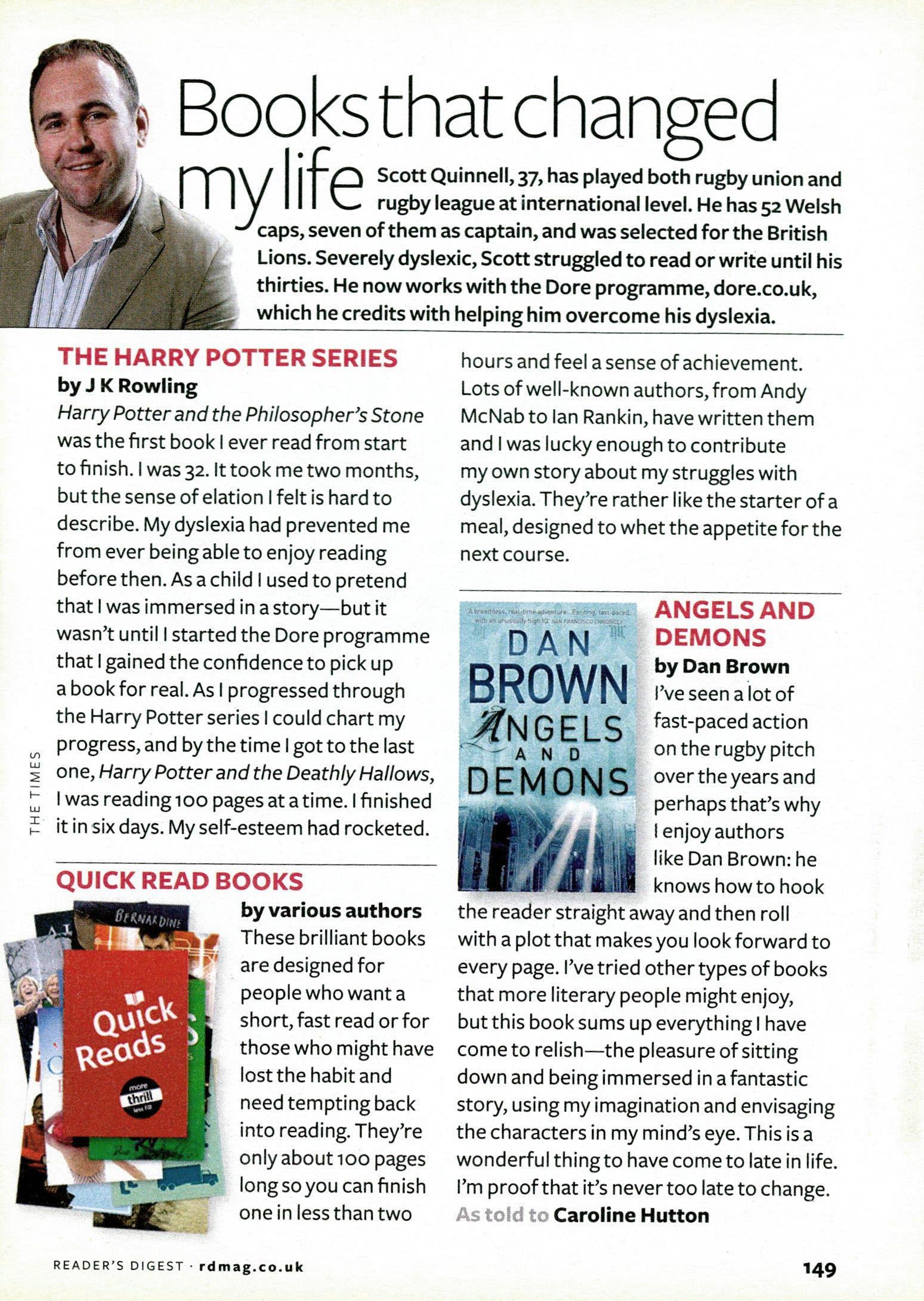
Books that changed
m lifeScott Quinnell, 37, has played both rugby union and rugby league at international level. He has 52 Welsh caps, seven of them as captain, and was selected for the British Lions. Severely dyslexic, Scott struggled to read or write until his thirties. He now works with the Dore programme, dore.co.uk, which he credits with helping him overcome his dyslexia.
THE HARRY POTTER SERIES
by J K Rowling
Harry Potter and the Philosopher's Stone was the first book I ever read from start to finish. I was 32. It took me two months, but the sense of elation I felt is hard to describe. My dyslexia had prevented me from ever being able to enjoy reading before then. As a child I used to pretend that I was immersed in a story—but it wasn't until I started the Dore programme that I gained the confidence to pick up a book for real. As I progressed through the Harry Potter series I could chart my progress, and by the time I got to the last one,Harry Potter and the Deathly Hallows, I was reading i oo pages at a time. I finished F- it in six days. My self-esteem had rocketed.
QUICK READ BOOKS
by various authors
g These brilliant books are designed for people who want a short, fast read or for those who might have lost the habit and need tempting back into reading. They're only about loo pages long so you can finish one in less than two
hours and feel a sense of achievement. Lots of well-known authors, from Andy McNab to Ian Rankin, have written them and I was lucky enough to contribute my own story about my struggles with dyslexia. They're rather like the starter of a meal, designed to whet the appetite for the next course.
DAN BROWN NGELS 'AND DEMONS
ANGELS AND DEMONS
by Dan Brown
I've seen a lot of fast-paced action on the rugby pitch over the years and perhaps that's why I enjoy authors like Dan Brown: he knows how to hook
the reader straight away and then roll with a plot that makes you look forward to every page. I've tried other types of books that more literary people might enjoy, but this book sums up everything I have come to relish—the pleasure of sitting down and being immersed in a fantastic story, using my imagination and envisaging the characters in my mind's eye. This is a wonderful thing to have come to late in life. I'm proof that it's never too late to change. Caroline Hutton
READER'S DIGEST rdmag.co.uk
149
Laughter) THEBESTMEDICINE
> My boss questioned my enthusiasm today.
I can't believe he woke me up to tell me that. John Tunney, Corby, Northamptonshire
I hate people who say time travel is a stupid idea. It's that kind of attitude that lost us World War Three
> I got stopped by a policeman with a radar gun the other day.
"Bit of a speed merchant are we, sir?" he asked.
"A bit, now and then," I replied. "But I only sell to friends."
So, now, as well as three points, I'm looking at three months.
9 I went into my local newsagents and saw that he'd put up a big sign saying,"NO READING IN
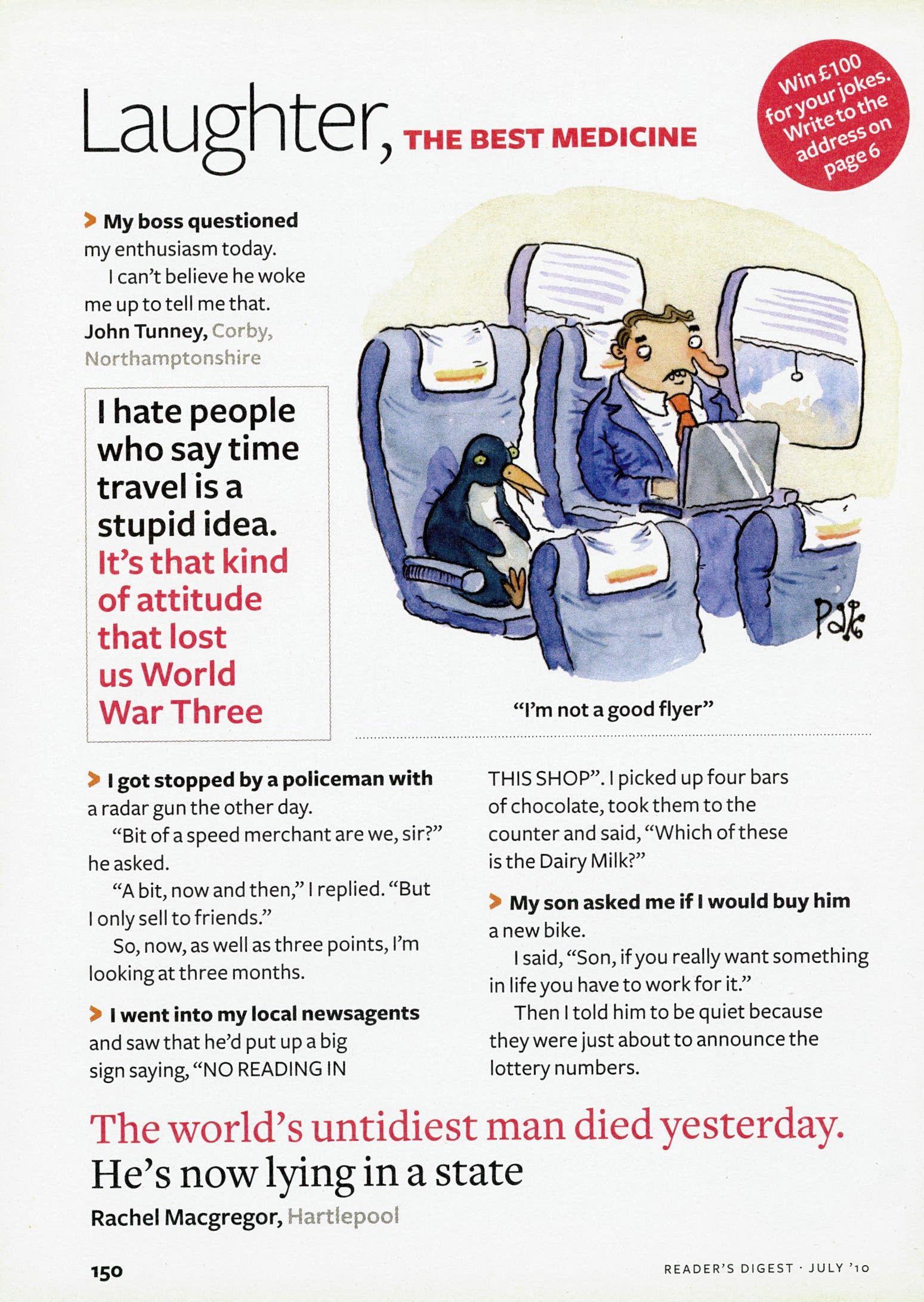
"I'm
not a good flyer"
THIS SHOP". I picked up four bars of chocolate, took them to the counter and said, "Which of these is the Dairy Milk?"
> My son asked me if I would buy him a new bike.
I said, "Son, if you really want something in life you have to work for it."
Then I told him to be quiet because they were just about to announce the lottery numbers.
The world's untidiest man died yesterday. He's now lying in a state
Rachel Macgregor,
150 READER'S DIGEST • JULY
M, PLS RITE ON TABS
8c GIV 2 PPL
If God had texted the Ten Commandments to Moses:
1. not b4 me. srsly.
2. dnt wrshp pix/idols
3. no omg's
4. no wrk on w/end (sat 4 now; sun 18r)
5. pos ok - ur m&d r cool
6. dnt kill ppl
7. :-X only w/ m8
8. dnt steal
9. dnt lie re: bf
10.dnt ogle ur bf's m8. or ox. or dnkey. myob.
Jamie Quatro on mcsweeneys.net
> I don't think bigamists should be prosecuted. Surely having two mothersin-law is punishment enough? Tracy Davidson, Stratford-upon-Avon, Warwickshire
> For most of my childhood, I was under the impression that one of the most exciting, fun-filled, action-packed professions in the world was being a plumber. Now I've picked it as a career choice, I see the mistake I've made.
Thanks for ruining my life, Mario.
shouldn't
so sentimental
about public transport I missed my bus this morning.
From the unashamedly cutesy photoblog babiesmakingfaces.com
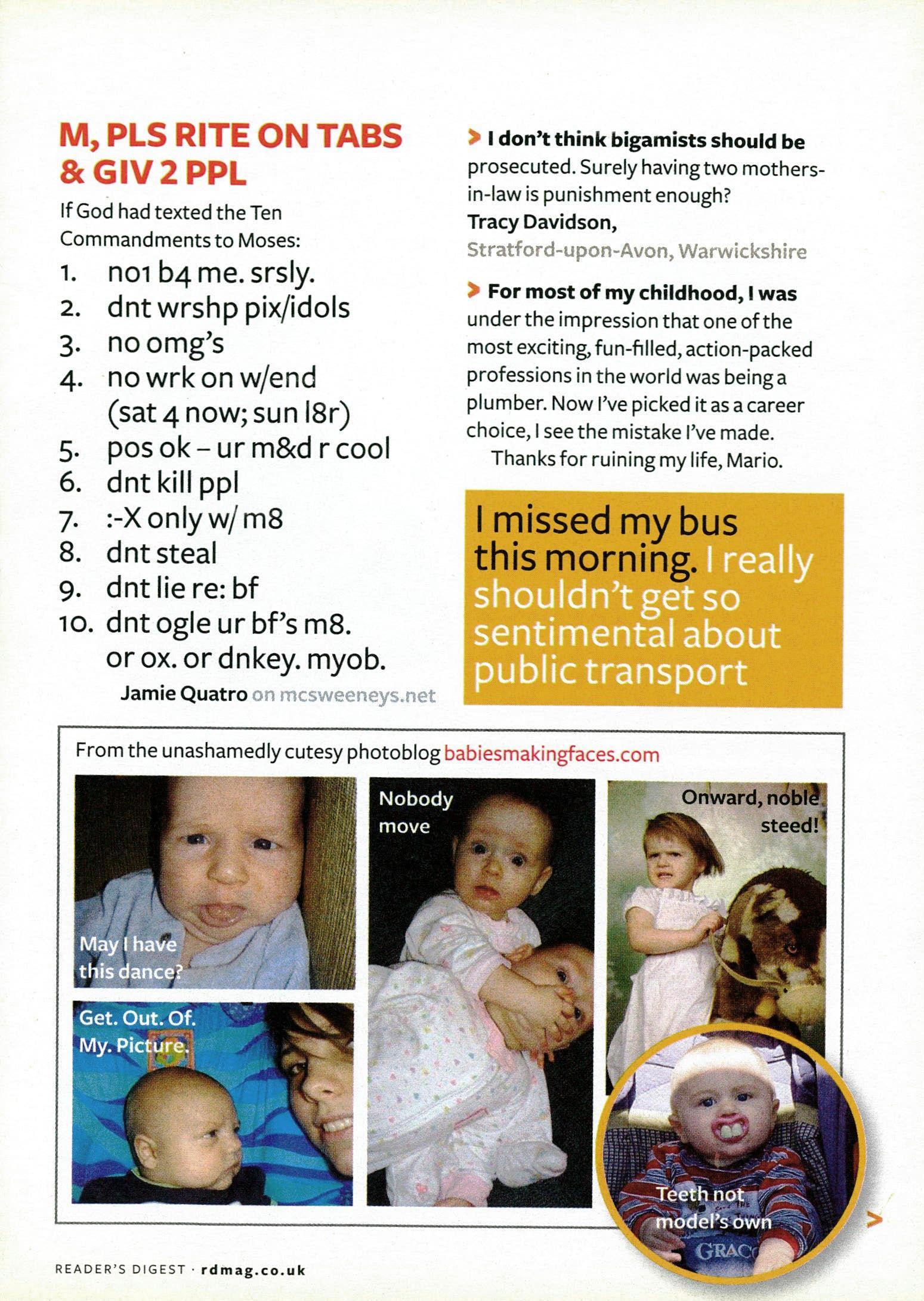
May I have this dance?
READER'S DIGEST rdmag.co.uk
eally
Laughter
I love doing stand-up comedy. It's just as well, because there are no transferable job skills. I went to an interview and they said, "Mr Lawrence, what skills and experience have you got that are relevant to this position?"
I said, "Well, I can take the **** out of someone for half an hour and it'll be funny."
"That's lovely, Mr Lawrence," they said. "But it's not really what we do here at Child Line."
Comedian Andrew Lawrence
"The Too Ugly For Television Tour 2010" is at the Pleasance Courtyard, Edinburgh, August 4-29.
Inexplicable truths—No 20 Drinking alcohol makes you lose things
Memories are drip feeding back to you through an aching head. You remember havingyour keys, wallet and phone in the pub. You may have had them in the taxi home, but you're not sure.
You can certainly recall checking your pockets several hundred times at the front door, as the blood-draining realisation you'd have to wake someone up to get in started to dawn.
Next morning, it's suggested frostily that you consider wearing elasticated mittens—as seen strung through
"Sometimes, I like to make chocolate bicycles out of Wagon Wheels and chocolate fingers. Then you can park them in a Toblerone bike rack" Bill Bailey
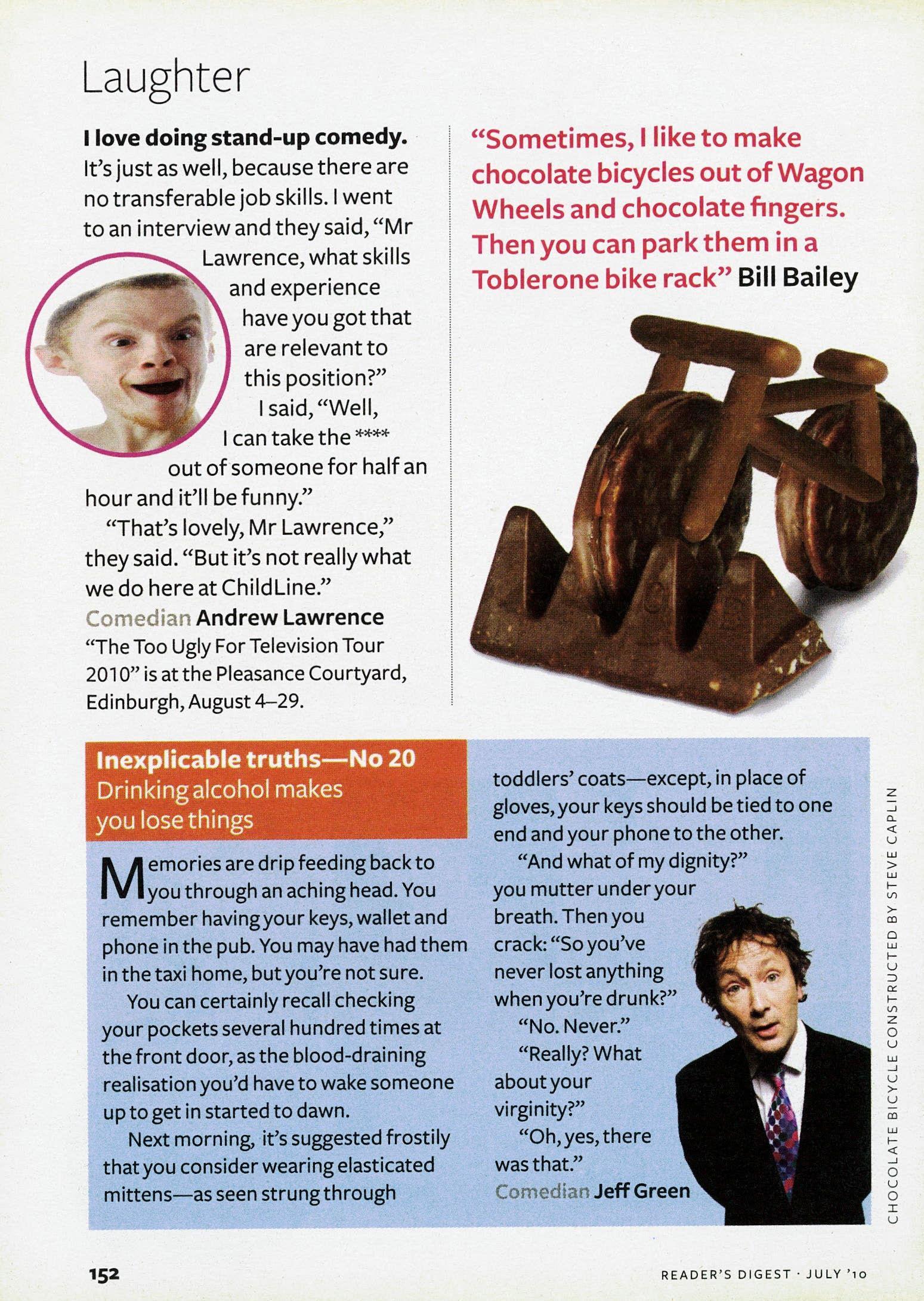
toddlers' coats—except, in place of gloves, your keys should be tied to one end and your phone to the other.
"And what of my dignity?" you mutter under your breath. Then you crack: "So you've never lost anything when you're drunk?"
"No. Never."
"Really? What about your virginity?"
"Oh, yes, there was that."
Jeff Green
C HOCO LA TE BICYCLE CONS TRUC TED BY S TEVE CAPLIN 152 READER'S DIGEST JULY ',o
"Not that one, nurse. That's his MP3 player"
SAFETY IN NUMBERS
Webblog learnfrommy fail. corn givesyou a clear route through life by drawing wisdom from the mistakes of other users
• Take your dentist's advice and go home after a wisdom-tooth extraction. Do not go back to the office. You WILL email your customers and they WILL NOT like what you have to say. Happy In Vicodinland
• If you see a hairylooking brown thing in the shower, ALWAYS look to make sure that it is in fact
hair that came out while you were washing and NOT the most terrifying bugyou've ever seen. I almost picked it up
• Just because you can do something on the trampoline doesn't mean you can do it on the ground.Seth
• When crossing an international border, never answer "Not today" when asked if you are bringing in any guns or explosives.Christina
• Even though the bottle says not to drive or operate heavy machinery, assume this also means "online
I have mixed emotions when I receive Father's Day gifts. I'm glad my children remember me, but I'm disappointed they actually think I dress that way
Comedian Mike Dugan
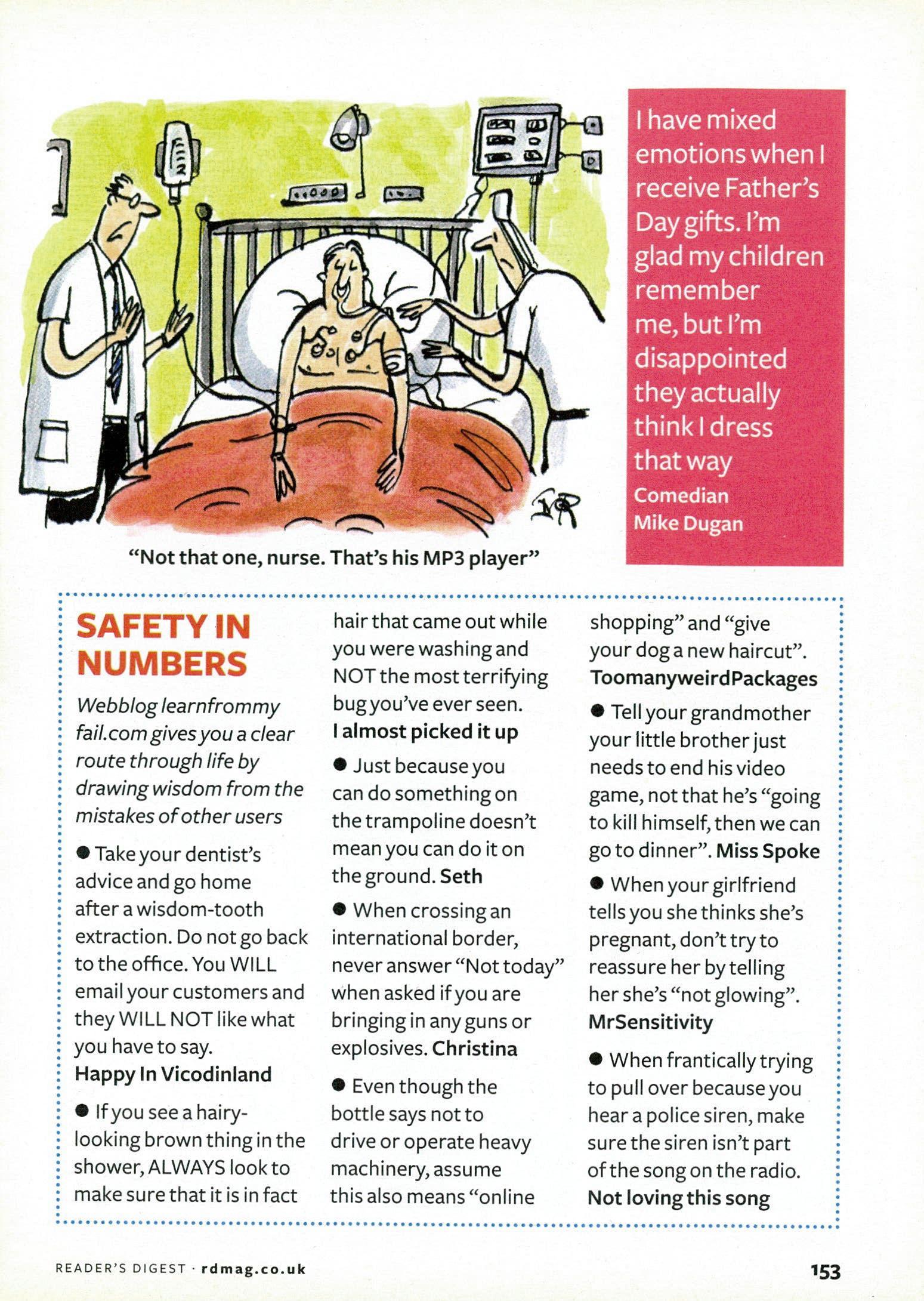
shopping" and "give your dog a new haircut". ToomanyweirdPackages
• Tell your grandmother your little brother just needs to end his video game, not that he's "going to kill himself, then we can go to dinner".Miss Spoke
• When your girlfriend tells you she thinks she's pregnant, don't try to reassure her by telling her she's "not glowing".
MrSensitivity
• When frantically trying to pull over because you hear a police siren, make sure the siren isn't part of the song on the radio. Not loving this song
READER'S DIGEST • rdmag.co.uk 153
•

•
Take the struggle out of pushing up-hill, over ramps or uneven ground. Simply walk behind with your thumb on the control Simple! Motabil ity FREEPHONE 0800 107 5349 www.tga-electric.com QUOTE. RD01071 OPP 1111P_Care in &INN No-one takes better care of you. I CALL OUR FREE ADVICELINE NOW :1'1 11 I easequ• e Over 50s Travel Insurance K, Policies from £3.38 X. Most medical conditions covered 220+ FREE! K, Policies available up to age 85 • 5% Discount Quote code RD Call for an Instant quote: 0844 2 772 772 staysure the over 50s experts www.staysure.co.uk ABTA travel Industry partners RETIREMENT To advertise in this section please call Emma Briedis on 020 3177 1167 A new home in East Anglia Independent living for active retirees
Attractive locations where you can make the most of your leisure years
built, low maintenance properties with stylish features
contemporary fittings
• Traditionally
and
Award-winning builder with over 6o years experience
• Two, three, and four bedroom bungalows and houses
Quote ref RD7 tto Prices correct at time of going to press Bennett Homes Low Green Bam Nowton Bury St Edmunds Suffolk 11729 5ND BENNM HOMES At home in East Anglia 154
• Prices range from £123,995 to £349,995 Call 01284 766057 or write for a free brochure www.bennett-homes.co.uk/rd7 I o
Whybuynewglasses whenyouonlyneed newlenses?
Framesavers is a new concept internet/mail order based company which enables customers to have their own frames 're-lensed' with new prescription lenses for a fraction of the cost of new spectacles.
• Single Vision re-lens from £29.95 inc P&P
• Bifocal re-lens from £39.95 inc P&P
• Varifocal re-lens from £54.95 Inc P&P

1.Request your FREE POST PAID packaging, by calling FREEPHONE 0808 1681 833 or request online at www.framesavers.com.
2. Complete the order form and return it to us with your glasses and prescription.
3. We return your glasses re-lensed to your new prescription.
We put new lenses in your own glasses
steps to savemoney...
framesaversacom
Over 10,000 satisfied customers Read their comments at www.framesavers.com Transitins Request your free post paid packaging now on Healthy sight in every light FREEPHONE 0808 1681 833 or call 07934 407484 Transitions lenses available Open 6 days a week, Monday to Saturday 9.30-5.30 newlenses, noproblem! Live life to the full ...with a Brotherwood wheelchair car HOTLINES To advertise in this section please call Emma Briedis on 020 3177 1167 155
BUYLINES HEALTH
To advertise in this section please call Emma Briedis on 020 3177 1167
Night time support for the menopause
The menopause is a natural stage of life that every woman goes through. Thousands of women worldwide have discovered that Menopace, the UK's No.1 selling supplement for this stage of life, gives them effective nutritional support to help maintain health and vitality. New Menopace Night is a specially formulated food supplement for women during and after the menopause that are looking for additional support at night. Optimal nutrition is important during the menopause, whether or not you decide to take HRT. Menopace Night provides a unique formula of 24 advanced nutrients combining all the benefits of the proven original Menopace® multinutrient tablet with the additional support of Chamomile, Hops and 5-HTP (5Hyd roxytryptophan).
Menopace Night is available in the UK from Boots, chemists, health stores and www.menopace.com priced at £12.95 for 30 tablets (one p/day)
HOTLINES

CANOPIES UK
If you are looking for a patio canopy, a car port or a door canopy, Canopies UK have the perfect range for your home. Our unique 'no-legs' design means every canopy is completely self-supportive, giving you more space and means there are no posts to bump into.
A stronger pelvic floor in 2 weeks!
Clinical trials show that the PelvicToner" helps you correctly identify and exercise your pelvic floor muscles.
Strengthening muscles stretched or weakened by childbirth or menopause means better bladder control, fewer embarrassing leaks when you exercise, cough or sneeze, and tighter intimate contact!
You'll notice the difference in a few days! Just £29.99 + £2.00 p&p. For more information visit
the pressure and the pain of corns with Carnation Corn Caps. Available in packs of 5 and 10 plasters from your pharmacy. Clinically proven to remove corns
www.pelvictoner.co.uk or
0117 968 1414
call
STAIRLIFTS FROM HELPTHEAGED Low Price Guarantee* From A Name Call for a quotation or information You Can Trust 'Please ask ask an advisor for details. Age Concern England and Help the Aged merged on the 1st April 2009. Together they have formed Age UK (charity No. 1128267), a single charity dedicated to improving the lives of older people. 50% of all stairtift profits go directly to the charity. Help the Aged working in partnership with Minivator Group. 0800 019 8625
ARE YOU A VICTIM OF FASHION?
(CARNATION , FOOTCARE www.carnationfootcare.co.uk Contains Salicylic Acid Always read the pack label 01254 777002 info@canopiesuk.com 156
Relieve

Manor House & Ashbury Golf Hotels Nr. Okehampton, West Devon \}‘ ,0e4\t1 SPORT•CRAFT•LEISURE includes FREE Golf, Bowls, Tennis, Swimming and Guided Walks on Dartmoor l'recphone 0800 781 9714 www.rnanorhousehoteI.co.uk "sting Travel Insurance medical conditions up to age 85 covered Call For a friendly service FREE 0800 066 5604 avantitravelinsurance.co.uk T&C's & Exclusions apply call for details Authorised and iregoialod by The financlal Service& AulbotliT D ROM WSW WAS SARMAL AIR PEW COIN. PRAMS(2rROMS SWIM Su rttrinfficr 4 WORME The 'Sheila Maid' CM 101611tlik 1.140,11/1 MOM, NM TheDOMINIC Poraphornorta Co RS '0010INAL' (Coelims Only MINI Ow Cooled) M 159 M 182 WI 585 Morgiolls4 Groh book MOO IIT f42 PI 155 WI VI NI 141 PO M.M0Asn ORDER boarsMIN V/7 lilt Irma rihvarkilomort. Ovia A superb collection of hand-picky, cottages ©01237 4-59878 Cornwall I Devon I Somerset Dorset holidaycottages.co.uk LIVE TAROT & PSYCnC REAU■NGS ■ S ,A NSW! Text`DIGESrtD 0800 028 1693 (fill-1'1)4ml. Rill 0906 753 9233 BOOK PUBLISHING Authorsinvited to submit manuscripts all categories including poetry New Authors Welcome A.H. STOCKWELL LTD, Dept 937 Ilfracombe, Devon, EX34 8BA Tel:01271 862557 Publishers for 100 Fears www.ahstockwell.co.uk AUTHORS Let me find you the BEST publisher for your book. Former book publishing chairman offers FREE advice. Tel: 07766 239752 E: bibex@ymaiicom HOTLINES To advertise in this section please call Emma Briedis on 020 3177 1167 NEW AUTHORS PUBLISH YOUR BOOK ALL SUBJECTS INVITED WRITE OR SEND YOUR MANUSCRIPT TO: ATHENA PRESS QUEEN'S HOUSE, 2 HOLLY ROAD, TWICKENHAM TW1 4EG, ENGLAND www.athenapress.com e-mail: info@athenapress.com HOW IS IT THAT WE LIVE ANTER DEATH AND WHAT IS THE MEANING OF LIFE by Dr. Richard Steinpach Fascinating information on life and the afterlife! FREE 64 page bookletquote ref RD09: Grail Acres Publishing Company 11 020 8308 9575E: gapc@btconned.com www.in-the-light-of-truth.org AUTHORS PLEASE SUBMIT: A synopsis plus sample chapters (3) for consideration. I Olympia Publishers I www.olymoiaDublishers.com 60 Cannon Street, LONDON. EC4N 6NP 157
"After
5
years of suffering...
I now have no pain or swelling in my legs"
Ideal for men and women aged 18 to 101!
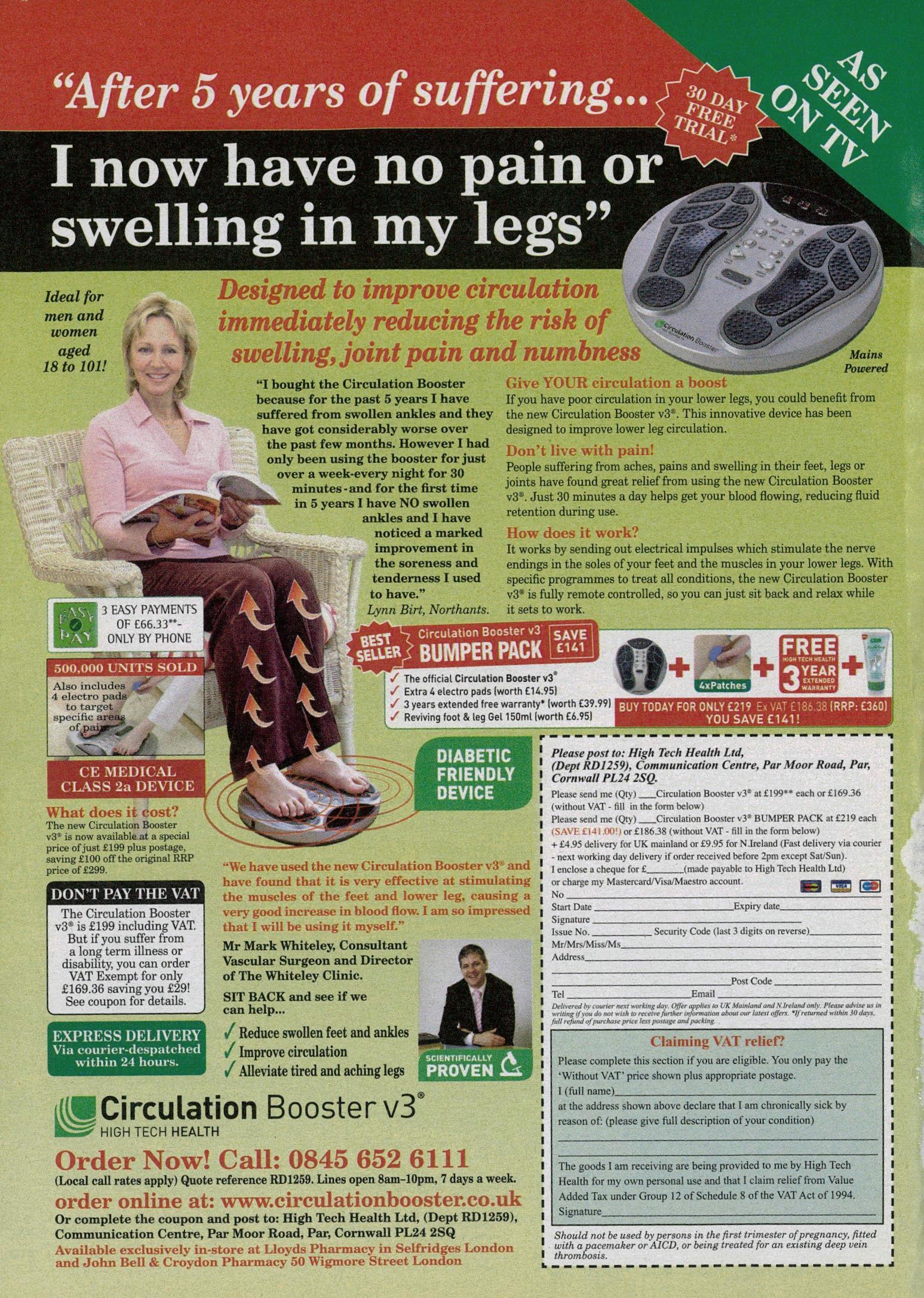
3 EASY PAYMENTS OF E66.33^ONLY BY PHONE 500,000 UNITS SOLD
Designed to improve circulation immediately reducing the risk of swelling, joint pain and numbness
"I bought the Circulation Booster because for the past 5 years I have suffered from swollen ankles and they have got considerably worse over the past few months. However I had only been using the booster for just over a week-every night for 30 minutes • and for the first time in 5 years I have NO swollen ankles and I have noticed a marked improvement in the soreness and tenderness I used to have."
Lynn Birt, Northants.
Give YOUR circulation a boost
If you have poor circulation in your lower legs, you could benefit from the new Circulation Booster v3°. This innovative device has been designed to improve lower leg circulation.
Don't live with pain!
People suffering from aches, pains and swelling in their feet, legs or joints have found great relief from using the new Circulation Booster v3°. Just 30 minutes a day helps get your blood flowing, reducing fluid retention during use.
How does it work?
It works by sending out electrical impulses which stimulate the nerve endings in the soles of your feet and the muscles in your lower legs. With specific programmes to treat all conditions, the new Circulation Booster v3° is fully remote controlled, so you can just sit back and relax while it sets to work.
Circulation Booster 93! SAVE I BUMPER PACK £141
/ The official Circulation Booster re ✓ Extra 4 etectro pads [worth C14.951 ✓ 3 years extended free warranty. (worth 039.991 / Reviving loot & Leg Set 150ml (worth (6.951
DIABETIC FRIENDLY DEVICE CE MEDICAL CLASS 2a DEVICE
What does it cost?
The new Circulation Booster v3c is now available at a special price ofjust £190 plus postage, saving £100 off the original RAF price of £299.
details.
DELIVERY Via courier-despatched within 24 hours.
"We have used the new Circulation Booster v3' and have found that it is very effective at stimulating the muscles of the feet and lower leg, causing a very good increase in blood flow. I am so impressed that I will be using it myself."
Mr Mark Whiteley, Consultant Vascular Surgeon and Director of The Whiteley Clinic.
SIT BACK and see if we can help...
/ Reduce swollen feet and ankles / Improve circulation / Alleviate tired and aching legs
.Circulation Booster v3° HIGH
Order Now! Call: 0845 652 6111
(Local call rates apply) Quote reference RD1259. Lines open Sam-lOpm, 7 days a week. order online at: wvvw.cireulationbooster.co.uk Or complete the coupon and poet to:
Pats he
Please post to: High Tech Health Ltd, (Dept RD1259), Communication Centre, Par Moor Road, Par, Cornwall PL24 2SQ.
Please send we (Qty) _Circulation Booster 53° at E195.• each or £16936 !without VAT -NI in the form below)
Please send me (Qty) _Circulation Boomer c3. BUMPER PACK at 4219 each SAVE €141.00,,or £18638 (without VAT - fill in the from below)
Ea95delivery for UK mainland or £9.95 for N.Irelead (Fast delivery via courier - next working day delivery if order received befom 2pm except Sat/Sun).
IencloseachequeforE (madepayabletoHighTechHealthLad) or charge my Mastercard/Visa/Maestro Kean. 11111 OE I= No Stan Date Expirydam Signature
Its. No. Security Code (last 3 digits on reverse)
Mr/Mrs/Miss/Ms Address
Tel Email
Post Code
Claiming VAT relief?
Ilene complete this section if you are eligible. You only pay the 'Without VAT' price shown plus appropriate postage. I (full name) at the address shown above declare that I am chronically sick by reason of: (please give Ell description of your condition)
The goads I am receiving are being
High
Health
Added Tax
Signature Should not be used by persons in the first trimester''ofpeg ancy,fitted th:LLemaker or AICD, or being treated joanexidingdeeivein zo DON'T
THE VAT
Booster
provided to me by
Tech
for my own personal use and that I claim relief from Value
under Group 12 of Schedule 8 of the VAT Act of 1994.
PAY
The Circulation
v3. is £199 including VAT But if you suffer from a long term illness or disability, you can order VAT Exempt for only £169.36 saving you £29! See coupon for
EXPRESS
Mains Powered
BUYTODAYFORONLY£219 Ex VAT (186.38 (REP:£3601 YOU SAVE £141!
„st
TECH HEALTH
Available exclusively in-store at Lloyds Pharmacy in Selfridges London and John Bell & Croydon Pharmacy 50 Wigmore Street London
High Tech Health Ltd, (Dept RD1259), Communication Centre, Par Moor Road, Par, Cornwall PL24 2SQ
Beat the Cartoonist
WIN £200 AND A SIGNED ILLUSTRATION
Think of a witty caption for this picture and you could beat the comedy experts at their own game. The three best suggestions will be posted on our website in mid-July alongside an anonymous caption from our professional cartoonist. Visitors can choose their favourite and if your entry gets the most votes, you'll receive £200 and the original, signed drawing.Submityour captions to captions@readersdigest.co.uk or the address on page 6 by July 12. You can also enter and vote online at readersdigest.co.uk/caption_ contest.php. We'll announce the winner in our September issue.
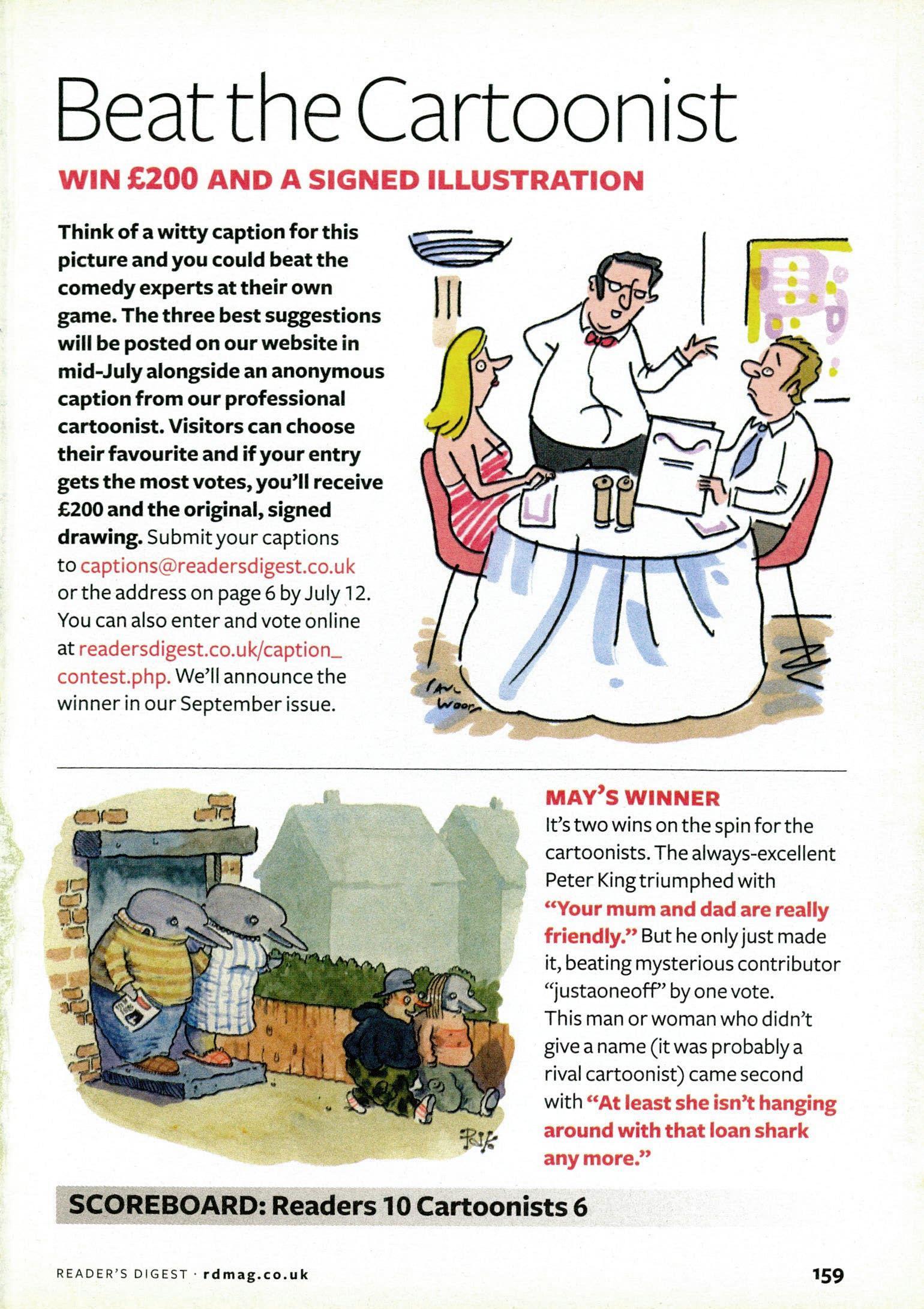
MAY'S WINNER
It's two wins on the spin for the cartoonists. The always-excellent Peter Kingtriumphed with "Your mum and dad are really friendly."But he only just made it, beating mysterious contributor "justaoneoff" by one vote. This man or woman who didn't give a name (it was probably a rival cartoonist) came second with"At least she isn't hanging around with that loan shark any more."
Tfr SCOREBOARD: Readers 10 Cartoonists 6 READER'S DIGEST rdmag.co.uk 159
Win a Willowbrook Recliner
Plus 100 lucky customers qualify for £150 trade-in for their old chair and 35% discount'

Made in Britain or over 13 years
Join 1000s of other satisfied customers and experience a riser recliner for yourself.
Combine style and luxury with the comfort of a Willowbrook recliner.
We have a vast selection of models to choose from and an extensive range of fabrics including draylon and leather, so it's easy to find the recliner to suit you.
Hand-built by British craftsmen, our recliners cater to your requirements.
A Willowbrook riser recliner can help you:
• Watch TV more comfortably
• Read more easily
• Have positional support where needed
Plus, with the optional built-in 5-point massage system, a luxurious massage is just a touch of a button away.
And you could win one or be a lucky qualifying customer, by simply calling 0800 854 330 today or returning the freepost coupon. So why not enter now?
Closing date 30th July 2010.
• Extensive range of models
See us on TV
• Vast range of colours and luxury fabrics
• 5-point massage systems
• Free delivery and installation
• Long & meaningful guarantee
• Removal of existing furniture if required
Or return the freepost coupon.
ILLOWBR00;c Riser Recliners
res

-here are many claims that are made, ,ut really how versatile is a rising and eclining chair?
'urchased in the main by those suffering with eakness to the arms, hands, knees and hips, an •fective recliner will bring the user to their feet id back into a myriad of sitting or reclining .)sitions easily and safely by just pressing a .mote control button.
Willowbrook we are proud of our hard earned :putation for producing quality products and.-oviding exceptional standards of service.
'le following extracts are genuine and taken from stimonial letters received from satisfied users of villowbrook rising and reclining chairs.
ervice
tl your staff have been pleasant and helpful and must pay special tribute to your advisor who .Amonstrated and advised on my choice of recliner, 44ry impressed" Mrs B. Gloucestershire
ositional support
10 longer have to put strain on my hands, elbows id shoulders to get up from a sitting position — thus ising the pain in my upper body. I would always commend Willowbrook to anyone wishing to make eir life easier" Mrs Willesden, Gloucestershire
Comfort
"I am delighted with my chair which is so comfortable and which enables me to get up from it so easily"
Mrs G. Bristol
Quality
"the Venice chairs are superb, everything we wanted, style, comfort and supportive. I have only one trouble and that is staying awake once sitting down in my chair" Mr Conn, Kent
Home demonstration and sales support
"your trained advisor came to demonstrate a Hampton powered reclining chair which I need for my disability, and I would like to say that of all the many representatives I have dealt with during my eighty years, your advisor proved the most obliging and helpful" Mrs Maile, Lincolnshire
Delivery and installation
"the two men who delivered the chair were so courteous, helpful and friendly. You are to be congratulated on having a marvellous team working with you and for the efficient manner in which they conduct your business" Mrs Soper, London
Promotion open to all UK mainland residents. By entering
to these rules. Competition start date is 25th June 2010, all entries received after 7pm on the 30th July 2010 will not be considered and entries will not be returned. iy one entry permitted per household. Entries made in bulk or by third parties are prohibited. All entries are entered into our monthly prize draw and the winner will be drawn andom at the end of each month. Your chances of winning are based on the number of entries received. We will also select 100 random qualifier prizes. The winner's prize be a Willowbrook riser recliner chosen from six designs selected from the Willowbrook range. Optional extras will be charged as per the Willowbrook retail price list. me 100 qualifiers will each receive £150 trade-in for their old chair and a 35% discount on their purchase of an electrically powered lift and recline chair. There is no cash :rnative and the prize is not transferable. Our decision as to the winner is final. Winners will be notified within 10 days of the end of each month. A list of winners can be found zww.willowbrook.cosuk/winners.php Please tick box in coupon if you DO NOT wish to receive product information from Willowbrook.
rooter. Willowbrook, Mercury House, Kingwood Road, Hampton Lovett, Droitwich Spa, Worcestershire, WR9 OQH.
I agree

OurPthaircolour withPro-Keratin. Helpsprotecthair &rejuvenatecolour. 111171 Now enriched with Pro-Keratin u0100% GREY COVERAGE Conditioning formula helps protect and replenish hair for sensational colour. Replenishimg andcremeprotective colour PRO-KERATIN 00% cry coven Don't forget to be colour safe www.becoloursafe.com @And out more www.lorealexcellence.co.uk Andie's hair is styled with some natural hair extensions and coloured with shade 5.3 Golden Brown. Because you're worth it L'OREAL PAR i S












































 BY CHRISTOPHER MIDDLETON
BY CHRISTOPHER MIDDLETON











































 1L-.A.Ak•
1L-.A.Ak•













































































